|
Newsletter
Seminar Material
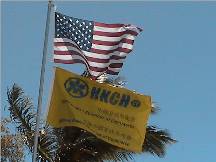



Biz:
China
Hong
Kong Hawaii


What people
said about us

China
Earthquake Relief
Tax &
Government
Hawaii Voter Registration
 Biz-Video
Biz-Video
 Hawaii's
China Connection Hawaii's
China Connection

 CDP#1780962
CDP#1780962

 Doing Business in
Hong Kong & China
Doing Business in
Hong Kong & China
| |
Hong Kong, China & Hawaii Biz*




Do you know our dues
paying members attend events sponsored by our collaboration partners worldwide
at their membership rates - go to our event page to find out more!
After
attended a China/Hong Kong Business/Trade Seminar in Hawaii...still unsure what
to do next, contact us, our Officers, Directors and Founding Members are
actively engaged in China/Hong Kong/Asia trade - we can help!
Are you ready to export your product or
service? You will find out in 3 minutes with resources to help you -
enter
to give it a try

 China Central TV - live
Webcast
China Central TV - live
Webcast
 Skype - FREE
Voice Over IP Skype - FREE
Voice Over IP
 View Hawaii's China Connection
Video Trailer
View Hawaii's China Connection
Video Trailer

 Direct link
PDF file
Direct link
PDF file

 Year of the Pig - February 18, 2007
Year of the Pig - February 18, 2007
  Listen to MP3 “Business Beyond the Reef” to discuss
the problems with imports from China, telling all sides of the story and then
expand the discussion to revitalizing Chinatown -
Special Guest: Johnson Choi, MBA, RFC. President - Hong Kong.China.Hawaii
Chamber of Commerce (HKCHcc) and Danny Au, Manager, Bo Wah Trading
Listen to MP3 “Business Beyond the Reef” to discuss
the problems with imports from China, telling all sides of the story and then
expand the discussion to revitalizing Chinatown -
Special Guest: Johnson Choi, MBA, RFC. President - Hong Kong.China.Hawaii
Chamber of Commerce (HKCHcc) and Danny Au, Manager, Bo Wah Trading
October 31, 2007
 Hong Kong:
A cross-border delivery-versus-payment link between Hong Kong's U.S. dollar real
time gross settlement system and Malaysia's Ringgit real time gross settlement
system has been launched. The Monetary Authority of Hong Kong said on Monday
that the link will help eliminate settlement risk of U.S. dollar bonds issued
and traded in Malaysia by ensuring simultaneous delivery of U.S. dollars in Hong
Kong and U.S. dollar bonds in Malaysia. As part of the initiatives to promote
Malaysia as an Islamic financial center and Hong Kong as an international
financial center, the delivery-versus-payment settlement services provide the
necessary settlement infrastructure to support potential issuance of U.S. dollar
bonds in Malaysia. The link is operated in Malaysia by Bank Negara Malaysia and
in Hong Kong by Hong Kong Interbank Clearing, said the authority. Hong Kong:
A cross-border delivery-versus-payment link between Hong Kong's U.S. dollar real
time gross settlement system and Malaysia's Ringgit real time gross settlement
system has been launched. The Monetary Authority of Hong Kong said on Monday
that the link will help eliminate settlement risk of U.S. dollar bonds issued
and traded in Malaysia by ensuring simultaneous delivery of U.S. dollars in Hong
Kong and U.S. dollar bonds in Malaysia. As part of the initiatives to promote
Malaysia as an Islamic financial center and Hong Kong as an international
financial center, the delivery-versus-payment settlement services provide the
necessary settlement infrastructure to support potential issuance of U.S. dollar
bonds in Malaysia. The link is operated in Malaysia by Bank Negara Malaysia and
in Hong Kong by Hong Kong Interbank Clearing, said the authority.
 Photo taken on October 29, 2007 shows
the champion Grace Cheung Ka Ying (C) from Hong Kong, runner-up Choi Ju Hee (R)
from South Korea and the second runner-up, Hubei girl Sun Chen of the Miss Asia
2007 Competition which was held in Hong Kong. Photo taken on October 29, 2007 shows
the champion Grace Cheung Ka Ying (C) from Hong Kong, runner-up Choi Ju Hee (R)
from South Korea and the second runner-up, Hubei girl Sun Chen of the Miss Asia
2007 Competition which was held in Hong Kong.
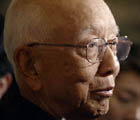 Shares in Golden Harvest, one of the best
known names in the Hong Kong film biz, were suspended from trading Friday.
Announcement to the Hong Kong Stock Exchange said that the company had requested
the suspension "pending an announcement relating to the changes in the
substantial shareholder and the directors of the company which the board of the
company considers to be price sensitive information." Move is understood to mean
that veteran chairman Raymond Chow Ting-hsing is planning to sell his shares in
the company he co-founded in 1970. Chow and his associates own 24% of the
company, which became synonymous with Cantonese-language action movies and the
discovery of Bruce Lee. In recent years, the company quit production to focus
almost exclusively on exhibition and distribution. Stock market insiders point
to Chinese production shingle and talent agency Chengtian, as the buyer of a 20%
Golden Harvest stake. Japanese music, talent and film giant Avex has a 20%
interest in Chengtian. Suspension comes only a week after Golden Harvest
announced good-looking results that were boosted by exceptional gains from asset
disposals. For the year to June 2007, company announced net profits of $96.5
million ($12.5 million), compared with only $673,000 in 2006. But total included
a $15 million boost from the sale of its stake in the Golden Village cinema
circuit in Malaysia. Operating losses from Golden Harvest's distribution and
exhibition increased despite revenue gains in both divisions and finance costs
soared. In its recent results statement, management said that the company is
being refocused to concentrate on the Chinese exhibition market and that it is
expanding its digital screen advertising business into the mainland's key city
markets. It will also be stepping up acquisition of non-Chinese movies for
distribution. Chow aside, Golden Harvest's other substantial shareholders
include billionaire Li Ka-shing with 17%, EMI and Norman Cheng Tung-hon with 12%
and Jackie Chan with 5%. Shares in Golden Harvest, one of the best
known names in the Hong Kong film biz, were suspended from trading Friday.
Announcement to the Hong Kong Stock Exchange said that the company had requested
the suspension "pending an announcement relating to the changes in the
substantial shareholder and the directors of the company which the board of the
company considers to be price sensitive information." Move is understood to mean
that veteran chairman Raymond Chow Ting-hsing is planning to sell his shares in
the company he co-founded in 1970. Chow and his associates own 24% of the
company, which became synonymous with Cantonese-language action movies and the
discovery of Bruce Lee. In recent years, the company quit production to focus
almost exclusively on exhibition and distribution. Stock market insiders point
to Chinese production shingle and talent agency Chengtian, as the buyer of a 20%
Golden Harvest stake. Japanese music, talent and film giant Avex has a 20%
interest in Chengtian. Suspension comes only a week after Golden Harvest
announced good-looking results that were boosted by exceptional gains from asset
disposals. For the year to June 2007, company announced net profits of $96.5
million ($12.5 million), compared with only $673,000 in 2006. But total included
a $15 million boost from the sale of its stake in the Golden Village cinema
circuit in Malaysia. Operating losses from Golden Harvest's distribution and
exhibition increased despite revenue gains in both divisions and finance costs
soared. In its recent results statement, management said that the company is
being refocused to concentrate on the Chinese exhibition market and that it is
expanding its digital screen advertising business into the mainland's key city
markets. It will also be stepping up acquisition of non-Chinese movies for
distribution. Chow aside, Golden Harvest's other substantial shareholders
include billionaire Li Ka-shing with 17%, EMI and Norman Cheng Tung-hon with 12%
and Jackie Chan with 5%.
 "The Home Song Stories" by Australian scripter-helmer Tony Ayres won the
Halekulani Golden Orchid for best feature at the 27th Hawaii Intl. Film
Festival. Awards were announced Thursday. An autobiographical drama based on
Ayres' difficult childhood migration to Australia, pic stars Joan Chen who also
received the fest's Achievement in Acting award. Feature documentary award was
presented to Hawaii-based co-helmers Don King and Julianne King for "Beautiful
Son," a chronicle of their efforts to help their autistic child. The Network for
the Promotion of Asian Cinema award was taken home by Stepane Gauger's verite-style
"Owl and the Sparrow," a Vietnam-U.S. co-production in which a young orphan
escapes to Ho Chi Minh City and is befriended by a zookeeper and an airline
stewardess. Pic previously won trophies at the Los Angeles and Heartland film
fests.
"The Home Song Stories" by Australian scripter-helmer Tony Ayres won the
Halekulani Golden Orchid for best feature at the 27th Hawaii Intl. Film
Festival. Awards were announced Thursday. An autobiographical drama based on
Ayres' difficult childhood migration to Australia, pic stars Joan Chen who also
received the fest's Achievement in Acting award. Feature documentary award was
presented to Hawaii-based co-helmers Don King and Julianne King for "Beautiful
Son," a chronicle of their efforts to help their autistic child. The Network for
the Promotion of Asian Cinema award was taken home by Stepane Gauger's verite-style
"Owl and the Sparrow," a Vietnam-U.S. co-production in which a young orphan
escapes to Ho Chi Minh City and is befriended by a zookeeper and an airline
stewardess. Pic previously won trophies at the Los Angeles and Heartland film
fests.
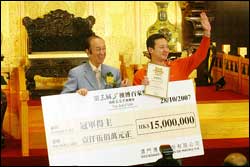 A
mainland salesman became the king of baccarat yesterday when he won HK$15
million in a Macau gaming competition. Yan Jun, a Hubeinese who often visits
Macau, beat eight other contestants in the last round of competition, which
distributed a record HK$20 million in prize money. Five of the contestants were
from China, with the others from Hong Kong, Macau, the United States and
Holland. The Hong Kong participant, Edward Ng Wing Biu, came fourth. Yan's
winning tip is to bet boldly. "If your bet is not big enough, you cannot win."
He added:"I go to Macau quite often, and usually bet about several thousand
[Macau] dollars to more than a hundred thousand each time." Yan, who is a
salesman in the mainland, won HK$470,000 in the baccarat competition himself.
Players had HK$100,000 as principal for the final session, of which HK$50,000
was self funded and HK$50,000 provided by the organizer. A
mainland salesman became the king of baccarat yesterday when he won HK$15
million in a Macau gaming competition. Yan Jun, a Hubeinese who often visits
Macau, beat eight other contestants in the last round of competition, which
distributed a record HK$20 million in prize money. Five of the contestants were
from China, with the others from Hong Kong, Macau, the United States and
Holland. The Hong Kong participant, Edward Ng Wing Biu, came fourth. Yan's
winning tip is to bet boldly. "If your bet is not big enough, you cannot win."
He added:"I go to Macau quite often, and usually bet about several thousand
[Macau] dollars to more than a hundred thousand each time." Yan, who is a
salesman in the mainland, won HK$470,000 in the baccarat competition himself.
Players had HK$100,000 as principal for the final session, of which HK$50,000
was self funded and HK$50,000 provided by the organizer.
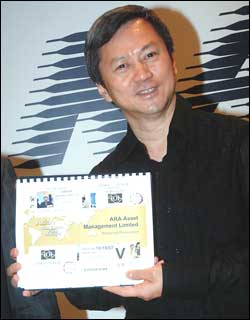 Real estate fund manager ARA Asset
Management, in which Cheung Kong Holdings (0001) has a 30-percent indirect
interest, said the institutional tranche of its public offering was about 30
times oversubscribed. It is set to list on the main board of Singapore on
Friday. Of the 205.2 million shares offered, 181.9 million will be for
institutional subscription, while 15 million are for retail investors. The
remaining 8.3 million will be reserved for management of ARA and related
companies. If necessary, underwriters Credit Suisse and DBS can exercise the
over- allotment option of issuing an additional 36 million shares. Market
sources said buyers from Dubai, Kuwait and Abu Dhabi have subscribed to the
issue. The 205.2 million shares issued, comprised of 73 million new shares and
132.2 million existing shares, will be sold at S$1.15 (HK$6.12) each, raising
S$235.98 million. Real estate fund manager ARA Asset
Management, in which Cheung Kong Holdings (0001) has a 30-percent indirect
interest, said the institutional tranche of its public offering was about 30
times oversubscribed. It is set to list on the main board of Singapore on
Friday. Of the 205.2 million shares offered, 181.9 million will be for
institutional subscription, while 15 million are for retail investors. The
remaining 8.3 million will be reserved for management of ARA and related
companies. If necessary, underwriters Credit Suisse and DBS can exercise the
over- allotment option of issuing an additional 36 million shares. Market
sources said buyers from Dubai, Kuwait and Abu Dhabi have subscribed to the
issue. The 205.2 million shares issued, comprised of 73 million new shares and
132.2 million existing shares, will be sold at S$1.15 (HK$6.12) each, raising
S$235.98 million.
Ample liquidity in the capital
market will mean Hong Kong will remain a leading international financial center
for fund-raising activity, although there will be fewer listings of mainland
companies in the remainder of the year, said Thomas Schnettler, vice chairman
and chief financial officer of US investment bank Piper Jaffray.
 China:
China's Renminbi (RMB) broke the 7.48 mark to reach a new central parity rate of
7.4718 yuan to one U.S. dollar on Monday, according to the Chinese Foreign
Exchange Trading System.
China:
China's Renminbi (RMB) broke the 7.48 mark to reach a new central parity rate of
7.4718 yuan to one U.S. dollar on Monday, according to the Chinese Foreign
Exchange Trading System.
 Zhang Jingchu to Star in China's "Schindler" Movie - Chinese mainland actress
Zhang Jingchu has been confirmed as the female lead in a war movie John Rabe.
Cast member Zhang Jingchu arrives at the premiere of Rush Hour 3 at the Mann's
Chinese theatre in Hollywood, California on July 30, 2007. Chinese mainland
actress Zhang Jingchu has been confirmed as the female lead in a war movie John
Rabe. The production began shooting in Shanghai on Saturday. The actress will
play a women's college student whose family suffers due to the Japanese invasion
of China during World War II. It is reported that the director, Germany's
Florian Gallenberger, was impressed by Zhang Jingchu's acting in Peacock, winner
of the Berlin Bear. German actor Ulrich Tukur will play the title role in John
Rabe. John Rabe (1882-1950) was a German businessman who worked as the Siemens
Corporation representative in China's Nanjing from 1931 to 1938. He helped
protect the lives of nearly 250,000 Chinese refugees from the Japanese invaders'
massacre. He has been praised as the "Schindler of Nanjing". The movie boasts a
budget of about 20 million U.S. dollars and an international cast of actors from
China, Germany, France and the United States.
Zhang Jingchu to Star in China's "Schindler" Movie - Chinese mainland actress
Zhang Jingchu has been confirmed as the female lead in a war movie John Rabe.
Cast member Zhang Jingchu arrives at the premiere of Rush Hour 3 at the Mann's
Chinese theatre in Hollywood, California on July 30, 2007. Chinese mainland
actress Zhang Jingchu has been confirmed as the female lead in a war movie John
Rabe. The production began shooting in Shanghai on Saturday. The actress will
play a women's college student whose family suffers due to the Japanese invasion
of China during World War II. It is reported that the director, Germany's
Florian Gallenberger, was impressed by Zhang Jingchu's acting in Peacock, winner
of the Berlin Bear. German actor Ulrich Tukur will play the title role in John
Rabe. John Rabe (1882-1950) was a German businessman who worked as the Siemens
Corporation representative in China's Nanjing from 1931 to 1938. He helped
protect the lives of nearly 250,000 Chinese refugees from the Japanese invaders'
massacre. He has been praised as the "Schindler of Nanjing". The movie boasts a
budget of about 20 million U.S. dollars and an international cast of actors from
China, Germany, France and the United States.
Shanghai GDP to hit record US$160b
this year - Shanghai's gross domestic product is expected to reach a record 1.2
trillion yuan (US$160 billion) this year, keeping a double-digit growth for 16
straight years, said Mayor Han Zheng yesterday during a forum. In the first nine
months this year, Shanghai's economy swelled 13.4 percent, Han said at the 19th
International Business Leaders' Advisory Council for the Mayor of Shanghai. The
city's fixed-assets investment grew 7.4 percent to 311.89 billion yuan through
September. Consumer spending expanded 14.3 percent to 285.32 billion yuan while
combined value of imports and exports soared 20.9 percent in the same period.
Han expected the city's value of trade this year will surpass US$500 billion for
the first time. "Shanghai's economy has kept a stable growth. We are confident
that Shanghai is on the way to achieve a development balanced with fast growth
of productivity, prosperity of people's lives and an ecologically sound
environment," said Han. IBLAC, set up in 1989 as a platform to pool insights
from global business leaders, focused this year on building a
resource-conserving and environmentally friendly city. To address this year's
theme, Han said Shanghai will continue to develop its service industry, which
produces less pollution, to build the city into an economic, financial, trade
and shipping hub. Han estimated the service industry will contribute 52 percent
to Shanghai's GDP this year, based on its growth momentum so far. The IBLAC
meeting has become an annual gala for top global executives to gather in
Shanghai. Thirty-eight members of the 40 attended this year's meeting, including
Stephen Green, chairman of HSBC Holdings Plc, Siemens AG President Peter
Loescher, Chairman of Bombardier Inc Laurent Beaudoin, and Chairman of Investor
AB Jacob Wallenberg. "We will fully support the goals for Shanghai's economic
development," said Samuel A. DiPiazza Jr, chief executive officer of
Pricewaterhouse- Coopers International Ltd, who will chair next year's meeting.
Shanghai signed 2,662 foreign-direct-investment contracts valued at US$9.33
billion through August this year. The number of contracts grew 2.5 percent from
a year earlier.
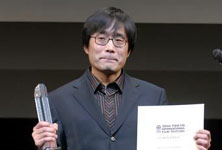 "The Western Trunk Line," a Chinese movie telling a story in a remote town at
the end of 1970s, won Special Jury Prize at the 20th Tokyo International Film
Festival on Sunday. "I have been thinking to make such a move since 1994," said
director Li Jixian at the awarding ceremony at Shibuya's Bunkamura, Tokyo. "I
met quite some challenges in making screenplay, but I never thought of
quitting."
"The Western Trunk Line," a Chinese movie telling a story in a remote town at
the end of 1970s, won Special Jury Prize at the 20th Tokyo International Film
Festival on Sunday. "I have been thinking to make such a move since 1994," said
director Li Jixian at the awarding ceremony at Shibuya's Bunkamura, Tokyo. "I
met quite some challenges in making screenplay, but I never thought of
quitting."
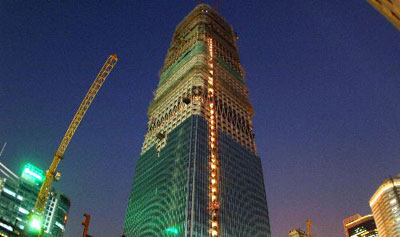 The roof of the
main building of the third-phase construction project in Guomao, or China World
Trade Center, a major business area in Chaoyang District, Beijing, has been
capped on Monday November 29, 2007. The 330-meter-high building, with 74 storeys
on the ground and 4 underground, is expected to become the highest in the
Chinese capital city upon completion in 2009 The roof of the
main building of the third-phase construction project in Guomao, or China World
Trade Center, a major business area in Chaoyang District, Beijing, has been
capped on Monday November 29, 2007. The 330-meter-high building, with 74 storeys
on the ground and 4 underground, is expected to become the highest in the
Chinese capital city upon completion in 2009
 Photo taken on October
29, 2007 shows the second runner-up of Miss Asia 2007 Competition, Sun Chen (C),
from Central China's Hubei Province. Photo taken on October
29, 2007 shows the second runner-up of Miss Asia 2007 Competition, Sun Chen (C),
from Central China's Hubei Province.
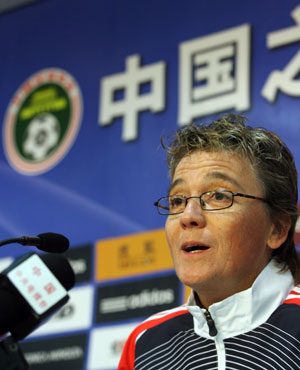 Former France's
women's soccer team coach Elisabeth Loisel meets the press at the news
conference to announce her appointment to coach China's women's team in Beijing
October 28, 2007. China's former coach Marika Domanski-Lyfors from Sweden
quitted last week after China's quarter-final elimination at last month's
Women's World Cup. Former France's
women's soccer team coach Elisabeth Loisel meets the press at the news
conference to announce her appointment to coach China's women's team in Beijing
October 28, 2007. China's former coach Marika Domanski-Lyfors from Sweden
quitted last week after China's quarter-final elimination at last month's
Women's World Cup.
China's top legislature yesterday approved the
Cabinet nomination of Meng Jianzhu as minister of public security, the country's
top police official. Meng, former leader of the Communist Party of eastern
Jiangxi province, replaces Zhou Yongkang. Zhou had been named to the Politburo
Standing Committee. More personnel changes are expected - including the two men
likely to succeed President Hu Jintao and government head Premier Wen Jiabao. Xi
Jinping and Li Keqiang were also lifted into the new nine-member Standing
Committee. Two members have been expelled from the National People's Congress.
Xinhua News Agency named them as Wang Xiaojin, board chairman of the Gujing
Group, one of China's largest distilleries based in Anhui province, and Wang
Dingguo, former board chairman of the Qingjiang River Hydropower Development in
Hubei province.
October 30, 2007
 Hong Kong:
Property stocks led Hong Kong's benchmark index into its second consecutive day
of record close Friday, on hopes of another U.S. interest rate cut next week.
The blue-chip Hang Seng Index rose 1.8 percent to a record close of 30,405.22,
after trading between 29,932.64 and an all- time intraday high of 30,562.63
during the session. Turnover totaled 157.38 billion HK dollars (20.33 billion
U.S. dollars), down from 165.18 billion HK dollars (21.34 billion U.S. dollars)
Thursday. All the four categories gained ground. The property jumped 5 percent,
followed by the Commerce and Industry at 2.66 percent, the Utilities at 0.95
percent and the Finance at 0.49. Sino Land, the biggest blue-chip gainer, surged
12.6 percent to 24.65 HK dollars. Henderson Land climbed 4.9 percent to 64.85 HK
dollars. Sun Hung Kai Properties rose 4 percent to 153.60 HK dollars. Tycoon Li
Ka-shing's property flagship Cheung Kong gained 5.2 percent to 145.50 HK
dollars. Bucking the downward trend of China-related stocks, Industrial and
Commercial Bank of China rose 2.1 percent to 7.16 HK dollars, after target price
upgrades by investment banks. PetroChina fell 0.52 percent to 19.02 HK dollars.
On Chinese telecom stocks front, heavyweight China Mobile was up 0.92 percent,
while Netcom up 1.74 percent, China Unicom up 5. 06 percent, and China Telecom
up 1.26 percent. ICBC that subscribed for a 20 percent stake in the Standard
Bank added 2.14 percent. Bank of China proposing to expand its retail banking
business in UK through mergers and acquisitions climbed 1.52 percent. Insurance
stocks put in mixed shows. Ping An was down 1.84 percent despite a 3.5-time
three-month profit growth, while China Life was up 0.49 percent, PICC P&C down
0.12 percent, and China Insurance up 2.04 percent. Hong Kong:
Property stocks led Hong Kong's benchmark index into its second consecutive day
of record close Friday, on hopes of another U.S. interest rate cut next week.
The blue-chip Hang Seng Index rose 1.8 percent to a record close of 30,405.22,
after trading between 29,932.64 and an all- time intraday high of 30,562.63
during the session. Turnover totaled 157.38 billion HK dollars (20.33 billion
U.S. dollars), down from 165.18 billion HK dollars (21.34 billion U.S. dollars)
Thursday. All the four categories gained ground. The property jumped 5 percent,
followed by the Commerce and Industry at 2.66 percent, the Utilities at 0.95
percent and the Finance at 0.49. Sino Land, the biggest blue-chip gainer, surged
12.6 percent to 24.65 HK dollars. Henderson Land climbed 4.9 percent to 64.85 HK
dollars. Sun Hung Kai Properties rose 4 percent to 153.60 HK dollars. Tycoon Li
Ka-shing's property flagship Cheung Kong gained 5.2 percent to 145.50 HK
dollars. Bucking the downward trend of China-related stocks, Industrial and
Commercial Bank of China rose 2.1 percent to 7.16 HK dollars, after target price
upgrades by investment banks. PetroChina fell 0.52 percent to 19.02 HK dollars.
On Chinese telecom stocks front, heavyweight China Mobile was up 0.92 percent,
while Netcom up 1.74 percent, China Unicom up 5. 06 percent, and China Telecom
up 1.26 percent. ICBC that subscribed for a 20 percent stake in the Standard
Bank added 2.14 percent. Bank of China proposing to expand its retail banking
business in UK through mergers and acquisitions climbed 1.52 percent. Insurance
stocks put in mixed shows. Ping An was down 1.84 percent despite a 3.5-time
three-month profit growth, while China Life was up 0.49 percent, PICC P&C down
0.12 percent, and China Insurance up 2.04 percent.
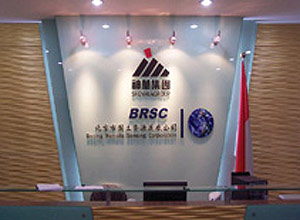 China Shenhua has been added to the Hang
Seng China AH Index Series which comprises the largest and most liquid Chinese
mainland companies with both A-share and H-share listings. China Shenhua has been added to the Hang
Seng China AH Index Series which comprises the largest and most liquid Chinese
mainland companies with both A-share and H-share listings.
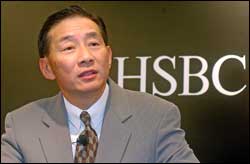 A senior banking
executive has called on the Hong Kong government to begin discussions on
changing the currency peg that has lasted more than two decades. HSBC (0005)
executive director Peter Wong Tung-shun told The Standard the yuan is on course
to become a freely convertible currency within 10 years. "As the Chinese economy
develops at a faster pace than before, that widens the difference between Hong
Kong and the US economy," Wong said. His comments come nearly two weeks after
President Hu Jintao told the Communist Party Congress that the mainland will
improve the yuan exchange rate regime and gradually make the currency
convertible under the capital account. Wong believes the Hong Kong dollar should
be linked to a currency which better reflects the city's economic reality.
"Don't ask me when the delinkage should take place. I can only say, when you see
the yuan becoming a freely convertible currency, then it's time for change,"
Wong suggested. "The right thing should be done at the right time." Earlier this
year, the yuan strengthened against the Hong Kong dollar for the first time in
13 years, reigniting a debate whether the time has come to scrap the 23-year-old
US-dollar peg. The yuan gained to 1.0004 per Hong Kong dollar and also climbed
to 7.7949 to the US dollar in Shanghai trading in early January. The Hong Kong
Monetary Authority said at the time, there is "no intention to change the linked
exchange rate system." The Hong Kong dollar is pegged at 7.8 to the greenback
and is allowed to trade between 7.75 and 7.85. A senior banking
executive has called on the Hong Kong government to begin discussions on
changing the currency peg that has lasted more than two decades. HSBC (0005)
executive director Peter Wong Tung-shun told The Standard the yuan is on course
to become a freely convertible currency within 10 years. "As the Chinese economy
develops at a faster pace than before, that widens the difference between Hong
Kong and the US economy," Wong said. His comments come nearly two weeks after
President Hu Jintao told the Communist Party Congress that the mainland will
improve the yuan exchange rate regime and gradually make the currency
convertible under the capital account. Wong believes the Hong Kong dollar should
be linked to a currency which better reflects the city's economic reality.
"Don't ask me when the delinkage should take place. I can only say, when you see
the yuan becoming a freely convertible currency, then it's time for change,"
Wong suggested. "The right thing should be done at the right time." Earlier this
year, the yuan strengthened against the Hong Kong dollar for the first time in
13 years, reigniting a debate whether the time has come to scrap the 23-year-old
US-dollar peg. The yuan gained to 1.0004 per Hong Kong dollar and also climbed
to 7.7949 to the US dollar in Shanghai trading in early January. The Hong Kong
Monetary Authority said at the time, there is "no intention to change the linked
exchange rate system." The Hong Kong dollar is pegged at 7.8 to the greenback
and is allowed to trade between 7.75 and 7.85.
Residents of two Sai Ying Pun
buildings that have to make way for the construction of the Mass Transit
Railway's HK$8.9 billion West Island Line are worried about rehousing as they
fear compensation to be offered will not be enough to buy new homes.
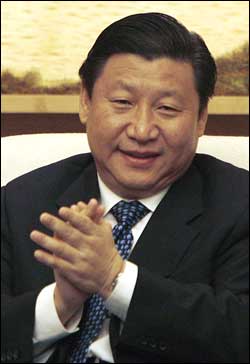 Rising political star Xi Jinping has been
named to head the 18-strong working group overseeing Hong Kong and Macau affairs
as well as state vice- president, The Standard has learned. Xi's appointment
follows his promotion to the elite Politiburo Standing Committee earlier this
week at the close of the 17th Chinese Communist Party national congress. He will
succeed retiring Vice President Zeng Qinghong, who was dropped from both the
party Central Committee and the Politburo Standing Committee. Sources in Beijing
have confirmed that Xi, 54, who is also Shanghai party chief and the eldest son
of Xi Zhongxun - a former revolutionary and former vice-premier who helped
pioneer China's special economic zones - was given the new posts after intensive
closed-door discussions. Liao Hui - a vice-chairman of the Chinese People's
Political Consultative Conference and incumbent director of the Hong Kong and
Macao Affairs Office - will stay on as deputy head of the working group
responsible for Hong Kong affairs. Chen Zuo'er, vice director of the Hong Kong
and Macao Affairs Office, will retire before March next year. Another key
appointment concerning Hong Kong is that of Peng Qinghua, who was elected party
chief for the HKSAR three months ago. He will succeed the retiring Gao Siren as
director of the Central Government's Liaison Office in Hong Kong. Besides Xi,
two other new faces in the nine-member Politburo Standing Committee - Li Keqiang
and He Guoqiang - have been allocated new portfolios. Li, 52, who ranks seventh
in the Standing Committee who is also Liaoning party boss, will replace the late
Huang Ju in overseeing the country's economic, financial and energy policies as
a vice premier. He Guoqiang will take over from retiring Wu Gangzheng as head of
the Central Commission for Disciplined Actions, while Jiangsu party chief Li
Yuanchao, 57, will succeed He as head of the Organization Department, according
to Xinhua news agency. Li's post as Liaoning provincial chief has gone to
62-year-old Jiangsu provincial governor Liang Baohua. Jiangsu party chief Meng
Jianzhu has been tipped to replace new Standing Committee member Zhou Yongkang
as public security minister. His appointment is expected to be approved by the
National People's Congress Standing Committee on Sunday. Wang Shaoguang, chair
professor at the Chinese University of Hong Kong's department of government and
public administration, said the new leadership lineup of Xi and Li has ensured a
stable succession at the top in the next 15 years. "The leadership succession
problem over the next 15 years has now been more or less resolved, as whoever
wins the contest for the top job in 2012 - Xi or Li - will probably serve
another 10 more years, and thus party policies will be entrenched," Wang said. Rising political star Xi Jinping has been
named to head the 18-strong working group overseeing Hong Kong and Macau affairs
as well as state vice- president, The Standard has learned. Xi's appointment
follows his promotion to the elite Politiburo Standing Committee earlier this
week at the close of the 17th Chinese Communist Party national congress. He will
succeed retiring Vice President Zeng Qinghong, who was dropped from both the
party Central Committee and the Politburo Standing Committee. Sources in Beijing
have confirmed that Xi, 54, who is also Shanghai party chief and the eldest son
of Xi Zhongxun - a former revolutionary and former vice-premier who helped
pioneer China's special economic zones - was given the new posts after intensive
closed-door discussions. Liao Hui - a vice-chairman of the Chinese People's
Political Consultative Conference and incumbent director of the Hong Kong and
Macao Affairs Office - will stay on as deputy head of the working group
responsible for Hong Kong affairs. Chen Zuo'er, vice director of the Hong Kong
and Macao Affairs Office, will retire before March next year. Another key
appointment concerning Hong Kong is that of Peng Qinghua, who was elected party
chief for the HKSAR three months ago. He will succeed the retiring Gao Siren as
director of the Central Government's Liaison Office in Hong Kong. Besides Xi,
two other new faces in the nine-member Politburo Standing Committee - Li Keqiang
and He Guoqiang - have been allocated new portfolios. Li, 52, who ranks seventh
in the Standing Committee who is also Liaoning party boss, will replace the late
Huang Ju in overseeing the country's economic, financial and energy policies as
a vice premier. He Guoqiang will take over from retiring Wu Gangzheng as head of
the Central Commission for Disciplined Actions, while Jiangsu party chief Li
Yuanchao, 57, will succeed He as head of the Organization Department, according
to Xinhua news agency. Li's post as Liaoning provincial chief has gone to
62-year-old Jiangsu provincial governor Liang Baohua. Jiangsu party chief Meng
Jianzhu has been tipped to replace new Standing Committee member Zhou Yongkang
as public security minister. His appointment is expected to be approved by the
National People's Congress Standing Committee on Sunday. Wang Shaoguang, chair
professor at the Chinese University of Hong Kong's department of government and
public administration, said the new leadership lineup of Xi and Li has ensured a
stable succession at the top in the next 15 years. "The leadership succession
problem over the next 15 years has now been more or less resolved, as whoever
wins the contest for the top job in 2012 - Xi or Li - will probably serve
another 10 more years, and thus party policies will be entrenched," Wang said.
Christie's Hong Kong displayed
Chinese works of art inspired by the west alongside important ceramics that will
be on sale in its autumn auction in a media preview here Friday. The two
auctions, named respectively Reflections: Chinese Art Inspired by the West, and
Important Chinese Ceramics and Works of Art, will take place on November 27. It
will showcase 15 creations that blend the essence of Chinese artistry and
innovative western conceptions, as well as 200 pieces of Chinese ceramics that
are altogether expected to realized in excess of 300 million Hong Kong dollars
(38.75 million U.S. dollars) A magnificent Imperial Beijing enamel glass
brushpot, Qianlong mark and of the period (1736-1795), is estimated at 30
million HK dollars (about 3.85 million U.S. dollars). The brushpot is one of the
finest and rarest examples of enamels on glass made for the Qianlong Emperor of
Qing dynasty, and the only perfect glass burshpot of this form and decoration
known to exist. Also featured at the preview is a Ming blue and white "Boys" jar
of the Jiajing period (1522-1566, estimated at 30 million Hong Kong dollars
(about 3.85 million U.S. dollars). The jar is exquisitely painted in under
glaze-blue of brilliant deep purplish tone with a continuous garden landscape
scene of 16 boys in various lively pursuits. Another prized offering is a
magnificent and large bronze figure of Guanyin from the 14th century, late
Yuan-early Ming dynasty. It is expected to fetch over 30 million Hong Kong
dollars(about 3.85 million U.S. dollars).
 The chief executive of the Hong Kong Monetary Authority,
Joseph Yam Chi- Kwong, will work one more year before retiring from the position
he has held since 1993, a source said. The Monetary Authority has sold Hong Kong
dollars for the second time last week as heavy demand pushed it to the upper
limit of its trading band against the US dollar.
The chief executive of the Hong Kong Monetary Authority,
Joseph Yam Chi- Kwong, will work one more year before retiring from the position
he has held since 1993, a source said. The Monetary Authority has sold Hong Kong
dollars for the second time last week as heavy demand pushed it to the upper
limit of its trading band against the US dollar.
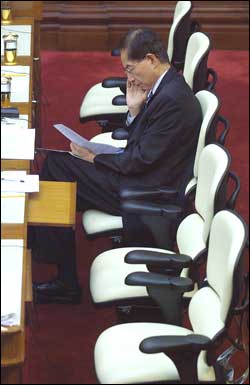 In a move seen as damage control, the Democratic Party has
decided to publish an announcement in newspapers on Saturday, setting out its
position on Martin Lee Chu-ming's recent article, including the party's support
for Beijing hosting next year's Olympic Games. It is not an apology, but a clear
declaration of what we stand for," said chairman Albert Ho Chun-yan. "We are of
the same mind as Lee," Ho said, adding that the party plans to spell out its
position on the Games and the mainland human rights situation. The party's
position on the issues is essentially the same as Lee's, but "some of the
wording [in Lee's Wall Street Journal article] will be avoided in order to avoid
further misunderstanding." Chief Secretary for Administration Henry Tang
Ying-yen was the latest to join the controversy, saying "the Olympics should not
be politicized." Lee reiterated there was nothing in his article urging the Bush
administration or other countries to boycott the Games. "Even the Foreign
Ministry did not specify my name when it said those who try to pressure China
with the help of external forces is bound to fail," he said. But Tsang Hin-chi,
a National People's Congress Standing Committee member, said in Beijing that
Lee's "bad behavior has never changed." Tsang added: "Is he blind, mute or deaf?
How is it he cannot see the progress that China has made in recent years? He
asked foreign countries to impose sanctions on China. Isn't that what only
traitors will do?" Pro-Beijing lawmakers on Friday also continued with their
attack on Lee.
In a move seen as damage control, the Democratic Party has
decided to publish an announcement in newspapers on Saturday, setting out its
position on Martin Lee Chu-ming's recent article, including the party's support
for Beijing hosting next year's Olympic Games. It is not an apology, but a clear
declaration of what we stand for," said chairman Albert Ho Chun-yan. "We are of
the same mind as Lee," Ho said, adding that the party plans to spell out its
position on the Games and the mainland human rights situation. The party's
position on the issues is essentially the same as Lee's, but "some of the
wording [in Lee's Wall Street Journal article] will be avoided in order to avoid
further misunderstanding." Chief Secretary for Administration Henry Tang
Ying-yen was the latest to join the controversy, saying "the Olympics should not
be politicized." Lee reiterated there was nothing in his article urging the Bush
administration or other countries to boycott the Games. "Even the Foreign
Ministry did not specify my name when it said those who try to pressure China
with the help of external forces is bound to fail," he said. But Tsang Hin-chi,
a National People's Congress Standing Committee member, said in Beijing that
Lee's "bad behavior has never changed." Tsang added: "Is he blind, mute or deaf?
How is it he cannot see the progress that China has made in recent years? He
asked foreign countries to impose sanctions on China. Isn't that what only
traitors will do?" Pro-Beijing lawmakers on Friday also continued with their
attack on Lee.
 China:
The Fourth China-ASEAN Exposition opened here on Sunday morning in the southern
China city of Nanning. Political figures and business leaders of China and the
ten countries of the Association of Southeast Asian Nations were present at the
opening ceremony of the four-day event.
China:
The Fourth China-ASEAN Exposition opened here on Sunday morning in the southern
China city of Nanning. Political figures and business leaders of China and the
ten countries of the Association of Southeast Asian Nations were present at the
opening ceremony of the four-day event.
PetroChina, the nation's largest oil
producer, has attracted a record 3.3 trillion yuan in subscriptions for its
A-share listing on the Shanghai Stock Exchange.
The gross domestic product (GDP) of Guangdong Province exceeded 2 trillion yuan
in the first three quarters, its statistics bureau said. Guangdong's GDP from
January to September was 2.15 trillion yuan, up by 14.7 percent from the same
period last year. The figure is almost equal to the full-year GDP of 2.17
trillion yuan in 2005. In the first nine months, the provincial government
enacted a series of policies to adjust Guangdong's investment structure, promote
consumption and reduce the trade surplus. "The figures prove the policies are
working," said Bu Xinmin, director of the provincial statistics bureau.
Investment in fixed assets saw a moderate rise and the consumer market was
brisk, he said. Guangdong's foreign trade has slowed since a new export tax
rebate was introduced. From July to September, export growth in the province was
26 percent, 18.9 percent and 16.9 percent. Earnings in the petroleum and power
industries rose sharply in the period.
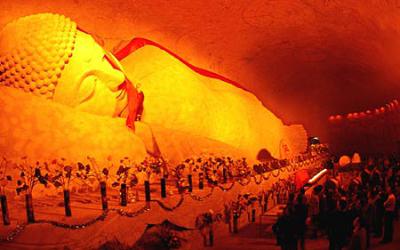 Buddhists attend a lighting ceremony
for the lying Buddha statue of Shuanglin rock cave in Xinchang county of east
China’s Zhejiang Province, Oct. 27, 2007. Buddhists attend a lighting ceremony
for the lying Buddha statue of Shuanglin rock cave in Xinchang county of east
China’s Zhejiang Province, Oct. 27, 2007.
 Taiwan actor
Zhang Zhen (R) and actress Hsu Chi walk on the red carpet at the16th China
Golden Rooster and Hundred Flowers Film Festival in Suzhou of eastern China’s
Jiangsu Province October 27, 2007. Taiwan actor
Zhang Zhen (R) and actress Hsu Chi walk on the red carpet at the16th China
Golden Rooster and Hundred Flowers Film Festival in Suzhou of eastern China’s
Jiangsu Province October 27, 2007.
 Chinese actress Yuan
Quan poses on the red carpet at the 16th China Golden Rooster and Hundred
Flowers Film Festival in Suzhou of eastern China’s Jiangsu Province October 27,
2007. Chinese actress Yuan
Quan poses on the red carpet at the 16th China Golden Rooster and Hundred
Flowers Film Festival in Suzhou of eastern China’s Jiangsu Province October 27,
2007.
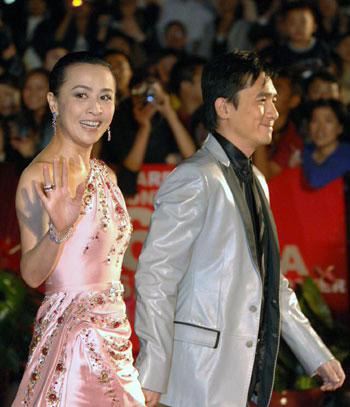 Hong Kong
actor Tony Leung (R) and actress Liu Jialing walk on the red carpet at the 16th
China Golden Rooster and Hundred Flowers Film Festival in Suzhou of eastern
China’s Jiangsu Province October 27, 2007. Hong Kong
actor Tony Leung (R) and actress Liu Jialing walk on the red carpet at the 16th
China Golden Rooster and Hundred Flowers Film Festival in Suzhou of eastern
China’s Jiangsu Province October 27, 2007.
 Hong Kong
actor Jet Li (L) and China’s mainland actress Li Bingbing pose together on the
red carpet at the 16th China Golden Rooster and Hundred Flowers Film Festival in
Suzhou of eastern China’s Jiangsu Province October 27, 2007. Hong Kong
actor Jet Li (L) and China’s mainland actress Li Bingbing pose together on the
red carpet at the 16th China Golden Rooster and Hundred Flowers Film Festival in
Suzhou of eastern China’s Jiangsu Province October 27, 2007.
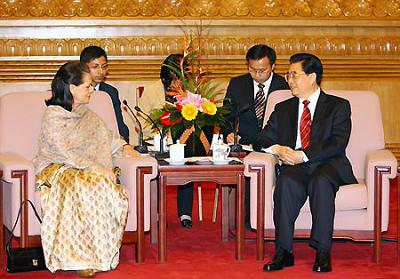 Chinese President Hu Jintao (R) meets with Indian Congress Party President Sonia
Gandhi (L) at the Great Hall of the People in Beijing, capital of China on Oct.
26, 2007. China and India voiced their commitment to handle bilateral relations
at a strategic level and step up the partnership to a higher level.
Chinese President Hu Jintao (R) meets with Indian Congress Party President Sonia
Gandhi (L) at the Great Hall of the People in Beijing, capital of China on Oct.
26, 2007. China and India voiced their commitment to handle bilateral relations
at a strategic level and step up the partnership to a higher level.
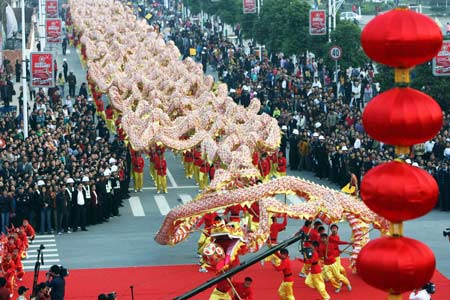 Local residents view the
2008-meter-long dragon in Shuangfeng township of Taicang city, east China's
Jiangsu Province, Oct. 26, 2007. The dragon dance performance held in the town
to greet the Beijing 2008 Olympic games attracted many local residents on
Friday, during which a giant dragon waved by 1010 people was the most
remarkable. Local residents view the
2008-meter-long dragon in Shuangfeng township of Taicang city, east China's
Jiangsu Province, Oct. 26, 2007. The dragon dance performance held in the town
to greet the Beijing 2008 Olympic games attracted many local residents on
Friday, during which a giant dragon waved by 1010 people was the most
remarkable.
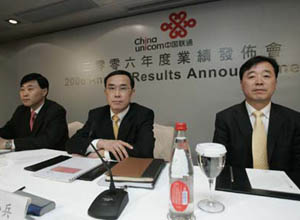 China Unicom Ltd, the nation's
second-biggest mobile-phone operator, more than doubled third-quarter profit,
beating analysts' estimates, by winning customers with reduced rates. Net income
rose to 2.98 billion yuan (398 million U.S. dollars) from 1.39 billion yuan a
year earlier. China Unicom Ltd, the nation's
second-biggest mobile-phone operator, more than doubled third-quarter profit,
beating analysts' estimates, by winning customers with reduced rates. Net income
rose to 2.98 billion yuan (398 million U.S. dollars) from 1.39 billion yuan a
year earlier.
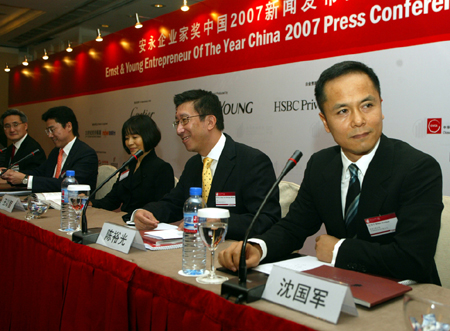 Shen Guojun (first from right),
president of property developer China Yintai Holdings Ltd, and Chan Yue-kwong
(second from right), chairman of Hong Kong-based restaurant chain Cafe de Coral
Holdings Ltd, at a press conference in Beijing on Friday. Shen and Chan are two
of the 11 winners of the Ernst & Young Entrepreneurs of the Year China 2007
awards. Shen Guojun (first from right),
president of property developer China Yintai Holdings Ltd, and Chan Yue-kwong
(second from right), chairman of Hong Kong-based restaurant chain Cafe de Coral
Holdings Ltd, at a press conference in Beijing on Friday. Shen and Chan are two
of the 11 winners of the Ernst & Young Entrepreneurs of the Year China 2007
awards.
China's three biggest insurers are
expected to invest more than 10 billion yuan (HK$10.36 billion) each in a new
state-controlled company that will build the country's high-speed railway from
Beijing to Shanghai, sources familiar with the investments said on Friday.
October 29, 2007
 Hong Kong:
Beijing loyalists launched a tirade
against veteran democrat lawmaker Martin Lee Chu-ming yesterday, calling him a
"running dog" and a "traitor" for urging the United States and other countries
to use next year's Beijing Olympics to force China to improve its human-rights
record. Hong Kong:
Beijing loyalists launched a tirade
against veteran democrat lawmaker Martin Lee Chu-ming yesterday, calling him a
"running dog" and a "traitor" for urging the United States and other countries
to use next year's Beijing Olympics to force China to improve its human-rights
record.
Pollution fell below national air
quality standards at all monitoring stations across Guangdong and Hong Kong in
the first half of the year, caused by "unfavorable" weather conditions.
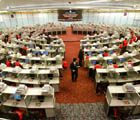 Hong Kong blue chips jumped 1.8 per cent on Friday, staying firmly above the key
30,000 level for the first time, with property stocks hitting records, stoked by
a weak US dollar and speculation of a rate cut by the Federal Reserve, which
meets next week. Conglomerate Hutchison Whampoa (SEHK: 0013) also rallied, as
investors bid up the underplayed stock to highs unseen since March 2001. Blue
chips hardly looked back after easily sailing past the key 30,000-point barrier
at the open. Investors switched into Hong Kong blue chips and out of mainland
plays amid expectations that the central government would raise interest rates
following strong macro data a day earlier. The benchmark Hang Seng Index closed
550.73 points higher at 30,405.22, setting an intraday high at 30,562.63 and
notching a 3.2 per cent gain for the week. The index of Hong Kong-listed
mainland companies shook off earlier losses as mainland-listed shares rebounded.
The index ended nearly unchanged at 19,548.49 to post a weekly 0.9 per cent
loss. Main-board turnover was HK$157.4 billion compared with Thursday’s HK$165.2
billion. As the US dollar weakened, the Hong Kong Monetary Authority sold HK$775
million worth of the local currency for US dollars to curb a strengthening Hong
Kong dollar. “The market has been very rotational,” said William Fong, fund
manager at Baring Asset Management. “When the US dollar depreciates, people look
for shelter in hard assets. China plays are having a consolidation but in the
near-term, I see strong liquidity coming from [the Qualified Domestic
Institutional Investor programme], so I’m not worried,” he said. Hutchison was
the day’s most traded stock after PetroChina (SEHK: 0857, announcements, news) ,
bolting nearly 6 per cent to HK$90.75. Property shares resumed their record run,
with the Hang Seng property sub-index rising 5 per cent to a peak for a second
straight day. Sino Land was the sector’s top gainer amid its recent land
acquisition spree, rallying nearly 17 per cent at one point in heavy trade
before settling at HK$24.65, up 12.6 per cent. Cheung Kong (SEHK: 0001) shot up
5.2 per cent to HK$145.5 and MTR, which will have the city’s largest land bank
pending its merger with KCRC, leapt 6.2 per cent to HK$25.75. ICBC (SEHK: 0349)
was a standout among mainland names, rising 2.1 per cent to HK$7.16 a day after
it reported a 76 per cent rise in third-quarter profit. The mainland’s top
lender also has agreed to buy 20 per cent of Standard Bank Group, South Africa’s
largest bank. Merrill Lynch raised its target price for ICBC shares to HK$8.40,
and JPMorgan raised its target price to HK$8.80. Hutchison Telecommunications
International (SEHK: 2332) tumbled 5.7 per cent to HK$10.66 after Orascom
Telecom Holding was selling up to 143.4 million shares in the emerging markets
telecom play at between HK$10.70 to HK$10.95, according to a term sheet seen by
Reuters. PetroChina shed 0.5 per cent to HK$19.02, a day after China’s top oil
producer set an indicative price range for its domestic IPO that was below
expectation.
Hong Kong blue chips jumped 1.8 per cent on Friday, staying firmly above the key
30,000 level for the first time, with property stocks hitting records, stoked by
a weak US dollar and speculation of a rate cut by the Federal Reserve, which
meets next week. Conglomerate Hutchison Whampoa (SEHK: 0013) also rallied, as
investors bid up the underplayed stock to highs unseen since March 2001. Blue
chips hardly looked back after easily sailing past the key 30,000-point barrier
at the open. Investors switched into Hong Kong blue chips and out of mainland
plays amid expectations that the central government would raise interest rates
following strong macro data a day earlier. The benchmark Hang Seng Index closed
550.73 points higher at 30,405.22, setting an intraday high at 30,562.63 and
notching a 3.2 per cent gain for the week. The index of Hong Kong-listed
mainland companies shook off earlier losses as mainland-listed shares rebounded.
The index ended nearly unchanged at 19,548.49 to post a weekly 0.9 per cent
loss. Main-board turnover was HK$157.4 billion compared with Thursday’s HK$165.2
billion. As the US dollar weakened, the Hong Kong Monetary Authority sold HK$775
million worth of the local currency for US dollars to curb a strengthening Hong
Kong dollar. “The market has been very rotational,” said William Fong, fund
manager at Baring Asset Management. “When the US dollar depreciates, people look
for shelter in hard assets. China plays are having a consolidation but in the
near-term, I see strong liquidity coming from [the Qualified Domestic
Institutional Investor programme], so I’m not worried,” he said. Hutchison was
the day’s most traded stock after PetroChina (SEHK: 0857, announcements, news) ,
bolting nearly 6 per cent to HK$90.75. Property shares resumed their record run,
with the Hang Seng property sub-index rising 5 per cent to a peak for a second
straight day. Sino Land was the sector’s top gainer amid its recent land
acquisition spree, rallying nearly 17 per cent at one point in heavy trade
before settling at HK$24.65, up 12.6 per cent. Cheung Kong (SEHK: 0001) shot up
5.2 per cent to HK$145.5 and MTR, which will have the city’s largest land bank
pending its merger with KCRC, leapt 6.2 per cent to HK$25.75. ICBC (SEHK: 0349)
was a standout among mainland names, rising 2.1 per cent to HK$7.16 a day after
it reported a 76 per cent rise in third-quarter profit. The mainland’s top
lender also has agreed to buy 20 per cent of Standard Bank Group, South Africa’s
largest bank. Merrill Lynch raised its target price for ICBC shares to HK$8.40,
and JPMorgan raised its target price to HK$8.80. Hutchison Telecommunications
International (SEHK: 2332) tumbled 5.7 per cent to HK$10.66 after Orascom
Telecom Holding was selling up to 143.4 million shares in the emerging markets
telecom play at between HK$10.70 to HK$10.95, according to a term sheet seen by
Reuters. PetroChina shed 0.5 per cent to HK$19.02, a day after China’s top oil
producer set an indicative price range for its domestic IPO that was below
expectation.
 Taxi groups unite against discount ideas - A leading taxi group has mobilised
major taxi unions to speak out against proposals that could lead to the legal
discounting of fares. The Motor Transport Workers' General Union - the largest
of the 27 taxi associations in Hong Kong - insisted the only effective way to
combat illegal touting activities was to penalise passengers who bargain on
fares. The government released a pamphlet as part of a public consultation that
began on Monday, asking drivers and passengers if they would prefer to vary
fares, provided there was a ceiling. In one of the two suggested models - based
on overseas examples - the maximum fares would be set by the operators, and in
the other, the upper limits would be decided by the government, and the
operators would have to apply for permission to charge less. Both models forbid
drivers to offers further discounts. But the union's taxi director, To Sun-tong,
said that would not eliminate unfair competition by the so-called discount taxi
gangs. "You set the price lower, [the gangs] set it even lower, and in the end
it would only trigger a throat-cutting race among drivers for lower fares. The
trade would not be able to survive," he said. Mr To said if the government would
make it illegal for passengers to bargain, the whole problem would be settled.
It is now illegal for drivers to offer discounts. The union and its 22 allied
taxi associations would protest outside the headquarters of the Transport and
Housing Bureau in Central today. The trade had proposed various options that
would lower fares for long-haul trips, but they were voted down by the union and
its allies in a meeting with the Transport Department in July. Kwok Chi-piu,
chairman of an independent taxi driver union, said many groups who claim to be
victims of the discount taxi gangs were offering discounts themselves. "Drivers
who are snatching others' business by offering discounts, of course, hope the
practice would not be legalised, because they would then lose their edges," he
said. Hong Kong Taxi and Public Light Bus Association chairman Brandon Tong
Yeuk-fung said the proposals were not likely to be welcomed by taxi owners
either, because a reduction in fares may eventually lead to lower rental charges
for the taxi and thus push down the price of a taxi licence - which has remained
steady at about HK$3.5 million in the past few years.
Taxi groups unite against discount ideas - A leading taxi group has mobilised
major taxi unions to speak out against proposals that could lead to the legal
discounting of fares. The Motor Transport Workers' General Union - the largest
of the 27 taxi associations in Hong Kong - insisted the only effective way to
combat illegal touting activities was to penalise passengers who bargain on
fares. The government released a pamphlet as part of a public consultation that
began on Monday, asking drivers and passengers if they would prefer to vary
fares, provided there was a ceiling. In one of the two suggested models - based
on overseas examples - the maximum fares would be set by the operators, and in
the other, the upper limits would be decided by the government, and the
operators would have to apply for permission to charge less. Both models forbid
drivers to offers further discounts. But the union's taxi director, To Sun-tong,
said that would not eliminate unfair competition by the so-called discount taxi
gangs. "You set the price lower, [the gangs] set it even lower, and in the end
it would only trigger a throat-cutting race among drivers for lower fares. The
trade would not be able to survive," he said. Mr To said if the government would
make it illegal for passengers to bargain, the whole problem would be settled.
It is now illegal for drivers to offer discounts. The union and its 22 allied
taxi associations would protest outside the headquarters of the Transport and
Housing Bureau in Central today. The trade had proposed various options that
would lower fares for long-haul trips, but they were voted down by the union and
its allies in a meeting with the Transport Department in July. Kwok Chi-piu,
chairman of an independent taxi driver union, said many groups who claim to be
victims of the discount taxi gangs were offering discounts themselves. "Drivers
who are snatching others' business by offering discounts, of course, hope the
practice would not be legalised, because they would then lose their edges," he
said. Hong Kong Taxi and Public Light Bus Association chairman Brandon Tong
Yeuk-fung said the proposals were not likely to be welcomed by taxi owners
either, because a reduction in fares may eventually lead to lower rental charges
for the taxi and thus push down the price of a taxi licence - which has remained
steady at about HK$3.5 million in the past few years.
 China:
U.S. Trade Representative and Treasury Secretary Discuss U.S.-China Relations -
On Tuesday at the third meeting of the George Bush China-U.S. Relations
Conference, U.S. Trade Representative Susan Schwab and Treasury Department
Secretary Henry Paulson delivered remarks on U.S.-China relations. “Over the
past 15 years, bilateral trade in goods between our two countries has increased
by 1200 percent! Over the past six alone, bilateral goods trade has nearly
tripled and services trade has more than doubled. Investment flows remain
strong,” said Ambassador Schwab. “In this time of rapid change and closer
integration of participants in the global trading system, it is imperative for
veteran trading powers such as the United States and major new actors, such as
China, to champion the benefits of the free and fair flow of commerce.” Schwab
continued, “If the United States seems at times impatient with the velocity and
magnitude of the reforms China has undertaken to become a member of the global
trading community, it is because China’s impact on trade, and indeed on all
human endeavors, has also increased in its velocity and magnitude. Given its
vast size and the enormous energy and dynamism of its people, China has an
urgent task to move forward on embracing market principles. The Chinese people
and the other five billion people who share this planet are all stakeholders in
a strong, stable China.” Paulson remarked, “China’s re-emergence on the global
stage is one of the most consequential geopolitical events of recent times.
China’s global influence is expanding. A cooperative, constructive and candid
U.S.-China relationship is central to understanding and responding to China’s
re-emergence, in all its possible manifestations. The United States must manage
our disagreements with China, foster greater bilateral cooperation and improve
our ability to work constructively with China across all dimensions of national
power.” “The economic and geopolitical landscape of the 21st century will be
greatly influenced by the way in which the United States and China work
together. That emerging future requires a distinct vision and effective
mechanisms to achieve it. The SED has allowed both the United States and China
to begin to write the next chapter of our strategic economic relationship,”
concluded Paulson.
China:
U.S. Trade Representative and Treasury Secretary Discuss U.S.-China Relations -
On Tuesday at the third meeting of the George Bush China-U.S. Relations
Conference, U.S. Trade Representative Susan Schwab and Treasury Department
Secretary Henry Paulson delivered remarks on U.S.-China relations. “Over the
past 15 years, bilateral trade in goods between our two countries has increased
by 1200 percent! Over the past six alone, bilateral goods trade has nearly
tripled and services trade has more than doubled. Investment flows remain
strong,” said Ambassador Schwab. “In this time of rapid change and closer
integration of participants in the global trading system, it is imperative for
veteran trading powers such as the United States and major new actors, such as
China, to champion the benefits of the free and fair flow of commerce.” Schwab
continued, “If the United States seems at times impatient with the velocity and
magnitude of the reforms China has undertaken to become a member of the global
trading community, it is because China’s impact on trade, and indeed on all
human endeavors, has also increased in its velocity and magnitude. Given its
vast size and the enormous energy and dynamism of its people, China has an
urgent task to move forward on embracing market principles. The Chinese people
and the other five billion people who share this planet are all stakeholders in
a strong, stable China.” Paulson remarked, “China’s re-emergence on the global
stage is one of the most consequential geopolitical events of recent times.
China’s global influence is expanding. A cooperative, constructive and candid
U.S.-China relationship is central to understanding and responding to China’s
re-emergence, in all its possible manifestations. The United States must manage
our disagreements with China, foster greater bilateral cooperation and improve
our ability to work constructively with China across all dimensions of national
power.” “The economic and geopolitical landscape of the 21st century will be
greatly influenced by the way in which the United States and China work
together. That emerging future requires a distinct vision and effective
mechanisms to achieve it. The SED has allowed both the United States and China
to begin to write the next chapter of our strategic economic relationship,”
concluded Paulson.
 Sales of China-made
autos expected to hit 8.5 mln in 2007 - Sales of China-made autos hit 6.46
million units in the first nine months this year, an increase of 24.5 percent
over the same period last year, China's auto industry association said on
Tuesday. During the period, output of domestic autos rose by 22.8 percent to
6.51 million units while the sales are expected to hit 8.5 million by the year
end, according to statistics released by the China Association of Automobile
Manufacturers. Of the total, sales of passenger vehicles hit 4.58 million units,
up 23.8 percent, and commercial vehicles reached 1.88 million units, up 26
percent. Followed by China FAW Group Corporation and Dongfeng Motor Corporation,
Shanghai Automotive Industry Corporation ranked first in sales volume, selling
1.13 million units. Meanwhile, sales of the top ten companies account for 83
percent of the total, according to the auto association. Sales of China-made
autos expected to hit 8.5 mln in 2007 - Sales of China-made autos hit 6.46
million units in the first nine months this year, an increase of 24.5 percent
over the same period last year, China's auto industry association said on
Tuesday. During the period, output of domestic autos rose by 22.8 percent to
6.51 million units while the sales are expected to hit 8.5 million by the year
end, according to statistics released by the China Association of Automobile
Manufacturers. Of the total, sales of passenger vehicles hit 4.58 million units,
up 23.8 percent, and commercial vehicles reached 1.88 million units, up 26
percent. Followed by China FAW Group Corporation and Dongfeng Motor Corporation,
Shanghai Automotive Industry Corporation ranked first in sales volume, selling
1.13 million units. Meanwhile, sales of the top ten companies account for 83
percent of the total, according to the auto association.
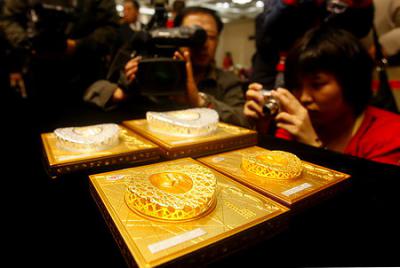 The
gold models and the silver models of the National Stadium, dubbed the "Bird’s
Nest," were unveiled in Beijing on October 24, 2007. The models are made of pure
gold and pure silver. There will be a limited number for sale. The commemorative
models are issued by China Gold Coin Incorporation and authorized by the Beijing
Organizing Committee. The
gold models and the silver models of the National Stadium, dubbed the "Bird’s
Nest," were unveiled in Beijing on October 24, 2007. The models are made of pure
gold and pure silver. There will be a limited number for sale. The commemorative
models are issued by China Gold Coin Incorporation and authorized by the Beijing
Organizing Committee.
Income growth of rural residents outstripped that of their
urban counterparts in China in the first nine months of this year, according to
official statistics. A survey of 68,000 rural households nationwide showed that
average cash income per person reached 3,321 yuan (442 U.S. dollars) for the
first three quarters of this year. After taking into account inflation, it rose
14.8 percent over the same period last year, the National Bureau of Statistics (NBS)
announced on Friday. The NBS also found that after sampling 59,000 urban
households, the per-capita disposable income of the country's urban residents
grew by 13.2 percent in real terms to 10,346 yuan over the first three quarters
of this year. This comes against a background of a widening gap between rich and
poor in China. Statistics released in September showed that the average annual
income of urban residents in 2006 was 3.28 times that of their rural
counterparts, up from 3.22 in 2005 and 3.21 in 2004. An NBS official said a wage
increase for non-farming jobs and price rises of farm products are major factors
fuelling income growth for rural residents. According to NBS figures, both the
per-capita wage income and the income from selling farm products for rural
residents rose around 20 percent in the first nine months. The country has been
increasing investment in rural areas to narrow the income gap between rural and
urban residents.
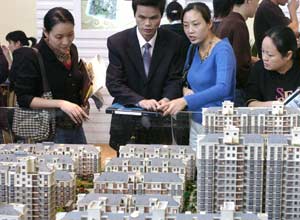 Housing prices in
70 large and medium-sized Chinese cities rose by 8.9 percent year-on-year in
September, the National Bureau of Statistics (NBS) said Friday. The rising trend
shows no sign of stopping, according to a report jointly released by the NBS and
the National Development and Reform Commission. Housing prices in
70 large and medium-sized Chinese cities rose by 8.9 percent year-on-year in
September, the National Bureau of Statistics (NBS) said Friday. The rising trend
shows no sign of stopping, according to a report jointly released by the NBS and
the National Development and Reform Commission.
PetroChina attracted about 3.3 trillion yuan in
subscriptions to its Shanghai initial public offering, a record for a domestic
IPO, a source familiar with the offering told Reuters on Friday.
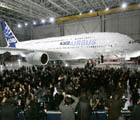 Heavy fog forced Airbus to cancel a
demonstration flight of its Airbus A380 over Beijing on Friday, as thousands of
passengers on regular air services were delayed. Heavy fog forced Airbus to cancel a
demonstration flight of its Airbus A380 over Beijing on Friday, as thousands of
passengers on regular air services were delayed.
October 27-28, 2007
 Hong Kong:
Foreign, HK staff see wages slide - Professionals from Hong Kong and overseas
working on the mainland have seen their wages slump as local workers become more
competitive, a survey by the Hong Kong Baptist University and Hong Kong People
Management Association has said. In the special administrative region (SAR),
however, salaries for professionals have continued to rise, increasing by 7.4
percent last year and 7.9 percent this year. Of the 85 companies surveyed in 10
mainland cities, 38 employed Hongkongers as managers, 26 as supervisors and
seven as general staff. Between the second half of 2006 and first half of this
year, managers' salaries fell 15.4 percent from 674,465 yuan ($90,000) to
570,841 yuan, while supervisors' wages were down 25.3 percent from 353,013 yuan
to 263,620 yuan. The average wage for general staff rose 25.7 percent over the
same period, from 211,225 yuan to 265,504 yuan. In the same period, the 183
overseas staff employed by 13 mainland companies also saw their salaries
decline. Managers took an average pay cut of 14.8 percent, from 1.05 million
yuan to 894,719 yuan, while supervisors saw their pay fall 25.5 percent, from
569,956 yuan to 424,656 yuan. Pauline Chung, vice-president of the Hong Kong
People Management Association, said the nation's rapid development had resulted
in improved manpower resources, which meant mainland firms were no longer so
reliant on Hong Kong and expatriate staff. "There are more overseas educated
mainlanders returning to the country. "They have good English skills and their
professional knowledge is on a par with Hong Kong people. Mainlanders have
received higher education and are quick to learn new things," she said. Hong Kong:
Foreign, HK staff see wages slide - Professionals from Hong Kong and overseas
working on the mainland have seen their wages slump as local workers become more
competitive, a survey by the Hong Kong Baptist University and Hong Kong People
Management Association has said. In the special administrative region (SAR),
however, salaries for professionals have continued to rise, increasing by 7.4
percent last year and 7.9 percent this year. Of the 85 companies surveyed in 10
mainland cities, 38 employed Hongkongers as managers, 26 as supervisors and
seven as general staff. Between the second half of 2006 and first half of this
year, managers' salaries fell 15.4 percent from 674,465 yuan ($90,000) to
570,841 yuan, while supervisors' wages were down 25.3 percent from 353,013 yuan
to 263,620 yuan. The average wage for general staff rose 25.7 percent over the
same period, from 211,225 yuan to 265,504 yuan. In the same period, the 183
overseas staff employed by 13 mainland companies also saw their salaries
decline. Managers took an average pay cut of 14.8 percent, from 1.05 million
yuan to 894,719 yuan, while supervisors saw their pay fall 25.5 percent, from
569,956 yuan to 424,656 yuan. Pauline Chung, vice-president of the Hong Kong
People Management Association, said the nation's rapid development had resulted
in improved manpower resources, which meant mainland firms were no longer so
reliant on Hong Kong and expatriate staff. "There are more overseas educated
mainlanders returning to the country. "They have good English skills and their
professional knowledge is on a par with Hong Kong people. Mainlanders have
received higher education and are quick to learn new things," she said.
Hong Kong's exports grew at a
faster-than- expected pace last month on increased trade with the mainland and
other Asian markets, which helped offset slowing demand in the United States.
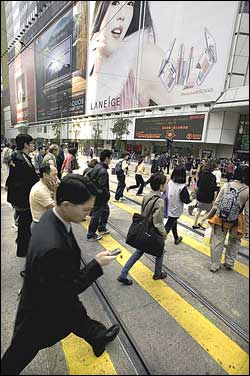 Next year promises
to be the best for wage earners in a decade - with salaries projected to go up
by an average of more than 4 percent. The increases, however, still lag those in
the mainland, where workers can expect pay rises of between 7.4 and 8.5 percent
next year as a result of rapid economic development, according to a joint survey
conducted by the Hong Kong People Management Association and Hong Kong Baptist
University. The survey, which was carried out between June 2006 and June this
year, interviewed 95 local small and medium-sized companies employing more than
66,000 people. Sixty-two percent of the firms had 300 employees or fewer, while
nearly 18 percent had between 300 and 1,000 workers, and 20 percent had more
than 1,000 employees. The companies included those engaged in the construction,
food and beverage, retail, and sales and marketing sectors. According to the
poll, Hong Kong workers stand to receive pay adjustments averaging 4.3 to 4.7
percent next year. This compares with increases of between 2.9 and 3.6 percent
from July 2006 to June this year, with the retail and sales sectors recording
the biggest increases of about 7 percent. Association president Felix Yip
yesterday urged employers to offer generous pay increments for staff in order to
retain talent. "Civil servants have already been given pay rises this year, so
the private sector has to follow suit," he said. Next year promises
to be the best for wage earners in a decade - with salaries projected to go up
by an average of more than 4 percent. The increases, however, still lag those in
the mainland, where workers can expect pay rises of between 7.4 and 8.5 percent
next year as a result of rapid economic development, according to a joint survey
conducted by the Hong Kong People Management Association and Hong Kong Baptist
University. The survey, which was carried out between June 2006 and June this
year, interviewed 95 local small and medium-sized companies employing more than
66,000 people. Sixty-two percent of the firms had 300 employees or fewer, while
nearly 18 percent had between 300 and 1,000 workers, and 20 percent had more
than 1,000 employees. The companies included those engaged in the construction,
food and beverage, retail, and sales and marketing sectors. According to the
poll, Hong Kong workers stand to receive pay adjustments averaging 4.3 to 4.7
percent next year. This compares with increases of between 2.9 and 3.6 percent
from July 2006 to June this year, with the retail and sales sectors recording
the biggest increases of about 7 percent. Association president Felix Yip
yesterday urged employers to offer generous pay increments for staff in order to
retain talent. "Civil servants have already been given pay rises this year, so
the private sector has to follow suit," he said.
Ang Lee's Lust, Caution cannot
qualify for the major categories at the Hong Kong Film Awards - a major honor in
Chinese-language cinema - because not enough Hong Kong residents worked on the
movie.
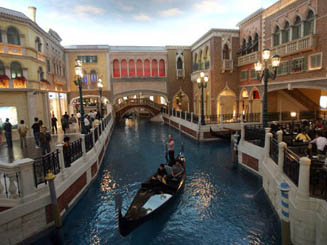 Casino and
resort developer Las Vegas Sands Corp has petitioned the Macau government to
lift a ban on the sale of serviced apartments at its Venetian Macao development
on the Cotai Strip. If it succeeds, it could trigger a flood of serviced
apartments on to the market. Under existing rules, land reclaimed in the Cotai
area is set aside for casino and hotel development - a policy aimed at
transforming Macau into the Las Vegas of Asia. Strata-title sales of apartments
in developments in the area are prohibited. If the United States entertainment
giant succeeds in persuading the Macau government to relax the rule and allow
such sales, an estimated 15,000 luxury serviced apartments in the Cotai Strip
could be put on the market over the next several years, according to agents.
Current proposals on the drawing boards of developers indicate plans to bring
about 30,000 hotel rooms to market in Cotai by 2010. But if the ban on the sale
of serviced apartments is lifted, some developers may decide to convert half of
those proposed hotel rooms into serviced apartments to cash in on the booming
residential market, agents say. Last month, units at One Grantai, the latest
luxury residential project launched by a local developer, at the northern end of
the Cotai Strip, were being sold for HK$8,700 per square foot, a record high in
Macau. Stephen Weaver, senior vice-president of Asian development at the
Venetian Macao, said the firm had proposed selling serviced apartments at its
US$2.4 billion resort to buyers who would only use them for short holiday
periods and rent them out when they were not there. Casino and
resort developer Las Vegas Sands Corp has petitioned the Macau government to
lift a ban on the sale of serviced apartments at its Venetian Macao development
on the Cotai Strip. If it succeeds, it could trigger a flood of serviced
apartments on to the market. Under existing rules, land reclaimed in the Cotai
area is set aside for casino and hotel development - a policy aimed at
transforming Macau into the Las Vegas of Asia. Strata-title sales of apartments
in developments in the area are prohibited. If the United States entertainment
giant succeeds in persuading the Macau government to relax the rule and allow
such sales, an estimated 15,000 luxury serviced apartments in the Cotai Strip
could be put on the market over the next several years, according to agents.
Current proposals on the drawing boards of developers indicate plans to bring
about 30,000 hotel rooms to market in Cotai by 2010. But if the ban on the sale
of serviced apartments is lifted, some developers may decide to convert half of
those proposed hotel rooms into serviced apartments to cash in on the booming
residential market, agents say. Last month, units at One Grantai, the latest
luxury residential project launched by a local developer, at the northern end of
the Cotai Strip, were being sold for HK$8,700 per square foot, a record high in
Macau. Stephen Weaver, senior vice-president of Asian development at the
Venetian Macao, said the firm had proposed selling serviced apartments at its
US$2.4 billion resort to buyers who would only use them for short holiday
periods and rent them out when they were not there.
Recent tax changes in Britain may bring smiles to the
faces of British expatriates in Hong Kong with homes in their mother country.
But Hong Kong residents living or working in Britain may be less pleased. The
Chancellor of the Exchequer, Alistair Darling, announced in his pre-budget
report on October 9 that capital gains tax (CGT) would be charged at a standard
rate of 18 per cent from April next year, with the upper and lower rates
abolished. British expatriates living and working abroad are charged capital
gains tax on the growth in value of their British home while they are overseas.
Under the old system, they might have paid as much as 40 per cent tax on the
rise in value if they were overseas for a short time, say one year while those
who lived abroad for 10 years or more would have paid at least 24 per cent. "For
returning expats who own UK property and have been away for a prolonged period,
the CGT changes will be beneficial," said Lucian Cook, director of research at
estate agents Savills. However, expatriates who run their British property as a
business by letting it out as a holiday home would be worse off, because they
would no longer pay capital gains tax at the lower rate of 10 per cent, said
Robert Bartlett, chief executive of estate agency Chesterton Global. Hong Kong
investors who own British property are not liable to capital gains tax, so Mr
Darling's reform does not affect them. However, Hong Kong and other overseas
non-domicile residents living in Britain must pay a new levy from April next
year - a flat rate charge of £30,000 (HK$475,000) per year if they live there
for seven years.
 China:
China is likely to allow financial institutions to invest individual pension
funds in more fields with market risks, including securities fund products, in a
bid to increase their value, a Ministry of Labour and Social Security (MLSS)
official has revealed.
China:
China is likely to allow financial institutions to invest individual pension
funds in more fields with market risks, including securities fund products, in a
bid to increase their value, a Ministry of Labour and Social Security (MLSS)
official has revealed.
China had destroyed 667 tons of
unqualified or fake food products and ordered 446 tons to be removed from the
market by October 8 in a nationwide campaign to improve the quality of goods and
food safety, according to official statistics.
The Industrial and Commercial Bank of China will spend
US$5.46 billion to take a 20 percent stake in Standard Bank Group Ltd, Africa's
largest bank.
PetroChina (0857), which is poised
to list in Shanghai on November 5, said yesterday it may spend 102 billion yuan
(HK$105.5 billion) to build the second west-to-east gas pipeline in the country.
China's foreign minister offered
tepid support yesterday for India's bid for a permanent UN Security Council
seat, following talks aimed at boosting ties between the Asian giants and
sometime rivals.
Foshan remains the Pearl River Delta's most polluted city,
the latest regional air monitoring report shows. Pollution levels there and in
Dongguan and Guangzhou often exceed national air quality standards, the
half-yearly figures show. The figures come from a network of 16 stations
monitoring levels of sulfur dioxide, ozone, nitrogen oxides and respirable
suspended particulates (RSPs). They show Tsuen Wan in the New Territories had
the third-worst record on nitrogen oxides, after Foshan and Guangdong, with
levels exceeding the national standard on six days in the first half of the
year. Foshan's air breached the standard on 10 days and Guangzhou's on 15.
Foshan's RSPs breached the standard on 57 days and its sulfur dioxide level was
excessive on 46. The city is a centre of the ceramics industry. The two
governments set up the regional air-quality monitoring network in 2005. Foshan
has consistently had the worst pollution. Hong Kong's Environmental Protection
Department said the report showed cities on the coast had better air quality
than those inland. A spokesman noted that concentrations of most pollutants were
generally higher between October and March than in the summer, because rainfall
was lower in winter and the southern monsoon disperses pollutants in the summer.
Asked about the impact of Foshan's pollution on Hong Kong, the spokesman said
the Pearl River Delta affected the city in general. "Hong Kong is cleaner
because there are not many factories here. Yet the Pearl River Delta is the
world's factory and many industries moved from here," he said. A report by
think-tank Civic Exchange recently found Hong Kong was the largest source of
outside investment in Guangdong, accounting for more than 53,000 factories.
Alexis Lau Kai-hon, an atmospheric scientist at the Hong Kong University of
Science and Technology, said Foshan should not be singled out. "Other cities
like Guangzhou and Dongguan are facing similar pollution. The government should
keep up efforts to curb pollution in the whole region," he said. Friends of the
Earth environmental affairs manager Hahn Chu Hon-keung said the monitoring
network should be expanded.
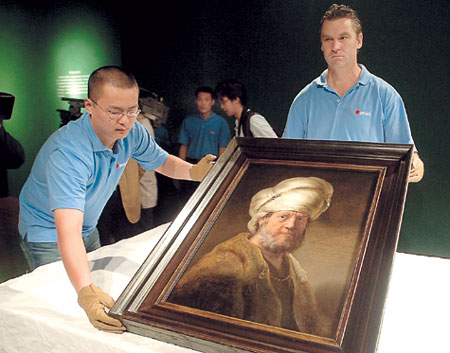 Workers unpack a
Rembrandt self-portrait from the Rijksmuseum in Amsterdam at the Shanghai Museum
yesterday. A three-month exhibition "Rembrandt and the Golden Age" will open the
museum from November 3. Workers unpack a
Rembrandt self-portrait from the Rijksmuseum in Amsterdam at the Shanghai Museum
yesterday. A three-month exhibition "Rembrandt and the Golden Age" will open the
museum from November 3.
October 26, 2007
 Hong Kong:
Sony's youth entertainment channel Animax is launching mobile version in Hong
Kong and Taiwan. At launch, Animax Mobile will deliver four popular Japanese
anime series in their full-length English dubbed versions, plus bite-sized
versions, in short clips of five to seven minutes. Titles include the
award-winning "Gankutsuou: The Count of Monte Cristo," "Blood+," "R.O.D. the TV"
and "The Last Exile." Service was launched earlier this year in Canada and
Australia. Hong Kong telco SmarTone will be the first to run the new service in
3G. "Animax enjoys great distribution in both Hong Kong and Taiwan and this
expansion to mobile not only builds on the brand loyalty, it gives users an
additional source in which they can enjoy their favourite anime series, whenever
they want, wherever they want,” Ricky Ow, GM SPE Networks, Asia, said. Hong Kong:
Sony's youth entertainment channel Animax is launching mobile version in Hong
Kong and Taiwan. At launch, Animax Mobile will deliver four popular Japanese
anime series in their full-length English dubbed versions, plus bite-sized
versions, in short clips of five to seven minutes. Titles include the
award-winning "Gankutsuou: The Count of Monte Cristo," "Blood+," "R.O.D. the TV"
and "The Last Exile." Service was launched earlier this year in Canada and
Australia. Hong Kong telco SmarTone will be the first to run the new service in
3G. "Animax enjoys great distribution in both Hong Kong and Taiwan and this
expansion to mobile not only builds on the brand loyalty, it gives users an
additional source in which they can enjoy their favourite anime series, whenever
they want, wherever they want,” Ricky Ow, GM SPE Networks, Asia, said.
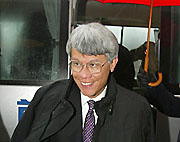 Hong Kong monetary chief warns of uncertainties ahead - Hong Kong Monetary
Authority Chief Executive Joseph Yam said Thursday there were currently a lot of
uncertainties or even risks ahead in spite of impressive performance of the
global financial markets lately. "Investors should remain alert," Yam, who has
been heading the Monetary Authority -- virtually the special administrative
region's central bank -- since its establishment in 1993, wrote in a latest
article published on the institution's official website. The economic and
financial outlook for China's mainland and the United States stood out among the
uncertainties confronting "our economy and financial markets," he said. He said
the possibility of a recession in the United States could not be ruled out as
the American sub-prime crisis persists and tight credit conditions were
threatening to slow down the U.S. economy and lead to further downward pressure
on property prices. Yam noted the plans to encourage the orderly outflow of
capital from China's mainland had yet to be implemented while domestic savings
continued to accumulate. "The imbalance in the supply of and demand for
financial instruments other than bank deposits persists, leading to prices being
much higher than would otherwise be the case, and causing concerns about the
possibility of a stock market bubble," he said. The macro monetary conditions in
the mainland were causing considerable concerns and it was not clear how this
scenario might develop, he said, adding that the inevitable market adjustment,
if sharp and destabilizing, would have serious implications for monetary and
financial stability, for the mainland as well as Hong Kong. Yam said
developments in both the United States and China's mainland in the next few
months would be crucial. In the U.S. there was hope that normal money-market
conditions return shortly, limiting adverse impact on the economy and the
housing market there. "On the mainland there is hope for more concerted and
effective macro-economic adjustment measures. But there are structural issues in
the financial system that will need to be addressed to make it conducive to
promoting sustainable economic expansion." "Against this complex background we
in Hong Kong have to be cautious about our short-term economic prospects despite
the different and bullish signals our financial markets are sending us. Perhaps
there are factors that I have failed to see. Irrational exuberance or not,
investors should act with caution," he said.
Hong Kong monetary chief warns of uncertainties ahead - Hong Kong Monetary
Authority Chief Executive Joseph Yam said Thursday there were currently a lot of
uncertainties or even risks ahead in spite of impressive performance of the
global financial markets lately. "Investors should remain alert," Yam, who has
been heading the Monetary Authority -- virtually the special administrative
region's central bank -- since its establishment in 1993, wrote in a latest
article published on the institution's official website. The economic and
financial outlook for China's mainland and the United States stood out among the
uncertainties confronting "our economy and financial markets," he said. He said
the possibility of a recession in the United States could not be ruled out as
the American sub-prime crisis persists and tight credit conditions were
threatening to slow down the U.S. economy and lead to further downward pressure
on property prices. Yam noted the plans to encourage the orderly outflow of
capital from China's mainland had yet to be implemented while domestic savings
continued to accumulate. "The imbalance in the supply of and demand for
financial instruments other than bank deposits persists, leading to prices being
much higher than would otherwise be the case, and causing concerns about the
possibility of a stock market bubble," he said. The macro monetary conditions in
the mainland were causing considerable concerns and it was not clear how this
scenario might develop, he said, adding that the inevitable market adjustment,
if sharp and destabilizing, would have serious implications for monetary and
financial stability, for the mainland as well as Hong Kong. Yam said
developments in both the United States and China's mainland in the next few
months would be crucial. In the U.S. there was hope that normal money-market
conditions return shortly, limiting adverse impact on the economy and the
housing market there. "On the mainland there is hope for more concerted and
effective macro-economic adjustment measures. But there are structural issues in
the financial system that will need to be addressed to make it conducive to
promoting sustainable economic expansion." "Against this complex background we
in Hong Kong have to be cautious about our short-term economic prospects despite
the different and bullish signals our financial markets are sending us. Perhaps
there are factors that I have failed to see. Irrational exuberance or not,
investors should act with caution," he said.
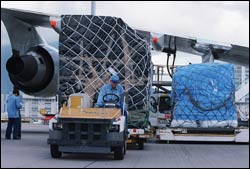 Hong Kong airport still world's premier
air cargo handler - Cargo throughput at Hong Kong International Airport in 2006
hit 3.58 million tons, representing an increase of 1.51 million tons, or 72.95
percent, compared with 2001, according to government statistics. "Hong Kong
retains air cargo handling crown," Hong Kong's Information Service Department
said on its website, citing statistics from the October issue of the Hong Kong
Monthly Digest of Statistics published by the Census and Statistics Department.
The Hong Kong special administrative region government attributed the growth to
a rise in outward air cargo, which surged1.1 million tons to 2.28 million tons,
while inward air cargo grew by 406,000 tons to 1.3 million tons in the same
five-year period. Hong Kong airport still world's premier
air cargo handler - Cargo throughput at Hong Kong International Airport in 2006
hit 3.58 million tons, representing an increase of 1.51 million tons, or 72.95
percent, compared with 2001, according to government statistics. "Hong Kong
retains air cargo handling crown," Hong Kong's Information Service Department
said on its website, citing statistics from the October issue of the Hong Kong
Monthly Digest of Statistics published by the Census and Statistics Department.
The Hong Kong special administrative region government attributed the growth to
a rise in outward air cargo, which surged1.1 million tons to 2.28 million tons,
while inward air cargo grew by 406,000 tons to 1.3 million tons in the same
five-year period.
 The tourists' heaven
of Suzhou in eastern China turned into a heaven for star-chasers Wednesday
night, as big names from the country's entertainment circle gathered there to
raise the curtain for China's top film gala. The tourists' heaven
of Suzhou in eastern China turned into a heaven for star-chasers Wednesday
night, as big names from the country's entertainment circle gathered there to
raise the curtain for China's top film gala.
 Many women want to
become slimmer, even though they are already slim. They resort to various
methods and eating less is normally the first choice. They believe that since
fat is not good for you, it's better to not eat as much. But that can have an
opposite effect. To know why, ask yourself seven questions. Which meal do you
eat less? Do you eat less for one meal but a lot more for the other? Many women want to
become slimmer, even though they are already slim. They resort to various
methods and eating less is normally the first choice. They believe that since
fat is not good for you, it's better to not eat as much. But that can have an
opposite effect. To know why, ask yourself seven questions. Which meal do you
eat less? Do you eat less for one meal but a lot more for the other?
Hong Kong Securities and Futures
Commission chairman Eddy Fong Ching said yesterday the market watchdog aims to
further strengthen cooperation next year with financial regulatory organizations
in the mainland to address issues related to dual-listed companies including
disclosure and suspensions.
 China:
PetroChina, the nation's largest oil producer, has set the price range of its
A-share Initial Public Offering (IPO) at 15 to 16.7 yuan per share, the company
announced on Wednesday.
China:
PetroChina, the nation's largest oil producer, has set the price range of its
A-share Initial Public Offering (IPO) at 15 to 16.7 yuan per share, the company
announced on Wednesday.
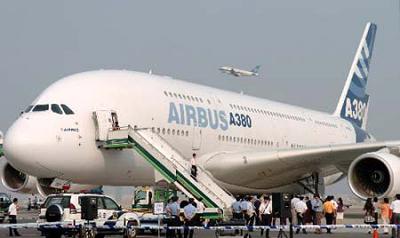 An Airbus A380 superjumbo jet stops on the tarmac at the Baiyun airport in
Guangzhou, capital of south China’s Guangdong Province, Oct. 23, 2007. An Airbus
A380 jet plane arrived in Guangzhou Tuesday to start a week-long tour exhibition
in Guangzhou, Shanghai and Beijing.
An Airbus A380 superjumbo jet stops on the tarmac at the Baiyun airport in
Guangzhou, capital of south China’s Guangdong Province, Oct. 23, 2007. An Airbus
A380 jet plane arrived in Guangzhou Tuesday to start a week-long tour exhibition
in Guangzhou, Shanghai and Beijing.
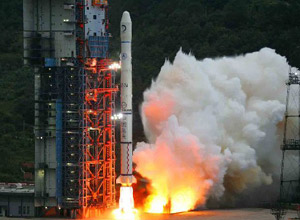 China's 1st lunar probe
Chang'e-1 completed its 1st orbital transfer Thursday afternoon. It is expected
to enter Earth-moon transfer orbit on Oct. 31 and arrive in the moon's orbit
Nov. 5. China's 1st lunar probe
Chang'e-1 completed its 1st orbital transfer Thursday afternoon. It is expected
to enter Earth-moon transfer orbit on Oct. 31 and arrive in the moon's orbit
Nov. 5.
Chinese and U.S. tourism officials kicked off their
first-ever dialogue meeting on Wednesday in Charlotte, North Carolina, to
explore ways of increasing cooperation on travel-related matters. Chinese
tourism officials, including those from different provinces, municipalities and
autonomous regions, and dozens of U.S. state tourism directors are expected to
ink the Initiative on Establishment of China-U.S. Strategic Cooperation
Framework in Tourism during their two-day meeting. Tourism cooperation and
exchanges between China and the United States have maintained the good momentum
of development in recent years, and the travel industries of both countries are
achieving win-win results, Du Jiang, vice chairman of the China National Tourism
Administration (CNTA), told the opening of the meeting, or the China-U.S.
Tourism Directors Summit. Du, heading the Chinese delegation, said bilateral
cooperation and exchanges in tourism will reach a new height. Du said the CNTA
is working with the U.S. Commerce Department and Homeland Security Department to
jointly explore new grounds for cooperation in the tourism industry. "We can
learn a lot from each other," said Roger J. Dow, president and CEO of the
Washington-based Travel Industry Association (TIA), co-sponsor of the
conference. "During the next 10 years, the amount of travelers from both
countries is expected to grow significantly. It makes sense that we explore ways
to encourage travel to our respective countries," Dow said.
The Chinese economy continued its robust growth, driven by
rapid expansion in investment, retail sales and exports, while inflation
pressure eased slightly.
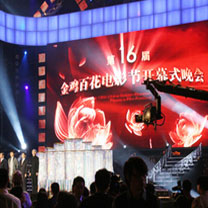 The
pageantry of the 16th Golden Rooster and Full Blossom Film Festival in Suzhou,
East China's Jiangsu Province October 24, 2007. Well-known actors and actresses
including Jackie Chan, Carina Lau and Huang Xiaoming were present at the
festival. The
pageantry of the 16th Golden Rooster and Full Blossom Film Festival in Suzhou,
East China's Jiangsu Province October 24, 2007. Well-known actors and actresses
including Jackie Chan, Carina Lau and Huang Xiaoming were present at the
festival.
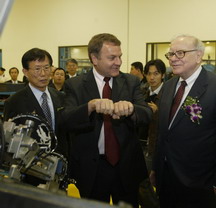 Billionaire
Warren Buffett (right) visits a subsidiary of his fund firm in Dalian.
He cautioned investors against risks as China.
stocks surged this year. Billionaire
Warren Buffett (right) visits a subsidiary of his fund firm in Dalian.
He cautioned investors against risks as China.
stocks surged this year.
 Gurus place China
bets - As the mainland market continues its bull run, two heavyweights in the
world of investing have expressed contrasting views about where they may unlock
potential value in the country. Commodities guru Jim Rogers declared yesterday
he is pulling out of all his US dollar assets and buying the yuan. Billionaire
Warren Buffett, meanwhile, warned of overstretched valuations of mainland stocks
- and urged investors not to lose their shirts. Rogers, who has consistently
been bearish on the US dollar, said the yuan is the best currency to buy,
predicting the value of the currency to quadruple in the next decade. "I don't
see how one can really lose on the [yuan] in the next decade or so. It's gotta
go. It's gotta triple. It's gotta quadruple," he was quoted by Bloomberg as
saying during a presentation in Amsterdam late yesterday. The yuan yesterday
broke through the psychologically important level of 7.5 to the greenback for
the first time. It closed at 7.4926, up from Tuesday's close of 7.5047.
Reiterating his bearish view on the US dollar, Rogers said the value of the
greenback will further erode. "I am in the process of - I hope in the next few
months - getting all of my assets out of US dollars. "I am that pessimistic
about what's happening in the US," said the chairman of Beeland Interests and
former partner of George Soros. The US dollar has fallen against major
currencies as concern mounts over economic growth in the United States, while
last month's 50-basis point interest rate cut has prompted investors to dump US
dollar assets. Meanwhile, billionaire Buffett said although the fundamentals of
the mainland economy remains positive, investors should be "cautious about
mainland stocks as the market is too hot. But last week, after his investment
vehicle offloaded shares in PetroChina (0857), he noted it was "too soon to have
sold the entire stake as the shares had risen since. "We never buy stocks when
we see prices soaring, Buffett told Bloomberg in Dalian, where he was visiting a
subsidiary of a company held through Berkshire Hathaway. "We buy stocks because
we're confident of the company's growth. People should be cautious when they see
prices rising." The world's second wealthiest man said he was looking elsewhere
in Asia to buy large businesses that he understands, but that he was doubtful of
finding a good buy in the mainland now that the benchmark index has more than
doubled this year. "If you understand a business and buy at a reasonable price,
there's no risk.We've never realized a loss because we understand the businesses
that we buy in," he said. He denied media reports that Berkshire will invest in
China Life Insurance (2628). The CSI 300 index, which tracks major
mainland-listed stocks, has jumped more than 170 percent this year. It gained
0.87 percent to close at 5,588.01 yesterday. The Shanghai Composite Index rose
1.21 percent to 5,843.11. Meanwhile, Buffett, 77, said he was "appreciative of
the performance of PetroChina." Gurus place China
bets - As the mainland market continues its bull run, two heavyweights in the
world of investing have expressed contrasting views about where they may unlock
potential value in the country. Commodities guru Jim Rogers declared yesterday
he is pulling out of all his US dollar assets and buying the yuan. Billionaire
Warren Buffett, meanwhile, warned of overstretched valuations of mainland stocks
- and urged investors not to lose their shirts. Rogers, who has consistently
been bearish on the US dollar, said the yuan is the best currency to buy,
predicting the value of the currency to quadruple in the next decade. "I don't
see how one can really lose on the [yuan] in the next decade or so. It's gotta
go. It's gotta triple. It's gotta quadruple," he was quoted by Bloomberg as
saying during a presentation in Amsterdam late yesterday. The yuan yesterday
broke through the psychologically important level of 7.5 to the greenback for
the first time. It closed at 7.4926, up from Tuesday's close of 7.5047.
Reiterating his bearish view on the US dollar, Rogers said the value of the
greenback will further erode. "I am in the process of - I hope in the next few
months - getting all of my assets out of US dollars. "I am that pessimistic
about what's happening in the US," said the chairman of Beeland Interests and
former partner of George Soros. The US dollar has fallen against major
currencies as concern mounts over economic growth in the United States, while
last month's 50-basis point interest rate cut has prompted investors to dump US
dollar assets. Meanwhile, billionaire Buffett said although the fundamentals of
the mainland economy remains positive, investors should be "cautious about
mainland stocks as the market is too hot. But last week, after his investment
vehicle offloaded shares in PetroChina (0857), he noted it was "too soon to have
sold the entire stake as the shares had risen since. "We never buy stocks when
we see prices soaring, Buffett told Bloomberg in Dalian, where he was visiting a
subsidiary of a company held through Berkshire Hathaway. "We buy stocks because
we're confident of the company's growth. People should be cautious when they see
prices rising." The world's second wealthiest man said he was looking elsewhere
in Asia to buy large businesses that he understands, but that he was doubtful of
finding a good buy in the mainland now that the benchmark index has more than
doubled this year. "If you understand a business and buy at a reasonable price,
there's no risk.We've never realized a loss because we understand the businesses
that we buy in," he said. He denied media reports that Berkshire will invest in
China Life Insurance (2628). The CSI 300 index, which tracks major
mainland-listed stocks, has jumped more than 170 percent this year. It gained
0.87 percent to close at 5,588.01 yesterday. The Shanghai Composite Index rose
1.21 percent to 5,843.11. Meanwhile, Buffett, 77, said he was "appreciative of
the performance of PetroChina."
October 25, 2007
 Hong Kong:
The retirement of Zeng Qinghong,
China's top official for Hong Kong affairs, is unlikely to change Beijing's
policies toward the city, no matter who replaces him from the new leadership
line-up, observers said yesterday. Hong Kong:
The retirement of Zeng Qinghong,
China's top official for Hong Kong affairs, is unlikely to change Beijing's
policies toward the city, no matter who replaces him from the new leadership
line-up, observers said yesterday.
Lim Goh Tong, Malaysia's
third-richest man, died yesterday, leaving behind a diverse business empire
worth US$22 billion (HK$171.6 billion). He was 90.
Apparel giant Esprit Holdings
(0330) said it plans to spend up to US$1 billion (HK$7.8 billion) to acquire a
US or European fashion company and is already having "intense discussions" with
several European firms.
Shun Tak Holdings (0242), which
operates jetfoil services between Hong Kong and Macau, has pledged to step up
frequency to meet rising patronage demands between the two cities.
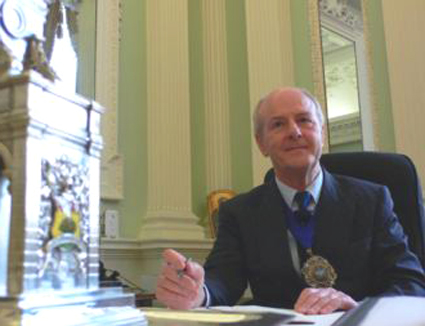 London’s lord mayor
blasts US regulators - City chief praises risk-focused British, HK system over
America’s rule-based controls - The head of London’s financial centre criticized
United States financial regulators during a visit to Hong Kong on Wednesday,
saying their reliance on rules had blinded them to the risks of subprime
lending. John Stuttard, Lord Mayor of the City of London, said US regulators had
failed to stop the subprime mortgage crisis from worsening because American
banks had been allowed to wrongly assess the risk of lending to people who were
unable to pay back loans. “The banks in question did not assess the risks
properly,” Mr Stuttard told a briefing. “If you’re lending to someone with no
income, no job and no assets, this is high risk. And yet this was not being
properly controlled.” He said the US system had run into trouble because it was
based on rules. By contrast, the British and Hong Kong systems, which he
described as the best in the world, focused on risk, helping companies to manage
and assess it. “This is the problem with New York at the moment. Unfortunately
they’ve got themselves into a tangle. Their regulator environment is heavily
influenced by lawyers. They have a lot of class actions.” Mr Stuttard said a
global financial system based on risk - rather than rules - would remove the
kind of systemic risk that produced the subprime crisis, a factor thought likely
to lead to a slowdown in world economic growth. “If we can work together to try
and find the right regulatory framework, then the global finance houses around
the world will succeed and there will not be systemic risk.” Mr Stuttard, whose
trip to Asia also included stops in Beijing, Shanghai and Seoul, also said US
regulators had scored an own-goal with the Sarbanes Oxley Act, introduced in
2002 after scandals such as the collapse of Enron. “The Sarbanes-Oxley
legislation has been a real deterrent for foreign companies and even American
companies listing on the [New York Stock Exchange] and on Nasdaq,” said Mr
Stuttard. “It’s difficult for them to get out of this situation which they now
find themselves in. “New York’s listing process is very long and stringent and
burdensome. Sarbanes Oxley introduced a tremendous plethora of requirements that
listed companies have to comply with.” London’s lord mayor
blasts US regulators - City chief praises risk-focused British, HK system over
America’s rule-based controls - The head of London’s financial centre criticized
United States financial regulators during a visit to Hong Kong on Wednesday,
saying their reliance on rules had blinded them to the risks of subprime
lending. John Stuttard, Lord Mayor of the City of London, said US regulators had
failed to stop the subprime mortgage crisis from worsening because American
banks had been allowed to wrongly assess the risk of lending to people who were
unable to pay back loans. “The banks in question did not assess the risks
properly,” Mr Stuttard told a briefing. “If you’re lending to someone with no
income, no job and no assets, this is high risk. And yet this was not being
properly controlled.” He said the US system had run into trouble because it was
based on rules. By contrast, the British and Hong Kong systems, which he
described as the best in the world, focused on risk, helping companies to manage
and assess it. “This is the problem with New York at the moment. Unfortunately
they’ve got themselves into a tangle. Their regulator environment is heavily
influenced by lawyers. They have a lot of class actions.” Mr Stuttard said a
global financial system based on risk - rather than rules - would remove the
kind of systemic risk that produced the subprime crisis, a factor thought likely
to lead to a slowdown in world economic growth. “If we can work together to try
and find the right regulatory framework, then the global finance houses around
the world will succeed and there will not be systemic risk.” Mr Stuttard, whose
trip to Asia also included stops in Beijing, Shanghai and Seoul, also said US
regulators had scored an own-goal with the Sarbanes Oxley Act, introduced in
2002 after scandals such as the collapse of Enron. “The Sarbanes-Oxley
legislation has been a real deterrent for foreign companies and even American
companies listing on the [New York Stock Exchange] and on Nasdaq,” said Mr
Stuttard. “It’s difficult for them to get out of this situation which they now
find themselves in. “New York’s listing process is very long and stringent and
burdensome. Sarbanes Oxley introduced a tremendous plethora of requirements that
listed companies have to comply with.”
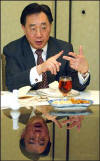 High workloads drive top hotel managers back from Macau - Poor working
conditions and heavy work pressure have encouraged senior Hong Kong hotel
management personnel, who were lured to Macau with attractive pay packages at
the start of the hotel and casino boom there, to return to the territory.
According to the Federation of Hong Kong Hotel Owners, up to 40 percent of these
executives - mostly from four- or five-star hotels who were hired to train hotel
employees in the former Portuguese enclave - are now back here. The backflow has
put a further strain on Macau's hunt for experienced hotel personnel as the
casino boom continues. Most of the executives left Hong Kong hoping to cash in
on the boom in Macau, which began shortly after casino magnate Stanley Ho
Hung-sun's empire lost its gaming monopoly in 2002 and triggered an invasion by
world-renowned casino operators such as Las Vegas Sands, Wynn Resort and
Malaysia's Genting Group. "When the exodus from Hong Kong began around 2004, it
was estimated that about 1,000 senior management executives from leading local
hotels had left. Now, between 30 and 40 percent of them have returned,"
federation deputy chairman Clarence Shun Wah said yesterday. "Despite the
attractive salaries offered, many of them found it hard to cope with the
extremely heavy workload and some were forced to quit after being on the job for
only a few months, while others resigned despite having signed long-term
contracts with their employers," he said. Shun Wah said Macau is now facing an
acute shortage of qualified hotel workers to cope with the growing number of
hotel rooms available. He said the main grievances of the Hong Kong
professionals are that they have to put up with long working hours and extreme
work pressure in Macau and, although their salaries are high - usually double
that of what they earned in Hong Kong - they have to pay for their own
accommodation. Michael Li Hon-sing, executive director of the federation, said
the rate of wastage of hotel workers in Hong Kong has doubled in the past year.
According to Shun Wah, the cost of hotel operations has risen by more 5 percent
since last year as they fight to retain workers with better pay and work
conditions. Hotel owners said they are highly aware of the threat from Macau,
but Hong Kong's quality of services and infrastructure remain far superior to
those of Macau. "Macau hotels are hiring people from everywhere," Shun Wah said.
"If you walk into a hotel, you don't know whether you should speak to the
workers in Cantonese, English or Mandarin." He said guests were sometimes unable
to check in at some of the top hotels after 4pm because there are just not
enough people to make up and clean a room which normally takes about 90 minutes.
Commenting on a proposal by Hong Kong Tourism Board chairman James Tien Pei-chun
to conduct courses for hotel professionals in Guangdong for Hong Kong and Macau,
the federation said this could be a problem as the demand for qualified hotel
personnel in the mainland itself is high. "Importing mainland talent is also not
a simple task," Chan Shuk-fong, federation assistant executive director, said.
"Our hotels have a lot of quotas left for the Quality Migrant Admission Scheme,"
he said. "The screening process is just too tight for them." Some Hong Kong
tertiary institutions, such as the Hong Kong Polytechnic University, offer
programs in hotel management, but Chan said they need to be more practical
rather than research intensive. Shun Wah said hotel industry workers need to
start with frontline duties and work their way up, but many graduates would
prefer to work in the marketing or sales departments, or decline to enter the
trade.
High workloads drive top hotel managers back from Macau - Poor working
conditions and heavy work pressure have encouraged senior Hong Kong hotel
management personnel, who were lured to Macau with attractive pay packages at
the start of the hotel and casino boom there, to return to the territory.
According to the Federation of Hong Kong Hotel Owners, up to 40 percent of these
executives - mostly from four- or five-star hotels who were hired to train hotel
employees in the former Portuguese enclave - are now back here. The backflow has
put a further strain on Macau's hunt for experienced hotel personnel as the
casino boom continues. Most of the executives left Hong Kong hoping to cash in
on the boom in Macau, which began shortly after casino magnate Stanley Ho
Hung-sun's empire lost its gaming monopoly in 2002 and triggered an invasion by
world-renowned casino operators such as Las Vegas Sands, Wynn Resort and
Malaysia's Genting Group. "When the exodus from Hong Kong began around 2004, it
was estimated that about 1,000 senior management executives from leading local
hotels had left. Now, between 30 and 40 percent of them have returned,"
federation deputy chairman Clarence Shun Wah said yesterday. "Despite the
attractive salaries offered, many of them found it hard to cope with the
extremely heavy workload and some were forced to quit after being on the job for
only a few months, while others resigned despite having signed long-term
contracts with their employers," he said. Shun Wah said Macau is now facing an
acute shortage of qualified hotel workers to cope with the growing number of
hotel rooms available. He said the main grievances of the Hong Kong
professionals are that they have to put up with long working hours and extreme
work pressure in Macau and, although their salaries are high - usually double
that of what they earned in Hong Kong - they have to pay for their own
accommodation. Michael Li Hon-sing, executive director of the federation, said
the rate of wastage of hotel workers in Hong Kong has doubled in the past year.
According to Shun Wah, the cost of hotel operations has risen by more 5 percent
since last year as they fight to retain workers with better pay and work
conditions. Hotel owners said they are highly aware of the threat from Macau,
but Hong Kong's quality of services and infrastructure remain far superior to
those of Macau. "Macau hotels are hiring people from everywhere," Shun Wah said.
"If you walk into a hotel, you don't know whether you should speak to the
workers in Cantonese, English or Mandarin." He said guests were sometimes unable
to check in at some of the top hotels after 4pm because there are just not
enough people to make up and clean a room which normally takes about 90 minutes.
Commenting on a proposal by Hong Kong Tourism Board chairman James Tien Pei-chun
to conduct courses for hotel professionals in Guangdong for Hong Kong and Macau,
the federation said this could be a problem as the demand for qualified hotel
personnel in the mainland itself is high. "Importing mainland talent is also not
a simple task," Chan Shuk-fong, federation assistant executive director, said.
"Our hotels have a lot of quotas left for the Quality Migrant Admission Scheme,"
he said. "The screening process is just too tight for them." Some Hong Kong
tertiary institutions, such as the Hong Kong Polytechnic University, offer
programs in hotel management, but Chan said they need to be more practical
rather than research intensive. Shun Wah said hotel industry workers need to
start with frontline duties and work their way up, but many graduates would
prefer to work in the marketing or sales departments, or decline to enter the
trade.
Hotels want to know what happens to
most of the students who graduate from hotel management and hospitality courses
- because they are not working in the industry in Hong Kong. "The problem is
that, of all the students graduating in hotel studies each year, less than 20
per cent enter the industry," said Michael Li Hon-shing, executive director of
the Federation of Hong Kong Hotel Owners. Courses need to include more practical
training to encourage graduates to go into the industry, he said. The federation
will soon begin a study which aims to shed light on the staffing needs of
hotels, amid fears the city's hospitality industry faces a shortage of talent.
Between 4,000 and 5,000 people a year complete part-time and full-time
Vocational Training Council hospitality courses, and Polytechnic University's
school of hotel and tourism management has 539 graduates this year. Other
universities and various institutes offer similar courses. Mr Li said many
graduates from these courses opt to work in finance or the government or seek
job opportunities outside Hong Kong instead of investing long-term in a career
in hotel management. Fresh graduates have to start from the bottom and work
their way up, something many people are unwilling to do when they can climb the
career ladder faster in other industries, he said. Luk Kwok Hotel general
manager James Li said annual staff turnover at the Wan Chai hotel had doubled
this year to 20 per cent. The federation is backing a plan for a cross-harbour
shuttle service for hotel guests between Tsim Sha Tsui and the convention centre
in Wan Chai in answer to criticism that there are too few five-star hotel rooms
on Hong Kong Island. Mr Li said that, despite the criticism, the city's
five-star hotels had enjoyed occupancy rates of 90 per cent or more on 30 days
so far this year, compared with 40 days in the whole of last year.
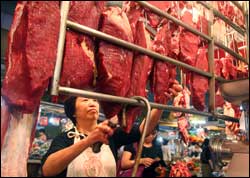 The price of beef in wet markets will cost
more after the sole supplier of mainland cattle Ng Fung Hong decided to raise
its wholesale price tag by 10 percent. One retailer said the move means he will
have to put his prices up by more than 15 percent to HK$56 a catty. The supplier
said the increase was agreed after a meeting with beef trade representatives
yesterday. "It's necessary to adjust prices to ensure a stable supply to Hong
Kong in response to the surging price of live cattle in the mainland," Ng Fung
Hong said in a statement. The supplier, a unit of China Resources Enterprise,
increased prices by the same amount in August after the central government said
the price of cattle had jumped more than 40 percent this year because of
shortages. Hong Kong Beef and Mutton Merchants' Association director Chung
Siu-kai said the wholesale price rise will be transferred to customers. He said
the live cattle supply yesterday covered only 90 percent of local demand. Chung
said he was worried the price increase will affect sales. The price of beef in wet markets will cost
more after the sole supplier of mainland cattle Ng Fung Hong decided to raise
its wholesale price tag by 10 percent. One retailer said the move means he will
have to put his prices up by more than 15 percent to HK$56 a catty. The supplier
said the increase was agreed after a meeting with beef trade representatives
yesterday. "It's necessary to adjust prices to ensure a stable supply to Hong
Kong in response to the surging price of live cattle in the mainland," Ng Fung
Hong said in a statement. The supplier, a unit of China Resources Enterprise,
increased prices by the same amount in August after the central government said
the price of cattle had jumped more than 40 percent this year because of
shortages. Hong Kong Beef and Mutton Merchants' Association director Chung
Siu-kai said the wholesale price rise will be transferred to customers. He said
the live cattle supply yesterday covered only 90 percent of local demand. Chung
said he was worried the price increase will affect sales.
The Hong Kong Monetary Authority
intervened in the market yesterday for the first time since May 2005 to increase
liquidity and curb the Hong Kong dollar's strength. For the first time in more
than two years, the Hong Kong Monetary Authority intervened in the foreign
exchange market as strong demand fuelled by a buoyant equity market continued to
push up the Hong Kong dollar and interbank rates.
PCCW (0008) will introduce its Now
TV platform for broadband television to the Taiwan market by the end of this
year through a tie-up with Chunghwa Telecom, according to an industry source.
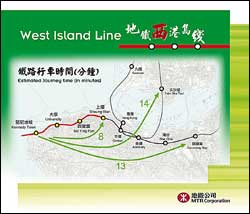  The
Mass Transit Railway's long- awaited West Island Line is to get an unprecedented
HK$6 billion (US$800 million) injection by the government - or two-thirds of the
cost of the project that will link Sheung Wan with Kennedy Town by 2016. The
cash subsidy for the profit- making company to proceed with the HK$8.9 billion
line is the first of its kind by the administration which, in the past, has
relied on granting property development rights to bridge funding gaps in railway
projects. Secretary for Transport and Housing Eva Cheng Yu-wah said yesterday
the project will significantly improve congested traffic conditions, revitalize
the aging district and generate economic returns. The 3km West Island Line will
benefit an estimated 140,000 residents and 60,000 workers in the district in
2016, saving them 12 million hours on transport - equivalent to saving HK$44
billion in 40 years. A trip from Kennedy Town to Sheung Wan during rush hour
will be reduced from 25 minutes at present to less than eight minutes. The
project will also create 2,800 jobs during the construction period from 2009 to
2014, and a further 2,000 jobs upon completion. Cheng said the subsidy is also
justified in that MTR Corp will not be able to generate project funding from
fare revenues alone or develop property in the crowded district. According to a
government source, the existing 1.9-hectare Kennedy Town swimming pool - the
only potential land for property development in the district - is too small to
generate revenue to bridge the funding gap. The
Mass Transit Railway's long- awaited West Island Line is to get an unprecedented
HK$6 billion (US$800 million) injection by the government - or two-thirds of the
cost of the project that will link Sheung Wan with Kennedy Town by 2016. The
cash subsidy for the profit- making company to proceed with the HK$8.9 billion
line is the first of its kind by the administration which, in the past, has
relied on granting property development rights to bridge funding gaps in railway
projects. Secretary for Transport and Housing Eva Cheng Yu-wah said yesterday
the project will significantly improve congested traffic conditions, revitalize
the aging district and generate economic returns. The 3km West Island Line will
benefit an estimated 140,000 residents and 60,000 workers in the district in
2016, saving them 12 million hours on transport - equivalent to saving HK$44
billion in 40 years. A trip from Kennedy Town to Sheung Wan during rush hour
will be reduced from 25 minutes at present to less than eight minutes. The
project will also create 2,800 jobs during the construction period from 2009 to
2014, and a further 2,000 jobs upon completion. Cheng said the subsidy is also
justified in that MTR Corp will not be able to generate project funding from
fare revenues alone or develop property in the crowded district. According to a
government source, the existing 1.9-hectare Kennedy Town swimming pool - the
only potential land for property development in the district - is too small to
generate revenue to bridge the funding gap.
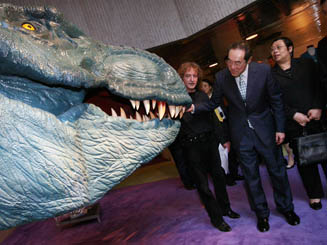 Panel to manage West Kowloon arts
hub may include laymen - The government will consider inviting the public to
join the authority that manages the arts hub in West Kowloon, a move that would
address concern the body may become a bureaucracy. Panel to manage West Kowloon arts
hub may include laymen - The government will consider inviting the public to
join the authority that manages the arts hub in West Kowloon, a move that would
address concern the body may become a bureaucracy.
A government admission scheme for
mainland professionals reached a benchmark when more than 3,000 applicants were
brought into the city in the past six months.
The latest half-year progress report of the Admission Scheme for Mainland Talent
and Professionals revealed yesterday that 3,228 entry applications - out of a
total of 3,678 - were approved by the Immigration Department from this April to
September. It meant a monthly average of 538 mainland people had come to Hong
Kong since April, the highest figure since the scheme was launched in July 2003.
The figure for the same period last year was 2,753 approved out of 3,059. Only
2,443 applications were granted out of 2,774 between October 2006 and this
March. The academic research and education sector had acquired services from
1,486 successful applicants. Other major employer sectors included commerce and
trade (500), financial services (444) and arts or culture (306). The monthly
salaries for 1,903 approved applicants were below HK$20,000, but 12 of them
could earn more than HK$300,000 a month.
 The institutional tranche of the HK$10 billion initial public offering by
Alibaba.com, the mainland's largest e-commerce portal, was more than 50 times
subscribed by Friday, sources said yesterday. And in a coup for the online
business-to-business marketplace founded by chairman Jack Ma, sources added that
among the big investors to come on board during the international marketing of
the offer was Nasdaq-listed Cisco Inc - though this is still to be officially
confirmed and it is not yet known how many shares Cisco subscribed for.
alibaba.com began marketing the institutional tranche of its share offering last
Monday and the offer was said to have been well-received by big investors in
Singapore, Europe and the United States. Bookbuilding for the offer, which was
made at an indicative price range of HK$10 to HK$12 per share, will close on
Friday. The retail tranche opens for subscription tomorrow. Alibaba's offering
documents said it planned to sell 858 million shares or 17 per cent of the
enlarged capital base. The indicative price range values the shares at between
78.7 times and 94.4 times this year's forecast earnings. Ahead of the marketing
campaign, the company announced it had secured several well-known businessmen,
banks and internet companies as investors. Yahoo, which already has a 40 per
cent stake in Alibaba.com's parent, Alibaba Group - which took over Yahoo's
mainland operations in 2005 - was said to be in line to take an 8 per cent stake
in the subsidiary. Other big names secured for the share register included
American International Group, ICBC (Asia) (SEHK: 0349) and property tycoons
Peter Woo Kwong-ching of Wharf (SEHK: 0004) Holdings, Robert Kuok of Kerry Group
and the Kwok brothers of Sun Hung Kai Properties (SEHK: 0016). Investors will
have to fork out HK$6,060.64 for every board lot of 500 shares. The company will
set the price on October 28 and the shares will debut on November 6. In
anticipation of an enthusiastic response from retail investors, brokerages will
offer margin financing deals. Philip Securities is believed to have reserved
more than HK$10 billion in a margin financing pool for the offer and has also
cut its standard subscription handling fee from HK$100 to HK$10. Despite the
premium of a price that is pitched at 94 times Alibaba.com's forecast profit for
this year of HK$622 million, market watchers believe the offering will generate
a hot response due to the branding impact of Mr Ma.
The institutional tranche of the HK$10 billion initial public offering by
Alibaba.com, the mainland's largest e-commerce portal, was more than 50 times
subscribed by Friday, sources said yesterday. And in a coup for the online
business-to-business marketplace founded by chairman Jack Ma, sources added that
among the big investors to come on board during the international marketing of
the offer was Nasdaq-listed Cisco Inc - though this is still to be officially
confirmed and it is not yet known how many shares Cisco subscribed for.
alibaba.com began marketing the institutional tranche of its share offering last
Monday and the offer was said to have been well-received by big investors in
Singapore, Europe and the United States. Bookbuilding for the offer, which was
made at an indicative price range of HK$10 to HK$12 per share, will close on
Friday. The retail tranche opens for subscription tomorrow. Alibaba's offering
documents said it planned to sell 858 million shares or 17 per cent of the
enlarged capital base. The indicative price range values the shares at between
78.7 times and 94.4 times this year's forecast earnings. Ahead of the marketing
campaign, the company announced it had secured several well-known businessmen,
banks and internet companies as investors. Yahoo, which already has a 40 per
cent stake in Alibaba.com's parent, Alibaba Group - which took over Yahoo's
mainland operations in 2005 - was said to be in line to take an 8 per cent stake
in the subsidiary. Other big names secured for the share register included
American International Group, ICBC (Asia) (SEHK: 0349) and property tycoons
Peter Woo Kwong-ching of Wharf (SEHK: 0004) Holdings, Robert Kuok of Kerry Group
and the Kwok brothers of Sun Hung Kai Properties (SEHK: 0016). Investors will
have to fork out HK$6,060.64 for every board lot of 500 shares. The company will
set the price on October 28 and the shares will debut on November 6. In
anticipation of an enthusiastic response from retail investors, brokerages will
offer margin financing deals. Philip Securities is believed to have reserved
more than HK$10 billion in a margin financing pool for the offer and has also
cut its standard subscription handling fee from HK$100 to HK$10. Despite the
premium of a price that is pitched at 94 times Alibaba.com's forecast profit for
this year of HK$622 million, market watchers believe the offering will generate
a hot response due to the branding impact of Mr Ma.
 China:
China's Renminbi (RMB) broke the 7.5 mark to reach a new central parity rate of
7.4938 yuan to one U.S. dollar on Wednesday, according to the Chinese Foreign
Exchange Trading System.
China:
China's Renminbi (RMB) broke the 7.5 mark to reach a new central parity rate of
7.4938 yuan to one U.S. dollar on Wednesday, according to the Chinese Foreign
Exchange Trading System.
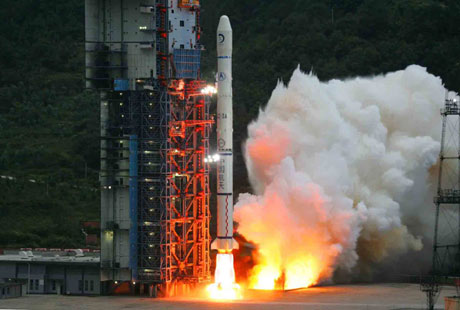
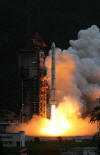 China's first lunar orbiter, Chang'e I, blasts off from
its launch pad in the Xichang Satellite Launch Center in Southwest China's
Sichuan Province, at about 6:05 pm October 24, 2007. The launch of China's first
lunar probe Chang'e-1 was successful, a Chinese official announced Wednesday
evening at the Xichang Satellite Launch Center in southwest China's Sichuan
Province. Li Shangfu, director of the Xichang launch center, made the
announcement after the orbiter successfully entered the earth orbit and unfolded
its solar panel, paving the way for its transfer to the lunar orbit. Chinese
President Hu Jintao extended his congratulations to all those who have worked
for the lunar exploration program shortly after the official announcement of the
launch's success. The launch of the lunar probe "marks another milestone in
China's aerospace program after man-made satellites and manned space flights",
said Chinese vice-premier Zeng Peiyan, who was watching the launch at the
Xichang launch center. The launch of Chang'e-1 means that China has taken a key
step in its lunar exploration program. It is a symbol of China's bid to build an
innovative country, said Zeng. Chang'e-1 blasted off on a Long March 3A carrier
rocket at 6:05 p.m. (10:05GMT) from the No. 3 launching tower at the Xichang
Satellite Launch Center, the 15th successful launch in a row for the rocket. It
is the first step of China's three-stage moon mission, which will lead to a moon
landing and launch of a moon rover around 2012. In the third phase, another
rover will land on the moon and return to earth with lunar soil and stone
samples for scientific research around 2017. The year-long project, which is
named after a legendary Chinese goddess who flew to the moon, is to analyze
chemical and mineral composition and to explore the characteristics of the lunar
surface. The 2,300-kg satellite will experience four accelerations and is
expected to enter earth-moon transfer orbit on October 31 and arrive in the
moon's orbit on November 5. It will use stereo cameras and X-ray spectrometers
to map three-dimensional images of the surface and study the moon's dust. It is
expected to transmit its first photo back to China in the second half of
November and then start to work for one year of scientific exploration. China
carried out its maiden piloted space flight in October 2003, making it only the
third country in the world after the Soviet Union and the United States to have
sent men into space. In October 2005, China completed its second manned space
flight, with two taikonauts on board.
China's first lunar orbiter, Chang'e I, blasts off from
its launch pad in the Xichang Satellite Launch Center in Southwest China's
Sichuan Province, at about 6:05 pm October 24, 2007. The launch of China's first
lunar probe Chang'e-1 was successful, a Chinese official announced Wednesday
evening at the Xichang Satellite Launch Center in southwest China's Sichuan
Province. Li Shangfu, director of the Xichang launch center, made the
announcement after the orbiter successfully entered the earth orbit and unfolded
its solar panel, paving the way for its transfer to the lunar orbit. Chinese
President Hu Jintao extended his congratulations to all those who have worked
for the lunar exploration program shortly after the official announcement of the
launch's success. The launch of the lunar probe "marks another milestone in
China's aerospace program after man-made satellites and manned space flights",
said Chinese vice-premier Zeng Peiyan, who was watching the launch at the
Xichang launch center. The launch of Chang'e-1 means that China has taken a key
step in its lunar exploration program. It is a symbol of China's bid to build an
innovative country, said Zeng. Chang'e-1 blasted off on a Long March 3A carrier
rocket at 6:05 p.m. (10:05GMT) from the No. 3 launching tower at the Xichang
Satellite Launch Center, the 15th successful launch in a row for the rocket. It
is the first step of China's three-stage moon mission, which will lead to a moon
landing and launch of a moon rover around 2012. In the third phase, another
rover will land on the moon and return to earth with lunar soil and stone
samples for scientific research around 2017. The year-long project, which is
named after a legendary Chinese goddess who flew to the moon, is to analyze
chemical and mineral composition and to explore the characteristics of the lunar
surface. The 2,300-kg satellite will experience four accelerations and is
expected to enter earth-moon transfer orbit on October 31 and arrive in the
moon's orbit on November 5. It will use stereo cameras and X-ray spectrometers
to map three-dimensional images of the surface and study the moon's dust. It is
expected to transmit its first photo back to China in the second half of
November and then start to work for one year of scientific exploration. China
carried out its maiden piloted space flight in October 2003, making it only the
third country in the world after the Soviet Union and the United States to have
sent men into space. In October 2005, China completed its second manned space
flight, with two taikonauts on board.
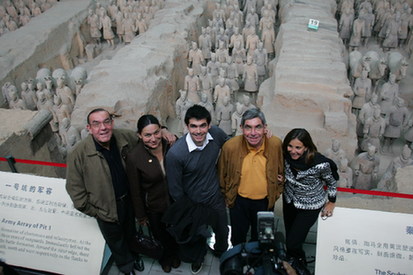 Costa Rica president Oscar Arias (2nd from
the right) and his family pay a visit to the Terracotta Warriors in Xi'an,
Northwest China's Shaanxi Province on Oct 23, 2007. Costa Rica president Oscar Arias (2nd from
the right) and his family pay a visit to the Terracotta Warriors in Xi'an,
Northwest China's Shaanxi Province on Oct 23, 2007.
BlackBerry maker moves into China - Research In
Motion has shipped the first of its BlackBerry smartphones to China and aims to
start selling them later this year, a key breakthrough for the company in
penetrating the huge Asian market. RIM on Tuesday said it struck a Chinese
distribution deal with Alcatel-Lucent. The first handset to be sold under the
new partnership is the 8700 model, versions of which RIM has sold globally for
several years. “China and India are emerging mobile phone behemoths that could
contribute millions of subscribers to RIM over the next several years,” said
Canaccord Adams analyst Peter Misek. After the long-awaited announcement,
investors drove RIM’s shares to a record high. The stock jumped US$11.15, or 9.8
per cent, to close at US$124.53 on the Nasdaq market. On the Toronto Stock
Exchange, it rose C$9.12 to finish at C$120.42. “I think it’s a long-term
positive,” said Research Capital analyst Nick Agostino. “I don’t see it as a
near-term benefit as far as financials are concerned.” He said the BlackBerry is
considered a premium service that will take time to gain traction among the
big-business customers that RIM will target in China. Even so, he added, the
market there is so vast that even if RIM is able to capture just 1 per cent of
it, “it is certainly a lucrative opportunity for these guys”. The company has
long recognised China’s importance in its global plans and first officially
announced plans to sell the BlackBerry there in May last year. “We look forward
to building on the early interest and momentum we are experiencing in China with
both multinational and domestic corporations,” Jim Balsillie, RIM’s co-chief
executive, said in a statement. Mr Agostino said RIM has talked about wanting to
enter China for three to four years. The Waterloo, Ontario-based company already
has a service partnership with China Mobile (SEHK: 0941, announcements, news)
for its entry into China, where it will face competition from low-cost rivals,
including a popular local service called RedBerry. Concern by Chinese
authorities over communication network security could partly explain why RIM
took as much time as it did to introduce the BlackBerry in the country, some
market watchers said. RIM’s BlackBerry is already available from more than 300
carriers around the world. Earlier this month, RIM said it had moved past the 10
million subscriber milestone and had shipped its 20 millionth handset. It also
said efforts to diversify its user base beyond the corporate sector were taking
hold. For the first time, more than half of its new North American subscribers
came from the “non-enterprise” market segment in the second quarter.
Alcatel-Lucent shares rose 43 cents, or 4.71 per cent, to close at US$9.55 on
the New York Stock Exchange.
 Beijing 'deserves gold medal' for smooth planning, declares IOC OLYMPICS -
Preparations for next year's Olympics have entered the home straight - and
judging by the form of the test events the games will romp home a gold medal
winner. That was the optimistic view shared by the IOC and the Beijing
Organising Committee of the Olympic Games (Bocog) yesterday, as they began their
penultimate briefing before the symbolic flame is lit at the National Stadium in
10 months. IOC Co-ordination Commission chairman Hein Verbruggen said
preparations were in the "final sprint" to the opening ceremony on August 8 next
year. "It is like a long distance runner. Our final sprint could be the
difference between a gold medal and silver medal when it comes to the
organisation of the games," he said at the start of the three-day visit.
Addressing Bocog members - headed by Sports Minister Liu Peng, who was standing
in for Bocog president Liu Qi - Verbruggen said the test events had been a
resounding success. "The triumph of these events and the positive feedback we
have received from many of the participants and the international federations
gives us great optimism for the games next August, especially because we still
have some time to deal with the issues that did crop up during these events," he
said. Verbruggen and his team arrived in the capital from Hong Kong, where they
inspected the facilities for the Olympic equestrian events on Monday. "We are
seeing top-quality venues being built for the games," he said. Sports Minister
and Bocog executive vice-president Liu assured the IOC that Bocog was making
"smooth progress". "Since their last visit [in April] we have made smooth
progress in key areas," he said, adding that 19 of 26 test events this year had
been "held successfully", and tests on the environment and transportation had
also been conducted "smoothly". Beijing's pollution and traffic problems are
likely to be high on the agenda during the trouble-shoot, as are concerns over
media freedom and the wall of red tape and censorship which irked international
editors at this month's Olympic World Press Briefing.
Beijing 'deserves gold medal' for smooth planning, declares IOC OLYMPICS -
Preparations for next year's Olympics have entered the home straight - and
judging by the form of the test events the games will romp home a gold medal
winner. That was the optimistic view shared by the IOC and the Beijing
Organising Committee of the Olympic Games (Bocog) yesterday, as they began their
penultimate briefing before the symbolic flame is lit at the National Stadium in
10 months. IOC Co-ordination Commission chairman Hein Verbruggen said
preparations were in the "final sprint" to the opening ceremony on August 8 next
year. "It is like a long distance runner. Our final sprint could be the
difference between a gold medal and silver medal when it comes to the
organisation of the games," he said at the start of the three-day visit.
Addressing Bocog members - headed by Sports Minister Liu Peng, who was standing
in for Bocog president Liu Qi - Verbruggen said the test events had been a
resounding success. "The triumph of these events and the positive feedback we
have received from many of the participants and the international federations
gives us great optimism for the games next August, especially because we still
have some time to deal with the issues that did crop up during these events," he
said. Verbruggen and his team arrived in the capital from Hong Kong, where they
inspected the facilities for the Olympic equestrian events on Monday. "We are
seeing top-quality venues being built for the games," he said. Sports Minister
and Bocog executive vice-president Liu assured the IOC that Bocog was making
"smooth progress". "Since their last visit [in April] we have made smooth
progress in key areas," he said, adding that 19 of 26 test events this year had
been "held successfully", and tests on the environment and transportation had
also been conducted "smoothly". Beijing's pollution and traffic problems are
likely to be high on the agenda during the trouble-shoot, as are concerns over
media freedom and the wall of red tape and censorship which irked international
editors at this month's Olympic World Press Briefing.
The European Union leads the US as a destination for
Chinese students, with 120,000 studying in EU countries last year.
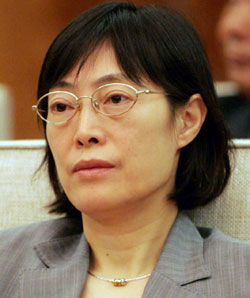 Hu Xiaolian, administrator of the State
Administration of Foreign Exchange. China will further improve the management of
the country's massive foreign exchange reserves and satisfy trade and investment
needs of domestic firms and individuals, China's top foreign exchange regulator
pledged. "We'll ensure the safety and liquidity, while improving the
profitability of the country's foreign exchange reserves," Hu Xiaolian,
administrator of the State Administration of Foreign Exchange (SAFE) told China
Daily on the sidelines of the 17th National Congress of the Communist Party of
China. Hu promised to expand in an orderly manner the channels for capital
outflow, in which qualified domestic institutional investors (QDII) is a part.
"The quota for both QDII and qualified foreign institutional investors (QFII)
will continue to be increased," she said. Hu Xiaolian, administrator of the State
Administration of Foreign Exchange. China will further improve the management of
the country's massive foreign exchange reserves and satisfy trade and investment
needs of domestic firms and individuals, China's top foreign exchange regulator
pledged. "We'll ensure the safety and liquidity, while improving the
profitability of the country's foreign exchange reserves," Hu Xiaolian,
administrator of the State Administration of Foreign Exchange (SAFE) told China
Daily on the sidelines of the 17th National Congress of the Communist Party of
China. Hu promised to expand in an orderly manner the channels for capital
outflow, in which qualified domestic institutional investors (QDII) is a part.
"The quota for both QDII and qualified foreign institutional investors (QFII)
will continue to be increased," she said.
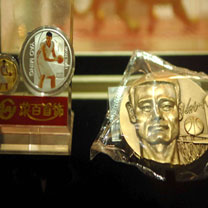 The copper
commemorative medal of Chinese NBA basketball sports star Yao Ming is on sale in
Beijing on October 23, 2007. The copper
commemorative medal of Chinese NBA basketball sports star Yao Ming is on sale in
Beijing on October 23, 2007.
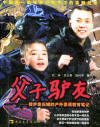 Father and son may run with Olympic torch - A Chinese father and his 16-year-old
son are on the short list for the Olympic torchbearers next year. Ren Erlin (R)
and his son Ren Panpan are shown on the cover of the family's 2005 book,
recounting their adventures hiking along the Great Wall. The duo are among the
1,188 torchbearers and escort runners selected in mid October by Olympic sponsor
Coca Cola via public voting through iCoke.com. The final list will be decided in
early 2008, upon approval by the Being Olympic Committee. China first took
notice of the father Ren Erlin, a professional photographer, in 2003 when he and
his son have successfully hiked a major portion of the Great Wall. The man-made
construction extends more than 6,000 km through nine provinces across North
China. Ten-years-old Ren Panpan, who hikes along a path during his family's trek
along the Great Wall, is shown in the family's 2005 book. On July 15, 2001, two
days after then President of the International Olympic Committee Antonio
Samaranch announced that Beijing won the 2008 Summer Olympic Games bid, Ren took
his 10-year-old son Panpan to trek on the Great Wall for the first time. They
set off from Shanhaiguan in Bohai Bay, carrying a 20-mile-long scroll with
signatures on it, a red banner that read “Love China, Maintain the Great Wall,”
as well as a donation box asking people to contribute one yuan for upkeep of the
Wall. In the following two summers, Ren’s wife Yin Xianghua participated in the
Great Wall hike to finish covering the remaining kilometers with her husband and
son. Along the way, the family not only collected donations, but also raised the
public’s awareness of preserving China's cultural heritage. In June this year,
the trio was nominated to be Olympic torchbearers in a nomination campaign
launched by Coca Cola across the country. Both the father and the son easily
advanced to be in the short list.
Father and son may run with Olympic torch - A Chinese father and his 16-year-old
son are on the short list for the Olympic torchbearers next year. Ren Erlin (R)
and his son Ren Panpan are shown on the cover of the family's 2005 book,
recounting their adventures hiking along the Great Wall. The duo are among the
1,188 torchbearers and escort runners selected in mid October by Olympic sponsor
Coca Cola via public voting through iCoke.com. The final list will be decided in
early 2008, upon approval by the Being Olympic Committee. China first took
notice of the father Ren Erlin, a professional photographer, in 2003 when he and
his son have successfully hiked a major portion of the Great Wall. The man-made
construction extends more than 6,000 km through nine provinces across North
China. Ten-years-old Ren Panpan, who hikes along a path during his family's trek
along the Great Wall, is shown in the family's 2005 book. On July 15, 2001, two
days after then President of the International Olympic Committee Antonio
Samaranch announced that Beijing won the 2008 Summer Olympic Games bid, Ren took
his 10-year-old son Panpan to trek on the Great Wall for the first time. They
set off from Shanhaiguan in Bohai Bay, carrying a 20-mile-long scroll with
signatures on it, a red banner that read “Love China, Maintain the Great Wall,”
as well as a donation box asking people to contribute one yuan for upkeep of the
Wall. In the following two summers, Ren’s wife Yin Xianghua participated in the
Great Wall hike to finish covering the remaining kilometers with her husband and
son. Along the way, the family not only collected donations, but also raised the
public’s awareness of preserving China's cultural heritage. In June this year,
the trio was nominated to be Olympic torchbearers in a nomination campaign
launched by Coca Cola across the country. Both the father and the son easily
advanced to be in the short list.
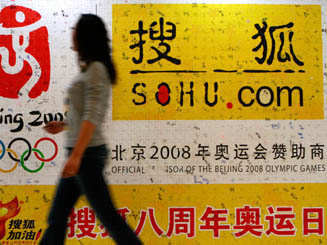 Competition in the
mainland's booming internet sector has turned nasty ahead of the Beijing
Olympics, with Sohu.com upsetting its rivals through a lucrative sponsorship
deal that is now being challenged. The mainland portal paid a reported US$30
million in 2005 for the rights to set up the Games website for the Beijing
Olympics organizing committee and to use the logo of the event - the signature
silhouette of a dancing man. However, it has since put the squeeze on rivals by
claiming the deal included exclusive rights to host all the advertising by
Beijing Games sponsors bearing the official logo. This would give Sohu.com an
effective internet monopoly on advertisements by firms such as Adidas,
Volkswagen and Johnson & Johnson, and its rivals are fuming. The organizing
committee's legal department is now working to untangle the affair that could
determine who gets millions of dollars in advertising revenue between now and
the Games that begin in August. It could also give an invaluable boost in the
broader internet advertising sector which marketing analyst iResearch believes
will be worth more US$1 billion this year, up nearly 40 per cent on last year. Competition in the
mainland's booming internet sector has turned nasty ahead of the Beijing
Olympics, with Sohu.com upsetting its rivals through a lucrative sponsorship
deal that is now being challenged. The mainland portal paid a reported US$30
million in 2005 for the rights to set up the Games website for the Beijing
Olympics organizing committee and to use the logo of the event - the signature
silhouette of a dancing man. However, it has since put the squeeze on rivals by
claiming the deal included exclusive rights to host all the advertising by
Beijing Games sponsors bearing the official logo. This would give Sohu.com an
effective internet monopoly on advertisements by firms such as Adidas,
Volkswagen and Johnson & Johnson, and its rivals are fuming. The organizing
committee's legal department is now working to untangle the affair that could
determine who gets millions of dollars in advertising revenue between now and
the Games that begin in August. It could also give an invaluable boost in the
broader internet advertising sector which marketing analyst iResearch believes
will be worth more US$1 billion this year, up nearly 40 per cent on last year.
October 24, 2007
 Hong Kong:
The Hong Kong market plunged
Monday, in line with the rest of Asia, after sharp declines on Wall Street on
Friday prompted investors to become more concerned about the impact of the
credit crunch and subprime fallout. Hong Kong:
The Hong Kong market plunged
Monday, in line with the rest of Asia, after sharp declines on Wall Street on
Friday prompted investors to become more concerned about the impact of the
credit crunch and subprime fallout.
 Taiwanese entertainer
Jay Chou will work with fans to write a song for the 2008 Beijing Olympics. Taiwanese entertainer
Jay Chou will work with fans to write a song for the 2008 Beijing Olympics.
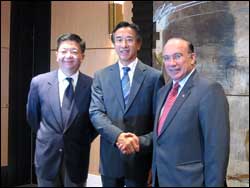 Hong Kong and Macau
have agreed to negotiate with the mainland government on combining into one the
current separate visas for mainland tourists visiting the two cities. The aim is
for mainland tourists, under the Individual Visit Scheme, to travel to both
places in one trip, according to Hong Kong Tourism Board chairman James Tien
Pei-chun who revealed the plan yesterday. Hong Kong and Macau are not
competitors but partners in tourism promotion, Tien said after meeting with
Macau Chief Executive Edmund Ho Hau-wah and Macau tourism officials in the
neighboring SAR. He said increasingly severe international competition has
driven them to embrace their partnership. The two cities are only separated by
water, Tien said. Hong Kong, he said, should position itself as a sight-seeing,
shopping and dining capital while Macau will continue to attract tourists with
its World Heritage, gaming and entertainment facilities. Tien added that the
rapidly growing gaming industry in Macau and opening of foreign- owned casino
resorts such as The Venetian with exhibition facilities will not harm Hong
Kong's status. "Hong Kong has limited convention space," Tien admitted. "We
can't hold all exhibitions. There are a lot of facilities in Macau or Guangzhou.
"I believe it's still beneficial to us if they hold conventions somewhere nearby
because they might visit Hong Kong." Hong Kong and Macau
have agreed to negotiate with the mainland government on combining into one the
current separate visas for mainland tourists visiting the two cities. The aim is
for mainland tourists, under the Individual Visit Scheme, to travel to both
places in one trip, according to Hong Kong Tourism Board chairman James Tien
Pei-chun who revealed the plan yesterday. Hong Kong and Macau are not
competitors but partners in tourism promotion, Tien said after meeting with
Macau Chief Executive Edmund Ho Hau-wah and Macau tourism officials in the
neighboring SAR. He said increasingly severe international competition has
driven them to embrace their partnership. The two cities are only separated by
water, Tien said. Hong Kong, he said, should position itself as a sight-seeing,
shopping and dining capital while Macau will continue to attract tourists with
its World Heritage, gaming and entertainment facilities. Tien added that the
rapidly growing gaming industry in Macau and opening of foreign- owned casino
resorts such as The Venetian with exhibition facilities will not harm Hong
Kong's status. "Hong Kong has limited convention space," Tien admitted. "We
can't hold all exhibitions. There are a lot of facilities in Macau or Guangzhou.
"I believe it's still beneficial to us if they hold conventions somewhere nearby
because they might visit Hong Kong."
 China:
KFC dumps Nestle for Mengniu - In a strong demonstration of faith in Chinese
product quality, KFC is replacing Nestle with Mengniu products. The global fast
food behemoth yesterday signed a dairy product supply agreement with Inner
Mongolia Mengniu Dairy Industry (Group) Co Ltd, China's top dairy producer.
Under this strategic alliance, Mengniu's dairy products will be sold at KFC's
2,000-odd stores in China from next year, replacing multinational Nestle. Milk
will be the first of Mengniu's products that will be available at KFC outlets.
Though this is not an exclusive agreement, executives from both sides hinted the
two companies would not consider a similar partnership with each other's
competitors for now. This is a significant step that demonstrates KFC's
commitment to localize in China, said Mark Chu, KFC brand general manager with
Yum! Brands Inc (China Division). But Chu refused to elaborate on why KFC ended
its partnership with Nestle, KFC's dairy supplier of choice in China in the past
two decades. "Nestle is a quality supplier. We'll start other kinds of
cooperation in the future," Chu said. Nobody from Nestle could be reached for
comment. This year marks the 20th anniversary of KFC's entry into China, which
contributes around 20 percent of its sales revenue worldwide. Currently, more
than 90 percent of KFC's products are localized, and "there will be more",
according to the company. Chu said KFC has had its eye on Mengniu for many
years. "Its explosive growth, high-quality products and brand popularity among
Chinese consumers are more impressive than its counterparts." Set up in 1999,
Mengniu has rapidly grown to become the leading player in the liquid milk, ice
cream and yogurt segments. Going by its interim financial report, by September,
Mengniu's first-half profit surged 41 percent and its sales rose 32.8 percent to
10 billion yuan. KFC's rival McDonald's has been partnering Chinese dairy
producers like Sanyuan since 1992 when it entered China, as part of its strategy
to localize and cut costs. Industry insiders said Mengniu products would be
priced lower than those of Nestle at KFC outlets, but executives from both sides
refused to comment, saying they would set "reasonable" prices. For Mengniu, the
deal is both a bid to strengthen its brand and promote sales. Last year, the
company set the target of entering the Global Top 20 list of dairy producers by
2011. The agreement with KFC comes on the heels of a deal with Starbucks Coffee,
which in June appointed Mengniu as its liquid milk supplier in China, again
replacing Nestle.
China:
KFC dumps Nestle for Mengniu - In a strong demonstration of faith in Chinese
product quality, KFC is replacing Nestle with Mengniu products. The global fast
food behemoth yesterday signed a dairy product supply agreement with Inner
Mongolia Mengniu Dairy Industry (Group) Co Ltd, China's top dairy producer.
Under this strategic alliance, Mengniu's dairy products will be sold at KFC's
2,000-odd stores in China from next year, replacing multinational Nestle. Milk
will be the first of Mengniu's products that will be available at KFC outlets.
Though this is not an exclusive agreement, executives from both sides hinted the
two companies would not consider a similar partnership with each other's
competitors for now. This is a significant step that demonstrates KFC's
commitment to localize in China, said Mark Chu, KFC brand general manager with
Yum! Brands Inc (China Division). But Chu refused to elaborate on why KFC ended
its partnership with Nestle, KFC's dairy supplier of choice in China in the past
two decades. "Nestle is a quality supplier. We'll start other kinds of
cooperation in the future," Chu said. Nobody from Nestle could be reached for
comment. This year marks the 20th anniversary of KFC's entry into China, which
contributes around 20 percent of its sales revenue worldwide. Currently, more
than 90 percent of KFC's products are localized, and "there will be more",
according to the company. Chu said KFC has had its eye on Mengniu for many
years. "Its explosive growth, high-quality products and brand popularity among
Chinese consumers are more impressive than its counterparts." Set up in 1999,
Mengniu has rapidly grown to become the leading player in the liquid milk, ice
cream and yogurt segments. Going by its interim financial report, by September,
Mengniu's first-half profit surged 41 percent and its sales rose 32.8 percent to
10 billion yuan. KFC's rival McDonald's has been partnering Chinese dairy
producers like Sanyuan since 1992 when it entered China, as part of its strategy
to localize and cut costs. Industry insiders said Mengniu products would be
priced lower than those of Nestle at KFC outlets, but executives from both sides
refused to comment, saying they would set "reasonable" prices. For Mengniu, the
deal is both a bid to strengthen its brand and promote sales. Last year, the
company set the target of entering the Global Top 20 list of dairy producers by
2011. The agreement with KFC comes on the heels of a deal with Starbucks Coffee,
which in June appointed Mengniu as its liquid milk supplier in China, again
replacing Nestle.
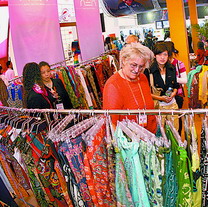 Visitors
browse the racks at the China International Fashion Trade Fair opened yesterday
in Ningbo. The event attracts people from 57 countries and regions. Visitors
browse the racks at the China International Fashion Trade Fair opened yesterday
in Ningbo. The event attracts people from 57 countries and regions.
 Bear Stearns Cos, the US investment bank
battered by slumping mortgage markets, and China's CITIC Securities have agreed
to swap stakes in each other and form a broad alliance, the firms said
yesterday. Bear Stearns Cos, the US investment bank
battered by slumping mortgage markets, and China's CITIC Securities have agreed
to swap stakes in each other and form a broad alliance, the firms said
yesterday.
 China Mobile (0941) reported net profit
for the first nine months jumped 29.8 percent to 59.88 billion yuan (HK$61.82
billion) - beating market expectations - after it added a record number of users
in September. China Mobile (0941) reported net profit
for the first nine months jumped 29.8 percent to 59.88 billion yuan (HK$61.82
billion) - beating market expectations - after it added a record number of users
in September.
October 23, 2007
 Hong Kong:
A French trade official said here Monday that it was a miracle that Hong Kong
had achieved such high economic growth despite the fact that the city is a
developed economy. "We have to look on, and study to find the key of Hong Kong's
success," said Herv Novelli, French minister of State responsible for Businesses
and Foreign Trade, who is here on an official visit. Hong Kong witnessed a 7
percent economic growth on the average over the past three years. The French
official said that such high growth is more often seen in developing countries,
adding that he hoped to find out the secret of Hong Kong's success and implement
it in France. There are more than 600 French companies in Hong Kong, and Novelli
said he hoped more and more French companies will come to Hong Kong to do
business. Hong Kong:
A French trade official said here Monday that it was a miracle that Hong Kong
had achieved such high economic growth despite the fact that the city is a
developed economy. "We have to look on, and study to find the key of Hong Kong's
success," said Herv Novelli, French minister of State responsible for Businesses
and Foreign Trade, who is here on an official visit. Hong Kong witnessed a 7
percent economic growth on the average over the past three years. The French
official said that such high growth is more often seen in developing countries,
adding that he hoped to find out the secret of Hong Kong's success and implement
it in France. There are more than 600 French companies in Hong Kong, and Novelli
said he hoped more and more French companies will come to Hong Kong to do
business.
On Monday morning, Novelli held bilateral talks with Frederick Ma Si-hang,
secretary for Commerce and Economic Development of the Hong Kong Special
Administrative Region government, discussing economic and trade issues of common
concern. Novelli will leave for Macao on Monday. He is scheduled to meet Edmund
HO, chief executive of the Macao Special Administrative Region, and officially
launch the French-Macao Business Association.
  Joan Chen received her Life Time Achievement
Award for the movie "The Home Song Stories" at the 2007 Louis Vuitton Hawaii
International Film Festival -
View Award Video online - courtesy of YouTube
Joan Chen received her Life Time Achievement
Award for the movie "The Home Song Stories" at the 2007 Louis Vuitton Hawaii
International Film Festival -
View Award Video online - courtesy of YouTube
Macau leisure and gambling
conglomerate Melco International Development (0200) announced yesterday that a
consortium formed by a subsidiary will inject its Asian lottery-related business
into Growth Enterprise Market- listed Wafer Systems (8198), a network
infrastructure solutions and services provider.
The leadership reshuffle that saw
the departure of Vice President Zeng Qinghong and other senior officials in
charge of Hong Kong affairs is not expected to mark a significant shift in
central government policy toward Hong Kong, according to political commentators.
 Top Hong
Kong snooker player Marco Fu Ka-chun beat two-time world champion Ronnie
O’Sullivan 9-6 at the Royal London Watches Grand Prix overnight (HK time) to win
his first ranking snooker tournament. Top Hong
Kong snooker player Marco Fu Ka-chun beat two-time world champion Ronnie
O’Sullivan 9-6 at the Royal London Watches Grand Prix overnight (HK time) to win
his first ranking snooker tournament.
Hong Kong’s taxi industry was having to cope
with increasing competition and the demands of more infrastructure and longer
routes, Transport Advisory Committee chairwoman Teresa Cheng Yeuk-wah said on
Monday.
The Law Society has urged the government to
widen access to justice by expanding the supplementary legal aid scheme to cover
cases including judicial review, probate, trust, trademark, consumer and land
disputes.
Macau's "trial of the century" is set to
start on November 5, with former minister Ao Man-long battling 76 counts of
bribe-taking, money laundering and abuse of power.
Frustrated in efforts to invest directly in
Hong Kong's surging stocks through the much-delayed "through-train" scheme,
mainland investors are pouring cash into professional funds that can already buy
shares here. Under the qualified domestic institutional investor (QDII) scheme,
these funds are the only legitimate channel for mainland investors wanting
exposure to Hong Kong's red-hot market. But there are warnings the increasing
popularity of the fledging QDII scheme may be short-lived, with forecasts the
Hong Kong market, largely driven by "through-train" hopes, faces a correction.
QDII funds have been heavily oversubscribed since September as it became
apparent government delays in launching the through train were likely to
continue. The Hang Seng Index has surged 36 per cent since August 20 when the
scheme allowing mainland investors to buy shares directly in Hong Kong was first
announced. Four QDII products launched by fund management companies since
September attracted double the combined US$18 billion in funds sought, according
to the State Administration of Foreign Exchange. The immense interest meant each
fund was able to close its offer on the first day of the issue. And investor
enthusiasm has kept on growing with each new QDII offering. A fund offered by
Shenzhen-based China Southern Fund Management attracted 50 billion yuan on
September 19 while the Shanghai-based China International Fund Management on
October 15 drew more than 100 billion yuan, a record amount for a
mainland-issued fund. While QDII funds are allowed to invest in markets from 33
countries and regions including Singapore, India, South Korea and Australia, the
focus is clearly on the booming Hong Kong market. The 22 banks with QDII
licenses launched 19 new products in August and 18 in September, higher than
previous months and many of them focused on Hong Kong.
 China:
In "Lust, Caution," the uncanny ability of Tang Wei -- in her her feature film
debut -- to exhibit internal conflict provides the window into the movie's soul.
As director Ang Lee explains, it's the paradox of human nature that pits us in a
constant battle between wanting to expose ourselves and share our feelings,
while also attempting to keep things secret. "When people do expose themselves,
there's a tendency to polish it," explains Lee. "Except for Tang Wei. She's
exceptional. She has the naivete of a first-timer and the talent of believing
while forgetting about everything else." Carrying a project of this magnitude on
one's shoulders, a once-in-a-career opportunity for most actresses, was a
particularly tricky proposition, especially given the Pirandellian nature of
playing a role within a role: Wong Chia Chi, an idealistic would-be Chinese
actress recently abandoned by her father during WWII; and Ms. Mak, a role Wong
plays to seduce a Japanese collaborator with the purpose of assassinating him.
Tang so immersed herself into the dual part that it took her months after the
shoot to re-establish her own identity. Her first meeting with Lee didn't occur
under the most ideal circumstances: a family crisis prevented her from getting
any sleep the night before, and her voice was practically shot. But her
vulnerability worked in her favor. "I think I opened my heart," explains the
27-year-old about how Lee settled on her after considering more than a thousand
other candidates. "This was the most important thing to Ang. He wanted to find
an actress who could give all of herself to the character, because (Wong Chia
Chi) gives all of herself to the part she performs. Ang could sense this." One
of the astonishing aspects of Tang's talent is her ability to show emotion. Her
passion draws the audience in, and it influences everyone around her. "I think
it's very important for her character," explains Lee.
China:
In "Lust, Caution," the uncanny ability of Tang Wei -- in her her feature film
debut -- to exhibit internal conflict provides the window into the movie's soul.
As director Ang Lee explains, it's the paradox of human nature that pits us in a
constant battle between wanting to expose ourselves and share our feelings,
while also attempting to keep things secret. "When people do expose themselves,
there's a tendency to polish it," explains Lee. "Except for Tang Wei. She's
exceptional. She has the naivete of a first-timer and the talent of believing
while forgetting about everything else." Carrying a project of this magnitude on
one's shoulders, a once-in-a-career opportunity for most actresses, was a
particularly tricky proposition, especially given the Pirandellian nature of
playing a role within a role: Wong Chia Chi, an idealistic would-be Chinese
actress recently abandoned by her father during WWII; and Ms. Mak, a role Wong
plays to seduce a Japanese collaborator with the purpose of assassinating him.
Tang so immersed herself into the dual part that it took her months after the
shoot to re-establish her own identity. Her first meeting with Lee didn't occur
under the most ideal circumstances: a family crisis prevented her from getting
any sleep the night before, and her voice was practically shot. But her
vulnerability worked in her favor. "I think I opened my heart," explains the
27-year-old about how Lee settled on her after considering more than a thousand
other candidates. "This was the most important thing to Ang. He wanted to find
an actress who could give all of herself to the character, because (Wong Chia
Chi) gives all of herself to the part she performs. Ang could sense this." One
of the astonishing aspects of Tang's talent is her ability to show emotion. Her
passion draws the audience in, and it influences everyone around her. "I think
it's very important for her character," explains Lee.
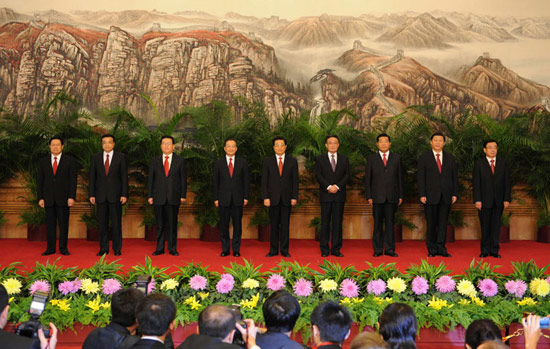 Hu Jintao (C), Wu
Bangguo (4th R), Wen Jiabao (4th L), Jia Qinglin (3rd R), Li Changchun (3rd L),
Xi Jinping (2nd R), Li Keqiang (2nd L), He Guoqiang (1st R) and Zhou Yongkang
(1st L), who are members of the Standing Committee of the Political Bureau of
the 17th Central Committee of the Communist Party of China (CPC), meet the press
at the Great Hall of the People in Beijing on Oct. 22, 2007. The following is a
list of members of the Standing Committee of the Political Bureau of the 17th
Communist Party of China (CPC) Central Committee: Hu Jintao, Wu Bangguo, Wen
Jiabao, Jia Qinglin, Li Changchun, Xi Jinping, Li Keqiang, He Guoqiang and Zhou
Yongkang. The following is a list of the Political Bureau members of the 17th
Communist Party of China (CPC) Central Committee (listed in the order of the
number of strokes in their surnames): Xi Jinping, Wang Gang, Wang Lequan, Wang
Zhaoguo, Wang Qishan, Hui Liangyu (Hui), Liu Qi, Liu Yunshan, Liu Yandong
(female), Li Changchun, Li Keqiang, Li Yuanchao, Wu Bangguo, Wang Yang, Zhang
Gaoli, Zhang Dejiang, Zhou Yongkang, Hu Jintao, Yu Zhengsheng, He Guoqiang, Jia
Qinglin, Xu Caihou, Guo Boxiong, Wen Jiabao and Bo Xilai. They were elected at
the first plenary session of the 17th CPC Central Committee on Monday morning. Hu Jintao (C), Wu
Bangguo (4th R), Wen Jiabao (4th L), Jia Qinglin (3rd R), Li Changchun (3rd L),
Xi Jinping (2nd R), Li Keqiang (2nd L), He Guoqiang (1st R) and Zhou Yongkang
(1st L), who are members of the Standing Committee of the Political Bureau of
the 17th Central Committee of the Communist Party of China (CPC), meet the press
at the Great Hall of the People in Beijing on Oct. 22, 2007. The following is a
list of members of the Standing Committee of the Political Bureau of the 17th
Communist Party of China (CPC) Central Committee: Hu Jintao, Wu Bangguo, Wen
Jiabao, Jia Qinglin, Li Changchun, Xi Jinping, Li Keqiang, He Guoqiang and Zhou
Yongkang. The following is a list of the Political Bureau members of the 17th
Communist Party of China (CPC) Central Committee (listed in the order of the
number of strokes in their surnames): Xi Jinping, Wang Gang, Wang Lequan, Wang
Zhaoguo, Wang Qishan, Hui Liangyu (Hui), Liu Qi, Liu Yunshan, Liu Yandong
(female), Li Changchun, Li Keqiang, Li Yuanchao, Wu Bangguo, Wang Yang, Zhang
Gaoli, Zhang Dejiang, Zhou Yongkang, Hu Jintao, Yu Zhengsheng, He Guoqiang, Jia
Qinglin, Xu Caihou, Guo Boxiong, Wen Jiabao and Bo Xilai. They were elected at
the first plenary session of the 17th CPC Central Committee on Monday morning.
China Southern Airlines will launch direct flight service
between Guangzhou, capital of south China's Guangdong Province, and Vientiane of
Laos from November 6.
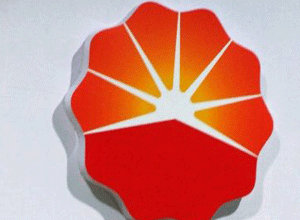 PetroChina expects
A-share listing in Shanghai on Nov. 5 - PetroChina said it would use 6.84
billion yuan and 5.93 billion yuan respectively to boost production capacity at
its Changqing and Daqing oil fields. A total of 1.5 billion yuan will be used to
build production facilities at Jidong field, the country's biggest. PetroChina expects
A-share listing in Shanghai on Nov. 5 - PetroChina said it would use 6.84
billion yuan and 5.93 billion yuan respectively to boost production capacity at
its Changqing and Daqing oil fields. A total of 1.5 billion yuan will be used to
build production facilities at Jidong field, the country's biggest.
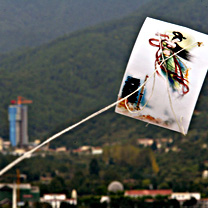 A kite painted with
the image of Chang'e is flown near the launch pad of the Xichang Satellite
Launch Center in Sichuan Province, Oct 18, 2007. China's first moon orbiter,
Chang'e I is set to be launched on October 24. A kite painted with
the image of Chang'e is flown near the launch pad of the Xichang Satellite
Launch Center in Sichuan Province, Oct 18, 2007. China's first moon orbiter,
Chang'e I is set to be launched on October 24.
Chinese auto-maker Chery signed strategic cooperation
agreements with China Petroleum and Chemical Corporation (Sinopec) and SMC
Corporation last week, in an effort to enhance over-all competitiveness.
 As temperatures start
to drop, most party goers don't go out as often as they do in the summer. The
cold wind chills both the body and the heart when people shuffle between pubs or
between bars and home. So here we offer a list of 24-hour coffee shops in
Beijing and Shanghai. People can come here in the sunshine and leave them in the
day as well. While they stay inside, they can have warm drinks, books as well as
likeminded souls. As temperatures start
to drop, most party goers don't go out as often as they do in the summer. The
cold wind chills both the body and the heart when people shuffle between pubs or
between bars and home. So here we offer a list of 24-hour coffee shops in
Beijing and Shanghai. People can come here in the sunshine and leave them in the
day as well. While they stay inside, they can have warm drinks, books as well as
likeminded souls.
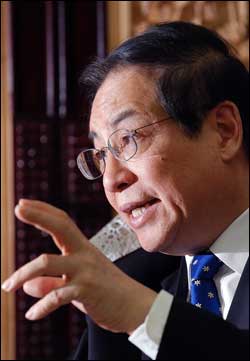 The China Banking
Regulatory Commission is evaluating whether to raise or lower the stake cap on
foreign lenders' holdings in banks. Chairman Liu Mingkang told The Standard it
is now looking into synergies and problems brought about by the 20 percent cap.
Any decisions will be announced by the first quarter of next year. "The results
from lifting the cap to 20 percent are encouraging," Liu said, adding that some
problems must be addressed. The cap was raised from 15 percent in 2003. Four of
the six Hong Kong-listed mainland banks now have overseas strategic partners.
Among small and mid-sized banks, 19 have brought in foreign investors as
strategic partners. Thirty overseas institutions own about 4.59 percent of the
12 national banks and 4.17 percent of 120 city commercial banks, according to
the commission's data. HSBC Holdings (0005) wants to increase its stake in Bank
of Communications (3328) from 18.6 percent to 30 percent. The China Banking
Regulatory Commission is evaluating whether to raise or lower the stake cap on
foreign lenders' holdings in banks. Chairman Liu Mingkang told The Standard it
is now looking into synergies and problems brought about by the 20 percent cap.
Any decisions will be announced by the first quarter of next year. "The results
from lifting the cap to 20 percent are encouraging," Liu said, adding that some
problems must be addressed. The cap was raised from 15 percent in 2003. Four of
the six Hong Kong-listed mainland banks now have overseas strategic partners.
Among small and mid-sized banks, 19 have brought in foreign investors as
strategic partners. Thirty overseas institutions own about 4.59 percent of the
12 national banks and 4.17 percent of 120 city commercial banks, according to
the commission's data. HSBC Holdings (0005) wants to increase its stake in Bank
of Communications (3328) from 18.6 percent to 30 percent.
China Merchants Bank (3968) has
kept its lending to developers at the low level of 5 percent to 7 percent of its
loan portfolio, following the central bank's guidelines intended to help curb
overheating in the property market, the bank's chairman Qin Xiao said.
October 22, 2007
 Hong Kong:
The Hongkong and Shanghai Banking Corporation (HSBC) has started offering
Renminbi services in Wuhan, capital of central China's Hubei Province. The
second foreign bank to open in Wuhan after Bank of East Asia (BEA) established a
branch last month, HSBC has also opened its first sub-branch in the city on the
Yangtze River, which is a major transportation hub, and home to higher
educational institutions and one of China's major steel plants. "Central China
will be on the top list of all foreign banks in China when they try to expand
their business," said Richard Yorke, China CEO of HSBC. "Steady policies and
high growth rate of central China will draw international companies, together
with capital and investment to the region." In accordance with the Regulation of
the People's Republic of China on the Administration of Foreign-funded Banks,
foreign financial institutions must register locally incorporated banks to
initiate Renminbi retail business. Hong Kong:
The Hongkong and Shanghai Banking Corporation (HSBC) has started offering
Renminbi services in Wuhan, capital of central China's Hubei Province. The
second foreign bank to open in Wuhan after Bank of East Asia (BEA) established a
branch last month, HSBC has also opened its first sub-branch in the city on the
Yangtze River, which is a major transportation hub, and home to higher
educational institutions and one of China's major steel plants. "Central China
will be on the top list of all foreign banks in China when they try to expand
their business," said Richard Yorke, China CEO of HSBC. "Steady policies and
high growth rate of central China will draw international companies, together
with capital and investment to the region." In accordance with the Regulation of
the People's Republic of China on the Administration of Foreign-funded Banks,
foreign financial institutions must register locally incorporated banks to
initiate Renminbi retail business.
Hang Lung Properties (0101) said
its property investment portfolio in the mainland will become the company's
major source of leasing income in five years when its projects in China begin to
contribute profit.
Union Hospital and Dragonair
Holidays have joined forces to promote Hong Kong as a destination for medical
tourists. According to a joint announcement yesterday, the scheme is aimed at
luring affluent mainlanders to visit Hong Kong for medical checkups. The
pioneering venture between the private hospital in Tai Wai, Sha Tin, and the
subsidiary of Cathay Pacific Airways will offer packages that include a half-day
medical checkup at the private hospital plus air tickets, hotel, transportation
and a half-day sightseeing tour around Hong Kong Island organized by the
airline. A doctor's report on the medical status of the person will be included.
The cost of the four- and five-day packages ranges from about HK$6,760 to
HK$12,570 a person, depending on the departure location and season. The basic
checkup includes a standard medical evaluation of blood pressure, glucose level,
urine, liver, kidneys, electrocardiogram and chest x-ray. Additional tests such
as breast checks and pap smears are available at extra cost. The medical tour is
being targeted at middle- class professionals in 10 affluent mainland cities:
Beijing, Shanghai, Ningbo, Nanjing, Hangzhou, Changsha, Wuhan, Qingdao, Dalian
and Shenyang. Chief hospital manager and medical director Anthony Lee Kai-yin is
confident mainlanders will be prepared to pay for the body checkups in Hong Kong
even though the price is two to three times more than in the mainland. "Many
hospitals in the mainland may have caught up with our hardware, but not the
software. Hong Kong's health-care sector has a good brand image for high-quality
hospital and medical services, and doctors' credibility," Lee said. Currently,
mainlanders comprise about 1.5 percent of the hospital's in-patient services,
which is double the rate of a year ago. Lee said the increased intake would not
affect services to local patients. He said he hoped the scheme would attract new
customers, as most of the current mainland patients are relatives of local
residents. Dragonair Holidays international sales manager Ophelia Ng Ka-wai said
bundling conventional tourism packages with medical services can also increase
Hong Kong's competitiveness as a medical hub. "Mainland tourists are becoming
more mature, more and more are not just looking for discounts, they want
diversified products," Ng said. However, Hong Kong's immigration policy does not
really promote Hong Kong as a medical hub, according to Hong Kong Private
Hospitals Association chairman Alan Lau Kwok-lam. The government should simplify
visa procedures for mainlanders seeking medical services in Hong Kong and
consider visa extensions for those requiring post-medical treatment, he said. In
August the Taiwanese government eased the visa application procedures for
mainlanders seeking medical treatment. The program is expected to attract about
100,000 mainland and overseas visitors to the island in three years.
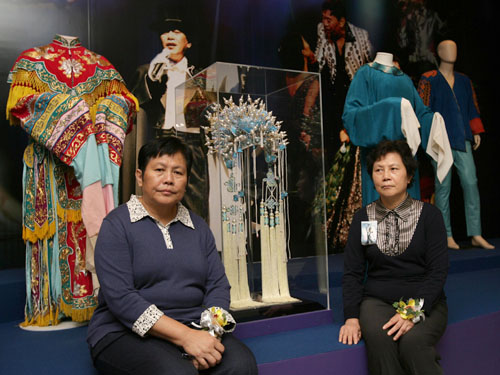 Memories of Canto-pop "godfather" Roman Tam Pak-sin will live on at the Hong
Kong Heritage Museum after family members donated 3,000 items of memorabilia
from his long career. The Roman Tam Collection, part of which is on display from
today until April 21, is believed to be the first complete collection of a Hong
Kong pop artist. The star's sisters, Tam Man-yuk and Tam Ming-yuk, approached
the museum shortly after he died of liver cancer in 2002 with the idea of the
donation, which they made last year. "Only after coming to Hong Kong was Roman
able to bring his talent into full play," elder sister Tam Man-yuk said
yesterday - the fifth anniversary of her brother's death. "Had he stayed in
Guangzhou, he would not have amounted to anything." She said the donation was
made to thank Hongkongers for their support of her brother. "It was Hong Kong
that nurtured Roman's career, so the collection belongs to all people in Hong
Kong," Tam Man-yuk said, adding the family also believed the star's memorabilia
would be better kept and appreciated in the museum. Director of Leisure and
Cultural Services Thomas Chow Tat-ming said the collection would play a
significant role in local pop culture. "Because of its comprehensiveness, the
collection also has considerable value as a reference source for research into
Roman's life and career as well as the development of pop music in Hong Kong,"
Mr Chow said. The collection includes costumes, props, trophies, news clippings,
photo albums, posters and many other mementos from his life. Sixty items are
being displayed until April and others will be featured at a separate exhibition
on Hong Kong's Canto-pop development to be held from November 11. In a
three-decade career, Roman Tam was one of a few Hong Kong singers to become a
cultural icon. His songs were particularly popular for a generation who came of
age in the 1970s and 1980s. Thousands of fans lined the streets to pay their
respects when he died five years ago. Roman Tam was the first star to rock Hong
Kong in 1973 with a cross dyed on his crew cut, a teardrop drawn on his cheek
and one eye slathered with blue eye-shadow. And he introduced dungarees to the
public - minus the underwear.
Memories of Canto-pop "godfather" Roman Tam Pak-sin will live on at the Hong
Kong Heritage Museum after family members donated 3,000 items of memorabilia
from his long career. The Roman Tam Collection, part of which is on display from
today until April 21, is believed to be the first complete collection of a Hong
Kong pop artist. The star's sisters, Tam Man-yuk and Tam Ming-yuk, approached
the museum shortly after he died of liver cancer in 2002 with the idea of the
donation, which they made last year. "Only after coming to Hong Kong was Roman
able to bring his talent into full play," elder sister Tam Man-yuk said
yesterday - the fifth anniversary of her brother's death. "Had he stayed in
Guangzhou, he would not have amounted to anything." She said the donation was
made to thank Hongkongers for their support of her brother. "It was Hong Kong
that nurtured Roman's career, so the collection belongs to all people in Hong
Kong," Tam Man-yuk said, adding the family also believed the star's memorabilia
would be better kept and appreciated in the museum. Director of Leisure and
Cultural Services Thomas Chow Tat-ming said the collection would play a
significant role in local pop culture. "Because of its comprehensiveness, the
collection also has considerable value as a reference source for research into
Roman's life and career as well as the development of pop music in Hong Kong,"
Mr Chow said. The collection includes costumes, props, trophies, news clippings,
photo albums, posters and many other mementos from his life. Sixty items are
being displayed until April and others will be featured at a separate exhibition
on Hong Kong's Canto-pop development to be held from November 11. In a
three-decade career, Roman Tam was one of a few Hong Kong singers to become a
cultural icon. His songs were particularly popular for a generation who came of
age in the 1970s and 1980s. Thousands of fans lined the streets to pay their
respects when he died five years ago. Roman Tam was the first star to rock Hong
Kong in 1973 with a cross dyed on his crew cut, a teardrop drawn on his cheek
and one eye slathered with blue eye-shadow. And he introduced dungarees to the
public - minus the underwear.
The education chief pledged
yesterday to look at ways, including a new credit-point system, to give
associate degrees greater academic recognition by the end of the year.
More than a third of workers in
Hong Kong change jobs after less than two years, with banks and advertising and
media firms suffering the biggest turnover in an increasingly competitive labour
market, a survey has found. The latest Hudson Report for Asia found 35 per cent
of the 635 executives surveyed in Hong Kong said they had staff who left within
two years. The banking and financial services sector reported the highest
turnover - 40 per cent - while media and advertising firms said 35 per cent of
staff left within two years. However, there are also relatively significant
numbers who stay on. In the banking and financial services sector, 18 per cent
stay for more than four years. For media and advertising firms, 14 per cent
remain for more than three years. "The market remains buoyant, with rising
employment expectations," Gina McLellan, Hudson's Hong Kong country manager,
said. "However, there is a significant gap in salary expectations between
employers and candidates, and many organisations feel they have to make
counter-offers to retain key staff." The survey found that one-fifth of job
candidates ask for salaries more than 20 per cent higher than their employers
are willing to pay. Hudson is a recruitment management services provider.
A Chinese University survey has
found about 31 per cent of Hong Kong people are satisfied with the policy
address delivered last week by Donald Tsang Yam-kuen, an increase of 10.7
percentage points from last year's blueprint. According to the survey by the
university's Institute of Asia-Pacific Studies last Wednesday's policy address
scored 62.6 marks out of 100, compared with 56 marks recorded in a similar poll
last year. A total of 711 people were interviewed from October 12 to Monday. The
survey also showed a rise in the approval rating of Mr Tsang's administration,
with 39.5 per cent of respondents saying they were satisfied with the
performance of the government. This represented a 4.2 per cent rise from the
rating in a similar poll last month. But Mr Tsang saw his personal approval
rating drop slightly to 62.7 marks out of 100. He scored 64.2 marks in last
month's poll, and in an August poll the mark was 67.5.
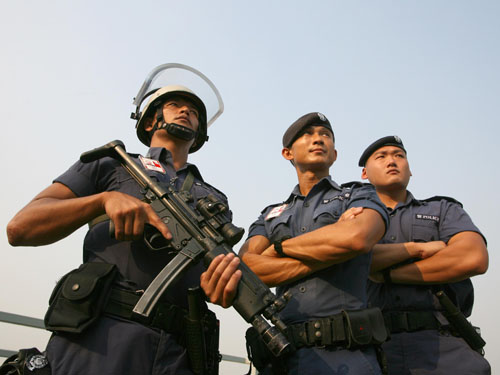 Protecting airport a job for elite police unit - It takes
six months of specialized training to be selected for the elite Airport Security
Unit. The training for this unit, which is marking its 30th anniversary, is the
second toughest, after the special duties squad - the force's equivalent of a
special weapons and tactics (Swat) team. And because the officers carry more
than 13kg of weapons and equipment on their belts, physical fitness is vital.
"The fitness standard is stringent, and it is the foundation for this unit,"
said Chief Inspector Clement Lai Ka-chi, the unit's officer in charge.
Applicants have to complete 18 pull-ups and meet other fitness requirements to
advance in the selection process. That is compared with the standard for the
force's general recruitment - five pull-ups to be an inspector and seven to be a
constable. "The six-month fitness training is a guide to those who wish to join
the unit," Mr Lai said. Afterwards, "officers have to attend a training session
at the airport once a week, which prepares them for the other recruitment
hurdles". Those who advance then receive training in the use of weapons and
equipment. "Knowledge on new threats such as biochemical weapons is also
included in our training," Mr Lai said. Communications equipment has also been
upgraded, and officers now carry first-aid kits on their belts. About 70
officers apply annually, but only 15 to 20 are selected to join the unit, the
chief inspector said.
Protecting airport a job for elite police unit - It takes
six months of specialized training to be selected for the elite Airport Security
Unit. The training for this unit, which is marking its 30th anniversary, is the
second toughest, after the special duties squad - the force's equivalent of a
special weapons and tactics (Swat) team. And because the officers carry more
than 13kg of weapons and equipment on their belts, physical fitness is vital.
"The fitness standard is stringent, and it is the foundation for this unit,"
said Chief Inspector Clement Lai Ka-chi, the unit's officer in charge.
Applicants have to complete 18 pull-ups and meet other fitness requirements to
advance in the selection process. That is compared with the standard for the
force's general recruitment - five pull-ups to be an inspector and seven to be a
constable. "The six-month fitness training is a guide to those who wish to join
the unit," Mr Lai said. Afterwards, "officers have to attend a training session
at the airport once a week, which prepares them for the other recruitment
hurdles". Those who advance then receive training in the use of weapons and
equipment. "Knowledge on new threats such as biochemical weapons is also
included in our training," Mr Lai said. Communications equipment has also been
upgraded, and officers now carry first-aid kits on their belts. About 70
officers apply annually, but only 15 to 20 are selected to join the unit, the
chief inspector said.
Property development The Legend has
reclaimed the record for the highest-priced flat. A 3,205 sq ft duplex at the
Tai Hang towers has sold for HK$109 million, or some HK$34,000 per sq ft. But
the record may not stand for long. The Legend's developer, Cheung Kong
(Holdings) (SEHK: 0001), plans to raise prices for the remaining 20 apartments
and nine duplexes there. What's more, flats in The Cullinan - Hong Kong's
tallest buildings, above Kowloon Station - could sell for HK$40,000 per sq ft,
said the owner of the agents that sold the duplex. Its price beat the record
HK$33,500 per sq ft paid for a duplex in The Arch, also above Kowloon Station,
in July. A 3,850 sq ft duplex at the Legend was the previous record-holder,
selling for HK$128.2 million, or HK$33,300 per square foot, in March. For HK$109
million, the buyer of Hong Kong's most expensive flat gets a kitchen and rooftop
swimming pool with gold-plated fixtures and a view of Victoria Harbour,
Centaline Property director Louis Ho Siu-tong said. "Those features attracted
the buyer to pay an aggressive price for the unit," Mr Ho said. The Legend is a
four-tower development on the site of the former Tiger Balm Garden attraction.
Shih Wing-ching, chairman of Centaline (Holdings), parent of Centaline Property,
said property prices continued to rise and people were willing to pay premium
prices for special units in new projects because of their exclusivity. Simon Lo
Wing-fai, director of research and consultancy for property agent Colliers
International, said the luxury residential market was bullish. Its figures show
luxury-flat prices have risen 5 per cent in two weeks.
 China:
Candidates vying for a seat in the all- powerful politburo Standing Committee
will have to fight it out regardless of their background or support from any
quarter, a senior party official said yesterday.
China:
Candidates vying for a seat in the all- powerful politburo Standing Committee
will have to fight it out regardless of their background or support from any
quarter, a senior party official said yesterday.
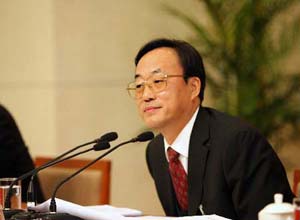 The appreciation of Yuan and the heightened tasks in security management have
driven up Beijing's Olympics budget from 1.6 billion U.S. dollars to 2 billion
U.S. dollars, Liu Jingmin, executive vice president of the Beijing Organizing
Committee for the 2008 Olympic Games, said on Friday. The figure still stays
short of the 2.4-billion-USD budget for the Athens Olympics in 2004, he noted,
adding that the committee would make a second revision of the budget in line
with needs.
The appreciation of Yuan and the heightened tasks in security management have
driven up Beijing's Olympics budget from 1.6 billion U.S. dollars to 2 billion
U.S. dollars, Liu Jingmin, executive vice president of the Beijing Organizing
Committee for the 2008 Olympic Games, said on Friday. The figure still stays
short of the 2.4-billion-USD budget for the Athens Olympics in 2004, he noted,
adding that the committee would make a second revision of the budget in line
with needs.
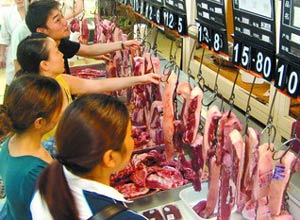 The average price of pork in Chinese
shops has dropped 11 percent from its peak in August as the government invests
billions of yuan to support the pig breeding industry. The average price of pork in Chinese
shops has dropped 11 percent from its peak in August as the government invests
billions of yuan to support the pig breeding industry.
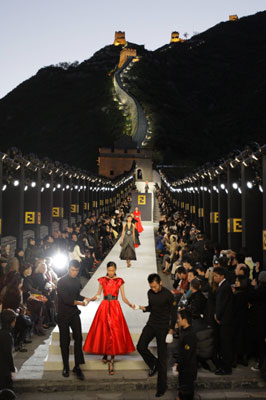 A model
is assisted off the catwalk while wearing a dress by fashion label Fendi at
sunset on the Great Wall of China near Beijing October 19, 2007. A total of 88
models displayed designs by designers Karl Lagerfeld and Silvia Venturini Fendi. A model
is assisted off the catwalk while wearing a dress by fashion label Fendi at
sunset on the Great Wall of China near Beijing October 19, 2007. A total of 88
models displayed designs by designers Karl Lagerfeld and Silvia Venturini Fendi.
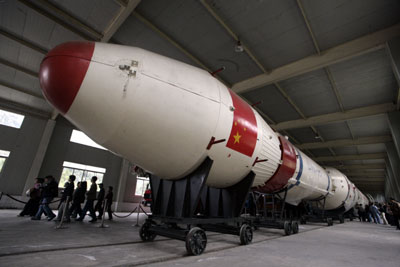 Visitors walk past Long March III
carrier rocket at the Xichang Satellite Launch Center (XSLC) located in
Southwest China's Sichuan Province October 18, 2007. The country's first moon
orbiter, Chang'e I, is set to be launched on October 24. Visitors walk past Long March III
carrier rocket at the Xichang Satellite Launch Center (XSLC) located in
Southwest China's Sichuan Province October 18, 2007. The country's first moon
orbiter, Chang'e I, is set to be launched on October 24.
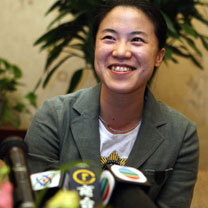 Olympic and world
table tennis champion Wang Nan meets the press on the sideline of the on-going
17th Party's National Congress in Beijing October 19, 2007. Olympic and world
table tennis champion Wang Nan meets the press on the sideline of the on-going
17th Party's National Congress in Beijing October 19, 2007.
 October 18 this year marks the traditional Chinese festival Chongyang Festival,
or Double Ninth Festival. Traditionally, Chinese people drink chrysanthemum
wine, carry a dogwood branch and climb mountains to celebrate this festival. You
can choose to follow this tradition or not. But the autumn days are always a
perfect time for hiking and climbing given the clear weather.
October 18 this year marks the traditional Chinese festival Chongyang Festival,
or Double Ninth Festival. Traditionally, Chinese people drink chrysanthemum
wine, carry a dogwood branch and climb mountains to celebrate this festival. You
can choose to follow this tradition or not. But the autumn days are always a
perfect time for hiking and climbing given the clear weather.
October 20- 21, 2007
 Hong Kong:
Just as talk of a second internet bubble in the US starts to gain traction
(don't believe it? This great New York Times article will convince you), Alibaba,
right on cue, pops up with its IPO. Jack Ma, Alibaba's pugnacious boss, has made
plans to raise US$1.33 billion on the Hong Kong Stock Exchange, which would make
it China's biggest tech IPO to date. If all goes to plan, Alibaba will receive a
net profit of more than US$80 million. Ma has already bested foreign pretenders
like eBay, who dared encroach on his turf (Alibaba's auction site Taobao
dominated eBay in the local e-auction market). Now, pockets lined with cash, it
looks like he's ready to start the next phase of Alibaba's rise and rise.
Another smart Chinese player, telecom firm Huawei, is also making its mark felt
abroad. Last week it announced a plan to buy 21.5% of 3Com, the US network
equipment manufacturer. The folks at the Shenzhen Stock Exchange must have been
paying attention - Huawei, after all, is still a privately held company,
although it's already a global telecoms equipment player. The exchange will
launch a new growth enterprise board targeting high-tech companies, part of a
national plan to accelerate the country's tech sector, which also includes a
US$10.7 billion investment from China Development Bank. Hong Kong:
Just as talk of a second internet bubble in the US starts to gain traction
(don't believe it? This great New York Times article will convince you), Alibaba,
right on cue, pops up with its IPO. Jack Ma, Alibaba's pugnacious boss, has made
plans to raise US$1.33 billion on the Hong Kong Stock Exchange, which would make
it China's biggest tech IPO to date. If all goes to plan, Alibaba will receive a
net profit of more than US$80 million. Ma has already bested foreign pretenders
like eBay, who dared encroach on his turf (Alibaba's auction site Taobao
dominated eBay in the local e-auction market). Now, pockets lined with cash, it
looks like he's ready to start the next phase of Alibaba's rise and rise.
Another smart Chinese player, telecom firm Huawei, is also making its mark felt
abroad. Last week it announced a plan to buy 21.5% of 3Com, the US network
equipment manufacturer. The folks at the Shenzhen Stock Exchange must have been
paying attention - Huawei, after all, is still a privately held company,
although it's already a global telecoms equipment player. The exchange will
launch a new growth enterprise board targeting high-tech companies, part of a
national plan to accelerate the country's tech sector, which also includes a
US$10.7 billion investment from China Development Bank.
Star TV, News Corp.’s Hong
Kong-based satcaster, is set to open a sales office in Los Angeles to promote
some of its 40 Asian-language channels in North America.
Office will be headed by new hire David Wisnia, VP of sales and distribution. He
was previously with Fox Sports Intl., including four years with Fuel TV, and was
most recently VP, business and legal affairs. DirecTV already carries four Star
channels -- Hindi-language trio Star India Plus, Star One and Star India News
plus the Tamil-language Vijay. Star wants Stateside carriage for Hindi movie
channel Star Gold and several Mandarin-language channels, including Star’s
Chinese Channel and Channel [V]. “Asians, particularly those of Indian and
Chinese descent, represent the largest growing ethnic group in the United
States.
A growing number of young couples in
Hong Kong are loosening their wallets to capture one of the most memorable
moments of their relationship - their wedding. A survey conducted by ESD life, a
government-appointed online portal, has shown that the wedding services market
in Hong Kong has boomed in the last two years. The number of couples who tied
the knot rose from 43,000 in 2005 to 50,300 in 2006, a 17 percent increase.
Average wedding expenses hit HK$200,000 in 2007, compared to HK$180,500 in 2006.
The Macao International Trade and
Investment Fair (MIF) opened here Thursday, attracting 236 commerce and trade
delegations from 50 countries and regions. The fair, sponsored by the Macao
Trade and Investment Promotion Institute (MTIPI), boasts an event for over 30
seminars, conferences and product promotion programs. It features a
18,000-square-meter exhibition area and 889 exhibition booths. The four-day
annual event has become an important trade platform for enterprises from the
Chinese mainland, European and Portuguese-speaking countries, the organizers
said.
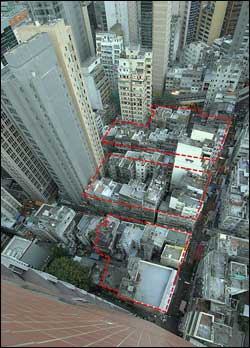 In an unprecedented move, property owners affected by the massive Peel and
Graham Street redevelopment plan in Central have joined forces to thwart the
project by setting up their own company with a counter proposal. Some owners
have created a firm called Graham Street Community Development and made a "flat
for a flat" and "shop for a shop" offer against the Urban Renewal Authority's
HK$3.8- billion facelift for the site, which includes dismantling the
140-year-old Graham Street wet market. So far, about 20 percent of the owners
have indicated they are interested in taking up the company's proposal. The
owners' move came after the authority made the highest ever compensation offer
for a redevelopment project - HK$8,508 per square foot of domestic saleable
floor area - to the 361 owners on the 57,240-square-foot site.
In an unprecedented move, property owners affected by the massive Peel and
Graham Street redevelopment plan in Central have joined forces to thwart the
project by setting up their own company with a counter proposal. Some owners
have created a firm called Graham Street Community Development and made a "flat
for a flat" and "shop for a shop" offer against the Urban Renewal Authority's
HK$3.8- billion facelift for the site, which includes dismantling the
140-year-old Graham Street wet market. So far, about 20 percent of the owners
have indicated they are interested in taking up the company's proposal. The
owners' move came after the authority made the highest ever compensation offer
for a redevelopment project - HK$8,508 per square foot of domestic saleable
floor area - to the 361 owners on the 57,240-square-foot site.
Hong Kong had an estimated 87,000
US-dollar millionaires at the end of last year, up 12.2 percent from 77,200 in
2005, according to the second annual Asia-Pacific Wealth Report released
yesterday by Merrill Lynch and business consultancy firm Capgemini. It's no
secret Hong Kong has more than its fair share of wealthy people - more than
9,000 joined the ranks of its US-dollar millionaires last year - but it is also
home to some 1,330 "ultra-millionaires" with net assets of more than US$30
million, a survey shows. The mainland, with a population 185 times as big as the
city's, has 4,900 ultra-millionaires, the annual survey by professional services
group Capgemini and investment bank Merrill Lynch found. Gregory Smith,
vice-president for wealth management of Capgemini Australia, said the region had
seen a sharp rise in the number of ultra-millionaires. "This is particularly
evident in China, where that country's phenomenal economic growth is reflected
in a high concentration of ultra-high-net-worth individuals," Mr Smith said.
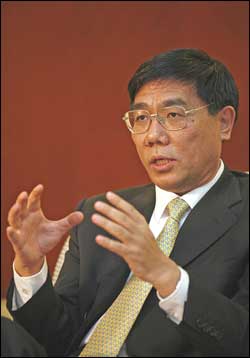 Boosted by solid operating results and
funds raised through mega initial stock offerings, mainland banks are seeking to
speed up overseas expansion plans by acquiring stakes in foreign lenders and by
adding branches. Industrial and Commercial Bank of China (1398) said it plans to
add four more branches. "We have gained the nod from the banking regulator to
open four branches in the US, Middle East and Australia and we should be soon be
getting approval from local authorities," Jiang Jianqing, chairman of ICBC, said
yesterday. Jiang said acquisitions in emerging markets are also being explored.
Heads of other lenders such as China Construction Bank (0939) and Bank of China
(3988) also said they planned to expand overseas. CCB chairman Guo Shuqing said
the bank will target commercial banks. "We will eye opportunities around the
globe," president Zhang Jianguo said. Boosted by solid operating results and
funds raised through mega initial stock offerings, mainland banks are seeking to
speed up overseas expansion plans by acquiring stakes in foreign lenders and by
adding branches. Industrial and Commercial Bank of China (1398) said it plans to
add four more branches. "We have gained the nod from the banking regulator to
open four branches in the US, Middle East and Australia and we should be soon be
getting approval from local authorities," Jiang Jianqing, chairman of ICBC, said
yesterday. Jiang said acquisitions in emerging markets are also being explored.
Heads of other lenders such as China Construction Bank (0939) and Bank of China
(3988) also said they planned to expand overseas. CCB chairman Guo Shuqing said
the bank will target commercial banks. "We will eye opportunities around the
globe," president Zhang Jianguo said.
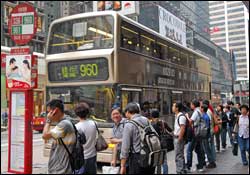 The
government said yesterday an application by Kowloon Motor Bus for a 9 percent
fare rise is still being reviewed but said it is on the "high" side. Secretary
for Transport and Housing Eva Cheng Yu-wah said the review, to be completed in
six months, will take into consideration a basket of factors under the
fare-adjustment mechanism. Lawmakers and the Transport Advisory Committee will
be consulted before the chief executive and the Executive Council decide, she
told legislators. The Democratic Party's Lee Wing- tat tried to move a motion in
the Legislative Council transport affairs panel urging the application be
rejected. He said the 9 percent increase far exceeds the 2 to 2.5 percent
inflation rate. The
government said yesterday an application by Kowloon Motor Bus for a 9 percent
fare rise is still being reviewed but said it is on the "high" side. Secretary
for Transport and Housing Eva Cheng Yu-wah said the review, to be completed in
six months, will take into consideration a basket of factors under the
fare-adjustment mechanism. Lawmakers and the Transport Advisory Committee will
be consulted before the chief executive and the Executive Council decide, she
told legislators. The Democratic Party's Lee Wing- tat tried to move a motion in
the Legislative Council transport affairs panel urging the application be
rejected. He said the 9 percent increase far exceeds the 2 to 2.5 percent
inflation rate.
HKUST scientists flying high with
Boeing deal - Airline passengers may soon be able to use their cell phones and
wireless laptops on board Boeing aircraft, thanks to a wireless communication
system now being developed by a Hong Kong university.
Hong Kong version, the first local
site in China, enabling non-English-speakers in the city to view and add to the
portal's content more easily. The Hong Kong version has secured content deals
with local media such as RTHK and ATV. YouTube, which was bought by internet
search engine Google last year, said the Hong Kong site -
http://hk.youtube.com - would allow users to
demonstrate their talent to the site's international community. The interface of
the Hong Kong version will be displayed in traditional Chinese characters,
rather than English, and content uploaded by Hong Kong users will show up in top
favorites and recommended content on the local site. The Hong Kong site will be
the 11th local site launched by YouTube, following Japan, Britain, Italy, Mexico
and others. "The Hong Kong version can be a showcase for all local content to
local users, and with our global reach, we can help bridge communities
worldwide," Steve Chen, co-founder and chief technology officer at YouTube,
said. YouTube had experienced robust growth in viewers and the number of video
clips uploaded since it launch in December 2005, he said.
 China:
China finds "Lust" too much to handle -Story Categories: Ang Lee, Awards,
censorship, China, China Film Group, Film, People, Piracy, regulation, The
hand-wringing over the Chinese release of Ang Lee's "Lust, Caution" continues as
the release date for the pic has been pushed back to Nov. 1, China Film said
Wednesday. But it may be delayed further as the movie has yet to pass
censorship. "We hope it will show on time," said China Film Group spokesman Weng
Li, who conceded that delays were possible as censors have yet to screen the
wartime drama. Pic contains some fairly graphic sex scenes that are expected to
run afoul of Chinese censors. Lee has made cuts to the film -- he said in an
interview on CNN that he's cut seven or eight minutes, fewer than the 11 he
trimmed from the Malaysian version -- but it remains to be seen whether these
edits will appease China's famously prudish censors. Piracy is also a concern:
The longer the pic goes without a release in China, the more opportunity pirates
have to get a good version out there. Illegal downloads are already making the
rounds in China. The Golden Lion-winning pic has a political theme, but probably
the right kind of politics for the Chinese Communist Party because it's about an
undercover activist who seduces the Japanese-allied intelligence chief in
WWII-era Shanghai to pave the way for his assassination. Despite the delays on
"Lust, Caution," Lee's stock is rising in the People's Republic of China -- he
is involved in coordination of the Beijing Summer Olympics next year.
China:
China finds "Lust" too much to handle -Story Categories: Ang Lee, Awards,
censorship, China, China Film Group, Film, People, Piracy, regulation, The
hand-wringing over the Chinese release of Ang Lee's "Lust, Caution" continues as
the release date for the pic has been pushed back to Nov. 1, China Film said
Wednesday. But it may be delayed further as the movie has yet to pass
censorship. "We hope it will show on time," said China Film Group spokesman Weng
Li, who conceded that delays were possible as censors have yet to screen the
wartime drama. Pic contains some fairly graphic sex scenes that are expected to
run afoul of Chinese censors. Lee has made cuts to the film -- he said in an
interview on CNN that he's cut seven or eight minutes, fewer than the 11 he
trimmed from the Malaysian version -- but it remains to be seen whether these
edits will appease China's famously prudish censors. Piracy is also a concern:
The longer the pic goes without a release in China, the more opportunity pirates
have to get a good version out there. Illegal downloads are already making the
rounds in China. The Golden Lion-winning pic has a political theme, but probably
the right kind of politics for the Chinese Communist Party because it's about an
undercover activist who seduces the Japanese-allied intelligence chief in
WWII-era Shanghai to pave the way for his assassination. Despite the delays on
"Lust, Caution," Lee's stock is rising in the People's Republic of China -- he
is involved in coordination of the Beijing Summer Olympics next year.
Statistics from US Department of the Treasury showed China
and Japan sold US treasuries this August at a pace unprecedented in the last
five years.
 The 17th National Congress presidium has decided to hold a primary election to
choose the new Central Committee - the same method used by the party since 1987.
The 237-member body held its second meeting yesterday and announced it had
approved the method, but it still has to be endorsed by the more than 2,200
delegates. A list of the recommended candidates has also been put forward to the
delegates. The presidium decided that delegates will hold a primary before a
final ballot to choose the committee members, Xinhua said. The same method has
been followed since the 13th National Congress in 1987. The procedure will allow
party leaders to control the election results to ensure their favored members
are chosen. As a safety measure, those who are voted down will have a second
chance to be elected alternate members. Displaying typical caution and
secretiveness, a senior party official said that the method was still being
finalized. "The election method is still being deliberated by the delegates,"
said Ouyang Song , deputy head of the party Central Committee's Organization
Department.
The 17th National Congress presidium has decided to hold a primary election to
choose the new Central Committee - the same method used by the party since 1987.
The 237-member body held its second meeting yesterday and announced it had
approved the method, but it still has to be endorsed by the more than 2,200
delegates. A list of the recommended candidates has also been put forward to the
delegates. The presidium decided that delegates will hold a primary before a
final ballot to choose the committee members, Xinhua said. The same method has
been followed since the 13th National Congress in 1987. The procedure will allow
party leaders to control the election results to ensure their favored members
are chosen. As a safety measure, those who are voted down will have a second
chance to be elected alternate members. Displaying typical caution and
secretiveness, a senior party official said that the method was still being
finalized. "The election method is still being deliberated by the delegates,"
said Ouyang Song , deputy head of the party Central Committee's Organization
Department.
October 19, 2007
 Hong Kong:
Hong Kong Land Registry Trading Fund achieved a net post-tax profit of 117.5
million Hong Kong dollars (about 15.16 million U.S. dollars) for the financial
year ended March 31, according to a report released on Wednesday. The figure
amounts to a return of 20.9 percent on average net fixed assets, the report
said. Hong Kong Land Registrar Kim Salkeld said the registry will upgrade
service quality and make steady progress towards the introduction of title
registration. "As well as the work to prepare for title registration, we will
need to respond to growing demand from the public and other branches of
government for increased integration and ease of use of electronic services. We
will also face continued pressure to demonstrate to the public that we provide
services of the highest quality and value," Salkeld said. The Integrated
Registration Information System, launched on Feb. 12, 2005, was upgraded early
this year, with a new function added and land-record printing streamlined. "We
have seen a 39 percent rise in the number of business subscribers since the
launch of the system and 87 percent of the 4. 4 million searches made during the
year used our electronic services," Salkeld added. Hong Kong:
Hong Kong Land Registry Trading Fund achieved a net post-tax profit of 117.5
million Hong Kong dollars (about 15.16 million U.S. dollars) for the financial
year ended March 31, according to a report released on Wednesday. The figure
amounts to a return of 20.9 percent on average net fixed assets, the report
said. Hong Kong Land Registrar Kim Salkeld said the registry will upgrade
service quality and make steady progress towards the introduction of title
registration. "As well as the work to prepare for title registration, we will
need to respond to growing demand from the public and other branches of
government for increased integration and ease of use of electronic services. We
will also face continued pressure to demonstrate to the public that we provide
services of the highest quality and value," Salkeld said. The Integrated
Registration Information System, launched on Feb. 12, 2005, was upgraded early
this year, with a new function added and land-record printing streamlined. "We
have seen a 39 percent rise in the number of business subscribers since the
launch of the system and 87 percent of the 4. 4 million searches made during the
year used our electronic services," Salkeld added.

 United Nation report: Hong Kong a
"front-runner" economy - Hong Kong has retained its position as Asia's
second largest destination for foreign direct investment (FDI), according to a
report released on Wednesday by the United Nations Conference on Trade and
Development. The report, named World Investment Report 2007, highlighted Hong
Kong as a "front-runner" economy, following high rankings in both its Inward FDI
Potential and Performance Indexes. Hong Kong attracted FDI valued at 42.9
billion U.S. dollars last year, up 28 percent on 2005. Together with the Chinese
mainland, which was the largest FDI recipient, the two economies accounted for
over half of FDI inflows into the region last year. United Nation report: Hong Kong a
"front-runner" economy - Hong Kong has retained its position as Asia's
second largest destination for foreign direct investment (FDI), according to a
report released on Wednesday by the United Nations Conference on Trade and
Development. The report, named World Investment Report 2007, highlighted Hong
Kong as a "front-runner" economy, following high rankings in both its Inward FDI
Potential and Performance Indexes. Hong Kong attracted FDI valued at 42.9
billion U.S. dollars last year, up 28 percent on 2005. Together with the Chinese
mainland, which was the largest FDI recipient, the two economies accounted for
over half of FDI inflows into the region last year.
Macao's accumulated fiscal reserves reached
30.59 billion patacas (3.8 billion U.S. dollars) at the end of 2006, local media
reported Wednesday. The Macao Post Daily quoted Francis Tam Pak Yuen, secretary
for Economy and Finance, as saying that the government's budget produced a
surplus of 9.83 billion patacas (1.23 billion U.S. dollars) in 2006. The city's
blossoming gaming industry dedicated a 20.62-billion- patacas (2.58 U.S.
dollars) tax payment to the government in 2006, the finance chief told the
newspaper. The government spent 4.34 billion patacas (543 million U.S. dollars)
on public investment in the past year, the official was cited.
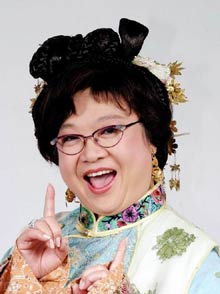 Hong
Kong's leading television producer, TVB, will present the highest honor among
its anniversary awards to one of the locals' most favored comedians, Lydia Shum.
Sixty-year-old Shum will be honored with the Lifetime Achievement Award for her
decade-long contribution to the show business industry, according to a TVB
announcement on Monday. Recipients from previous years include Kwan Hoi-San, Lo
Lan and Chung King-Fai. Shum has also been nominated for Best Television
Presenter. This year's TVB Anniversary Awards night is scheduled for Nov. 17,
around the station's 40th anniversary. It's unknown whether Shum will be there
to accept the award. The star has been visiting hospital frequently due to
complications from her bile duct operation last year. Shum fainted at her home
last week and was soon sent to a local hospital. Details of her condition are
not clear. Hong
Kong's leading television producer, TVB, will present the highest honor among
its anniversary awards to one of the locals' most favored comedians, Lydia Shum.
Sixty-year-old Shum will be honored with the Lifetime Achievement Award for her
decade-long contribution to the show business industry, according to a TVB
announcement on Monday. Recipients from previous years include Kwan Hoi-San, Lo
Lan and Chung King-Fai. Shum has also been nominated for Best Television
Presenter. This year's TVB Anniversary Awards night is scheduled for Nov. 17,
around the station's 40th anniversary. It's unknown whether Shum will be there
to accept the award. The star has been visiting hospital frequently due to
complications from her bile duct operation last year. Shum fainted at her home
last week and was soon sent to a local hospital. Details of her condition are
not clear.
Pouring cold water on suggestions
that a recent record-breaking run in Hong Kong shares was the result of stock
purchases by the mainland's sovereign investment fund, the agency's head said
yesterday speculators have been talking up the market to pocket profits.
The government has
no plans to develop any new theme parks to Hong Kong, Chief Executive Donald
Tsang Yam-kuen said on Wednesday.
Legislative Council
by-election candidate Regina Ip Lau Suk-yee submitted her nomination form on
Wednesday, when a two-week nomination period started.
Despite a cross-border
provision for Hong Kong doctors to launch practices on the mainland, medical
professionals complain they are being caught up in red tape.
Under the latest phase of the Closer Economic Partnership Arrangement (Cepa)
announced in July, Hong Kong doctors qualified on the mainland are allowed to
launch solo practices there. The accord also halved the investment requirement
for joint ventures in medical institutions to 10 million yuan. Still, some
doctors have sought the help of the Hong Kong Medical Association because of the
lack of professional indemnity insurance coverage on the mainland and the red
tape involved in opening clinics. More than 20 Hong Kong doctors will visit
Shanghai health-care institutes this week on a tour organized by the central
government's liaison office in Hong Kong. They will discuss the Cepa
arrangements with local government officials and exchange views on professional
developments.
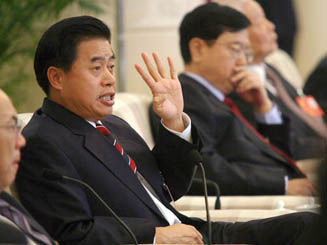 The construction of a sixth cross-border checkpoint
between Hong Kong and Shenzhen is set to go ahead to ease mounting traffic
pressure, says Shenzhen party secretary Li Hongzhong.
The construction of a sixth cross-border checkpoint
between Hong Kong and Shenzhen is set to go ahead to ease mounting traffic
pressure, says Shenzhen party secretary Li Hongzhong.
 China:
Researchers and technicians are making final preparations for the launch of the
country's first moon orbiter, Chang'e I, at the end of October, a senior Chinese
official said Tuesday.
China:
Researchers and technicians are making final preparations for the launch of the
country's first moon orbiter, Chang'e I, at the end of October, a senior Chinese
official said Tuesday.
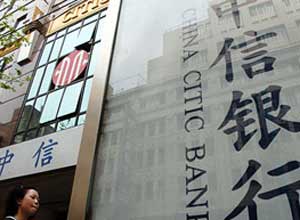 Leading financial firm China CITIC Group (CITIC)
is bidding for a stake in Bear Stearns, one of Wall Street's top investment
banks, top officials said yesterday in Beijing.
Leading financial firm China CITIC Group (CITIC)
is bidding for a stake in Bear Stearns, one of Wall Street's top investment
banks, top officials said yesterday in Beijing.
The Industrial and Commercial Bank of China (ICBC)
has planned to open a subsidiary in the United States, as part of its
going-global strategy which also involves Russia, Indonesia and the Middle East,
Board Chairman Jiang Jianqing said here on Wednesday.
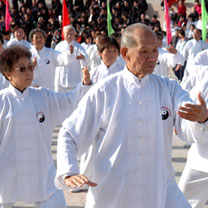 Retirees in formation
perform Tai Chi, a traditional form of Chinese matial arts, during an activity
promoting the Olympic spirit and enhancing the public's awareness of health in
Xinjiang. Retirees in formation
perform Tai Chi, a traditional form of Chinese matial arts, during an activity
promoting the Olympic spirit and enhancing the public's awareness of health in
Xinjiang.
China's largest search company is to enter China's
e-commerce market, in an effort to use its search technologies and popular
online communities to win a share of the personal online trading market
dominated by Alibaba's Taobao.com.
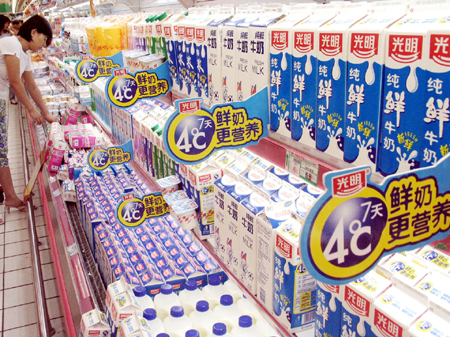 Bright Dairy
products on sale at a Shanghai supermarket. Groupe Danone SA, the world's
largest yogurt maker, has terminated its collaboration with Bright Dairy, after
it failed to get the majority stake in the Chinese firm. Bright Dairy
products on sale at a Shanghai supermarket. Groupe Danone SA, the world's
largest yogurt maker, has terminated its collaboration with Bright Dairy, after
it failed to get the majority stake in the Chinese firm.
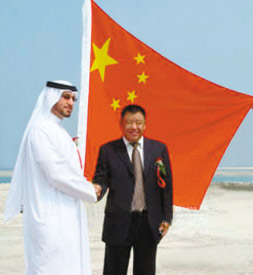 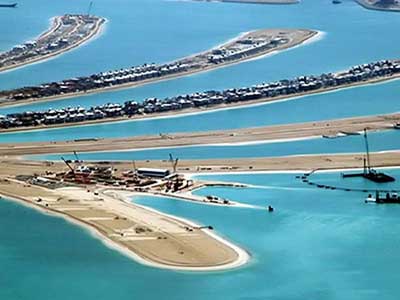 A Chinese businessman said on Tuesday that he has bought
an artificial island in Dubai for US$28 million. Hu Bin, developer and director
of the Shanghai Zhongzhou International Holding Group, bought the
40,000-square-meter Shanghai Island, part of "The World" development in Dubai,
which comprises 300 islands made from reclaimed land in the shape of the world
map. Hu said that he planned to spend another 1.2 billion to 1.5 billion yuan in
the next three years to build hotels and villas on the island and turn it into a
tourist resort. The resort would also include canals and buildings resembling
Shanghai's landmark areas like the Huangpu River, the Bund and the Lujiazui
financial district, he added. Many Chinese entrepreneurs are eyeing foreign
property investments. In May, a businessman from central China's Henan Province
forked out 1 billion yuan (US$133 million) to buy an airport in north Germany.
A Chinese businessman said on Tuesday that he has bought
an artificial island in Dubai for US$28 million. Hu Bin, developer and director
of the Shanghai Zhongzhou International Holding Group, bought the
40,000-square-meter Shanghai Island, part of "The World" development in Dubai,
which comprises 300 islands made from reclaimed land in the shape of the world
map. Hu said that he planned to spend another 1.2 billion to 1.5 billion yuan in
the next three years to build hotels and villas on the island and turn it into a
tourist resort. The resort would also include canals and buildings resembling
Shanghai's landmark areas like the Huangpu River, the Bund and the Lujiazui
financial district, he added. Many Chinese entrepreneurs are eyeing foreign
property investments. In May, a businessman from central China's Henan Province
forked out 1 billion yuan (US$133 million) to buy an airport in north Germany.
China's 2007 trade surplus is likely to exceed 250 billion
dollars while consumer inflation was likely to top four percent, said a central
bank official.
China's inflation rate likely eased
last month to about 6.2 percent after reaching a near 11-year high of 6.5
percent in August, but further austerity measures are expected, top officials
indicated yesterday.
October 18, 2007
 Hong Kong:
A study found that a substance called "lupeol" contained in fruits may help beat
head and neck cancer, announced the University of Hong Kong which made the
result public here Tuesday. The study, conducted by the university's Faculty of
Medicine, revealed that lupeol, a compound rich in fruits, selectively targeted
and killed cancer cells. Using a mouse animal model, lupeol dramatically
decreased tumor volume and suppressed local metastasis while bearing minimal
effect on surrounding tissue and other vital organs like liver and kidney.
Interestingly, lupeol was found to be more effective and more potent than
conventionally used chemotherapeutic drug, cisplatin, by approximately
three-fold in terms of tumor volume and degree of metastasis suppression.
Besides, when lupeol was used in combination with cisplatin, the anti-tumour
activity of the chemotherapeutic drug could be enhanced by 40-fold. The above
research result was published in the international scientific journal Cancer
Research in September, 2007. Head and neck cancer includes cancers of the nose,
oral cavity, salivary gland, etc. In the year 2004, 2,087 new cases were
diagnosed in Hong Kong, with the number of new cases increasing steadily every
year. Human papilloma virus infection, alcohol and tobacco consumption and low
fruits and vegetables intake all contribute to the increased risk of head and
neck cancer development. The university was in the hope that the findings will
also show people that only a slight change in their everyday meal or a small
change in their choice of food intake may have an astounding impact on cancer
prevention and therapy. Hong Kong:
A study found that a substance called "lupeol" contained in fruits may help beat
head and neck cancer, announced the University of Hong Kong which made the
result public here Tuesday. The study, conducted by the university's Faculty of
Medicine, revealed that lupeol, a compound rich in fruits, selectively targeted
and killed cancer cells. Using a mouse animal model, lupeol dramatically
decreased tumor volume and suppressed local metastasis while bearing minimal
effect on surrounding tissue and other vital organs like liver and kidney.
Interestingly, lupeol was found to be more effective and more potent than
conventionally used chemotherapeutic drug, cisplatin, by approximately
three-fold in terms of tumor volume and degree of metastasis suppression.
Besides, when lupeol was used in combination with cisplatin, the anti-tumour
activity of the chemotherapeutic drug could be enhanced by 40-fold. The above
research result was published in the international scientific journal Cancer
Research in September, 2007. Head and neck cancer includes cancers of the nose,
oral cavity, salivary gland, etc. In the year 2004, 2,087 new cases were
diagnosed in Hong Kong, with the number of new cases increasing steadily every
year. Human papilloma virus infection, alcohol and tobacco consumption and low
fruits and vegetables intake all contribute to the increased risk of head and
neck cancer development. The university was in the hope that the findings will
also show people that only a slight change in their everyday meal or a small
change in their choice of food intake may have an astounding impact on cancer
prevention and therapy.
China's chief official for state
assets said here Monday that state-owned enterprises are encouraged to be listed
in the Hong Kong Stock Exchange. Li Rongrong, minister in charge of the
State-owned Assets Supervision and Administration Commission (SASAC), said on
the sidelines of the ongoing 17th National Congress of the Communist Party of
China (CPC). Many state-owned enterprises, particularly those under direct
control of the State Council, are quite interested in financing in the Hong Kong
Stock Exchange, he said. The SASAC shows no position to what stock markets the
state-owned enterprises should resort to financing, Li said. His job is to try
hard to breed potentially powerful state enterprises to become globally
competitive companies. Li said the SASAC welcomes overseas private equity funds
to invest in Chinese state-owned enterprises, but warned Chinese enterprises of
vicious speculation of those funds. Echoing the policy mentioned in the report
delivered by Hu Jintao to the Party congress on enhancing the vitality, control
and influence of the state-owned economic sector, Li said his commission will
speed up restructuring state-owned enterprises in a bid to promote their
competitiveness.
 President Hu Jintao has issued a stern warning against any
attempt by "external forces" to meddle in the affairs of Hong Kong and Macau,
vowing Beijing will resolutely fight such a plot.
President Hu Jintao has issued a stern warning against any
attempt by "external forces" to meddle in the affairs of Hong Kong and Macau,
vowing Beijing will resolutely fight such a plot.
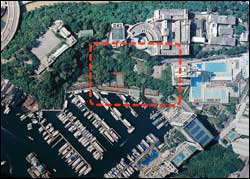 Two residential sites were sold at
auction yesterday at more than double their opening prices following fierce
bidding which far exceeded market expectations. A consortium consisting of Sino
Land (0083), K Wah International (0173) and Nan Fung Properties secured the
69,822-square-foot plot on Welfare Road in Aberdeen for HK$5.71 billion. This
was almost 130 percent above the opening bid of HK$2.5 billion. Facing Shum Wan
yacht pier and the Aberdeen Channel, the site has up to 646,220 sq ft of floor
area. That translates to an accommodation value of HK$8,836 per sq ft - a record
high for Island sites compared with traditional luxury areas of the Peak and
South Bay. Analysts had expected the site to be sold for HK$3.46 billion to
HK$4.4 billion. The high auction price indicated the tight supply of luxury
sites, they said. Two residential sites were sold at
auction yesterday at more than double their opening prices following fierce
bidding which far exceeded market expectations. A consortium consisting of Sino
Land (0083), K Wah International (0173) and Nan Fung Properties secured the
69,822-square-foot plot on Welfare Road in Aberdeen for HK$5.71 billion. This
was almost 130 percent above the opening bid of HK$2.5 billion. Facing Shum Wan
yacht pier and the Aberdeen Channel, the site has up to 646,220 sq ft of floor
area. That translates to an accommodation value of HK$8,836 per sq ft - a record
high for Island sites compared with traditional luxury areas of the Peak and
South Bay. Analysts had expected the site to be sold for HK$3.46 billion to
HK$4.4 billion. The high auction price indicated the tight supply of luxury
sites, they said.
With PetroChina (0857) soaring to
become the world's second-largest company by market value, Hong Kong and
mainland stocks hit new records yesterday as punters - unfazed by overstretched
valuations - continued pumping money into the markets on expectations of further
gains.
Richard Li Tzar-kai's telecoms
flagship, PCCW (0008), was the only bidder for the third-generation mobile
license offered by the Hong Kong government, the Office of the
Telecommunications Authority said yesterday.
The mainland's largest trading
website, Alibaba.com, may turn out to be among the most ambitious of Hong Kong
share floats in recent months as it seeks to raise as much as HK$10.3 billion.
China National Aviation Corp, the
parent of Hong Kong-listed Air China (0753), said it is not ruling out the
possibility of trying to defeat Singapore Airlines' proposed major stake
acquisition of China Eastern Airlines (0670) at the Shanghai-based carrier's
upcoming shareholders' meeting.
Hong Kong’s unemployment fell to 4.1 per cent in the three months to September
on the back of a strong economy, government figures released on Tuesday showed.
Hong Kong’s economy was performing
better now than it did at the time of the July 1, 1997 handover, Financial
Secretary John Tsang Chun-wah said on Tuesday.
 MTR Corp, in its most important technology project this decade, will adopt key
business-automation software from Oracle Corp to help absorb the entire
information infrastructure of the century-old Kowloon-Canton Railway Corp. The
initiative, which will be completed in stages, is an integral part of the HK$12
billion merger between the two rail companies. "This is our biggest and most
complex project" since the system changeover in 2000, said Daniel Lai, the head
of information technology at MTR. He declined to provide financial details. Mr
Lai said the combined rail operation, which will bear the name MTRC (SEHK:
0066), would see significant savings in the cost of enterprise software licences
and system maintenance and support after the IT infrastructure integration was
completed. The project effectively removes software from German firm SAP, a
supplier to KCRC, as part of strategic business-automation applications for the
merged company. United States-based Oracle, a global rival of SAP in enterprise
resource planning and other business applications, has been a long-time
enterprise technology provider to MTR. SAP programs used by KCRC to be replaced
with Oracle applications include those for financial systems, maintenance and
assets inventory, human resources and payroll.
MTR Corp, in its most important technology project this decade, will adopt key
business-automation software from Oracle Corp to help absorb the entire
information infrastructure of the century-old Kowloon-Canton Railway Corp. The
initiative, which will be completed in stages, is an integral part of the HK$12
billion merger between the two rail companies. "This is our biggest and most
complex project" since the system changeover in 2000, said Daniel Lai, the head
of information technology at MTR. He declined to provide financial details. Mr
Lai said the combined rail operation, which will bear the name MTRC (SEHK:
0066), would see significant savings in the cost of enterprise software licences
and system maintenance and support after the IT infrastructure integration was
completed. The project effectively removes software from German firm SAP, a
supplier to KCRC, as part of strategic business-automation applications for the
merged company. United States-based Oracle, a global rival of SAP in enterprise
resource planning and other business applications, has been a long-time
enterprise technology provider to MTR. SAP programs used by KCRC to be replaced
with Oracle applications include those for financial systems, maintenance and
assets inventory, human resources and payroll.
 China:
A total of 1,517 companies have gone public on the stock markets of the Chinese
mainland by the end of September, and the volume of equity market capitalization
ranked the fourth largest in the world. As of Sept. 30, the volume reached 25.32
trillion yuan (3.37 trillion U.S. dollars), taking up about 5.7 percent of the
world's total. In comparison, the overall volume at Shanghai and Shenzhen stock
exchanges stood around 4 trillion yuan at the end of 2002, ranking the fourth
largest in Asia. The statistics came from a delegation of central financial
authorities to attend the ongoing 17th National Congress of the Communist Party
of China.
China:
A total of 1,517 companies have gone public on the stock markets of the Chinese
mainland by the end of September, and the volume of equity market capitalization
ranked the fourth largest in the world. As of Sept. 30, the volume reached 25.32
trillion yuan (3.37 trillion U.S. dollars), taking up about 5.7 percent of the
world's total. In comparison, the overall volume at Shanghai and Shenzhen stock
exchanges stood around 4 trillion yuan at the end of 2002, ranking the fourth
largest in Asia. The statistics came from a delegation of central financial
authorities to attend the ongoing 17th National Congress of the Communist Party
of China.
Beijing's urban planning authorities
have approved planning permission for six new subway lines on which work is
scheduled to begin by the end of the year. The six new lines - the No. 6, 8 and
9 lines, the second phase of the No. 10 line, and the Yizhuang and Daxing lines,
have a total length of 152 kilometers, according to the Beijing Municipal
Commission of Urban Planning. They will be completed in 2012. Beijing currently
has five subway lines in operation, with a total length of 142 kilometers. "The
city aims to raise the proportion of citizens choosing public transport from the
current 30 percent to 45 percent by 2015,and the subway passenger volume will
increase to eight million a day from the current 2.2 million," said the
commission's Zhou Nansen.
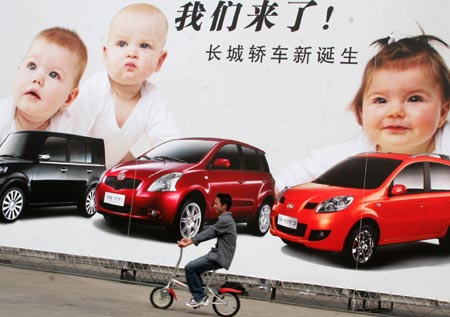 A man rides past
a Great Wall Motor billboard in Shanghai. Great Wall Motor Co plans to more than
double its number of overseas plants by the end of this decade to boost sales
abroad. A man rides past
a Great Wall Motor billboard in Shanghai. Great Wall Motor Co plans to more than
double its number of overseas plants by the end of this decade to boost sales
abroad.
With the debut of China's fourth stock-oriented QDII fund,
China International Fund Management Co Ltd raised more than 100 billion yuan
yesterday.
October 17, 2007
 Hong Kong:
HK's financial surplus may top 50
bln HKD - The Hong Kong Special Administrative Region (HKSAR) government's
surplus may reach 50 billion HK dollars (6.45 billion U.S. dollars) in this
fiscal year, Financial Secretary of HKSAR government John Tsang said here
Saturday. Speaking on a radio talk show Saturday, Tsang said the Chief
Executive's Policy Address has already promised to cut the salaries tax to 15
percent and profits tax to 16.5 percent. Tsang said he would continue to listen
to the community's views on the budget and make a balanced decision early next
year. He said inflation is expected to rise to 2 percent by the end of the year,
adding that it is still a mild rise compared with a 5 percent to 6 percent GDP
growth. However, he admitted that price rises have affected the poor and the
HKSAR government will study how to assist them to help themselves, and that one
of the best ways is to create more jobs. Tsang said the Policy Address has
announced the HKSAR government will push ahead with 10 large-scale
infrastructure projects and a rough estimate finds that about 250,000 jobs would
be created. This will help people to get a job and improve their standard of
living, he added. He noted that Hong Kong is facing keen competition from
regional cities for convention and exhibition services but the HKSAR government
will continue its discussions with the sector to find ways of strengthening Hong
Kong's competitiveness. The completion of the Convention and Exhibition Center
extension will help meet demand in the mid-term, he said, adding more places
will be considered for the industry's future development. Commenting on the
recent stock market performance, he urged investors to be cautious when making
any decisions, as stock prices may go up as well as down. Hong Kong:
HK's financial surplus may top 50
bln HKD - The Hong Kong Special Administrative Region (HKSAR) government's
surplus may reach 50 billion HK dollars (6.45 billion U.S. dollars) in this
fiscal year, Financial Secretary of HKSAR government John Tsang said here
Saturday. Speaking on a radio talk show Saturday, Tsang said the Chief
Executive's Policy Address has already promised to cut the salaries tax to 15
percent and profits tax to 16.5 percent. Tsang said he would continue to listen
to the community's views on the budget and make a balanced decision early next
year. He said inflation is expected to rise to 2 percent by the end of the year,
adding that it is still a mild rise compared with a 5 percent to 6 percent GDP
growth. However, he admitted that price rises have affected the poor and the
HKSAR government will study how to assist them to help themselves, and that one
of the best ways is to create more jobs. Tsang said the Policy Address has
announced the HKSAR government will push ahead with 10 large-scale
infrastructure projects and a rough estimate finds that about 250,000 jobs would
be created. This will help people to get a job and improve their standard of
living, he added. He noted that Hong Kong is facing keen competition from
regional cities for convention and exhibition services but the HKSAR government
will continue its discussions with the sector to find ways of strengthening Hong
Kong's competitiveness. The completion of the Convention and Exhibition Center
extension will help meet demand in the mid-term, he said, adding more places
will be considered for the industry's future development. Commenting on the
recent stock market performance, he urged investors to be cautious when making
any decisions, as stock prices may go up as well as down.
The first phase of Macao's light
railway construction scheme has been clinched, according to an official
statement issued Sunday. The statement released by the government of the Macao
Special Administrative Region said the light railway program is expected to
start the public bidding in 2008 and to complete construction in 2011. The first
phase of the construction plan features a 20-km route linking the Macao
Peninsula and the two islands of Taipa and Coloane, said the statement. It added
that the railway is to handle 8,000 passengers per hour. Macao has a population
of 528,000.
 When Grenville Cross SC took up the post as the director of public prosecutions
10 years ago today, his vision was to build a "far more transparent, modern, and
internationalist" public prosecutions system. Over the past decade, he has
introduced an annual report on the work of his team, issued prosecution policy
guidelines, built up specialist teams targeting increasingly sophisticated
crime, reached out to victims of crimes, the media and the public, and
established international networks with overseas prosecutors. Mr Cross,
currently in his fourth three-year term as the city's longest-serving DPP,
believes he and his team of 230 prosecutors have satisfied the challenge. "We
are seen to be successful. And we are understood by people," he said. Unlike
many of his predecessors, his tenure has been clean of sexual scandals and
criminal convictions of subordinates. However, another sort of challenge was
posed to him as his decisions on whether to prosecute high-profile people fell
under public scrutiny. Among the controversial cases was his decision not to
prosecute Sally Aw Sian, former publishing tycoon and Chinese People's Political
Consultative Conference delegate, in a circulation fraud case involving the Hong
Kong Standard in 1998. Elsie Leung Oi-sie, then secretary for justice, sparked
outcry after she told legislators that "public interest" was a factor she had
considered before reaching the decision not to prosecute Ms Aw. Asked if he held
a different stance from Ms Leung, he said: "Well, the Department [of Justice]'s
view was there shouldn't be a prosecution in that case. So that was it." But
what the seasoned prosecutor considered as his test case was that of former
financial secretary Antony Leung Kam-chung, who was accused of avoiding first
registration tax by purchasing a Lexus saloon in advance of the budget in 2003.
The department dropped the case after deciding there was insufficient evidence
to establish Mr Leung had intentionally committed the act for personal benefit.
"The secretary of justice had to disqualify herself in the Leung Kam-chung case
because she was a member of the Executive Council with Mr Leung. So everything
was left for me to decide. The eyes of the world were on us. I had to make sure
that nothing went wrong," he said. "Even though not everyone necessarily agrees
with our decisions, at the end of the day, [they] were taken in good faith." The
56-year-old, who started his prosecuting career in 1976 and was appointed the
deputy DPP in 1991, admitted that his job had become increasingly stressful
because of higher expectations from outside. But he said he had learnt to switch
off once he left the office. "I don't spend all night worrying about whether I
have taken the right decision. Once you have taken a decision, you have to stick
by it and put it behind you," he said. He added that he enjoyed writing, hiking
and collecting antiques in his free time. Looking ahead, he said he would
continue to deploy his three-pronged policy on transparency, modernisation and
internationalism. One of the initiatives on his strategic development programme
for the next five years was to set up a working group to examine whether
prosecutors should be allowed to form their own opinion of witnesses by
interviewing them before trial. Despite the huge amount of administration work,
he continued to appear in court in some major cases. "I think it is important
from time to time to appear at the frontline and to lead by example. I love
doing appeal," he said.
When Grenville Cross SC took up the post as the director of public prosecutions
10 years ago today, his vision was to build a "far more transparent, modern, and
internationalist" public prosecutions system. Over the past decade, he has
introduced an annual report on the work of his team, issued prosecution policy
guidelines, built up specialist teams targeting increasingly sophisticated
crime, reached out to victims of crimes, the media and the public, and
established international networks with overseas prosecutors. Mr Cross,
currently in his fourth three-year term as the city's longest-serving DPP,
believes he and his team of 230 prosecutors have satisfied the challenge. "We
are seen to be successful. And we are understood by people," he said. Unlike
many of his predecessors, his tenure has been clean of sexual scandals and
criminal convictions of subordinates. However, another sort of challenge was
posed to him as his decisions on whether to prosecute high-profile people fell
under public scrutiny. Among the controversial cases was his decision not to
prosecute Sally Aw Sian, former publishing tycoon and Chinese People's Political
Consultative Conference delegate, in a circulation fraud case involving the Hong
Kong Standard in 1998. Elsie Leung Oi-sie, then secretary for justice, sparked
outcry after she told legislators that "public interest" was a factor she had
considered before reaching the decision not to prosecute Ms Aw. Asked if he held
a different stance from Ms Leung, he said: "Well, the Department [of Justice]'s
view was there shouldn't be a prosecution in that case. So that was it." But
what the seasoned prosecutor considered as his test case was that of former
financial secretary Antony Leung Kam-chung, who was accused of avoiding first
registration tax by purchasing a Lexus saloon in advance of the budget in 2003.
The department dropped the case after deciding there was insufficient evidence
to establish Mr Leung had intentionally committed the act for personal benefit.
"The secretary of justice had to disqualify herself in the Leung Kam-chung case
because she was a member of the Executive Council with Mr Leung. So everything
was left for me to decide. The eyes of the world were on us. I had to make sure
that nothing went wrong," he said. "Even though not everyone necessarily agrees
with our decisions, at the end of the day, [they] were taken in good faith." The
56-year-old, who started his prosecuting career in 1976 and was appointed the
deputy DPP in 1991, admitted that his job had become increasingly stressful
because of higher expectations from outside. But he said he had learnt to switch
off once he left the office. "I don't spend all night worrying about whether I
have taken the right decision. Once you have taken a decision, you have to stick
by it and put it behind you," he said. He added that he enjoyed writing, hiking
and collecting antiques in his free time. Looking ahead, he said he would
continue to deploy his three-pronged policy on transparency, modernisation and
internationalism. One of the initiatives on his strategic development programme
for the next five years was to set up a working group to examine whether
prosecutors should be allowed to form their own opinion of witnesses by
interviewing them before trial. Despite the huge amount of administration work,
he continued to appear in court in some major cases. "I think it is important
from time to time to appear at the frontline and to lead by example. I love
doing appeal," he said.
The Home Affairs Bureau and the
Sports Federation and Olympic Committee of Hong Kong jointly held the "300-day
Countdown to the Beijing 2008 Olympic Games Ceremony" at the Hong Kong Cultural
Center Piazza on Saturday. Secretary for Home Affairs Bureau Tsang Tak-sing said
at the ceremony that not only did it mark the 300 more days to the opening of
the Olympic Games but it also launched the Olympic city dress-up program. Tsang
said that over the past year Hong Kong had been putting a lot of effort into
preparation for the launch of the Olympic Games. "Today's ceremony marks the
launching of our Olympic city dress-up exercise. The Government and all relevant
parties are now planning a series of community engagement activities and
publicity campaigns, to encourage community participation in full," said Tsang.
Athletes and representatives of Hong Kong's sports sector participated in the
countdown ceremony with singers and artists performing during the event.
Singapore founding father Lee Kuan
Yew emphasized on Sunday the importance of the rule of law for investors and for
economic growth. Speaking at the International Bar Association's conference,
Minister Mentor Lee said: "Important for investors and economic growth is the
rule of law, implemented through an independent judiciary, an honest and
efficient police force, and effective law enforcement agencies." According to
local television Channel News Asia report, he also listed some key attributes
such as good governance and a sound judicial system that have resulted in
stability and economic growth for Singapore. Addressing some 3,500 lawyers and
participants from around the world, Lee also cited three factors which enabled
the country to escape the poverty that had plagued the region. "First, clean and
efficient government, second, the character and capabilities of the leadership
in charge, third, an industrious people, eager and quick to learn to be
productive and gainfully employed," he said.
Following Chief Executive Donald
Tsang Yam-kuen's announcement last week that Hong Kong will work for the early
introduction of Islamic debt offerings, the Arab Chamber of Commerce and
Industry in Hong Kong has gathered a group of experts on Islamic law to support
banks creating Islamic financial products.
 This month, Asia
marked the anniversary of the birth of one of its greatest thinkers – Confucius
– who was born 2,558 years ago in China. In Hong Kong, a grand Confucius banquet
was among celebrations to pay tribute to the Chinese philosopher. Prominent
chefs from Qufu, Shandong province, his birthplace, were invited to the
territory to introduce unique Shandong-style dishes dedicated to Confucius. This
was held at a banquet in Hong Kong on October 4, said Huang Cunze, information
director of the Shandong provincial government. The ideas of Confucius during
the 5th and 6th centuries before the common era have had an extraordinary impact
since his death in 479 BCE. Today, many of the most important values shared by
people in the mainland, Japan, Vietnam, Hong Kong, Korea and Singapore are
strongly influenced by this extraordinary man. This month, Asia
marked the anniversary of the birth of one of its greatest thinkers – Confucius
– who was born 2,558 years ago in China. In Hong Kong, a grand Confucius banquet
was among celebrations to pay tribute to the Chinese philosopher. Prominent
chefs from Qufu, Shandong province, his birthplace, were invited to the
territory to introduce unique Shandong-style dishes dedicated to Confucius. This
was held at a banquet in Hong Kong on October 4, said Huang Cunze, information
director of the Shandong provincial government. The ideas of Confucius during
the 5th and 6th centuries before the common era have had an extraordinary impact
since his death in 479 BCE. Today, many of the most important values shared by
people in the mainland, Japan, Vietnam, Hong Kong, Korea and Singapore are
strongly influenced by this extraordinary man.
Li Ka-shing's Cheung Kong
Infrastructure Holdings (1038) which has said it will acquire "right assets at
the right price," is leading in a bid to purchase electricity distributor Norweb
for about 1.5 billion (HK$23.61 billion), according to a media report in London
yesterday.
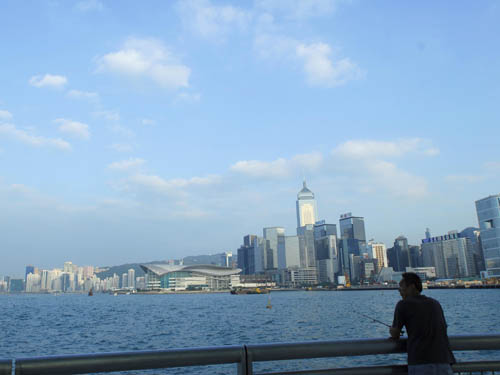 Environment
officials yesterday cast doubt over mainland research on air pollution that
found Hong Kong lagging behind in its efforts to reduce emissions, questioning
the accuracy of some of the data. A senior official admitted that sulfur dioxide
levels in Hong Kong had risen above the levels of the late 1990s, as reported in
a scientific paper, but was sceptical about a reported increase in nitrogen
oxides (NOx) and total suspended particles (TSP). The study, "Evaluation of
ambient air quality in Guangzhou, China", was published in the latest issue of
the Journal of Environmental Sciences on the mainland. The paper was co-written
by Zhou Kai from the South China Botanic Garden in Guangzhou, Ye You-hua and
Peng Shao-lin from Sun Yat-sen University, Liu Qiang from Hainan Normal
University, and Liu Ai-jun from the Climatic and Agrometeorological Centre of
Guangdong Province. The contested statistics were shown in a table comparing the
ambient concentration levels of the three types of pollutants in Guangzhou, Hong
Kong and Shanghai between 1996 and 2005. While it was not the article's
intention to compare the emission reductions of the three cities, the table
illustrated Hong Kong's cleanup efforts were less effective than the other two.
In particular, it said the city's NOx levels had risen 30 per cent while
Guangzhou had slashed its level more than 50 per cent. It also said Hong Kong's
TSP level rose 10 per cent whereas Guangzhou had cut its by a third. But the
Environmental Protection Department yesterday questioned the accuracy of the
figures. It suspects that the nitrogen oxides data from Hong Kong had
incorporated roadside readings, instead of ambient ones as in the cases of
Guangzhou and Shanghai. Roadside readings are normally much higher than ambient
data. The department also questioned whether the authors had interchangeably
used nitrogen oxides and nitrogen dioxide - another form of the NOx compound -
in their data representation for Guangzhou, giving the wrong impression that
pollutant levels had dropped substantially. Environment
officials yesterday cast doubt over mainland research on air pollution that
found Hong Kong lagging behind in its efforts to reduce emissions, questioning
the accuracy of some of the data. A senior official admitted that sulfur dioxide
levels in Hong Kong had risen above the levels of the late 1990s, as reported in
a scientific paper, but was sceptical about a reported increase in nitrogen
oxides (NOx) and total suspended particles (TSP). The study, "Evaluation of
ambient air quality in Guangzhou, China", was published in the latest issue of
the Journal of Environmental Sciences on the mainland. The paper was co-written
by Zhou Kai from the South China Botanic Garden in Guangzhou, Ye You-hua and
Peng Shao-lin from Sun Yat-sen University, Liu Qiang from Hainan Normal
University, and Liu Ai-jun from the Climatic and Agrometeorological Centre of
Guangdong Province. The contested statistics were shown in a table comparing the
ambient concentration levels of the three types of pollutants in Guangzhou, Hong
Kong and Shanghai between 1996 and 2005. While it was not the article's
intention to compare the emission reductions of the three cities, the table
illustrated Hong Kong's cleanup efforts were less effective than the other two.
In particular, it said the city's NOx levels had risen 30 per cent while
Guangzhou had slashed its level more than 50 per cent. It also said Hong Kong's
TSP level rose 10 per cent whereas Guangzhou had cut its by a third. But the
Environmental Protection Department yesterday questioned the accuracy of the
figures. It suspects that the nitrogen oxides data from Hong Kong had
incorporated roadside readings, instead of ambient ones as in the cases of
Guangzhou and Shanghai. Roadside readings are normally much higher than ambient
data. The department also questioned whether the authors had interchangeably
used nitrogen oxides and nitrogen dioxide - another form of the NOx compound -
in their data representation for Guangzhou, giving the wrong impression that
pollutant levels had dropped substantially.
The Hong Kong Observatory said on Monday it was delighted
that the award of the 2007 Nobel Peace Prize jointly shared by the
Intergovernmental Panel on Climate Change (IPCC). A spokesman said this was
because the IPCC – which provides world leaders and decision-makers with
scientific evidence on climate change – had close ties with Hong Kong. “The
director of the Hong Kong Observatory Lam Chiu-ying, was both a contributing
author and an expert reviewer of the IPCC Fourth Assessment Report (AR4)
prepared by Working Group One and released earlier this year,” an observatory
spokesman said. The working group focused on the physical science basis of
climate change. AR4 also made reference to a research paper by Observatory staff
on how land falling tropical cyclones were affected by El Nino Southern
Oscillation. “In May this year, co-chairs of all the three IPCC Working Groups
were in Hong Kong to discuss the latest findings of IPCC in the International
Conference on Climate Change organized by the engineering community,” the
spokesman said. IPCC was established jointly by the World Meteorological
Organization and the United Nations Environmental Program in 1988. It is one of
co-winners of the Nobel Peace Prize 2007; the other was former US vice-president
Al Gore. For years, the Hong Kong Observatory has been contributing to the work
of IPCC, the spokesman said. The observatory also invested effort in promoting
public understanding and awareness of the phenomenon. In the future, the
observatory has a team of professional meteorologists who plan to give a series
of lectures and speeches on climate change in the territory.
The mainland’s
biggest e-commerce firm, Alibaba.com, planned to raise as much as HK$10.3
billion after setting a price range for its Hong Kong initial public offering.
 China:
China's largest oil producer China National Petroleum Corp
(CNPC) will start initial public offering in late October and may return to the
A-share market in November at the earliest.
China:
China's largest oil producer China National Petroleum Corp
(CNPC) will start initial public offering in late October and may return to the
A-share market in November at the earliest.
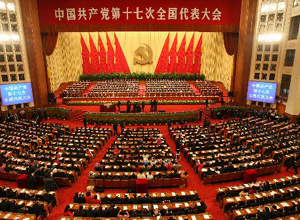 The
17th National Congress of the Communist Party of China (CPC) opened in Beijing
at 9 a.m. on Monday to map out China's all-round development for the coming five
years. Hu Jintao called on all the members of the Communist Party of China (CPC)
and the Chinese people on Monday to hold high the "great banner of socialism
with Chinese Characteristics" in their strive for building "a moderately
prosperous society in all aspects." The
17th National Congress of the Communist Party of China (CPC) opened in Beijing
at 9 a.m. on Monday to map out China's all-round development for the coming five
years. Hu Jintao called on all the members of the Communist Party of China (CPC)
and the Chinese people on Monday to hold high the "great banner of socialism
with Chinese Characteristics" in their strive for building "a moderately
prosperous society in all aspects."
The movie "Still Life" by Chinese director Jia Zhangke won
the top prize at the International Film Festival held in the southern Chilean
city of Valdivia on Wednesday. Jia won the award for the best international
feature film and 4,000 U.S. dollars at the closing ceremony of the film
festival, which opened on Oct. 5 in Valdivia, 600 km south of Santiago. At last
year's Venice Film Festival, Jia was awarded the GoldenLion for best movie with
his documentary-style "Still Life," a story about a man searching for his
ex-wife and a woman looking for her husband in a town about to be submerged by
the rising waters of the Three Gorges Dam. Han Sanming, the main character in
the film, won the best actor award.
 Chinese garments
at a show in Beijing. Exporters from other countries will have an even bigger
presence at the autumn session of the China Import and Export Fair, also known
as the Canton Fair, which begins today. Chinese garments
at a show in Beijing. Exporters from other countries will have an even bigger
presence at the autumn session of the China Import and Export Fair, also known
as the Canton Fair, which begins today.
A weekend move by the People's Bank
of China to raise the reserve requirement ratio by 50 basis points - the eighth
such increase this year - will have little impact on Hong Kong and mainland
stock markets, as investors had factored in additional monetary tightening,
analysts say.
 China National Offshore Oil Corp
(0883) said its Bohai Bay site is set to emerge as the mainland's second biggest
oil field in five years, succeeding the Shengli oil field in Shandong run by
China Petroleum and Chemical Corp, or Sinopec (0386). China National Offshore Oil Corp
(0883) said its Bohai Bay site is set to emerge as the mainland's second biggest
oil field in five years, succeeding the Shengli oil field in Shandong run by
China Petroleum and Chemical Corp, or Sinopec (0386).
October 16, 2007
 Hong Kong:
Tsang sets 'new direction' for HK -
City urged to shrug off self-doubt as chief executive cuts taxes, boosts
spending. The chief executive last week announced tax cuts and a HK$250 billion
infrastructure program in a wide-ranging policy blueprint aimed at setting a new
course for the city. In a 110-minute speech entitled "A new direction for Hong
Kong", Donald Tsang Yam-kuen also called on the people of Hong Kong to adopt a
new mindset to achieve another golden decade by shaking free of the self-doubt
that has permeated the city since the handover. With the government's fiscal
reserves set to reach HK$400 billion, the chief executive said the standard
rates for salaries and profits taxes would come down to 15 per cent and 16.5 per
cent respectively in the next budget. Rate payments for the final quarter of
2007-08 will be waived. An ambitious infrastructure program will see the
government press ahead with 10 major projects to maintain long-term
competitiveness. It will spend HK$14 billion on a raft of other initiatives.
These include introducing 12 years of free education for children, a medical
voucher scheme for the elderly and various programs to clean the air and enhance
heritage protection. The tax and rates concession package will cost the
government HK$7.6 billion in total. More reductions are being considered for the
budget early next year, according to Mr Tsang. Delivering the first policy
address of his five-year term, Mr Tsang stressed the need for Hong Kong people
to adopt a new mindset to achieve another golden decade. "Over the next five
years, we need to cultivate a new spirit for these new times," he said. "We need
to become new Hongkongers, better equipped to sustain development in the new
era." He said people should drop their "small island mentality", seeing
themselves from a national perspective playing a role in developing China. "Only
through leveraging the strengths of our country can we position ourselves
globally to create a better future," he said. In a development-driven economic
strategy, Mr Tsang set out plans for 10 major transport and development projects
that will cost HK$250 billion, the bulk of it from private investment. The
projects, which include the South Island Rail and Kai Tak development, were
estimated to generate 250,000 jobs. "The added value to our economy would be
more than HK$100 billion every year, about 7 per cent of our GDP," Mr Tsang
said. He confessed that infrastructure development had not matched expectations
over the past decade. Public works spending this year had reached only about
HK$20 billion, short of the annual target of HK$29 billion. In moving to honor
his election promise to cut taxes, Mr Tsang said the tax relief package, to be
introduced by the financial secretary in the next budget, would benefit all,
rather than just big corporations and top income earners. "We asked people to
sacrifice and tighten their belts during the Sars outbreak and financial
turmoil. I am indebted to the people. When the economy has revived, it's our
duty to give them back what they deserve," he told a media briefing following
the policy address. With the fiscal reserves set to top HK$400 billion by the
end of this year, Mr Tsang pledged to consider further profits tax relief if the
economy remained strong. But he conceded that the narrow tax base remained a
major concern, saying tax increases would be needed if the economy worsened in
future. Referring to initiatives such as the annual HK$250 health voucher scheme
for people aged 70 and above, the chief executive fended off claims that he had
been generous to the rich but mean to the disadvantaged. "Our measures to help
the elderly are focused. We want to help those in need rather than just make
slogans," he said. With no fewer than seven green initiatives on the drawing
board, Mr Tsang pledged that the environment would continue to top his agenda in
the next five years. "I will account for our achievements or our failure to the
public very clearly." In addition to extending the nine-year free education
system to 12 years from next year, small-class teaching will also be phased in
from 2009-10. Business chambers welcomed the tax reductions. The Hong Kong
General Chamber of Commerce said the blueprint would make Hong Kong a
sustainable world city, but it had hoped Mr Tsang would have taken a more
forceful approach on taxes to restore competitiveness. The Democrats said the
policies would widen the wealth gap. It criticized Mr Tsang for failing to give
an account on universal suffrage. Mr Tsang said he would strive to secure the
central government's trust for its early implementation. But he also warned that
governance must not be compromised by constitutional development. Hong Kong:
Tsang sets 'new direction' for HK -
City urged to shrug off self-doubt as chief executive cuts taxes, boosts
spending. The chief executive last week announced tax cuts and a HK$250 billion
infrastructure program in a wide-ranging policy blueprint aimed at setting a new
course for the city. In a 110-minute speech entitled "A new direction for Hong
Kong", Donald Tsang Yam-kuen also called on the people of Hong Kong to adopt a
new mindset to achieve another golden decade by shaking free of the self-doubt
that has permeated the city since the handover. With the government's fiscal
reserves set to reach HK$400 billion, the chief executive said the standard
rates for salaries and profits taxes would come down to 15 per cent and 16.5 per
cent respectively in the next budget. Rate payments for the final quarter of
2007-08 will be waived. An ambitious infrastructure program will see the
government press ahead with 10 major projects to maintain long-term
competitiveness. It will spend HK$14 billion on a raft of other initiatives.
These include introducing 12 years of free education for children, a medical
voucher scheme for the elderly and various programs to clean the air and enhance
heritage protection. The tax and rates concession package will cost the
government HK$7.6 billion in total. More reductions are being considered for the
budget early next year, according to Mr Tsang. Delivering the first policy
address of his five-year term, Mr Tsang stressed the need for Hong Kong people
to adopt a new mindset to achieve another golden decade. "Over the next five
years, we need to cultivate a new spirit for these new times," he said. "We need
to become new Hongkongers, better equipped to sustain development in the new
era." He said people should drop their "small island mentality", seeing
themselves from a national perspective playing a role in developing China. "Only
through leveraging the strengths of our country can we position ourselves
globally to create a better future," he said. In a development-driven economic
strategy, Mr Tsang set out plans for 10 major transport and development projects
that will cost HK$250 billion, the bulk of it from private investment. The
projects, which include the South Island Rail and Kai Tak development, were
estimated to generate 250,000 jobs. "The added value to our economy would be
more than HK$100 billion every year, about 7 per cent of our GDP," Mr Tsang
said. He confessed that infrastructure development had not matched expectations
over the past decade. Public works spending this year had reached only about
HK$20 billion, short of the annual target of HK$29 billion. In moving to honor
his election promise to cut taxes, Mr Tsang said the tax relief package, to be
introduced by the financial secretary in the next budget, would benefit all,
rather than just big corporations and top income earners. "We asked people to
sacrifice and tighten their belts during the Sars outbreak and financial
turmoil. I am indebted to the people. When the economy has revived, it's our
duty to give them back what they deserve," he told a media briefing following
the policy address. With the fiscal reserves set to top HK$400 billion by the
end of this year, Mr Tsang pledged to consider further profits tax relief if the
economy remained strong. But he conceded that the narrow tax base remained a
major concern, saying tax increases would be needed if the economy worsened in
future. Referring to initiatives such as the annual HK$250 health voucher scheme
for people aged 70 and above, the chief executive fended off claims that he had
been generous to the rich but mean to the disadvantaged. "Our measures to help
the elderly are focused. We want to help those in need rather than just make
slogans," he said. With no fewer than seven green initiatives on the drawing
board, Mr Tsang pledged that the environment would continue to top his agenda in
the next five years. "I will account for our achievements or our failure to the
public very clearly." In addition to extending the nine-year free education
system to 12 years from next year, small-class teaching will also be phased in
from 2009-10. Business chambers welcomed the tax reductions. The Hong Kong
General Chamber of Commerce said the blueprint would make Hong Kong a
sustainable world city, but it had hoped Mr Tsang would have taken a more
forceful approach on taxes to restore competitiveness. The Democrats said the
policies would widen the wealth gap. It criticized Mr Tsang for failing to give
an account on universal suffrage. Mr Tsang said he would strive to secure the
central government's trust for its early implementation. But he also warned that
governance must not be compromised by constitutional development.
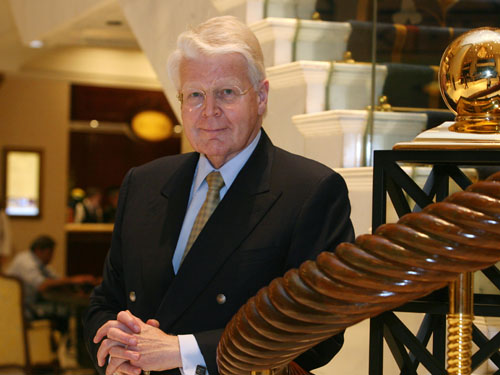 Iceland's biggest bank is to begin
operations in Hong Kong next month as the city extends its financial bridge
between the mainland and the outside world, the nation's president, Olafur
Grimsson, said on a state visit last week. Mr Grimsson said his visit to Hong
Kong - after a whirlwind mission across the mainland, which included talks with
President Hu Jintao - was to signal Iceland's respect for the city's market
status. Iceland has been hoping to develop closer links with the city's
financial institutions, which Mr Grimsson said was a crucial pillar to rapidly
expanding ties with the mainland. Mr Grimsson held talks with Chief Executive
Donald Tsang Yam-kuen and Hong Kong stock exchange officials. Iceland's biggest bank is to begin
operations in Hong Kong next month as the city extends its financial bridge
between the mainland and the outside world, the nation's president, Olafur
Grimsson, said on a state visit last week. Mr Grimsson said his visit to Hong
Kong - after a whirlwind mission across the mainland, which included talks with
President Hu Jintao - was to signal Iceland's respect for the city's market
status. Iceland has been hoping to develop closer links with the city's
financial institutions, which Mr Grimsson said was a crucial pillar to rapidly
expanding ties with the mainland. Mr Grimsson held talks with Chief Executive
Donald Tsang Yam-kuen and Hong Kong stock exchange officials.
For the first time since March,
tycoon Lee Shau-kee seems to sense some risk riding the bull market.
 Liberal Party chairman James Tien Pei-
chun on Friday withdrew his remarks and apologized to Mass Transit Railway
Corporation chief executive Chow Chung-kwong - who he described as a best friend
- for saying he would have to "shoulder all the political consequences" for
nominating a Civic Party candidate for the district council election. Liberal Party chairman James Tien Pei-
chun on Friday withdrew his remarks and apologized to Mass Transit Railway
Corporation chief executive Chow Chung-kwong - who he described as a best friend
- for saying he would have to "shoulder all the political consequences" for
nominating a Civic Party candidate for the district council election.
Shares of local fixed-line operator
City Telecom (1137) surged 59.6 percent - the most in more than eight years - on
market rumors that it bid jointly with China Unicom (0762) for a
third-generation mobile license in Hong Kong.
 Fei Fei tucks into noodles after scare -
Actress Lydia Shum Din-ha can sit up in bed and feed herself, 24 hours after
being admitted to an intensive care ward, her doctor and daughter said on
Friday. Fei Fei tucks into noodles after scare -
Actress Lydia Shum Din-ha can sit up in bed and feed herself, 24 hours after
being admitted to an intensive care ward, her doctor and daughter said on
Friday.
In the latest round of reshuffles,
the government has appointed Permanent Secretary for Security Stanley Ying
Yiu-hong to the post of permanent secretary for financial services and the
treasury from November 5.
 Showtime in Macau won't hurt HK's appeal, say promoters -
Now that Macau is drawing more and more visitors because of its casinos, it is
turning to building up its live entertainment. Some of the world's biggest acts
are being flown in as the Venetian Macao starts to deliver on its promise to
attract Las Vegas-style entertainment to the city. But Hong Kong promoters said
the rise of big shows in Macau would have little impact on the city's live event
market, at least in the short term. Singer and actress Beyonce Knowles will
perform at the Venetian on November 3 as part of her upcoming Asian tour. Before
that, the pop group Black Eyed Peas will take to the stage on October 27 at the
same resort.
Showtime in Macau won't hurt HK's appeal, say promoters -
Now that Macau is drawing more and more visitors because of its casinos, it is
turning to building up its live entertainment. Some of the world's biggest acts
are being flown in as the Venetian Macao starts to deliver on its promise to
attract Las Vegas-style entertainment to the city. But Hong Kong promoters said
the rise of big shows in Macau would have little impact on the city's live event
market, at least in the short term. Singer and actress Beyonce Knowles will
perform at the Venetian on November 3 as part of her upcoming Asian tour. Before
that, the pop group Black Eyed Peas will take to the stage on October 27 at the
same resort.
 China:
China's foreign exchange reserve had reached 1.43 trillion U.S. dollars by the
end of September, up 45.1 percent year-on-year, the People's Bank of China
announced on Friday. A total of 367.3 billion U.S. dollars were added to the
country's foreign exchange reserve in the first nine months of 2007, said the
central bank. In September alone, the forex reserve rose by 25 billion dollars.
China's soaring trade surplus is still the major contributing factor to the
forex reserve boom. Data newly released by the General Administration of Customs
shows that China's trade surplus for the first nine months of the year has
reached 185.7 billion dollars, exceeding the total trade surplus of 177.47
billion dollars for 2006.
China:
China's foreign exchange reserve had reached 1.43 trillion U.S. dollars by the
end of September, up 45.1 percent year-on-year, the People's Bank of China
announced on Friday. A total of 367.3 billion U.S. dollars were added to the
country's foreign exchange reserve in the first nine months of 2007, said the
central bank. In September alone, the forex reserve rose by 25 billion dollars.
China's soaring trade surplus is still the major contributing factor to the
forex reserve boom. Data newly released by the General Administration of Customs
shows that China's trade surplus for the first nine months of the year has
reached 185.7 billion dollars, exceeding the total trade surplus of 177.47
billion dollars for 2006.
China will raise the reserve
requirement ratio by half a percentage point to 13 percent for commercial banks
from Oct. 25, the People's Bank of China (PBOC) announced on Saturday in
Beijing.
 The new official licensed product of the commemorative
insignia of the Beijing 2008 Olympic Games emblem "Chinese Seal, Dancing
Beijing" is seen in this photo issued by the Beijing Organizing Committee for
the Games of the XXIX Olympiad (BOCOG), October 12, 2007. In celebration of the
300-day countdown to the Beijing Olympic Games, BOCOG issued 11 kinds of limited
edition products in three categories, namely, insignias, badges and gold-made or
silver-made souvenirs.
The new official licensed product of the commemorative
insignia of the Beijing 2008 Olympic Games emblem "Chinese Seal, Dancing
Beijing" is seen in this photo issued by the Beijing Organizing Committee for
the Games of the XXIX Olympiad (BOCOG), October 12, 2007. In celebration of the
300-day countdown to the Beijing Olympic Games, BOCOG issued 11 kinds of limited
edition products in three categories, namely, insignias, badges and gold-made or
silver-made souvenirs.
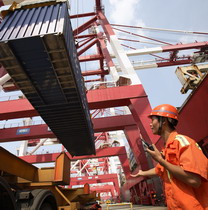 A dock
worker directs a container onto a truck at the Qingdao Port in Shangdong
Province. China's trade surplus dropped in September from the previous month to
US$23.9 million. A dock
worker directs a container onto a truck at the Qingdao Port in Shangdong
Province. China's trade surplus dropped in September from the previous month to
US$23.9 million.
 Autumn is the best
season to eat crab. Fresh and abundant in protein, crab is an deal seafood for
diners to savor . The following is a listing of some restaurants in Beijing and
Shanghai for you to get a taste of this succulent seafood. Some of them are
time-honored brands offering an array of crab dishes to satisfy people's craving
for crab at reasonable prices. Autumn is the best
season to eat crab. Fresh and abundant in protein, crab is an deal seafood for
diners to savor . The following is a listing of some restaurants in Beijing and
Shanghai for you to get a taste of this succulent seafood. Some of them are
time-honored brands offering an array of crab dishes to satisfy people's craving
for crab at reasonable prices.
Scientists have worked out the
first complete map of the Chinese genome and are now turning their attention to
a national treasure - the giant panda.
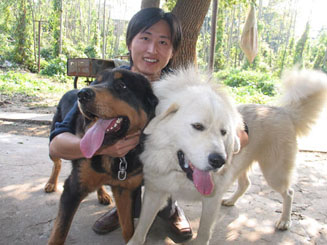 Dog lover breeds a
successful business - Shanghai entrepreneur Jiang Wei owns a breeding kennel in
Jiangsu where he has raised more than a dozen Tibetan mastiffs. Dog lover breeds a
successful business - Shanghai entrepreneur Jiang Wei owns a breeding kennel in
Jiangsu where he has raised more than a dozen Tibetan mastiffs.
October 12 - 15, 2007
 Hong Kong:
Capital rushing to HK stock exchange
- As much as US$200 billion will go to the Hong Kong stock market within a year
under a new investment plan from the mainland, according to a research report
released Tuesday from BOC International. The State Administration of Foreign
Exchange's plan, known as the "through-train to Hong Kong stocks," allows
mainland individuals to invest stocks listed in the Hong Kong stock exchange
directly, considering certain requirements. The program, announced in August,
still awaits the government nod. The report, composed by Luo Zhiheng, chief of
the research department of BOC International, also expects that along with the
"through-train" scheme, the Hong Kong stock market will also welcome US$50
billion from qualified domestic institutional investors (QDII) funds. Money
outflow from the above sources, together with the returns on red chip stocks,
will result in a substantial amount of money contracted away from the domestic
A-share market. The report forecasts the bullish trend to wane in the fourth
quarter. On the other hand, the report noted valuation of H-shares will benefit
from the huge capital inflow from the mainland. Investment opportunities are
sure to follow. Hong Kong:
Capital rushing to HK stock exchange
- As much as US$200 billion will go to the Hong Kong stock market within a year
under a new investment plan from the mainland, according to a research report
released Tuesday from BOC International. The State Administration of Foreign
Exchange's plan, known as the "through-train to Hong Kong stocks," allows
mainland individuals to invest stocks listed in the Hong Kong stock exchange
directly, considering certain requirements. The program, announced in August,
still awaits the government nod. The report, composed by Luo Zhiheng, chief of
the research department of BOC International, also expects that along with the
"through-train" scheme, the Hong Kong stock market will also welcome US$50
billion from qualified domestic institutional investors (QDII) funds. Money
outflow from the above sources, together with the returns on red chip stocks,
will result in a substantial amount of money contracted away from the domestic
A-share market. The report forecasts the bullish trend to wane in the fourth
quarter. On the other hand, the report noted valuation of H-shares will benefit
from the huge capital inflow from the mainland. Investment opportunities are
sure to follow.
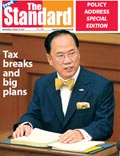 Ten mega
infrastructure developments will form the backbone of the city's development
long past the 2012 expiry of Chief Executive Donald Tsang Yam- kuen's term in
office. The projects will create 250,000 jobs and cost in the region of HK$250
billion, much of which will come from the private sector, and which will add
HK$100 billion annually to the economy. Ten mega
infrastructure developments will form the backbone of the city's development
long past the 2012 expiry of Chief Executive Donald Tsang Yam- kuen's term in
office. The projects will create 250,000 jobs and cost in the region of HK$250
billion, much of which will come from the private sector, and which will add
HK$100 billion annually to the economy.
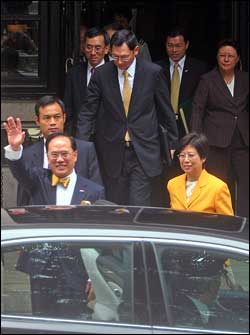 "Empty slogans
and empty talk" are no use if society is not pragmatic and proactive enough,
Donald Tsang, sporting a yellow bow tie to match the yellow cover of his Policy
Address official document, said yesterday. True to his "I'll get the job done"
slogan Tsang, who celebrated his 63rd birthday last Sunday, declared public
swimming pools will be free of charge to promote Olympic Spirit and national
pride. In his A New Direction for Hong Kong address, he commended Hong Kongers'
dedication and contributions to the post World War II success of Hong Kong.
"Working hard to earn a living, Hong Kong people together have created a miracle
without realizing it," Tsang said. He said Hong Kong transformed itself from a
trading port into a world factory "with no catchy slogan or grand vision of
development." Tsang emphasized Hong Kong's need for economic and environmental
integration with mainland cities, particularly Shenzhen, to create a world-
class metropolis. "The people of Hong Kong and the Pearl River Delta region
breathe the same air under the same sky," said Tsang. Hong Kong, he said, should
not fear marginalization or replacement by mainland cities. The government will
enhance the appeal of Hong Kong as an international convention and exhibition
and tourism capital, he said. But burgeoning Macau, Hong Kong's long-time
neighbor, was not mentioned explicitly except in the context of the Hong Kong-Zhuhai-
Macau Bridge. Apart from allowing free admission to public swimming pools, water
sports centers, tennis courts, squash courts and holiday camps next summer to
promote national pride, Tsang will encourage more schools to form flag guard
teams and to stage more national flag-raising. "Ours is a Chinese city as well
as a global city," he said. Tsang told citizens to become new Hong Kongers to
prepare for sustainable developments in the new era. He was asked in the
post-address press conference if he considered himself a new Hong Konger. "I
don't need to tell you how old I am. At the age of 63, it's very difficult to
look different, but I'll try to update my thoughts," said Tsang. He was also
asked if he was returning favors to big corporations and well-paid "kings of
employees" through tax reductions. He replied that the policy was to benefit all
citizens. Tsang said there was "too much controversy and too little consensus"
in Hong Kong in the past decade. He is convinced that as long as both the
executive authority and the Legislative Council take into account public
opinion, they will establish a harmonious and constructive relationship.
Following years of tradition, legislative councillor "Long Hair" Leung Kwok-hung
protested inside the Legco conference room before the chief executive began his
address. "Empty slogans
and empty talk" are no use if society is not pragmatic and proactive enough,
Donald Tsang, sporting a yellow bow tie to match the yellow cover of his Policy
Address official document, said yesterday. True to his "I'll get the job done"
slogan Tsang, who celebrated his 63rd birthday last Sunday, declared public
swimming pools will be free of charge to promote Olympic Spirit and national
pride. In his A New Direction for Hong Kong address, he commended Hong Kongers'
dedication and contributions to the post World War II success of Hong Kong.
"Working hard to earn a living, Hong Kong people together have created a miracle
without realizing it," Tsang said. He said Hong Kong transformed itself from a
trading port into a world factory "with no catchy slogan or grand vision of
development." Tsang emphasized Hong Kong's need for economic and environmental
integration with mainland cities, particularly Shenzhen, to create a world-
class metropolis. "The people of Hong Kong and the Pearl River Delta region
breathe the same air under the same sky," said Tsang. Hong Kong, he said, should
not fear marginalization or replacement by mainland cities. The government will
enhance the appeal of Hong Kong as an international convention and exhibition
and tourism capital, he said. But burgeoning Macau, Hong Kong's long-time
neighbor, was not mentioned explicitly except in the context of the Hong Kong-Zhuhai-
Macau Bridge. Apart from allowing free admission to public swimming pools, water
sports centers, tennis courts, squash courts and holiday camps next summer to
promote national pride, Tsang will encourage more schools to form flag guard
teams and to stage more national flag-raising. "Ours is a Chinese city as well
as a global city," he said. Tsang told citizens to become new Hong Kongers to
prepare for sustainable developments in the new era. He was asked in the
post-address press conference if he considered himself a new Hong Konger. "I
don't need to tell you how old I am. At the age of 63, it's very difficult to
look different, but I'll try to update my thoughts," said Tsang. He was also
asked if he was returning favors to big corporations and well-paid "kings of
employees" through tax reductions. He replied that the policy was to benefit all
citizens. Tsang said there was "too much controversy and too little consensus"
in Hong Kong in the past decade. He is convinced that as long as both the
executive authority and the Legislative Council take into account public
opinion, they will establish a harmonious and constructive relationship.
Following years of tradition, legislative councillor "Long Hair" Leung Kwok-hung
protested inside the Legco conference room before the chief executive began his
address.
NWS Holdings (0659), the services
and infrastructure unit of conglomerate New World Development (0017), said
yesterday it aims to invest up to HK$9 billion in utilities and transport
projects over the next three years.
 China:
The Beijing-Shanghai high-speed railway has got the green light from the central
government and construction is expected to start soon.
China:
The Beijing-Shanghai high-speed railway has got the green light from the central
government and construction is expected to start soon.
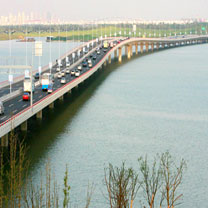 Vehicles drive along a 7.37
km-long tunnel-bridge in Suzhou, East China's Zhejiang Province October 10,
2007, the day when the tunnel was put into operation after more than one year of
construction. Vehicles drive along a 7.37
km-long tunnel-bridge in Suzhou, East China's Zhejiang Province October 10,
2007, the day when the tunnel was put into operation after more than one year of
construction.
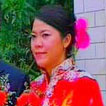 Forbes:
Woman, 26, mainland's China richest - A 26-year-old woman worth $16.2 billion is
the Chinese mainland's richest person, topping a list of tycoons whose wealth
has soared amid a boom in stock and property prices, the business magazine
Forbes said Monday. The fortune of Yang Huiyan - also Asia's richest woman - is
based on shares in Country Garden Holdings Ltd, a real estate developer founded
by her father, Forbes said. It said the company's Hong Kong stock market debut
this year made billionaires of Yang and four other people. Forbes:
Woman, 26, mainland's China richest - A 26-year-old woman worth $16.2 billion is
the Chinese mainland's richest person, topping a list of tycoons whose wealth
has soared amid a boom in stock and property prices, the business magazine
Forbes said Monday. The fortune of Yang Huiyan - also Asia's richest woman - is
based on shares in Country Garden Holdings Ltd, a real estate developer founded
by her father, Forbes said. It said the company's Hong Kong stock market debut
this year made billionaires of Yang and four other people.
The European Union has agreed with China to end quota
restrictions on Chinese textile imports with a joint surveillance system to
monitor the trade flow in 2008.
Chinese fund management joint ventures of Credit Suisse
and DBS said on Wednesday that they have obtained approval to invest clients'
money overseas.
 Located in the
center of Haidian District, Wudaokou is nicknamed 5DK among its fans. Two of
China's best universities, Beijing University and Tsinghua University, are
locate in the west and north. In the east, they connect to Xueyuan Lu, or Campus
Road, where more than ten of the top campuses are situated. That's one of the
reasons why Wudaokou will keep you forever young. Located in the
center of Haidian District, Wudaokou is nicknamed 5DK among its fans. Two of
China's best universities, Beijing University and Tsinghua University, are
locate in the west and north. In the east, they connect to Xueyuan Lu, or Campus
Road, where more than ten of the top campuses are situated. That's one of the
reasons why Wudaokou will keep you forever young.
Beijing's first case concerning China's landmark Property
Law was put before the courts on Monday, a week after the law came into effect.
A 60-year-old man surnamed Shen filed a lawsuit to the Beijing Changping
Intermediate People's Court against the Zhongjiaxin auction company for
auctioning off this September six apartments he bought for 1.2 million yuan in
1998 from a Mr. Yan. Yan was convicted of taking bribes in 2002 and had his
property confiscated. The Intermediate People's Court of Shijiazhuang in Hebei
ruled that the houses were owned by Yan and entrusted the Zhongjiaxin auction
company to conduct the sale. Shen said that if he failed to retrieve his houses,
he would sue the Intermediate People's Court of Shijiazhuang and ask for
compensation from the government. However the court hearing was deferred because
the auction company "didn't receive the subpoena", according to Li Bing, from
the auction house. "Shen's appeal was in accordance with the fourth and 64th
articles of the Property Law, which ensures an individual's lawful possession of
property and the inviolability," said Wang Liming, head of the Law School of the
Renmin University of China and also one of the drafters of the law. The law,
approved by the national legislature in March after repeated revisions and an
unprecedented eight readings, is aimed to provide equal protection to both state
and private properties. The 247-article law stipulates that no units or
individuals may infringe upon the property of the state, the collective and the
individual. The concept of improving the protection of private property was
first brought up at the 16th National Congress of the Communist Party of China
held in November 2002. In March 2004, the NPC adopted a major amendment to the
Constitution, stating that people's lawful private property is inviolable.
October 8 - 11, 2007
 Hong Kong:
Hong Kong and Ireland signed a
bilateral agreement Friday on the surrender of fugitive offenders, the 17th of
its kind the Chinese special administrative region has signed with other regions
or countries. The bilateral pact could help "strengthen Hong Kong's capacity to
deny safe haven to criminals", the Hong Kong SAR government said in a press
release. The agreement sets out the conditions for the surrender of fugitive
offenders between the two and contains the usual safeguards of similar
international agreements, which cover critical issues such as double
criminality, death penalty, political offenses, prima facie as well as the
specialty rule. It also provides for protection against re-surrender of an
offender to a third jurisdiction. The agreement was signed Friday by Hong Kong's
Secretary for Justice Wong Yan Lung and Irish Minister for Justice, Equality and
Law Reform Brian Lenihan. It will come into force 30 days after both parties
have notified each other that their respective requirements for effecting the
agreement have been complied with. Hong Kong:
Hong Kong and Ireland signed a
bilateral agreement Friday on the surrender of fugitive offenders, the 17th of
its kind the Chinese special administrative region has signed with other regions
or countries. The bilateral pact could help "strengthen Hong Kong's capacity to
deny safe haven to criminals", the Hong Kong SAR government said in a press
release. The agreement sets out the conditions for the surrender of fugitive
offenders between the two and contains the usual safeguards of similar
international agreements, which cover critical issues such as double
criminality, death penalty, political offenses, prima facie as well as the
specialty rule. It also provides for protection against re-surrender of an
offender to a third jurisdiction. The agreement was signed Friday by Hong Kong's
Secretary for Justice Wong Yan Lung and Irish Minister for Justice, Equality and
Law Reform Brian Lenihan. It will come into force 30 days after both parties
have notified each other that their respective requirements for effecting the
agreement have been complied with.
The Republic of Korea (ROK) and Hong
Kong have become important economic partners, with bilateral trade reaching 21.1
billion U.S. dollars in 2006, the top ROK diplomat in Hong Kong said here
Wednesday. "Two-way investment also grew steadily with accumulated investment
reaching 7.2 billion U.S. dollars," said Seok Tong-youn, consul-general of the
ROK in Hong Kong, at a reception celebrating ROK's National Day. In 2006, South
Korea invested a total of 1.1 billion U.S. dollars in Hong Kong, surging 230
percent over the previous year, he said. Up to date, 650 South Korean businesses
have been set up in Hong Kong, and the number of long-term ROK residents in Hong
Kong surpassed 11,000. Human and cultural exchanges between ROK and Hong Kong
continue to expand. In 2006, a total of 720,000 South Koreans visited Hong Kong
while 130,000 Hong Kong people traveled to South Korea. Hong Kong's status as an
international hub for finance and logistics has been reinforced, said the
consul-general, citing reasons ranging from transparent economy, clean and
efficient government, rule of law, free flow of information and highly educated
workforce and pool of talented professionals. "Contrary to certain
apprehensions, the 'One country, Two systems' is well in place, and rapid
economic integration between Hong Kong and the Chinese mainland has added
momentum to Hong Kong 's economic growth," he said.
 Director of
the movie Ang Lee (C) poses with cast members Tang Wei (L) and Wang Leehom at
the premiere of "Lust, Caution" at the Academy of Motion Picture Arts and
Sciences in Beverly Hills, California October 3, 2007. The movie opens in Los
Angeles on October 5. Director of
the movie Ang Lee (C) poses with cast members Tang Wei (L) and Wang Leehom at
the premiere of "Lust, Caution" at the Academy of Motion Picture Arts and
Sciences in Beverly Hills, California October 3, 2007. The movie opens in Los
Angeles on October 5.
 An independent investment advisory firm has published a report urging minority
shareholders of MTR Corp (0066) - including many fund houses - to reject the
company's proposed merger with the Kowloon-Canton Railway Corp, largely on the
grounds that MTRC will lose fare autonomy under the deal.
An independent investment advisory firm has published a report urging minority
shareholders of MTR Corp (0066) - including many fund houses - to reject the
company's proposed merger with the Kowloon-Canton Railway Corp, largely on the
grounds that MTRC will lose fare autonomy under the deal.
 Toys 'R' Us Asia, a unit of Hong Kong-
based Li & Fung Group, has voluntarily recalled from its Hong Kong and other
Asian stores a type of Chinese-made toy because of excessive lead paint. Toys 'R' Us Asia, a unit of Hong Kong-
based Li & Fung Group, has voluntarily recalled from its Hong Kong and other
Asian stores a type of Chinese-made toy because of excessive lead paint.
Two investment banks raised their
target prices for market operator Hong Kong Exchanges and Clearing (0388),
indicating up to 36 percent more upside on a stock that has almost tripled this
year, on expectations of an inflow of mainland funds.
 The war of words has started, with
former top civil servant and political hopeful Anson Chan Fang On-sang yesterday
challenging rival Regina Ip Lau Suk-yee to be honest and come clean on why she
really decided to contest the Legco by-election. The war of words has started, with
former top civil servant and political hopeful Anson Chan Fang On-sang yesterday
challenging rival Regina Ip Lau Suk-yee to be honest and come clean on why she
really decided to contest the Legco by-election.
 Donald's has cut its free staff meals from
two to one, and KFC's HK$16.18 average hourly wage is the lowest among seven
fast food chains in Hong Kong, according to a Catering and Hotels Industries
Employees General Union study. Donald's has cut its free staff meals from
two to one, and KFC's HK$16.18 average hourly wage is the lowest among seven
fast food chains in Hong Kong, according to a Catering and Hotels Industries
Employees General Union study.
 China:
China's National Bureau of Statistics (NBS) said that over the past five years
China's industrial economy has been developing in a healthy, fast and steady way
amid structural adjustment, and the country is in the midway of
industrialization. In its latest report, the NBS said that since the 16th
National Congress of the Communist Party of China in 2002, China's industrial
economy has reinforced its leading position in national economy. In 2006, the
industrial added value hit 9.04 trillion yuan (about 1.2 trillion U.S. dollars),
up 57.9 percent from 2002 in constant terms. etween 2003-2006, the increase of
China's industrial production fluctuated between 11.5 percent and 12.8 percent,
featuring rapidly expanding scale, output and export. China tops the world in
the output of steel, coal, cement, TV sets and cotton fabric, and ranks second
in power generation, third in sugar output and fifth in crude oil output. In
2006, the added value of industrial economy accounted for 43.1 percent of
national economy, further consolidating its leading position in the economy.
Industrial economy will continue to play an important role in the economy
considering that there is still a long way to go to accomplish the
industrialization process, the report said. The internal structure of the
industrial economy has had clear improvements, the report said. The great
progress of energy and raw materials industries provides strong support to
national economy; non-ferrous and non-metal mining products, chemicals and
machinery industries have also experienced fast development; and the washing out
of obsolete production facilities has helped improve product structure. It
should be noted that different regions of the country have all enjoyed rapid
development of industrial economy over the past few years, with the east coastal
areas, central China and western China all increasing about 1.9 times, and
northeast China up about 1.6 times.
China:
China's National Bureau of Statistics (NBS) said that over the past five years
China's industrial economy has been developing in a healthy, fast and steady way
amid structural adjustment, and the country is in the midway of
industrialization. In its latest report, the NBS said that since the 16th
National Congress of the Communist Party of China in 2002, China's industrial
economy has reinforced its leading position in national economy. In 2006, the
industrial added value hit 9.04 trillion yuan (about 1.2 trillion U.S. dollars),
up 57.9 percent from 2002 in constant terms. etween 2003-2006, the increase of
China's industrial production fluctuated between 11.5 percent and 12.8 percent,
featuring rapidly expanding scale, output and export. China tops the world in
the output of steel, coal, cement, TV sets and cotton fabric, and ranks second
in power generation, third in sugar output and fifth in crude oil output. In
2006, the added value of industrial economy accounted for 43.1 percent of
national economy, further consolidating its leading position in the economy.
Industrial economy will continue to play an important role in the economy
considering that there is still a long way to go to accomplish the
industrialization process, the report said. The internal structure of the
industrial economy has had clear improvements, the report said. The great
progress of energy and raw materials industries provides strong support to
national economy; non-ferrous and non-metal mining products, chemicals and
machinery industries have also experienced fast development; and the washing out
of obsolete production facilities has helped improve product structure. It
should be noted that different regions of the country have all enjoyed rapid
development of industrial economy over the past few years, with the east coastal
areas, central China and western China all increasing about 1.9 times, and
northeast China up about 1.6 times.
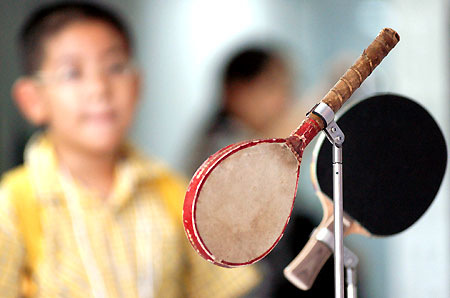 A teenager watches two table tennis
rackets, one in its old-fashioned form (L) and the other in its modern looks, in
Nanjing, October 4, 2007. The Olympic Museum Pieces China Tour Exhibition
(Nanjing Leg) is held in the East China city during the weeklong National Day
holiday beginning on October 1. A teenager watches two table tennis
rackets, one in its old-fashioned form (L) and the other in its modern looks, in
Nanjing, October 4, 2007. The Olympic Museum Pieces China Tour Exhibition
(Nanjing Leg) is held in the East China city during the weeklong National Day
holiday beginning on October 1.
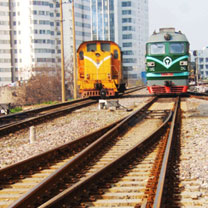 A train
enters the station of Yichang in Central China's Hubei Province. China's railway
passenger transport volume reached 1.03 billion person-times in the first nine
months of this year. A train
enters the station of Yichang in Central China's Hubei Province. China's railway
passenger transport volume reached 1.03 billion person-times in the first nine
months of this year.
Mainland commercial property
developer SOHO China's shares rose 26.3 percent in the gray market on Friday
after an over subscription of 169 times in its retail order book.
October 5 - 7, 2007
 Hong Kong:
HK Film Development Council reveals
funding terms - Hong Kong put a surprising emphasis on experience over youth
Tuesday when the newly established Film Development Council unveiled details of
its plans to dish out first government cash to the movie industry. At a press
conference Tuesday, FDC said that main purpose of the HK$300 million ($38.5
million) on offer is to encourage production, especially of movies with
commercial appeal. Gov't approved establishment of the fund in April this year
(Variety, April 16, 2007.) "It is most important to resuscitate the Hong Kong
film industry, therefore priority has to be given to more experienced
filmmakers," FDC chairman Jack So said. "We can't risk too much
experimentation." Other committee members said that young talent could still
access the fund by teaming with an experienced producer." To qualify, applicant
must be a Hong Kong registered company, helmer or producer that has produced and
released at least two films in the last ten years. Movies supported need to have
budgets less than $1.55 million and can receive a maximum of 30% of their
production budget from the fund. Additionally, three of the five key creative
elements (director, producer, scripter, male lead, female lead) must be
permanent Hong Kong residents. Applications can only be made by projects with a
completed screenplay and other elements in place, such as post production
contracts or 50% of budget sourced from private sector. While FDC members made
it clear that funding is to be considered an equity investment, they were
notably vague about terms of investment, profit participations and whether
proceeds would be repaid back into the common funding pool. FDC said that
secondary purpose of the fund will be more general measures to support the Hong
Kong industry. These include "efforts to promote HK films on the Mainland and
overseas, initiatives to train talent in the various aspects of the film
production and distribution; and measures to enhance the interest and
appreciation of the HK films by the local audience.” In addition to the main
fund vetting committee, FDC said it has established a 'support services
committee' and a 'mainland market committee.' Mainland efforts will
especially promote distribution of the Hong Kong's small and medium-budget
movies beyond the neighboring Cantonese-speaking Guangdong province. Coming two
days after the closure of the historic Queen's Cinema in Central District, FDC
said that it will even encourage private sector and real estate developers to
preserve old cinemas. Hong Kong:
HK Film Development Council reveals
funding terms - Hong Kong put a surprising emphasis on experience over youth
Tuesday when the newly established Film Development Council unveiled details of
its plans to dish out first government cash to the movie industry. At a press
conference Tuesday, FDC said that main purpose of the HK$300 million ($38.5
million) on offer is to encourage production, especially of movies with
commercial appeal. Gov't approved establishment of the fund in April this year
(Variety, April 16, 2007.) "It is most important to resuscitate the Hong Kong
film industry, therefore priority has to be given to more experienced
filmmakers," FDC chairman Jack So said. "We can't risk too much
experimentation." Other committee members said that young talent could still
access the fund by teaming with an experienced producer." To qualify, applicant
must be a Hong Kong registered company, helmer or producer that has produced and
released at least two films in the last ten years. Movies supported need to have
budgets less than $1.55 million and can receive a maximum of 30% of their
production budget from the fund. Additionally, three of the five key creative
elements (director, producer, scripter, male lead, female lead) must be
permanent Hong Kong residents. Applications can only be made by projects with a
completed screenplay and other elements in place, such as post production
contracts or 50% of budget sourced from private sector. While FDC members made
it clear that funding is to be considered an equity investment, they were
notably vague about terms of investment, profit participations and whether
proceeds would be repaid back into the common funding pool. FDC said that
secondary purpose of the fund will be more general measures to support the Hong
Kong industry. These include "efforts to promote HK films on the Mainland and
overseas, initiatives to train talent in the various aspects of the film
production and distribution; and measures to enhance the interest and
appreciation of the HK films by the local audience.” In addition to the main
fund vetting committee, FDC said it has established a 'support services
committee' and a 'mainland market committee.' Mainland efforts will
especially promote distribution of the Hong Kong's small and medium-budget
movies beyond the neighboring Cantonese-speaking Guangdong province. Coming two
days after the closure of the historic Queen's Cinema in Central District, FDC
said that it will even encourage private sector and real estate developers to
preserve old cinemas.
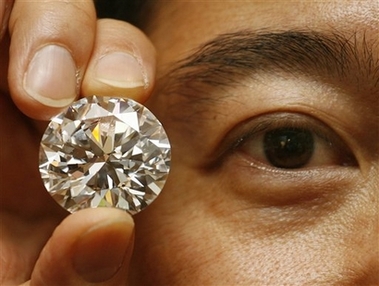 An 84.37 carats, brilliant-cut
diamond of D-Color and flawless clarify diamond is displayed during a Sotheby's
auction preview in Hong Kong Wednesday, Oct. 3, 2007. The diamond is estimated
at US$ 28-35 million and will be sold at an upcoming 'Magnificent Jewels Sale'
in Geneva. An 84.37 carats, brilliant-cut
diamond of D-Color and flawless clarify diamond is displayed during a Sotheby's
auction preview in Hong Kong Wednesday, Oct. 3, 2007. The diamond is estimated
at US$ 28-35 million and will be sold at an upcoming 'Magnificent Jewels Sale'
in Geneva.
Macao threatens Hong Kong for
popularity - Macao is expected to catch up with Hong Kong in the near future in
terms of mainland tourist traffic, an expert said. The estimation is based on
the increasing trend of Macao's growing shares in the mainland tourist market
and Macao's enriching tourism facilities. The number of mainland tourists bound
for Macao has been rising since 1999, causing annual growth of over 30 percent
between 1999 and 2004, said Dai Bin, a professor at Beijing International
Studies University, in a recent interview. Although the growth rate has slowed a
little in the past two years, it still beat the comparative rate for Hong Kong
last year, when Macao registered 14.6 percent growth compared to Hong Kong's 8.4
percent. Dai described the current gap as "narrow." Last year, 11.99 million
mainland tourists visited Macao while 13.50 million visited its larger rival. In
the past there was even less parity. Only a decade ago, 530,000 mainlanders
visited Macao compared to four times as many in Hong Kong. Dai said the gap was
caused by two factors - Macao used to rely on Hong Kong's transportation
facilities, and tour promotions always highlighted Hong Kong as a metropolitan
paradise for shoppers. Macao was long overshadowed by Hong Kong, which also
formed part of the route to Macao for many travelers, he said. To help correct
the imbalance, Macao expanded its airport, introduced the Venetian Macao
Resort-Hotel and spent more on promoting tourism. The Venetian Macao opened on
August 28 as reportedly the largest hotel in Asia. It has since added 3,000
rooms, multiple entertainment facilities, and 110,000 sq m of convention area to
Macao's tourism resources. At least 44 exhibitions and fairs have already booked
the convention facilities, which will be occupied until next April. Dai said
these efforts have given domestic and international tourism a major boost. "The
mainland, Hong Kong and Macao have formed a tourist circle, supplementing each
other with different tourism resources," he said. The circle will gradually grow
in stature as China moves to wield a stronger influence on the global market,
especially in Southeast Asia, he added. At present, residents of 33 mainland
cities can travel to Macao, while Chinese in other parts of the country have to
join tour groups to go there.
Hong Kong's blue-chip barometer and
the H-share index marked new milestones Thursday, ignited by expectations of
billions more pouring into local stocks as the National Day Golden Week holidays
began.
 In the latest reshuffle of the Henderson
group, Henderson Land Development (0012), the property flagship of tycoon Lee
Shau-kee, will acquire from its Henderson Investment (0097) unit all interest in
Hong Kong and China Gas (0003), according to a source familiar with the
situation. In the latest reshuffle of the Henderson
group, Henderson Land Development (0012), the property flagship of tycoon Lee
Shau-kee, will acquire from its Henderson Investment (0097) unit all interest in
Hong Kong and China Gas (0003), according to a source familiar with the
situation.
 HK is world’s seventh largest port -
Hong Kong is now the world’s seventh largest maritime centre, Secretary of
Transport and Housing Eva Cheng says. Ms Cheng was at an opening ceremony of the
“Hong Kong Maritime Focus” exhibition late on Tuesday. “Hong Kong’s ship-owners
own, manage and operate over 1,200 ships, amounting to over eight per cent of
the world’s merchant fleet – in terms of deadweight tonnage – with over 35
million registered tonnage,” Ms Cheng said. “Our natural deep-water harbor,
world-class infrastructure, simple and low tax regime and a business-friendly
environment have worked together to make us one of the most competitive shipping
hubs in the world,” Ms Cheng said. It was organized by the Hong Kong Maritime
Industry Council and the Hong Kong Maritime Museum – a celebration of the
successful completion of a decade of intensive maritime training since the 1997
handover. The territory’s port is one of the world’s busiest and largest in the
world, playing a key role in the economic development of Hong Kong and as a
gateway to the mainland. Ms Cheng said the government was committed to the
growth of the maritime industry. “With the support of our industry and a group
of high-calibre home grown maritime professionals, we [the government] have
maintained our position as an international maritime centre by launching a
Sea-going Training Incentive Scheme in 2004 which has helped cultivate a new
generation of seafaring professionals,” she said. A total of 68 young people
have taken up this challenging career with over one-third of the territory’s
cadets obtaining their first professional qualification. Ms Cheng added that to
maintain the industry’s competitive edge, the government had established a
Maritime Scholarship to encourage the best individuals from Hong Kong and the
mainland to join the maritime sector. “We have been working with international
bodies such as BIMCO to organize different training programmes in Hong Kong,”
she said. With over 1,000 members representing around 60 per cent of the
international dry cargo and tanker fleet, BIMCO is the world’s largest shipping
association. It aids the development of international standards, creating legal
shipping documentation, and providing information. HK is world’s seventh largest port -
Hong Kong is now the world’s seventh largest maritime centre, Secretary of
Transport and Housing Eva Cheng says. Ms Cheng was at an opening ceremony of the
“Hong Kong Maritime Focus” exhibition late on Tuesday. “Hong Kong’s ship-owners
own, manage and operate over 1,200 ships, amounting to over eight per cent of
the world’s merchant fleet – in terms of deadweight tonnage – with over 35
million registered tonnage,” Ms Cheng said. “Our natural deep-water harbor,
world-class infrastructure, simple and low tax regime and a business-friendly
environment have worked together to make us one of the most competitive shipping
hubs in the world,” Ms Cheng said. It was organized by the Hong Kong Maritime
Industry Council and the Hong Kong Maritime Museum – a celebration of the
successful completion of a decade of intensive maritime training since the 1997
handover. The territory’s port is one of the world’s busiest and largest in the
world, playing a key role in the economic development of Hong Kong and as a
gateway to the mainland. Ms Cheng said the government was committed to the
growth of the maritime industry. “With the support of our industry and a group
of high-calibre home grown maritime professionals, we [the government] have
maintained our position as an international maritime centre by launching a
Sea-going Training Incentive Scheme in 2004 which has helped cultivate a new
generation of seafaring professionals,” she said. A total of 68 young people
have taken up this challenging career with over one-third of the territory’s
cadets obtaining their first professional qualification. Ms Cheng added that to
maintain the industry’s competitive edge, the government had established a
Maritime Scholarship to encourage the best individuals from Hong Kong and the
mainland to join the maritime sector. “We have been working with international
bodies such as BIMCO to organize different training programmes in Hong Kong,”
she said. With over 1,000 members representing around 60 per cent of the
international dry cargo and tanker fleet, BIMCO is the world’s largest shipping
association. It aids the development of international standards, creating legal
shipping documentation, and providing information.
More foreign firms set up in HK,
but care urged - A record 6,440 overseas and mainland companies have offices in
Hong Kong, a government survey released yesterday showed. But even though Hong
Kong remained an attractive city for foreign companies to open offices, InvestHK
director general Mike Rowse warned against complacency. Mr Rowse said the high
cost of office space, the need to improve air quality and the lack of
international school places posed key challenges to the city in attracting
investment. But he said these problems had been put to the government and "work
would be done". The government's survey showed that, as of June 1, overseas
companies had 6,440 regional headquarters and local and regional offices in Hong
Kong, 86 more than at the same time last year. Regional headquarters manage
offices in Asia, while regional offices are defined as co-ordinating regional
operations, and local offices oversee business in Hong Kong. In the first half
of the year, 45 firms opened regional headquarters and offices in the city, an
increase of 1.2 per cent from last year. Describing the result as "modest", Mr
Rowse said the number of local offices increased the most, up 1.6 per cent, or
41 offices, to 2,550. There was an increase of 18 regional headquarters, or 1.5
per cent, to 1,246. Mr Rowse said the increase in regional headquarters was not
as substantial as last year despite Hong Kong attracting US$27.1 billion in
direct foreign investment in the first six months of the year, a rise of about
30 per cent compared with last year. He said overseas firms may only be
expanding existing operations - rather than opening new offices - to handle the
increase in transactions. The Census and Statistics Department's latest annual
survey of regional and local offices showed US companies had the highest number
of regional headquarters with 298 and regional offices with 593, followed by
Japan and Britain. Mainland firms held on to the top spot for local offices with
480, while Japanese businesses had 431 and US companies 394. The top reason
overseas companies cited for locating their offices in the city remained
unchanged - a low and simple tax system. Around 66 per cent of the companies
polled regarded the tax regime as a favourable factor for Hong Kong. Other
important factors were the free flow of information, absence of exchange
controls, a corruption-free government and sound communication, transport and
infrastructure networks. The survey had a 98 per cent response rate among
international and mainland firms.
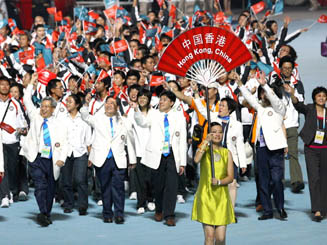 Hu opens Special
Olympics, pledges to help handicapped - Shanghai yesterday played host to the
start of the Special Olympics with President Hu Jintao presiding over the
ceremony as China prepared to hold the Beijing Olympics next year. Hu opens Special
Olympics, pledges to help handicapped - Shanghai yesterday played host to the
start of the Special Olympics with President Hu Jintao presiding over the
ceremony as China prepared to hold the Beijing Olympics next year.
 China:
The Chinese mainland's imports and exports of textiles and
garments topped 124 billion U.S. dollars, up 18 percent year-on-year in the
first eight months of this year, according to statistics with China Customs.
China:
The Chinese mainland's imports and exports of textiles and
garments topped 124 billion U.S. dollars, up 18 percent year-on-year in the
first eight months of this year, according to statistics with China Customs.
 Fireworks explode in the sky
above the stadium during the opening ceremony for the 2007 Special Olympics at
Shanghai Stadium in Shanghai, east China on Oct. 2, 2007. The Shanghai Special
Olympics Summer Games was staged here Tuesday. Fireworks explode in the sky
above the stadium during the opening ceremony for the 2007 Special Olympics at
Shanghai Stadium in Shanghai, east China on Oct. 2, 2007. The Shanghai Special
Olympics Summer Games was staged here Tuesday.
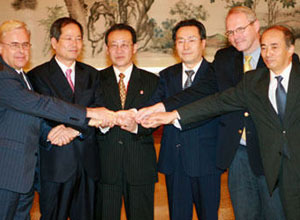 The 2nd session of the sixth
round of six-party talks ended in Beijing Wednesday with a joint document on the
second-phase actions toward the denuclearization on Korean Peninsula. The 2nd session of the sixth
round of six-party talks ended in Beijing Wednesday with a joint document on the
second-phase actions toward the denuclearization on Korean Peninsula.
China plans to set up a counter plan
in response to emergencies caused by poor-quality products, including foods. The
General Administration of Quality Supervision, Inspection and Quarantine (GAQSIQ)
has issued a draft counter plan to solicit advice from the public, according to
its official website. The administration will rate the incidents by four
categories according to its impact, from normal to very serious, and send
warnings labeled by four colors, blue, yellow, orange and red accordingly, said
Wednesday's Beijing News. Organizations or individuals should report to the
local administration or quality supervision department if discovering or causing
an emergency involving poor-quality products that have harmed or might threaten
public health or safety, the draft document said. Any organization or individual
must not disguise, delay or stop others from reporting these incidents,
otherwise they will receive administrative punishment or face criminal charge,
the document said. The draft counter plan also requires the quality supervision
departments at all levels to work out the first report two hours after they
confirmed the incidence of an emergency. While accusing Western media of
demonizing Chinese products, the Chinese government also admits that its product
quality records are not perfect, and has moved to improved the safety and
quality of its products.
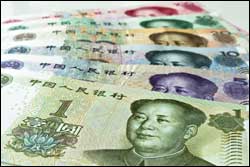 China sees record capital raising in
first nine months - A total of 425.04 billion yuan (US$56.67 billion) was raised
on China's equity markets in this year. China sees record capital raising in
first nine months - A total of 425.04 billion yuan (US$56.67 billion) was raised
on China's equity markets in this year.
The Chinese government admits it
has failed to curb soaring home prices, blaming local officials for not doing
enough to ensure sufficient housing supply, state media said yesterday.
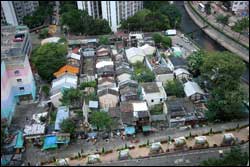 The Urban Renewal Authority yesterday set
in motion the redevelopment of the 600-year-old Nga Tsin Wai Village in Wong Tai
Sin which had been delayed for 20 years. Immediately after the announcement,
legislators called on Development Bureau chief Carrie Lam Cheng Yuet-ngor to
take a strong position with Cheung Kong (Holdings) (0001), the major shareholder
in the village. The authority's board yesterday gave the green light to the
HK$1.24 billion plan to redevelop the dilapidated village into a conservation
park with two 28-story residential towers. Acquisition offers are expected to be
issued to the 30 property owners within three months before compensation or
rehousing arrangements are discussed. Yesterday, the authority's staff began an
occupancy survey of the 60 households residing in 57 village houses. The
authority is also in talks with Cheung Kong. Authority chairman Barry Cheung
Chun-yuen said the meetings had been positive and a partnership agreement was in
sight. He admitted the cost would be huge and may not be profitable, but that it
had to be done. The Urban Renewal Authority yesterday set
in motion the redevelopment of the 600-year-old Nga Tsin Wai Village in Wong Tai
Sin which had been delayed for 20 years. Immediately after the announcement,
legislators called on Development Bureau chief Carrie Lam Cheng Yuet-ngor to
take a strong position with Cheung Kong (Holdings) (0001), the major shareholder
in the village. The authority's board yesterday gave the green light to the
HK$1.24 billion plan to redevelop the dilapidated village into a conservation
park with two 28-story residential towers. Acquisition offers are expected to be
issued to the 30 property owners within three months before compensation or
rehousing arrangements are discussed. Yesterday, the authority's staff began an
occupancy survey of the 60 households residing in 57 village houses. The
authority is also in talks with Cheung Kong. Authority chairman Barry Cheung
Chun-yuen said the meetings had been positive and a partnership agreement was in
sight. He admitted the cost would be huge and may not be profitable, but that it
had to be done.
October 4, 2007
 Hong Kong:
The Secretary for Justice of Hong
Kong Special Administrative Region (HKSAR), Wong Yan Lung, will depart Hong Kong
Monday night for a five-day visit to London, Stockholm, Helsinki and Dublin in
Europe. In London, Wong will meet with the Secretary of State for Justice and
Lord Chancellor, the Rt Hon Jack Straw, and members of the Hong Kong Association
to brief them on Hong Kong's latest developments. He will also be called as a
Master of the Bench of the Middle Temple, together with the former Commissioner
of the Independent Commission Against Corruption (1993 to 1996) and Solicitor
General of the Department of Justice (1992 to 1993) of Hong Kong, Wong will fly
to Stockholm on Wednesday, where he will meet the Swedish Minister of Justice,
Beatrice Ask. He will deliver a keynote speech titled "Hong Kong as Asia's World
City -- The Legal Perspective" at a reception for local Government officials and
representatives from the business and legal field. Wong will also meet with the
Chairman and Members of the Arbitration Center of the Stockholm Chamber of
Commerce to brief them on Hong Kong's credentials as a regional arbitration. In
Helsinki, Wong will sign an agreement between HKSAR and Finland on Mutual Legal
Assistance in criminal matters. In Dublin, Wong will sign an agreement between
HKSAR and the Republic of Ireland on Surrender of Fugitive Offenders. He will
also meet with government officials, members of the business community, legal
profession and academic. Hong Kong:
The Secretary for Justice of Hong
Kong Special Administrative Region (HKSAR), Wong Yan Lung, will depart Hong Kong
Monday night for a five-day visit to London, Stockholm, Helsinki and Dublin in
Europe. In London, Wong will meet with the Secretary of State for Justice and
Lord Chancellor, the Rt Hon Jack Straw, and members of the Hong Kong Association
to brief them on Hong Kong's latest developments. He will also be called as a
Master of the Bench of the Middle Temple, together with the former Commissioner
of the Independent Commission Against Corruption (1993 to 1996) and Solicitor
General of the Department of Justice (1992 to 1993) of Hong Kong, Wong will fly
to Stockholm on Wednesday, where he will meet the Swedish Minister of Justice,
Beatrice Ask. He will deliver a keynote speech titled "Hong Kong as Asia's World
City -- The Legal Perspective" at a reception for local Government officials and
representatives from the business and legal field. Wong will also meet with the
Chairman and Members of the Arbitration Center of the Stockholm Chamber of
Commerce to brief them on Hong Kong's credentials as a regional arbitration. In
Helsinki, Wong will sign an agreement between HKSAR and Finland on Mutual Legal
Assistance in criminal matters. In Dublin, Wong will sign an agreement between
HKSAR and the Republic of Ireland on Surrender of Fugitive Offenders. He will
also meet with government officials, members of the business community, legal
profession and academic.
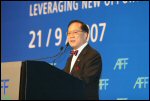 Financial market
regulators in Asia should join hands in curbing market volatility, says Hong
Kong Chief Executive Donald Tsang. The call for effective risk management and
market transparency in his opening speech at the Asian Financial Forum was
timely, given the recent subprime mortgage crisis which caused unusual
fluctuations in worldwide security markets. Financial market
regulators in Asia should join hands in curbing market volatility, says Hong
Kong Chief Executive Donald Tsang. The call for effective risk management and
market transparency in his opening speech at the Asian Financial Forum was
timely, given the recent subprime mortgage crisis which caused unusual
fluctuations in worldwide security markets.
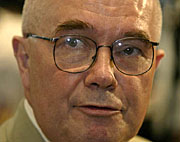 Hong Kong remains
Asia's top city for international companies - Invest Hong Kong, the investment
promotion department of the Hong Kong government, welcomed the results released
Tuesday that Hong Kong remained the preferred city in Aisa for overseas and
Chinese mainland's companies. The results are based on the "Annual Survey of
Companies in Hong Kong Representing Parent Companies Located outside Hong Kong"
conducted by the Census and Statistics Department of the Hong Kong Special
Administrative Region Government. "According to the survey results, of the 6,440
companies in Hong Kong representing parent companies located outside Hong Kong,
3,890 are regional offices or headquarters. This is an all-time high," said Mike
Rowse, the Director-General of Investment Promotion. Rowse emphasized the
important role played by overseas and Chinese mainland's companies in Hong Kong.
"Headquarters, regional offices and local offices together employ almost 346,000
people in Hong Kong, accounting for around one in 10 of our working population."
He said he was also delighted to see the healthy growth trend over the past 10
years, with the number of regional headquarters and regional offices increased
by 55 percent. At the same time, Invest Hong Kong cautioned that more needed to
be done to ensure Hong Kong's continued competitiveness in the years ahead.
Rowse said Hong Kong could not rest on its laurels. "We're at the heart of a
competitive, high-growth region and investors have more and more choices. What
I'm hearing from the international chambers in Hong Kong and during my trips
overseas is that Hong Kong has three key challenges ahead. We need to focus on
the high cost of office premises, on improving our air quality and on increasing
the number of international school places. The Government is aware of these
problems and is working to address them." Hong Kong remains
Asia's top city for international companies - Invest Hong Kong, the investment
promotion department of the Hong Kong government, welcomed the results released
Tuesday that Hong Kong remained the preferred city in Aisa for overseas and
Chinese mainland's companies. The results are based on the "Annual Survey of
Companies in Hong Kong Representing Parent Companies Located outside Hong Kong"
conducted by the Census and Statistics Department of the Hong Kong Special
Administrative Region Government. "According to the survey results, of the 6,440
companies in Hong Kong representing parent companies located outside Hong Kong,
3,890 are regional offices or headquarters. This is an all-time high," said Mike
Rowse, the Director-General of Investment Promotion. Rowse emphasized the
important role played by overseas and Chinese mainland's companies in Hong Kong.
"Headquarters, regional offices and local offices together employ almost 346,000
people in Hong Kong, accounting for around one in 10 of our working population."
He said he was also delighted to see the healthy growth trend over the past 10
years, with the number of regional headquarters and regional offices increased
by 55 percent. At the same time, Invest Hong Kong cautioned that more needed to
be done to ensure Hong Kong's continued competitiveness in the years ahead.
Rowse said Hong Kong could not rest on its laurels. "We're at the heart of a
competitive, high-growth region and investors have more and more choices. What
I'm hearing from the international chambers in Hong Kong and during my trips
overseas is that Hong Kong has three key challenges ahead. We need to focus on
the high cost of office premises, on improving our air quality and on increasing
the number of international school places. The Government is aware of these
problems and is working to address them."
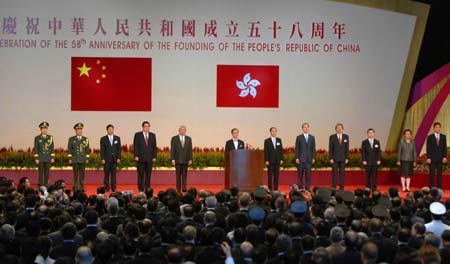 Chief
Executive of Hong Kong Special Administrative Region Donald Tsang (6th L Back)
addresses a reception in Hong Kong, south China, on Oct. 1, 2007. A grand
reception was held Monday to celebrate the 58th anniversary of the founding of
the People's Republic of China. Chief
Executive of Hong Kong Special Administrative Region Donald Tsang (6th L Back)
addresses a reception in Hong Kong, south China, on Oct. 1, 2007. A grand
reception was held Monday to celebrate the 58th anniversary of the founding of
the People's Republic of China.
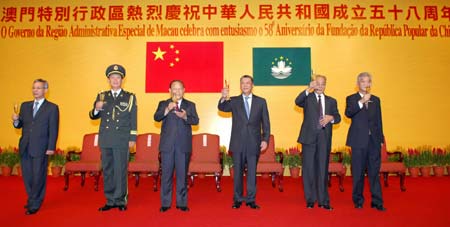 Edmund
Ho Hau Wah (3rd R), chief executive of Macao Special Administrative Region,
toasts at a reception in Macao, south China, on Oct. 1, 2007. A grand reception
was held Monday to celebrate the 58th anniversary of the founding of the
People's Republic of China. Edmund
Ho Hau Wah (3rd R), chief executive of Macao Special Administrative Region,
toasts at a reception in Macao, south China, on Oct. 1, 2007. A grand reception
was held Monday to celebrate the 58th anniversary of the founding of the
People's Republic of China.
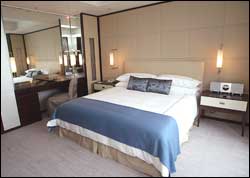  Urgent measures must be taken to ease the city's
hotel-room crunch, tourism chief James Tien Pei-chun has warned. Tien, chairman
of the Hong Kong Tourism Board, has met with Chief Executive Donald Tsang
Yam-kuen on the issue, and urged the government to earmark for hotels sites to
be released from the land application list. Most property developers prefer to
build offices instead of hotels as returns are higher, and hotels continue to be
demolished to make way for office towers, exacerbating the room-supply problem,
Tien told The Standard. "Some sites on the land-application list should be
earmarked for building 3- and 4-star hotels in areas such as Ma On Shan, or else
nobody will build hotels," he said. The government must be prepared to accept
that sale prices for such sites would be lower. The application list is not the
only channel for purchases, since developers can buy in the open market. Tien
also said the government could be more flexible in the terms offered. "If the
developer wants to change the land use from developing a hotel to an office
building, then it has to pay an additional premium." Tien believes creating more
hotel rooms would eventually help lower room rates and make Hong Kong even more
attractive to visitors. He also lamented the lack of mega events organized by
the government.
Urgent measures must be taken to ease the city's
hotel-room crunch, tourism chief James Tien Pei-chun has warned. Tien, chairman
of the Hong Kong Tourism Board, has met with Chief Executive Donald Tsang
Yam-kuen on the issue, and urged the government to earmark for hotels sites to
be released from the land application list. Most property developers prefer to
build offices instead of hotels as returns are higher, and hotels continue to be
demolished to make way for office towers, exacerbating the room-supply problem,
Tien told The Standard. "Some sites on the land-application list should be
earmarked for building 3- and 4-star hotels in areas such as Ma On Shan, or else
nobody will build hotels," he said. The government must be prepared to accept
that sale prices for such sites would be lower. The application list is not the
only channel for purchases, since developers can buy in the open market. Tien
also said the government could be more flexible in the terms offered. "If the
developer wants to change the land use from developing a hotel to an office
building, then it has to pay an additional premium." Tien believes creating more
hotel rooms would eventually help lower room rates and make Hong Kong even more
attractive to visitors. He also lamented the lack of mega events organized by
the government.
Following its mainland
incorporation, HSBC (0005) will expand its commercial-banking presence in
northern and western Chinese cities and offer financial services to farmers
through its soon-to-be-established rural bank, according to a senior executive
in Hong Kong.
The Hong Kong bourse attracted 52
companies to list in the first three quarters, but the exchange lost market
share to Shanghai stock exchange, data show.
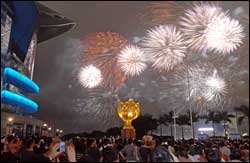 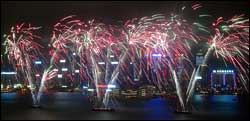 More than half a million mainlanders have crossed into Hong Kong for the
National Day Golden Week holiday, with 250,000 passing through the checkpoints.
A number of restaurants reported above-average business, though there were
diverging opinions on how much of this was due to the mainland appetite. An
immigration official said about 258,000 mainlanders had crossed over by 5pm
yesterday, and 141,000 had left. Most of them came in through Lo Wu, with the
average waiting time for clearance being about 30 minutes. Association of Travel
Agents vice chairman Paul Leung Yiu-lam said there were about 300 mainland tour
groups a day, which is almost the same as last year. But he noted some groups
had shortened their time in Hong Kong to spend a day or two in Macau. A tourist
surnamed Tse said she would spend three days in Hong Kong and one in Macau.
Travel Industry Council executive director Joseph Tung Yao-chung said Macau
would not draw tourists away from Hong Kong. "Macau's attraction is
entertainment," Tung said. "Hong Kong is more appealing to families. In the long
run, the two cities should work together to promote tourism." One tourist from
Beijing did complain of being taken to a To Kwa Wan jewelry shop that offered
low-quality goods. According to Commercial Radio, the tourist had joined a
four-day tour in Shenzhen arranged by Pegasus International Travel. A spokesman
for the agency refused to comment. Meanwhile, restaurateurs offered different
views on the effect of mainlanders on their business. "Most mainlanders come to
Hong Kong mainly for shopping. Even if they want to eat, they will look for
cuisine not found in their hometowns. Chinese cuisine is definitely not on their
list," said Law Wai-kong, general manager of the New Dynasty Scenic Restaurant
in Wan Chai. Takings at the New Dynasty, located on the 60th floor of the
Hopewell Centre in Wan Chai, surged 30 percent to HK$160,000 yesterday. "Our
customers, usually families, pick us as they want to enjoy dinner when the
spectacular fireworks display is on," Law said. "Without the fireworks, sales
will be back to normal. The golden week effect only lasts one day for us." But
Andy Kwok Luk-ming, managing director of Everfresh Seafood Restaurant in
Causeway Bay, said business over the weekend was "especially good." Kwok said
mainlanders are more willing to spend money on food than locals. "Hong Kong
people prefer set meals and special offers. On average, the bill for a group of
mainland diners amounts to about HK$1,500 - 50 percent higher than the HK$1,000
tab for Hong Kong people," he said. Causeway Bay's Forum Restaurant, famous for
its abalone, said its sales were expected to jump 20 percent, although managing
director Yeung Koon-yat noted sales during festive periods do not always
outperform regular weekdays. "A festive period means that restaurants will be
packed with many customers. That scares away some other customers," Yeung said.
More than half a million mainlanders have crossed into Hong Kong for the
National Day Golden Week holiday, with 250,000 passing through the checkpoints.
A number of restaurants reported above-average business, though there were
diverging opinions on how much of this was due to the mainland appetite. An
immigration official said about 258,000 mainlanders had crossed over by 5pm
yesterday, and 141,000 had left. Most of them came in through Lo Wu, with the
average waiting time for clearance being about 30 minutes. Association of Travel
Agents vice chairman Paul Leung Yiu-lam said there were about 300 mainland tour
groups a day, which is almost the same as last year. But he noted some groups
had shortened their time in Hong Kong to spend a day or two in Macau. A tourist
surnamed Tse said she would spend three days in Hong Kong and one in Macau.
Travel Industry Council executive director Joseph Tung Yao-chung said Macau
would not draw tourists away from Hong Kong. "Macau's attraction is
entertainment," Tung said. "Hong Kong is more appealing to families. In the long
run, the two cities should work together to promote tourism." One tourist from
Beijing did complain of being taken to a To Kwa Wan jewelry shop that offered
low-quality goods. According to Commercial Radio, the tourist had joined a
four-day tour in Shenzhen arranged by Pegasus International Travel. A spokesman
for the agency refused to comment. Meanwhile, restaurateurs offered different
views on the effect of mainlanders on their business. "Most mainlanders come to
Hong Kong mainly for shopping. Even if they want to eat, they will look for
cuisine not found in their hometowns. Chinese cuisine is definitely not on their
list," said Law Wai-kong, general manager of the New Dynasty Scenic Restaurant
in Wan Chai. Takings at the New Dynasty, located on the 60th floor of the
Hopewell Centre in Wan Chai, surged 30 percent to HK$160,000 yesterday. "Our
customers, usually families, pick us as they want to enjoy dinner when the
spectacular fireworks display is on," Law said. "Without the fireworks, sales
will be back to normal. The golden week effect only lasts one day for us." But
Andy Kwok Luk-ming, managing director of Everfresh Seafood Restaurant in
Causeway Bay, said business over the weekend was "especially good." Kwok said
mainlanders are more willing to spend money on food than locals. "Hong Kong
people prefer set meals and special offers. On average, the bill for a group of
mainland diners amounts to about HK$1,500 - 50 percent higher than the HK$1,000
tab for Hong Kong people," he said. Causeway Bay's Forum Restaurant, famous for
its abalone, said its sales were expected to jump 20 percent, although managing
director Yeung Koon-yat noted sales during festive periods do not always
outperform regular weekdays. "A festive period means that restaurants will be
packed with many customers. That scares away some other customers," Yeung said.
HSBC – the largest Mandatory Provident Fund provider in
Hong Kong – announced on Tuesday that fees for its four conservative investment
options would be reduced.
Hong Kong’s retails sales totalled HK$20.6 billion in
August, up 15 per cent from the same month a year earlier, government figures
released on Wednesday showed.
 China:
The average pork price has dropped to 12.61 yuan this week, 9.61 percent lower
than the peak price on August 9, said China's economic planner after pork prices
nearly doubled in the past eight months due to short supply and mounting
production costs.
China:
The average pork price has dropped to 12.61 yuan this week, 9.61 percent lower
than the peak price on August 9, said China's economic planner after pork prices
nearly doubled in the past eight months due to short supply and mounting
production costs.
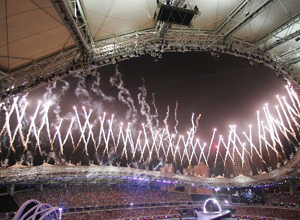 Chinese President Hu Jintao
declared open the 2007 Special Olympic World Summer Games at the opening
ceremony in Shanghai Tuesday. A record 7,291 athletes from 164 countries and
regions are set to take part in the 21-sport Games slated for Oct. 2-11. Chinese President Hu Jintao
declared open the 2007 Special Olympic World Summer Games at the opening
ceremony in Shanghai Tuesday. A record 7,291 athletes from 164 countries and
regions are set to take part in the 21-sport Games slated for Oct. 2-11.
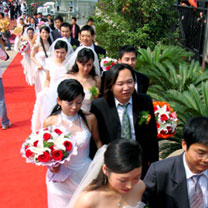 Newlywed couples
walk on the red carpet during a mass wedding ceremony in Nanjing, East China's
Jiangsu Province on October 1, 2007, China's National Day. Newlywed couples
walk on the red carpet during a mass wedding ceremony in Nanjing, East China's
Jiangsu Province on October 1, 2007, China's National Day.
 The National Day
holiday is a shopper's paradise. Many shopping malls offer special discounts
during this period. Shoes, bags, clothes, and even underwear...are on sale at
favorable prices. All you need to do is look at the numerous promotions and find
which ones best fit your needs. To help you, here are some listed below. The National Day
holiday is a shopper's paradise. Many shopping malls offer special discounts
during this period. Shoes, bags, clothes, and even underwear...are on sale at
favorable prices. All you need to do is look at the numerous promotions and find
which ones best fit your needs. To help you, here are some listed below.
October 3, 2007
 Hong Kong:
Thousands of government officials,
celebrities and guests from all walks of life in Hong Kong attended a grand
reception here Monday morning to celebrate the 58th anniversary of the founding
of the People's Republic of China. It is also the 10th National Day being marked
in Hong Kong since its return to the Chinese motherland in 1997. "The
development of the country is now most encouraging, and our success in many
areas has stunned the whole world," Chief Executive of Hong Kong Special
Administrative Region (HKSAR) Donald Tsang said in his address at the National
Day reception. "Hong Kong is blessed to have the strong backing of the world's
fastest-growing and most promising market," Tsang said, adding the entire world
is eyeing the tremendous opportunities brought about by China's rapid economic
development. "Amid this severe global competition, we in Hong Kong must further
capitalize on our unique strengths to capture opportunities ahead of others," he
said. Tsang said good results have already been in the financial sector as
enterprises in the Chinese mainland continue to grow and Hong Kong has become
the most-preferred platform for mainland enterprises to raise capital with its
improving financial system. "Our economy has now revitalized, but we should not
be complacent," Tsang said, "My team and I will keep on with our efforts to show
our citizens that we are a professional, committed, experienced and energetic
team." Tsang promised to strive to promote economic development and improve
people's livelihood, so that all sectors of the community can share the fruits
of economic prosperity. Looking forward to the coming Beijing Olympic Games some
300 days later, Tsang said Hong Kong is most honored to host the Equestrian
events. "When the moment comes," he said, "people in Hong Kong and Beijing will
echo each other's cheers, and the Olympic flag of five interlaced rings, the
five-star national flag and the HKSAR flag will fly in harmony." Director of the
Liaison Office of the Central People's Government in HKSAR Gao Siren,
Commissioner of the Ministry of Foreign Affairs in Hong Kong Lu Xinhua and
Commander of the People 's Liberation Army (PLA) Garrison Troops in Hong Kong
Wang Jitang, Commissar Liu Liangkai attended the reception. Also present at the
reception were HKSAR government Chief Secretary for Administration Henry Tang,
Financial Secretary John Tsang, Secretary for Justice Wong Yan Lung, President
of the Legislative Council Rita Fan and Convenor of the non-official members of
the Executive Council Leung Chun-ying. Earlier in the morning, thousands of Hong
Kong residents and visitors gathered at the Golden Bauhinia Square for the flag
raising ceremony marking China's National Day. Hong Kong:
Thousands of government officials,
celebrities and guests from all walks of life in Hong Kong attended a grand
reception here Monday morning to celebrate the 58th anniversary of the founding
of the People's Republic of China. It is also the 10th National Day being marked
in Hong Kong since its return to the Chinese motherland in 1997. "The
development of the country is now most encouraging, and our success in many
areas has stunned the whole world," Chief Executive of Hong Kong Special
Administrative Region (HKSAR) Donald Tsang said in his address at the National
Day reception. "Hong Kong is blessed to have the strong backing of the world's
fastest-growing and most promising market," Tsang said, adding the entire world
is eyeing the tremendous opportunities brought about by China's rapid economic
development. "Amid this severe global competition, we in Hong Kong must further
capitalize on our unique strengths to capture opportunities ahead of others," he
said. Tsang said good results have already been in the financial sector as
enterprises in the Chinese mainland continue to grow and Hong Kong has become
the most-preferred platform for mainland enterprises to raise capital with its
improving financial system. "Our economy has now revitalized, but we should not
be complacent," Tsang said, "My team and I will keep on with our efforts to show
our citizens that we are a professional, committed, experienced and energetic
team." Tsang promised to strive to promote economic development and improve
people's livelihood, so that all sectors of the community can share the fruits
of economic prosperity. Looking forward to the coming Beijing Olympic Games some
300 days later, Tsang said Hong Kong is most honored to host the Equestrian
events. "When the moment comes," he said, "people in Hong Kong and Beijing will
echo each other's cheers, and the Olympic flag of five interlaced rings, the
five-star national flag and the HKSAR flag will fly in harmony." Director of the
Liaison Office of the Central People's Government in HKSAR Gao Siren,
Commissioner of the Ministry of Foreign Affairs in Hong Kong Lu Xinhua and
Commander of the People 's Liberation Army (PLA) Garrison Troops in Hong Kong
Wang Jitang, Commissar Liu Liangkai attended the reception. Also present at the
reception were HKSAR government Chief Secretary for Administration Henry Tang,
Financial Secretary John Tsang, Secretary for Justice Wong Yan Lung, President
of the Legislative Council Rita Fan and Convenor of the non-official members of
the Executive Council Leung Chun-ying. Earlier in the morning, thousands of Hong
Kong residents and visitors gathered at the Golden Bauhinia Square for the flag
raising ceremony marking China's National Day.
 In front of a packed audience of nearly
30,000, Jacky Cheung smartly mixed segments of his sold-out musical "Snow, Wolf,
Lake" with his song "Perhaps Love," from Peter Chan's Moulin Rouge-like film. In front of a packed audience of nearly
30,000, Jacky Cheung smartly mixed segments of his sold-out musical "Snow, Wolf,
Lake" with his song "Perhaps Love," from Peter Chan's Moulin Rouge-like film.
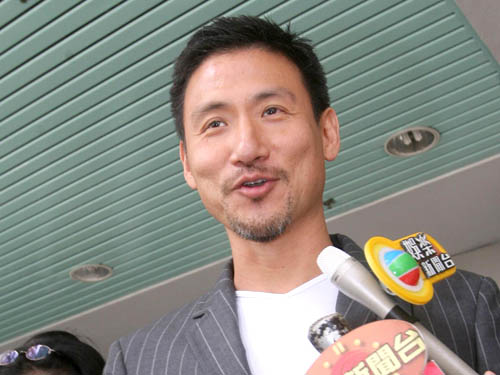 Singer Jacky Cheung Hok-yau has hit back
at allegations that he hired and fired 21 Filipino maids in three years,
insisting yesterday that he was an "ordinary employer". Cheung said he failed to
recall how many domestic helpers his family had employed and sacked over the
years, saying he rehired some at the end of their contracts while others
resigned on their first day after seeing there were so many stairs at his
four-storey Repulse Bay home. He lives there with his wife and two daughters,
aged two and seven. Speaking from the city of Haining , in Zhejiang , the latest
stop on a concert tour, Cheung said: "I consider myself an ordinary employer.
Many of my friends terminate their maids' contracts and I believe it is normal
in any employment. "An employer can fire an employee if he or she fails to
perform, whilst an employee can also resign if he or she is not happy about the
employer. Is there anything wrong if we fire a maid when we find out that she is
not helpful?" The Philippine consulate has put the Canto-pop star and his wife,
former actress May Lo Mei-mei, on a blacklist of substandard employers and
banned them from hiring maids for one year, claiming that he employed and sacked
21 helpers in three years. Domestic helpers have dubbed Cheung "the Terminator". Singer Jacky Cheung Hok-yau has hit back
at allegations that he hired and fired 21 Filipino maids in three years,
insisting yesterday that he was an "ordinary employer". Cheung said he failed to
recall how many domestic helpers his family had employed and sacked over the
years, saying he rehired some at the end of their contracts while others
resigned on their first day after seeing there were so many stairs at his
four-storey Repulse Bay home. He lives there with his wife and two daughters,
aged two and seven. Speaking from the city of Haining , in Zhejiang , the latest
stop on a concert tour, Cheung said: "I consider myself an ordinary employer.
Many of my friends terminate their maids' contracts and I believe it is normal
in any employment. "An employer can fire an employee if he or she fails to
perform, whilst an employee can also resign if he or she is not happy about the
employer. Is there anything wrong if we fire a maid when we find out that she is
not helpful?" The Philippine consulate has put the Canto-pop star and his wife,
former actress May Lo Mei-mei, on a blacklist of substandard employers and
banned them from hiring maids for one year, claiming that he employed and sacked
21 helpers in three years. Domestic helpers have dubbed Cheung "the Terminator".
 Six
of HSBC Holdings (SEHK: 0005, announcements, news) ' largest institutional
shareholders are set to publicly declare their support for a campaign launched
by shareholder activist Knight Vinke Asset Management that calls for a
management shake-up and strategy review at Europe's largest bank. Citing unnamed
sources, Britain's Observer newspaper reported yesterday that British and
foreign funds holding significant stakes in HSBC will in the next few weeks send
letters to the bank's senior independent director Simon Robertson supporting
"all or some" of Knight Vinke's demands, which include strengthening its focus
on Asia and demoting executive chairman Stephen Green to a non-executive role.
The report of a brewing shareholder mutiny against HSBC management runs contrary
to recent statements by the bank that its current strategy enjoys support from
the "vast majority" of its institutional shareholders. Knight Vinke, an activist
investment firm that counts California state pension fund Calpers among its key
financial backers and that has previously locked horns with management at Royal
Dutch Shell and Dutch media firm VNU, has spent the past month meeting other
HSBC shareholders in an attempt to build consensus and push for strategic
changes. On September 4, it sent a letter to Mr Green expressing dissatisfaction
at the lacklustre performance of the bank's share price. It blamed management
for poor returns on the bank's acquisitions in the US home mortgage market and
the French commercial banking sector, leading to missed opportunities in
high-growth Asia. HSBC has countered that it remains committed to the Asia
market. The London-based lender last month paid US$6.3 billion for a controlling
stake in Korea Exchange Bank and announced a US$225 million deal for a 10 per
cent interest in state-owned Bao Viet, Vietnam's largest insurer. Six
of HSBC Holdings (SEHK: 0005, announcements, news) ' largest institutional
shareholders are set to publicly declare their support for a campaign launched
by shareholder activist Knight Vinke Asset Management that calls for a
management shake-up and strategy review at Europe's largest bank. Citing unnamed
sources, Britain's Observer newspaper reported yesterday that British and
foreign funds holding significant stakes in HSBC will in the next few weeks send
letters to the bank's senior independent director Simon Robertson supporting
"all or some" of Knight Vinke's demands, which include strengthening its focus
on Asia and demoting executive chairman Stephen Green to a non-executive role.
The report of a brewing shareholder mutiny against HSBC management runs contrary
to recent statements by the bank that its current strategy enjoys support from
the "vast majority" of its institutional shareholders. Knight Vinke, an activist
investment firm that counts California state pension fund Calpers among its key
financial backers and that has previously locked horns with management at Royal
Dutch Shell and Dutch media firm VNU, has spent the past month meeting other
HSBC shareholders in an attempt to build consensus and push for strategic
changes. On September 4, it sent a letter to Mr Green expressing dissatisfaction
at the lacklustre performance of the bank's share price. It blamed management
for poor returns on the bank's acquisitions in the US home mortgage market and
the French commercial banking sector, leading to missed opportunities in
high-growth Asia. HSBC has countered that it remains committed to the Asia
market. The London-based lender last month paid US$6.3 billion for a controlling
stake in Korea Exchange Bank and announced a US$225 million deal for a 10 per
cent interest in state-owned Bao Viet, Vietnam's largest insurer.
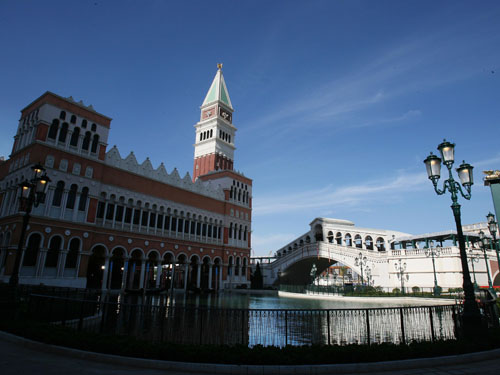 Intensifying competition from
hospitality and convention service providers in Macau and Singapore has
triggered a wave of renovations across Hong Kong's hotel and exhibition
facilities. Some hotels, especially those in the neighbourhood of the Hong Kong
Convention and Exhibition Centre in Wan Chai and those lining Nathan Road, are
masking their properties with scaffolding or suspending services to make way for
thorough facelifts. The need for a rejuvenated image and enhanced services is
pressing after the opening last month of the US$2.4 billion Venetian Macao
casino resort, which has a one million square foot retail mecca, 1.2 million sq
ft in convention space and 3,000 hotel rooms. The resort is the first of 13
casino hotels Les Vegas Sands is developing on Macau's Cotai Strip. Adding fuel
to the cut-throat competition is a US$3.6 billion gaming, conference-cum
residential project in Singapore, another Sands project, due for completion in
2009. "The real threat should come from Singapore," said Hong Kong Hotels
Association executive director James Lu. "Macau will create some competition in
leisure tourism in the short-term but don't underestimate Singapore." He pointed
out that Singapore and Hong Kong, which are more comparable in terms of tourism,
financial development, infrastructure and logistics, will enter a fresh round of
competition for meetings, incentives, conventions and exhibitions (MICE) in two
years when Sands finishes a 100,000 sq ft facility for this purpose and a 1.2
million sq ft space accommodating 52,000 visitors. Intensifying competition from
hospitality and convention service providers in Macau and Singapore has
triggered a wave of renovations across Hong Kong's hotel and exhibition
facilities. Some hotels, especially those in the neighbourhood of the Hong Kong
Convention and Exhibition Centre in Wan Chai and those lining Nathan Road, are
masking their properties with scaffolding or suspending services to make way for
thorough facelifts. The need for a rejuvenated image and enhanced services is
pressing after the opening last month of the US$2.4 billion Venetian Macao
casino resort, which has a one million square foot retail mecca, 1.2 million sq
ft in convention space and 3,000 hotel rooms. The resort is the first of 13
casino hotels Les Vegas Sands is developing on Macau's Cotai Strip. Adding fuel
to the cut-throat competition is a US$3.6 billion gaming, conference-cum
residential project in Singapore, another Sands project, due for completion in
2009. "The real threat should come from Singapore," said Hong Kong Hotels
Association executive director James Lu. "Macau will create some competition in
leisure tourism in the short-term but don't underestimate Singapore." He pointed
out that Singapore and Hong Kong, which are more comparable in terms of tourism,
financial development, infrastructure and logistics, will enter a fresh round of
competition for meetings, incentives, conventions and exhibitions (MICE) in two
years when Sands finishes a 100,000 sq ft facility for this purpose and a 1.2
million sq ft space accommodating 52,000 visitors.
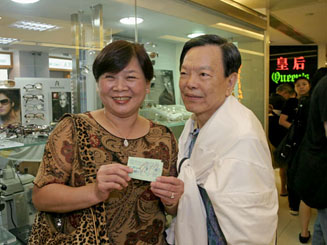 Curtain call for Queen's Theatre - It
was a full house at the Queen's Theatre yesterday as nostalgic movie fans packed
the colonial-era cinema for its final show. "Lust, Caution," with its heady brew
of retro-passion and unspoken, certain defeat, fitted the bill perfectly Sunday
as Queen's Theatre in Hong Kong put on what was almost certainly its last-ever
screening. Once one of the territory's three key cinemas, the Queen's in Theatre
Lane, Central District, is now an anachronism, a single-screen moviehouse
sitting plum at the heart of the world's most expensive real estate. Its closure
was signaled a couple of months ago (Daily Variety, July 15), but at the
theater's own curtain call this weekend, Hong Kongers displayed interestingly
mixed emotions of elation and resignation. Curtain call for Queen's Theatre - It
was a full house at the Queen's Theatre yesterday as nostalgic movie fans packed
the colonial-era cinema for its final show. "Lust, Caution," with its heady brew
of retro-passion and unspoken, certain defeat, fitted the bill perfectly Sunday
as Queen's Theatre in Hong Kong put on what was almost certainly its last-ever
screening. Once one of the territory's three key cinemas, the Queen's in Theatre
Lane, Central District, is now an anachronism, a single-screen moviehouse
sitting plum at the heart of the world's most expensive real estate. Its closure
was signaled a couple of months ago (Daily Variety, July 15), but at the
theater's own curtain call this weekend, Hong Kongers displayed interestingly
mixed emotions of elation and resignation.
Outside there were TV crews with satellite uplink equipment and microphones.
Inside, the 300-odd souls who had queued for tickets that were ripped from a
book and numbered by hand were, predictably, mostly enthusiasts. They were a
mixture of geeky movie buffs and a handful of faded stars who turned up for one
last nostalgic photo in front of the neon-lit box office. They were surprisingly
nice to the grumpy ushers in their red uniforms and gold epaulettes. And there
were raucous cheers and whistles for the manager who read from a card the
standard warning about camcording. No matter that the theater was slightly
smelly, the projector bulb seriously underpowered and the advertisements beamed
from a slide projector; the 9 p.m. auds were there to salute and to remember. As
the credits rolled on Tony Leung, Joan Chen and newcomer Tang Wei, spectators
turned to one another, lingered some minutes to snap final photo memorabilia and
then filed off into the heat of the empty Hong Kong night.
 "Lust" makes
frothy start in U.S. theaters - Laughter and lust ruled the specialty biz B.O.
over the weekend in the U.S. Wes Anderson's "The Darjeeling Limited" and Ang
Lee's "Lust, Caution" both enjoyed robust openings. "Lust," carrying the
ultra-restrictive NC-17 rating and clocking in at 158 minutes, grossed an
estimated $61,688 for Focus Features in its exclusive run at the Lincoln Plaza
Cinemas. Among exclusive openings, it nabbed the best debut ever for a
foreign-language film, as well as one of the best showings ever for a
live-action film. Per-screen average is the best on the books for an NC-17 film,
whether in an exclusive or limited run. Focus topper James Schamus co-penned the
screenplay based on a story by Eileen Chang. "What does this mean? It means that
the running time, the foreign language and the rating just didn't have an impact
on the opening," Focus prexy of distribution Jack Foley said. "It just cranked
to that level." "Darjeeling," debuting in two Gotham theaters on Saturday after
opening the New York Film Festival on Friday, brewed an estimated
Saturday-Sunday gross of $140,000 for a boffo per-screen average of $70,000.
That gave Fox Searchlight the highest per-screen average of the year. In Taiwan,
where helmer Lee was born, pic opened with a socko $2.9 million at 95 playdates,
setting a record for top September launch in that market. "Lust" makes
frothy start in U.S. theaters - Laughter and lust ruled the specialty biz B.O.
over the weekend in the U.S. Wes Anderson's "The Darjeeling Limited" and Ang
Lee's "Lust, Caution" both enjoyed robust openings. "Lust," carrying the
ultra-restrictive NC-17 rating and clocking in at 158 minutes, grossed an
estimated $61,688 for Focus Features in its exclusive run at the Lincoln Plaza
Cinemas. Among exclusive openings, it nabbed the best debut ever for a
foreign-language film, as well as one of the best showings ever for a
live-action film. Per-screen average is the best on the books for an NC-17 film,
whether in an exclusive or limited run. Focus topper James Schamus co-penned the
screenplay based on a story by Eileen Chang. "What does this mean? It means that
the running time, the foreign language and the rating just didn't have an impact
on the opening," Focus prexy of distribution Jack Foley said. "It just cranked
to that level." "Darjeeling," debuting in two Gotham theaters on Saturday after
opening the New York Film Festival on Friday, brewed an estimated
Saturday-Sunday gross of $140,000 for a boffo per-screen average of $70,000.
That gave Fox Searchlight the highest per-screen average of the year. In Taiwan,
where helmer Lee was born, pic opened with a socko $2.9 million at 95 playdates,
setting a record for top September launch in that market.
 China:
The central government is likely to pick Tianjin's Binhai New Area to operate
the national over-the-counter equity bourse, a Tianjin official said. The
decision could be announced as early as late this month, after the 17th
Communist Party congress ends, as the mainland is eager to build a multi-layered
financial system to absorb excess liquidity in the capital market.
China:
The central government is likely to pick Tianjin's Binhai New Area to operate
the national over-the-counter equity bourse, a Tianjin official said. The
decision could be announced as early as late this month, after the 17th
Communist Party congress ends, as the mainland is eager to build a multi-layered
financial system to absorb excess liquidity in the capital market.
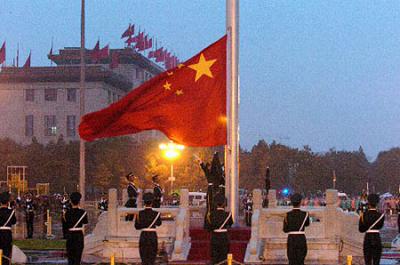 More than 100,000 people
from across the country gathered at Tian’anmen Square in Beijing to watch the
national flag raising ceremony, on Oct. 1, 2007, the 58th National Day of the
People’s Republic. More than 100,000 people
from across the country gathered at Tian’anmen Square in Beijing to watch the
national flag raising ceremony, on Oct. 1, 2007, the 58th National Day of the
People’s Republic.
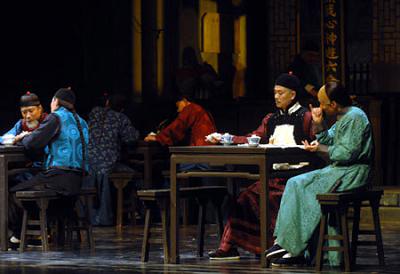 The drama "Tea House" is staged in the
National Grand Theater in Beijing, capital of China, Sept. 30, 2007. Written by
Lao She, the classical "Tea House" became the first drama staged in the National
Grand Theater on Sunday for the test show of the theater’s drama section. The drama "Tea House" is staged in the
National Grand Theater in Beijing, capital of China, Sept. 30, 2007. Written by
Lao She, the classical "Tea House" became the first drama staged in the National
Grand Theater on Sunday for the test show of the theater’s drama section.
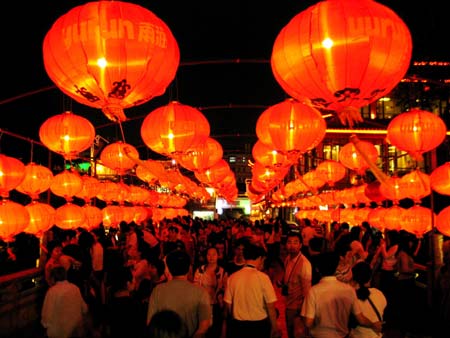 Visitors walk through the "lantern
corridor" along the Qinhuai River in Nanjing, capital of east China's Jiangsu
Province, Sept. 30, 2007. Lanterns were lit here on the eve of China's National
Day. Visitors walk through the "lantern
corridor" along the Qinhuai River in Nanjing, capital of east China's Jiangsu
Province, Sept. 30, 2007. Lanterns were lit here on the eve of China's National
Day.
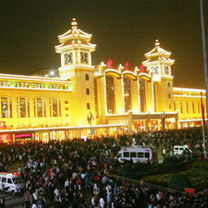 Tens of
thousands of people crowd at the Beijing Railway Station, September 30,
2007. Beijing's tourism administration bureau has predicted that about 1.7
million people will visit the capital during the seven-day holiday. Tens of
thousands of people crowd at the Beijing Railway Station, September 30,
2007. Beijing's tourism administration bureau has predicted that about 1.7
million people will visit the capital during the seven-day holiday.
 Beijing government has finally decided
to cut subway fares by about 30 percent. Beijing government has finally decided
to cut subway fares by about 30 percent.
October 2, 2007
 Hong Kong:
The Hong Kong government said Friday
it has recorded a surplus of 1.2 billion HK dollars (154 million U.S. dollars)
for the five-month period ending Aug. 31, pushing its fiscal reserve up to 370.5
billion HK dollars (47.5 billion U.S. dollars). Statistics released by the
Financial and the Treasury Bureau showed expenditure for the period totaled 94.6
billion HK dollars (12.13 billion U.S. dollars) while revenue amounted to 95.8
billion HK dollars (12.28 billion U.S. dollars), leading to a surplus of 1.2
billion HK dollars (154 million U.S. dollars). A government spokesman said the
surplus for the five-month period was mainly due to receipts of 38.1 billion HK
dollars (4.88billion U.S. dollars) in land premium. Hong Kong:
The Hong Kong government said Friday
it has recorded a surplus of 1.2 billion HK dollars (154 million U.S. dollars)
for the five-month period ending Aug. 31, pushing its fiscal reserve up to 370.5
billion HK dollars (47.5 billion U.S. dollars). Statistics released by the
Financial and the Treasury Bureau showed expenditure for the period totaled 94.6
billion HK dollars (12.13 billion U.S. dollars) while revenue amounted to 95.8
billion HK dollars (12.28 billion U.S. dollars), leading to a surplus of 1.2
billion HK dollars (154 million U.S. dollars). A government spokesman said the
surplus for the five-month period was mainly due to receipts of 38.1 billion HK
dollars (4.88billion U.S. dollars) in land premium.
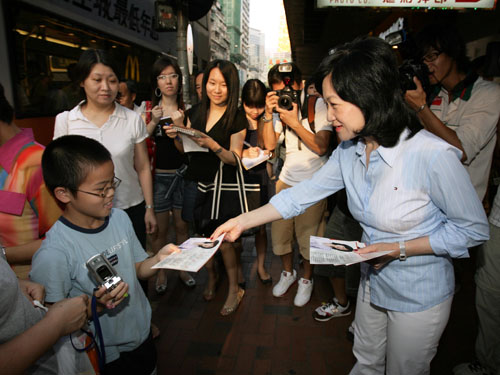 The candidates for the Legislative Council by-election began their first weekend
of campaigning on the same turf yesterday. Regina Ip Lau Suk-yee targeted North
Point - a bastion of Beijing loyalists - while Anson Chan Fang On-sang was down
the road in Quarry Bay. Before venturing onto the streets, Mrs Ip told
Commercial Radio about the changes she might need to make if she was to win the
election. he admitted she was quick to anger, spoke too fast, could be
imprudent, sometimes made frivolous remarks and easily offended people. But
self-criticism plays a part in any election campaign. "If you really want to do
something for the Hong Kong people, you have to have introspection to win
people's support," said Mrs Ip, who has already issued one mea culpa. When she
launched her campaign, she apologised for things she had said while trying to
push through national security legislation as security minister in 2003. Mrs Ip
said the city's education and pollution problems were causing popular concern.
Students' language abilities were slipping, she said.
The candidates for the Legislative Council by-election began their first weekend
of campaigning on the same turf yesterday. Regina Ip Lau Suk-yee targeted North
Point - a bastion of Beijing loyalists - while Anson Chan Fang On-sang was down
the road in Quarry Bay. Before venturing onto the streets, Mrs Ip told
Commercial Radio about the changes she might need to make if she was to win the
election. he admitted she was quick to anger, spoke too fast, could be
imprudent, sometimes made frivolous remarks and easily offended people. But
self-criticism plays a part in any election campaign. "If you really want to do
something for the Hong Kong people, you have to have introspection to win
people's support," said Mrs Ip, who has already issued one mea culpa. When she
launched her campaign, she apologised for things she had said while trying to
push through national security legislation as security minister in 2003. Mrs Ip
said the city's education and pollution problems were causing popular concern.
Students' language abilities were slipping, she said.
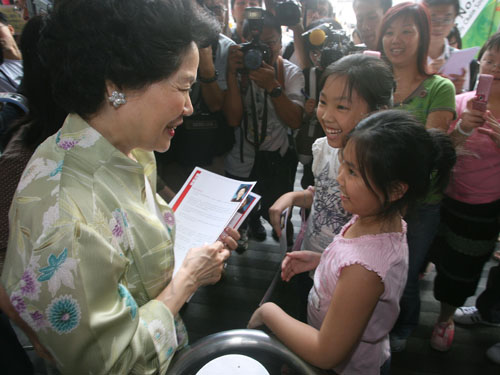 Meanwhile, Mrs Chan
handed out leaflets to passers-by outside Tai Koo MTR station. She insisted she
was ready to face any criticism. The former chief secretary said she had "spoken
out on important issues" about which local people are concerned since leaving
government in 2001. She made no direct reference to her rival, but when asked if
she would be making any self-criticisms, she said she had no personal baggage to
unburden herself of. Mrs Chan will learn today whether the pan-democratic camp
has chosen her or the League of Social Democrats' Lo Wing-lok as its candidate
for the December 2 by-election. She was joined on the streets by Civic Party
leader Audrey Eu Yuet-mee, who was among pan-democrats urging people to join a
rally next Sunday in Victoria Park in support of universal suffrage in 2012.
Organisers want participants to unfurl umbrellas to spell out 2-0-1-2, and hope
10,000 will turn out and create a Guinness World Record. Meanwhile, Mrs Chan
handed out leaflets to passers-by outside Tai Koo MTR station. She insisted she
was ready to face any criticism. The former chief secretary said she had "spoken
out on important issues" about which local people are concerned since leaving
government in 2001. She made no direct reference to her rival, but when asked if
she would be making any self-criticisms, she said she had no personal baggage to
unburden herself of. Mrs Chan will learn today whether the pan-democratic camp
has chosen her or the League of Social Democrats' Lo Wing-lok as its candidate
for the December 2 by-election. She was joined on the streets by Civic Party
leader Audrey Eu Yuet-mee, who was among pan-democrats urging people to join a
rally next Sunday in Victoria Park in support of universal suffrage in 2012.
Organisers want participants to unfurl umbrellas to spell out 2-0-1-2, and hope
10,000 will turn out and create a Guinness World Record.
 China:
China will soon replace traditional tourist destinations - France, Spain and the
Americas - as the top tourist destination country, as reported by an official
from the United Nations World Tourism Organization, at celebration of the 28th
"World Tourism Day" held in Xinjiang, in northwest China. By 2020, China will
replace traditional tourist destinations, and rank as the world's first,
according to the official's analysis. Chinese tourist officials are even more
optimistic. Shao Qiwei, director of the State Tourism Bureau, said that by as
early as 2015, China will become the world's largest country welcoming tourists,
and the fourth largest source of outbound tourists.
China:
China will soon replace traditional tourist destinations - France, Spain and the
Americas - as the top tourist destination country, as reported by an official
from the United Nations World Tourism Organization, at celebration of the 28th
"World Tourism Day" held in Xinjiang, in northwest China. By 2020, China will
replace traditional tourist destinations, and rank as the world's first,
according to the official's analysis. Chinese tourist officials are even more
optimistic. Shao Qiwei, director of the State Tourism Bureau, said that by as
early as 2015, China will become the world's largest country welcoming tourists,
and the fourth largest source of outbound tourists.
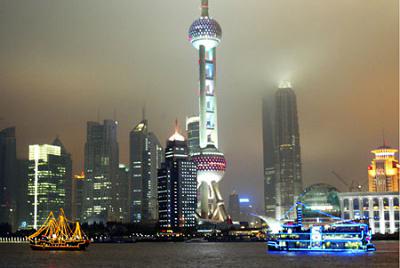 Photo taken on Sept 28, 2007 shows the
colorful cruises parade on Huangpu River, Shanghai. This performance is part of
the activities during 2007 Shanghai Tourism Festival. Photo taken on Sept 28, 2007 shows the
colorful cruises parade on Huangpu River, Shanghai. This performance is part of
the activities during 2007 Shanghai Tourism Festival.
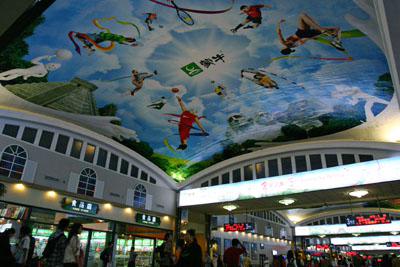 A giant dome fresco is seen at
the passenger hall of the Beijing Railway Station on September 28, 2007. The
fresco features representative architectures from around the world and a variety
of sports activities. A giant dome fresco is seen at
the passenger hall of the Beijing Railway Station on September 28, 2007. The
fresco features representative architectures from around the world and a variety
of sports activities.
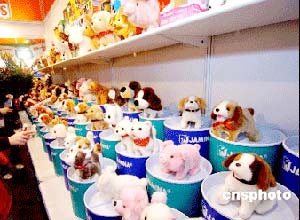 Some experts and media have welcomed
Mattel's clarification of its recalls of Chinese toys as concern is growing that
the design flaws have damaged the "Made in China" label. Thomas Debrowski, an
executive of Mattel, apologized last Friday to a senior Chinese official for the
inconvenience it has caused to Chinese consumers after recalling millions of
Chinese-made toys and pledged to take responsibility. He admitted that the vast
majority of the toys were recalled because of design flaws rather than
manufacturing errors in China. Dara O'Rourke, an associate professor of labor
and environmental policy at the University of California, Berkeley, said that
Mattel used China as a scapegoat for its own problems and that the toy maker is
now paying the price for that. "There was a lot of scapegoating China, but I
would argue that this was caused by a system that is designed to push down costs
and speed up delivery. There are root causes and Mattel is behind those," he
said. Mattel's apology also gained praise from some parents, including Arianna
McRoberts, 41, of Los Angeles, the mother of two boys, 7 and 14. "It's
unfortunate China got the bad rap, but I also think China needs to pay attention
a little more carefully to their standards so they comply with American
standards," McRoberts was quoted as saying by the Associated Press. "China has
received a lot of blame for the recalls in the West," said Hari Bapuji,
assistant professor at the University of Manitoba in Canada and lead author of
the report, "Toy Recalls -- Is China the Problem?" Some experts and media have welcomed
Mattel's clarification of its recalls of Chinese toys as concern is growing that
the design flaws have damaged the "Made in China" label. Thomas Debrowski, an
executive of Mattel, apologized last Friday to a senior Chinese official for the
inconvenience it has caused to Chinese consumers after recalling millions of
Chinese-made toys and pledged to take responsibility. He admitted that the vast
majority of the toys were recalled because of design flaws rather than
manufacturing errors in China. Dara O'Rourke, an associate professor of labor
and environmental policy at the University of California, Berkeley, said that
Mattel used China as a scapegoat for its own problems and that the toy maker is
now paying the price for that. "There was a lot of scapegoating China, but I
would argue that this was caused by a system that is designed to push down costs
and speed up delivery. There are root causes and Mattel is behind those," he
said. Mattel's apology also gained praise from some parents, including Arianna
McRoberts, 41, of Los Angeles, the mother of two boys, 7 and 14. "It's
unfortunate China got the bad rap, but I also think China needs to pay attention
a little more carefully to their standards so they comply with American
standards," McRoberts was quoted as saying by the Associated Press. "China has
received a lot of blame for the recalls in the West," said Hari Bapuji,
assistant professor at the University of Manitoba in Canada and lead author of
the report, "Toy Recalls -- Is China the Problem?"
China has shown its will to host the 2018 World Cup as Xie
Yalong, CFA vice president made a positive statement on the FIFA press
conference in Shanghai on Saturday.
The number of commercial bribe cases dealt with by Chinese
courts rose to 4,406 in the first seven months, an increase of 8.2 percent over
the same period of last year.
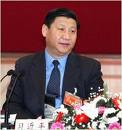 Xi Jinping, the
emerging dark-horse candidate to head China's next generation of leaders, has
received lavish praise from the state media for the second time in a week. With
about two weeks to go before the 17th Communist Party Congress, the Shanghai
party secretary was once again singled out for praise by Xinhua in its lengthy
report titled "Harmonious Shanghai welcomes the Party Congress". Mr Xi took over
the Shanghai post from disgraced Chen Liangyu in March. Xi Jinping, the
emerging dark-horse candidate to head China's next generation of leaders, has
received lavish praise from the state media for the second time in a week. With
about two weeks to go before the 17th Communist Party Congress, the Shanghai
party secretary was once again singled out for praise by Xinhua in its lengthy
report titled "Harmonious Shanghai welcomes the Party Congress". Mr Xi took over
the Shanghai post from disgraced Chen Liangyu in March.
October 1, 2007
 Hong Kong:
Hong Kong stock market
capitalization reached the new high of 20.05 trillion HK dollars ( 2.57 trillion
U.S. dollars) at Friday's close, exceeding the 20 trillion HK dollar (2.56
trillion U.S. dollars) mark for the first time, the Hong Kong Exchanges and
Clearing Limited said. The closing market capitalization of Thursday was 19.94
trillion HK dollars. The benchmark Hang Seng Index closed at a record high of
27,142. 47 points on Friday, the last trading day in the third quarter this year
as weekends are expected next. Hong Kong stocks topped one mark after another in
strong rallies recently, largely helped by a strong Chinese economy and the news
that the mainland is likely to initiate a trial program allowing individuals to
invest directly in the Hong Kong stock market. The market turnover on Friday
reached 148.58 billion HK dollars, also its highest. Traders said liquidity in
Asia will likely remain buoyant in the near future, which could help Hong Kong's
benchmark index to scale new heights next week. (7.8 HK dollars = 1 U.S. dollar) Hong Kong:
Hong Kong stock market
capitalization reached the new high of 20.05 trillion HK dollars ( 2.57 trillion
U.S. dollars) at Friday's close, exceeding the 20 trillion HK dollar (2.56
trillion U.S. dollars) mark for the first time, the Hong Kong Exchanges and
Clearing Limited said. The closing market capitalization of Thursday was 19.94
trillion HK dollars. The benchmark Hang Seng Index closed at a record high of
27,142. 47 points on Friday, the last trading day in the third quarter this year
as weekends are expected next. Hong Kong stocks topped one mark after another in
strong rallies recently, largely helped by a strong Chinese economy and the news
that the mainland is likely to initiate a trial program allowing individuals to
invest directly in the Hong Kong stock market. The market turnover on Friday
reached 148.58 billion HK dollars, also its highest. Traders said liquidity in
Asia will likely remain buoyant in the near future, which could help Hong Kong's
benchmark index to scale new heights next week. (7.8 HK dollars = 1 U.S. dollar)
The government of the Macao Special
Administrative Region (MSAR) has returned the management control to the local
bank Banco Delta Asia, according to an official statement issued Friday. The
statement from the Monetary Authority of Macao said the statutory mandate of the
Administrative Committee, which was appointed by the government on account of
the special intervention measures imposed on the bank expired on Sept. 28, 2007.
The resumption of the management control by the bank was due to the improvement
made in the bank's management and the persistent request of Stanley Au, the
original shareholder, said the statement. The Monetary Authority will, as usual,
perform the necessary supervisory duties to safeguard the interests of
depositors and to maintain the stability of the financial system of MSAR, it
added. The bank was alleged by the United States of being involved in an
international money laundering case in 2005.
Driven by robust economic
conditions, the total gross premiums of Hong Kong's insurance industry grew 13.7
percent to 156 billion Hong Kong dollars (20.12billion U.S. dollars) last year,
the office of Hong Kong Commissioner of Insurance said here Friday. The figure
represented 10.6 percent of Hong Kong's Gross Domestic Product, compared with
9.9 percent in 2005, the office said in a press release. Despite the strong
out-turn, general insurance business registered only a modest rise in gross
premiums of 1.8 percent to 22.96 billion Hong Kong dollars (2.96 billion U.S.
dollars). Net premiums grew 3.6 percent, attributable to a higher retention
ratio of 70.6 percent compared with 69.4 percent in 2005. The rise in gross
premiums was largely driven by accident and health business that surged 14.8
percent to 5.36 billion Hong Kong dollars (691.39 million U.S. dollars), making
up 23 percent of the total. According to the office, the overall underwriting
performance of general insurance business contracted from 2.5 billion Hong Kong
dollars (322.48 million U.S. dollars) in 2005 to 2.07 billion Hong Kong dollars
(267.01 million U.S. dollars) last year due to deteriorated claims experience as
well as higher management expenses. Net claims incurred ratio was 51 percent
compared with 48.9 percent in 2005.
 The Hang Seng Index hit another new record on Friday as investors continued to
bet on more mainland money flowing into the local market, especially after the
Golden Week holiday.
The Hang Seng Index hit another new record on Friday as investors continued to
bet on more mainland money flowing into the local market, especially after the
Golden Week holiday.
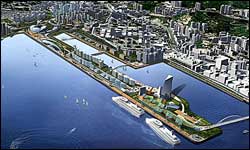 The Kai Tak city center plan is up
and running, with the amended outzoning plan getting the go-ahead from the Town
Planning Board. At the last board meeting in August, six amendments were added
to the plan, such as lowering building heights at the city center and along the
proposed nullah-turned river. The plan also incorporated a curved landscaped
elevated walkway linking the new area with Kowloon City and San Po Kong. Of the
six further representations on Friday, only one supported the plan. The Kai Tak city center plan is up
and running, with the amended outzoning plan getting the go-ahead from the Town
Planning Board. At the last board meeting in August, six amendments were added
to the plan, such as lowering building heights at the city center and along the
proposed nullah-turned river. The plan also incorporated a curved landscaped
elevated walkway linking the new area with Kowloon City and San Po Kong. Of the
six further representations on Friday, only one supported the plan.
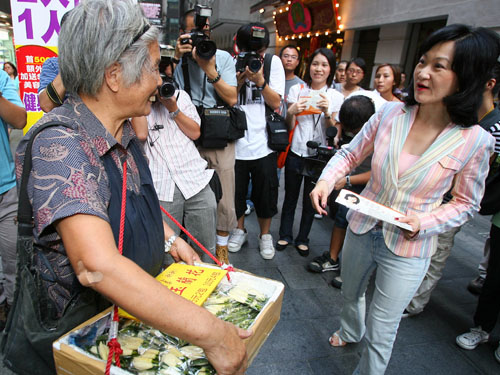 Regina Ip Lau Suk-yee's announcement that she would contest the Legislative
Council by-election had given her a "historic opportunity" to apologise for her
handling of national security legislation as secretary for security, one of her
advisers said yesterday. Had she decided not to contest the Hong Kong Island
poll on December 2, she would have issued her apology ahead of next year's full
Legco election, said the adviser, Gary Cheng Kai-nam. Pan-democrats have accused
Mrs Ip of apologising only in order to win votes. Speaking at a National Day
reception for Beijing loyalists, which Mrs Ip also attended, Mr Cheng, a former
legislator, said Mrs Ip had "gone through a long process" before making up her
mind to issue the apology. He praised her bravery in doing so. Fifteen months
ago, Mrs Ip said she saw no need to apologise for her tough talk in support of
the Article 23 legislation. But on Thursday, she said she was ashamed of her
provocative remarks about the bill, which was shelved days after half a million
people marched in protest on July 1, 2003. She had suggested some of the
marchers had taken to the streets because they had nothing better to do, and had
earlier offered the election of Adolf Hitler as evidence that democracy was no
panacea. Mrs Ip resigned days after the march.
Regina Ip Lau Suk-yee's announcement that she would contest the Legislative
Council by-election had given her a "historic opportunity" to apologise for her
handling of national security legislation as secretary for security, one of her
advisers said yesterday. Had she decided not to contest the Hong Kong Island
poll on December 2, she would have issued her apology ahead of next year's full
Legco election, said the adviser, Gary Cheng Kai-nam. Pan-democrats have accused
Mrs Ip of apologising only in order to win votes. Speaking at a National Day
reception for Beijing loyalists, which Mrs Ip also attended, Mr Cheng, a former
legislator, said Mrs Ip had "gone through a long process" before making up her
mind to issue the apology. He praised her bravery in doing so. Fifteen months
ago, Mrs Ip said she saw no need to apologise for her tough talk in support of
the Article 23 legislation. But on Thursday, she said she was ashamed of her
provocative remarks about the bill, which was shelved days after half a million
people marched in protest on July 1, 2003. She had suggested some of the
marchers had taken to the streets because they had nothing better to do, and had
earlier offered the election of Adolf Hitler as evidence that democracy was no
panacea. Mrs Ip resigned days after the march.
The new hangar of the Hong Kong
Aircraft Engineering Company would allow more large aircraft to land in the
territory, Secretary for Transport and Housing Eva Cheng Yu-wah said on Friday.
She was speaking at the ground-breaking ceremony for Hangar 3 of Haeco (SEHK:
0044) – an aircraft maintenance subsidiary of the Swire Group (SEHK: 0019) –
which also owns Cathay Pacific Airways (SEHK: 0293), Hong Kong’s leading
carrier. Ms Cheng said: “This HK$670 million facility, when completed in 2009,
will allow three additional wide-body aircraft to be serviced at the same time,
expanding Haeco maintenance capacity by one-third. She said the investment
showed Haeco’s confidence in the future development of Hong Kong as a premier
aviation hub. Ms Cheng noted that the government, through the Airport Authority,
provided infrastructure at the airport. But ultimately route development
decisions were made by airlines, she explained.
 China:
More than 100 US multinationals, including big names such as Boeing, Microsoft
and General Motors, urged the US Congress to reject protectionist legislation
against China.
China:
More than 100 US multinationals, including big names such as Boeing, Microsoft
and General Motors, urged the US Congress to reject protectionist legislation
against China.
Initial public offerings (IPO) in
China's stock markets recorded a total capital of almost 150 billion yuan (20.0
billion U.S. dollars) in September alone, according to Friday's China Securities
News. A total of 15 new shares were added to the list this month, raising
approximately 150 billion yuan in A-share blue chips such as China Construction
Bank (CCB) and China Shenhua Energy. Before September, Industrial and Commercial
Bank of China held the record, having raised 46.64 billion yuan (6.21 billion
dollars) from its IPO. However, CCB, the nation's second largest State-owned
commercial lender, raised a record-breaking 58 billion yuan (7.7 billion
dollars) for domestic IPOs Tuesday this week. Directly following, China Shenhua,
the largest Chinese coal producer, upped the record to 66.58 billion yuan (8.9
billion dollars) from its Shanghai IPO. The September IPO accounted for half of
funds raised in IPOs since the beginning of this year, and also exceeded the
annual IPOs before 2006. Meanwhile, the upper limit of Shenhua's IPO price
posted 36.99 yuan per share, breaking the previous record of UFIDA Software Co
Ltd's offering price at 36.68 yuan.
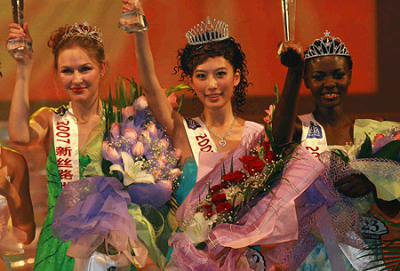 Chinese Wang Yili (C), first place winner, reacts with the runners up Mirash
Davis from Ghana (R) and Kristine Kek from Sweden at the 2007 New Silk Road
World Models Contest Finals in Wuxi, a tourist city in east China Jiangsu
Province Sept. 27, 2007. Some 50 models from across the world took part in the
pageant on Thursday.
Chinese Wang Yili (C), first place winner, reacts with the runners up Mirash
Davis from Ghana (R) and Kristine Kek from Sweden at the 2007 New Silk Road
World Models Contest Finals in Wuxi, a tourist city in east China Jiangsu
Province Sept. 27, 2007. Some 50 models from across the world took part in the
pageant on Thursday.
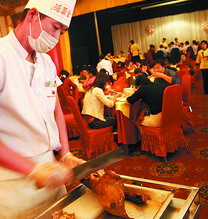 A chef slices roast
duck at a Quanjude restaurant. Shares of the famous catering company is likely
to be sold at 10 to 12 yuan if its IPO gets approval, analysts said. A chef slices roast
duck at a Quanjude restaurant. Shares of the famous catering company is likely
to be sold at 10 to 12 yuan if its IPO gets approval, analysts said.
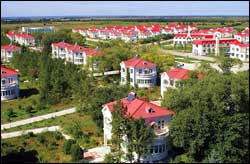 Beijing has
announced fresh measures to tighten credit for developers as well as buyers of
second homes after previous efforts to cool speculation proved to be in vain.
Developers found hoarding land or holding back flats would be banned from
receiving loans, the People's Bank and China Banking Regulatory Commission said
in a joint notice on Friday. Mortgages for second homes and flats for commercial
use will be charged 1.1 times the benchmark lending rates, currently at 7.29
percent for one-year loans and 7.83 percent for five years. As well, lenders
will be obliged to raise downpayment requirements to at least 40 percent for
those who intend to buy a second flat, and 50 percent for commercial-use units.
The moves are aimed at boosting inventory by pushing developers to start
construction soon after buying sites, Michael Choi Ngai-min, chairman of
mainland property agent and consultant, Land Power International, said. "The
measures will dampen interest among speculators as well as investors, but only
for awhile. The problem is the housing supply in city areas far lags the rising
demand due to urbanization," Choi said. Beijing has
announced fresh measures to tighten credit for developers as well as buyers of
second homes after previous efforts to cool speculation proved to be in vain.
Developers found hoarding land or holding back flats would be banned from
receiving loans, the People's Bank and China Banking Regulatory Commission said
in a joint notice on Friday. Mortgages for second homes and flats for commercial
use will be charged 1.1 times the benchmark lending rates, currently at 7.29
percent for one-year loans and 7.83 percent for five years. As well, lenders
will be obliged to raise downpayment requirements to at least 40 percent for
those who intend to buy a second flat, and 50 percent for commercial-use units.
The moves are aimed at boosting inventory by pushing developers to start
construction soon after buying sites, Michael Choi Ngai-min, chairman of
mainland property agent and consultant, Land Power International, said. "The
measures will dampen interest among speculators as well as investors, but only
for awhile. The problem is the housing supply in city areas far lags the rising
demand due to urbanization," Choi said.
 Two Chinese warships, the guided-missile destroyer Harbin and supply ship
Hongzehu, have arrived in Sydney ahead of the first joint military exercises
between Australia and China. Australian Defence Minister Brendan Nelson said
next week's exercises involving the Australian, Chinese and New Zealand navies
signalled closer military co-operation between Beijing and Canberra. "At this
stage, I would expect that primarily we would be looking at naval exercises but
we will also be having discussions between our air force and obviously our
army," Dr Nelson said. "Some of those discussions have already commenced." While
the United States has expressed concerns about China's increasing military
muscle, Dr Nelson said the joint exercises showed Beijing recognised it needed
to be open and transparent about its growing capability.
Two Chinese warships, the guided-missile destroyer Harbin and supply ship
Hongzehu, have arrived in Sydney ahead of the first joint military exercises
between Australia and China. Australian Defence Minister Brendan Nelson said
next week's exercises involving the Australian, Chinese and New Zealand navies
signalled closer military co-operation between Beijing and Canberra. "At this
stage, I would expect that primarily we would be looking at naval exercises but
we will also be having discussions between our air force and obviously our
army," Dr Nelson said. "Some of those discussions have already commenced." While
the United States has expressed concerns about China's increasing military
muscle, Dr Nelson said the joint exercises showed Beijing recognised it needed
to be open and transparent about its growing capability.

*News information are obtained via various
sources deemed reliable, but not guaranteed

|
![]()
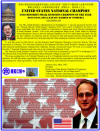 USA Small Business Administration (SBA)
Selected Johnson Choi/HKCHcc
2008 United States
National Champion
USA Small Business Administration (SBA)
Selected Johnson Choi/HKCHcc
2008 United States
National Champion![]()
![]() and follow us
on
and follow us
on
![]()

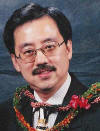
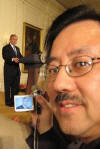
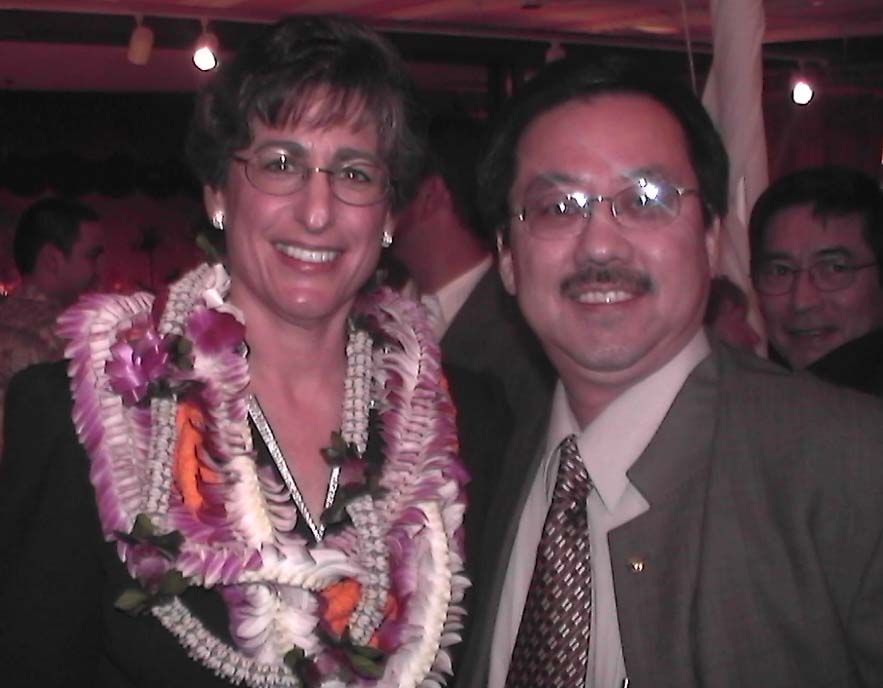
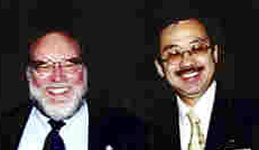
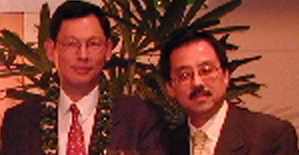
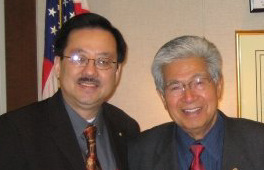


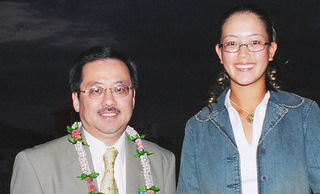
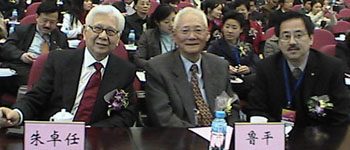
















 Photo taken on October 29, 2007 shows
the champion Grace Cheung Ka Ying (C) from Hong Kong, runner-up Choi Ju Hee (R)
from South Korea and the second runner-up, Hubei girl Sun Chen of the Miss Asia
2007 Competition which was held in Hong Kong.
Photo taken on October 29, 2007 shows
the champion Grace Cheung Ka Ying (C) from Hong Kong, runner-up Choi Ju Hee (R)
from South Korea and the second runner-up, Hubei girl Sun Chen of the Miss Asia
2007 Competition which was held in Hong Kong.
 Shares in Golden Harvest, one of the best
known names in the Hong Kong film biz, were suspended from trading Friday.
Announcement to the Hong Kong Stock Exchange said that the company had requested
the suspension "pending an announcement relating to the changes in the
substantial shareholder and the directors of the company which the board of the
company considers to be price sensitive information." Move is understood to mean
that veteran chairman Raymond Chow Ting-hsing is planning to sell his shares in
the company he co-founded in 1970. Chow and his associates own 24% of the
company, which became synonymous with Cantonese-language action movies and the
discovery of Bruce Lee. In recent years, the company quit production to focus
almost exclusively on exhibition and distribution. Stock market insiders point
to Chinese production shingle and talent agency Chengtian, as the buyer of a 20%
Golden Harvest stake. Japanese music, talent and film giant Avex has a 20%
interest in Chengtian. Suspension comes only a week after Golden Harvest
announced good-looking results that were boosted by exceptional gains from asset
disposals. For the year to June 2007, company announced net profits of $96.5
million ($12.5 million), compared with only $673,000 in 2006. But total included
a $15 million boost from the sale of its stake in the Golden Village cinema
circuit in Malaysia. Operating losses from Golden Harvest's distribution and
exhibition increased despite revenue gains in both divisions and finance costs
soared. In its recent results statement, management said that the company is
being refocused to concentrate on the Chinese exhibition market and that it is
expanding its digital screen advertising business into the mainland's key city
markets. It will also be stepping up acquisition of non-Chinese movies for
distribution. Chow aside, Golden Harvest's other substantial shareholders
include billionaire Li Ka-shing with 17%, EMI and Norman Cheng Tung-hon with 12%
and Jackie Chan with 5%.
Shares in Golden Harvest, one of the best
known names in the Hong Kong film biz, were suspended from trading Friday.
Announcement to the Hong Kong Stock Exchange said that the company had requested
the suspension "pending an announcement relating to the changes in the
substantial shareholder and the directors of the company which the board of the
company considers to be price sensitive information." Move is understood to mean
that veteran chairman Raymond Chow Ting-hsing is planning to sell his shares in
the company he co-founded in 1970. Chow and his associates own 24% of the
company, which became synonymous with Cantonese-language action movies and the
discovery of Bruce Lee. In recent years, the company quit production to focus
almost exclusively on exhibition and distribution. Stock market insiders point
to Chinese production shingle and talent agency Chengtian, as the buyer of a 20%
Golden Harvest stake. Japanese music, talent and film giant Avex has a 20%
interest in Chengtian. Suspension comes only a week after Golden Harvest
announced good-looking results that were boosted by exceptional gains from asset
disposals. For the year to June 2007, company announced net profits of $96.5
million ($12.5 million), compared with only $673,000 in 2006. But total included
a $15 million boost from the sale of its stake in the Golden Village cinema
circuit in Malaysia. Operating losses from Golden Harvest's distribution and
exhibition increased despite revenue gains in both divisions and finance costs
soared. In its recent results statement, management said that the company is
being refocused to concentrate on the Chinese exhibition market and that it is
expanding its digital screen advertising business into the mainland's key city
markets. It will also be stepping up acquisition of non-Chinese movies for
distribution. Chow aside, Golden Harvest's other substantial shareholders
include billionaire Li Ka-shing with 17%, EMI and Norman Cheng Tung-hon with 12%
and Jackie Chan with 5%.
 "The Home Song Stories" by Australian scripter-helmer Tony Ayres won the
Halekulani Golden Orchid for best feature at the 27th Hawaii Intl. Film
Festival. Awards were announced Thursday. An autobiographical drama based on
Ayres' difficult childhood migration to Australia, pic stars Joan Chen who also
received the fest's Achievement in Acting award. Feature documentary award was
presented to Hawaii-based co-helmers Don King and Julianne King for "Beautiful
Son," a chronicle of their efforts to help their autistic child. The Network for
the Promotion of Asian Cinema award was taken home by Stepane Gauger's verite-style
"Owl and the Sparrow," a Vietnam-U.S. co-production in which a young orphan
escapes to Ho Chi Minh City and is befriended by a zookeeper and an airline
stewardess. Pic previously won trophies at the Los Angeles and Heartland film
fests.
"The Home Song Stories" by Australian scripter-helmer Tony Ayres won the
Halekulani Golden Orchid for best feature at the 27th Hawaii Intl. Film
Festival. Awards were announced Thursday. An autobiographical drama based on
Ayres' difficult childhood migration to Australia, pic stars Joan Chen who also
received the fest's Achievement in Acting award. Feature documentary award was
presented to Hawaii-based co-helmers Don King and Julianne King for "Beautiful
Son," a chronicle of their efforts to help their autistic child. The Network for
the Promotion of Asian Cinema award was taken home by Stepane Gauger's verite-style
"Owl and the Sparrow," a Vietnam-U.S. co-production in which a young orphan
escapes to Ho Chi Minh City and is befriended by a zookeeper and an airline
stewardess. Pic previously won trophies at the Los Angeles and Heartland film
fests.
 A
mainland salesman became the king of baccarat yesterday when he won HK$15
million in a Macau gaming competition. Yan Jun, a Hubeinese who often visits
Macau, beat eight other contestants in the last round of competition, which
distributed a record HK$20 million in prize money. Five of the contestants were
from China, with the others from Hong Kong, Macau, the United States and
Holland. The Hong Kong participant, Edward Ng Wing Biu, came fourth. Yan's
winning tip is to bet boldly. "If your bet is not big enough, you cannot win."
He added:"I go to Macau quite often, and usually bet about several thousand
[Macau] dollars to more than a hundred thousand each time." Yan, who is a
salesman in the mainland, won HK$470,000 in the baccarat competition himself.
Players had HK$100,000 as principal for the final session, of which HK$50,000
was self funded and HK$50,000 provided by the organizer.
A
mainland salesman became the king of baccarat yesterday when he won HK$15
million in a Macau gaming competition. Yan Jun, a Hubeinese who often visits
Macau, beat eight other contestants in the last round of competition, which
distributed a record HK$20 million in prize money. Five of the contestants were
from China, with the others from Hong Kong, Macau, the United States and
Holland. The Hong Kong participant, Edward Ng Wing Biu, came fourth. Yan's
winning tip is to bet boldly. "If your bet is not big enough, you cannot win."
He added:"I go to Macau quite often, and usually bet about several thousand
[Macau] dollars to more than a hundred thousand each time." Yan, who is a
salesman in the mainland, won HK$470,000 in the baccarat competition himself.
Players had HK$100,000 as principal for the final session, of which HK$50,000
was self funded and HK$50,000 provided by the organizer. Real estate fund manager ARA Asset
Management, in which Cheung Kong Holdings (0001) has a 30-percent indirect
interest, said the institutional tranche of its public offering was about 30
times oversubscribed. It is set to list on the main board of Singapore on
Friday. Of the 205.2 million shares offered, 181.9 million will be for
institutional subscription, while 15 million are for retail investors. The
remaining 8.3 million will be reserved for management of ARA and related
companies. If necessary, underwriters Credit Suisse and DBS can exercise the
over- allotment option of issuing an additional 36 million shares. Market
sources said buyers from Dubai, Kuwait and Abu Dhabi have subscribed to the
issue. The 205.2 million shares issued, comprised of 73 million new shares and
132.2 million existing shares, will be sold at S$1.15 (HK$6.12) each, raising
S$235.98 million.
Real estate fund manager ARA Asset
Management, in which Cheung Kong Holdings (0001) has a 30-percent indirect
interest, said the institutional tranche of its public offering was about 30
times oversubscribed. It is set to list on the main board of Singapore on
Friday. Of the 205.2 million shares offered, 181.9 million will be for
institutional subscription, while 15 million are for retail investors. The
remaining 8.3 million will be reserved for management of ARA and related
companies. If necessary, underwriters Credit Suisse and DBS can exercise the
over- allotment option of issuing an additional 36 million shares. Market
sources said buyers from Dubai, Kuwait and Abu Dhabi have subscribed to the
issue. The 205.2 million shares issued, comprised of 73 million new shares and
132.2 million existing shares, will be sold at S$1.15 (HK$6.12) each, raising
S$235.98 million. China:
China's Renminbi (RMB) broke the 7.48 mark to reach a new central parity rate of
7.4718 yuan to one U.S. dollar on Monday, according to the Chinese Foreign
Exchange Trading System.
China:
China's Renminbi (RMB) broke the 7.48 mark to reach a new central parity rate of
7.4718 yuan to one U.S. dollar on Monday, according to the Chinese Foreign
Exchange Trading System.
 "The Western Trunk Line," a Chinese movie telling a story in a remote town at
the end of 1970s, won Special Jury Prize at the 20th Tokyo International Film
Festival on Sunday. "I have been thinking to make such a move since 1994," said
director Li Jixian at the awarding ceremony at Shibuya's Bunkamura, Tokyo. "I
met quite some challenges in making screenplay, but I never thought of
quitting."
"The Western Trunk Line," a Chinese movie telling a story in a remote town at
the end of 1970s, won Special Jury Prize at the 20th Tokyo International Film
Festival on Sunday. "I have been thinking to make such a move since 1994," said
director Li Jixian at the awarding ceremony at Shibuya's Bunkamura, Tokyo. "I
met quite some challenges in making screenplay, but I never thought of
quitting." The roof of the
main building of the third-phase construction project in Guomao, or China World
Trade Center, a major business area in Chaoyang District, Beijing, has been
capped on Monday November 29, 2007. The 330-meter-high building, with 74 storeys
on the ground and 4 underground, is expected to become the highest in the
Chinese capital city upon completion in 2009
The roof of the
main building of the third-phase construction project in Guomao, or China World
Trade Center, a major business area in Chaoyang District, Beijing, has been
capped on Monday November 29, 2007. The 330-meter-high building, with 74 storeys
on the ground and 4 underground, is expected to become the highest in the
Chinese capital city upon completion in 2009 Photo taken on October
29, 2007 shows the second runner-up of Miss Asia 2007 Competition, Sun Chen (C),
from Central China's Hubei Province.
Photo taken on October
29, 2007 shows the second runner-up of Miss Asia 2007 Competition, Sun Chen (C),
from Central China's Hubei Province. Former France's
women's soccer team coach Elisabeth Loisel meets the press at the news
conference to announce her appointment to coach China's women's team in Beijing
October 28, 2007. China's former coach Marika Domanski-Lyfors from Sweden
quitted last week after China's quarter-final elimination at last month's
Women's World Cup.
Former France's
women's soccer team coach Elisabeth Loisel meets the press at the news
conference to announce her appointment to coach China's women's team in Beijing
October 28, 2007. China's former coach Marika Domanski-Lyfors from Sweden
quitted last week after China's quarter-final elimination at last month's
Women's World Cup.  China Shenhua has been added to the Hang
Seng China AH Index Series which comprises the largest and most liquid Chinese
mainland companies with both A-share and H-share listings.
China Shenhua has been added to the Hang
Seng China AH Index Series which comprises the largest and most liquid Chinese
mainland companies with both A-share and H-share listings. A senior banking
executive has called on the Hong Kong government to begin discussions on
changing the currency peg that has lasted more than two decades. HSBC (0005)
executive director Peter Wong Tung-shun told The Standard the yuan is on course
to become a freely convertible currency within 10 years. "As the Chinese economy
develops at a faster pace than before, that widens the difference between Hong
Kong and the US economy," Wong said. His comments come nearly two weeks after
President Hu Jintao told the Communist Party Congress that the mainland will
improve the yuan exchange rate regime and gradually make the currency
convertible under the capital account. Wong believes the Hong Kong dollar should
be linked to a currency which better reflects the city's economic reality.
"Don't ask me when the delinkage should take place. I can only say, when you see
the yuan becoming a freely convertible currency, then it's time for change,"
Wong suggested. "The right thing should be done at the right time." Earlier this
year, the yuan strengthened against the Hong Kong dollar for the first time in
13 years, reigniting a debate whether the time has come to scrap the 23-year-old
US-dollar peg. The yuan gained to 1.0004 per Hong Kong dollar and also climbed
to 7.7949 to the US dollar in Shanghai trading in early January. The Hong Kong
Monetary Authority said at the time, there is "no intention to change the linked
exchange rate system." The Hong Kong dollar is pegged at 7.8 to the greenback
and is allowed to trade between 7.75 and 7.85.
A senior banking
executive has called on the Hong Kong government to begin discussions on
changing the currency peg that has lasted more than two decades. HSBC (0005)
executive director Peter Wong Tung-shun told The Standard the yuan is on course
to become a freely convertible currency within 10 years. "As the Chinese economy
develops at a faster pace than before, that widens the difference between Hong
Kong and the US economy," Wong said. His comments come nearly two weeks after
President Hu Jintao told the Communist Party Congress that the mainland will
improve the yuan exchange rate regime and gradually make the currency
convertible under the capital account. Wong believes the Hong Kong dollar should
be linked to a currency which better reflects the city's economic reality.
"Don't ask me when the delinkage should take place. I can only say, when you see
the yuan becoming a freely convertible currency, then it's time for change,"
Wong suggested. "The right thing should be done at the right time." Earlier this
year, the yuan strengthened against the Hong Kong dollar for the first time in
13 years, reigniting a debate whether the time has come to scrap the 23-year-old
US-dollar peg. The yuan gained to 1.0004 per Hong Kong dollar and also climbed
to 7.7949 to the US dollar in Shanghai trading in early January. The Hong Kong
Monetary Authority said at the time, there is "no intention to change the linked
exchange rate system." The Hong Kong dollar is pegged at 7.8 to the greenback
and is allowed to trade between 7.75 and 7.85. Rising political star Xi Jinping has been
named to head the 18-strong working group overseeing Hong Kong and Macau affairs
as well as state vice- president, The Standard has learned. Xi's appointment
follows his promotion to the elite Politiburo Standing Committee earlier this
week at the close of the 17th Chinese Communist Party national congress. He will
succeed retiring Vice President Zeng Qinghong, who was dropped from both the
party Central Committee and the Politburo Standing Committee. Sources in Beijing
have confirmed that Xi, 54, who is also Shanghai party chief and the eldest son
of Xi Zhongxun - a former revolutionary and former vice-premier who helped
pioneer China's special economic zones - was given the new posts after intensive
closed-door discussions. Liao Hui - a vice-chairman of the Chinese People's
Political Consultative Conference and incumbent director of the Hong Kong and
Macao Affairs Office - will stay on as deputy head of the working group
responsible for Hong Kong affairs. Chen Zuo'er, vice director of the Hong Kong
and Macao Affairs Office, will retire before March next year. Another key
appointment concerning Hong Kong is that of Peng Qinghua, who was elected party
chief for the HKSAR three months ago. He will succeed the retiring Gao Siren as
director of the Central Government's Liaison Office in Hong Kong. Besides Xi,
two other new faces in the nine-member Politburo Standing Committee - Li Keqiang
and He Guoqiang - have been allocated new portfolios. Li, 52, who ranks seventh
in the Standing Committee who is also Liaoning party boss, will replace the late
Huang Ju in overseeing the country's economic, financial and energy policies as
a vice premier. He Guoqiang will take over from retiring Wu Gangzheng as head of
the Central Commission for Disciplined Actions, while Jiangsu party chief Li
Yuanchao, 57, will succeed He as head of the Organization Department, according
to Xinhua news agency. Li's post as Liaoning provincial chief has gone to
62-year-old Jiangsu provincial governor Liang Baohua. Jiangsu party chief Meng
Jianzhu has been tipped to replace new Standing Committee member Zhou Yongkang
as public security minister. His appointment is expected to be approved by the
National People's Congress Standing Committee on Sunday. Wang Shaoguang, chair
professor at the Chinese University of Hong Kong's department of government and
public administration, said the new leadership lineup of Xi and Li has ensured a
stable succession at the top in the next 15 years. "The leadership succession
problem over the next 15 years has now been more or less resolved, as whoever
wins the contest for the top job in 2012 - Xi or Li - will probably serve
another 10 more years, and thus party policies will be entrenched," Wang said.
Rising political star Xi Jinping has been
named to head the 18-strong working group overseeing Hong Kong and Macau affairs
as well as state vice- president, The Standard has learned. Xi's appointment
follows his promotion to the elite Politiburo Standing Committee earlier this
week at the close of the 17th Chinese Communist Party national congress. He will
succeed retiring Vice President Zeng Qinghong, who was dropped from both the
party Central Committee and the Politburo Standing Committee. Sources in Beijing
have confirmed that Xi, 54, who is also Shanghai party chief and the eldest son
of Xi Zhongxun - a former revolutionary and former vice-premier who helped
pioneer China's special economic zones - was given the new posts after intensive
closed-door discussions. Liao Hui - a vice-chairman of the Chinese People's
Political Consultative Conference and incumbent director of the Hong Kong and
Macao Affairs Office - will stay on as deputy head of the working group
responsible for Hong Kong affairs. Chen Zuo'er, vice director of the Hong Kong
and Macao Affairs Office, will retire before March next year. Another key
appointment concerning Hong Kong is that of Peng Qinghua, who was elected party
chief for the HKSAR three months ago. He will succeed the retiring Gao Siren as
director of the Central Government's Liaison Office in Hong Kong. Besides Xi,
two other new faces in the nine-member Politburo Standing Committee - Li Keqiang
and He Guoqiang - have been allocated new portfolios. Li, 52, who ranks seventh
in the Standing Committee who is also Liaoning party boss, will replace the late
Huang Ju in overseeing the country's economic, financial and energy policies as
a vice premier. He Guoqiang will take over from retiring Wu Gangzheng as head of
the Central Commission for Disciplined Actions, while Jiangsu party chief Li
Yuanchao, 57, will succeed He as head of the Organization Department, according
to Xinhua news agency. Li's post as Liaoning provincial chief has gone to
62-year-old Jiangsu provincial governor Liang Baohua. Jiangsu party chief Meng
Jianzhu has been tipped to replace new Standing Committee member Zhou Yongkang
as public security minister. His appointment is expected to be approved by the
National People's Congress Standing Committee on Sunday. Wang Shaoguang, chair
professor at the Chinese University of Hong Kong's department of government and
public administration, said the new leadership lineup of Xi and Li has ensured a
stable succession at the top in the next 15 years. "The leadership succession
problem over the next 15 years has now been more or less resolved, as whoever
wins the contest for the top job in 2012 - Xi or Li - will probably serve
another 10 more years, and thus party policies will be entrenched," Wang said.
 In a move seen as damage control, the Democratic Party has
decided to publish an announcement in newspapers on Saturday, setting out its
position on Martin Lee Chu-ming's recent article, including the party's support
for Beijing hosting next year's Olympic Games. It is not an apology, but a clear
declaration of what we stand for," said chairman Albert Ho Chun-yan. "We are of
the same mind as Lee," Ho said, adding that the party plans to spell out its
position on the Games and the mainland human rights situation. The party's
position on the issues is essentially the same as Lee's, but "some of the
wording [in Lee's Wall Street Journal article] will be avoided in order to avoid
further misunderstanding." Chief Secretary for Administration Henry Tang
Ying-yen was the latest to join the controversy, saying "the Olympics should not
be politicized." Lee reiterated there was nothing in his article urging the Bush
administration or other countries to boycott the Games. "Even the Foreign
Ministry did not specify my name when it said those who try to pressure China
with the help of external forces is bound to fail," he said. But Tsang Hin-chi,
a National People's Congress Standing Committee member, said in Beijing that
Lee's "bad behavior has never changed." Tsang added: "Is he blind, mute or deaf?
How is it he cannot see the progress that China has made in recent years? He
asked foreign countries to impose sanctions on China. Isn't that what only
traitors will do?" Pro-Beijing lawmakers on Friday also continued with their
attack on Lee.
In a move seen as damage control, the Democratic Party has
decided to publish an announcement in newspapers on Saturday, setting out its
position on Martin Lee Chu-ming's recent article, including the party's support
for Beijing hosting next year's Olympic Games. It is not an apology, but a clear
declaration of what we stand for," said chairman Albert Ho Chun-yan. "We are of
the same mind as Lee," Ho said, adding that the party plans to spell out its
position on the Games and the mainland human rights situation. The party's
position on the issues is essentially the same as Lee's, but "some of the
wording [in Lee's Wall Street Journal article] will be avoided in order to avoid
further misunderstanding." Chief Secretary for Administration Henry Tang
Ying-yen was the latest to join the controversy, saying "the Olympics should not
be politicized." Lee reiterated there was nothing in his article urging the Bush
administration or other countries to boycott the Games. "Even the Foreign
Ministry did not specify my name when it said those who try to pressure China
with the help of external forces is bound to fail," he said. But Tsang Hin-chi,
a National People's Congress Standing Committee member, said in Beijing that
Lee's "bad behavior has never changed." Tsang added: "Is he blind, mute or deaf?
How is it he cannot see the progress that China has made in recent years? He
asked foreign countries to impose sanctions on China. Isn't that what only
traitors will do?" Pro-Beijing lawmakers on Friday also continued with their
attack on Lee. Buddhists attend a lighting ceremony
for the lying Buddha statue of Shuanglin rock cave in Xinchang county of east
China’s Zhejiang Province, Oct. 27, 2007.
Buddhists attend a lighting ceremony
for the lying Buddha statue of Shuanglin rock cave in Xinchang county of east
China’s Zhejiang Province, Oct. 27, 2007. Taiwan actor
Zhang Zhen (R) and actress Hsu Chi walk on the red carpet at the16th China
Golden Rooster and Hundred Flowers Film Festival in Suzhou of eastern China’s
Jiangsu Province October 27, 2007.
Taiwan actor
Zhang Zhen (R) and actress Hsu Chi walk on the red carpet at the16th China
Golden Rooster and Hundred Flowers Film Festival in Suzhou of eastern China’s
Jiangsu Province October 27, 2007.  Chinese actress Yuan
Quan poses on the red carpet at the 16th China Golden Rooster and Hundred
Flowers Film Festival in Suzhou of eastern China’s Jiangsu Province October 27,
2007.
Chinese actress Yuan
Quan poses on the red carpet at the 16th China Golden Rooster and Hundred
Flowers Film Festival in Suzhou of eastern China’s Jiangsu Province October 27,
2007. Hong Kong
actor Tony Leung (R) and actress Liu Jialing walk on the red carpet at the 16th
China Golden Rooster and Hundred Flowers Film Festival in Suzhou of eastern
China’s Jiangsu Province October 27, 2007.
Hong Kong
actor Tony Leung (R) and actress Liu Jialing walk on the red carpet at the 16th
China Golden Rooster and Hundred Flowers Film Festival in Suzhou of eastern
China’s Jiangsu Province October 27, 2007. Hong Kong
actor Jet Li (L) and China’s mainland actress Li Bingbing pose together on the
red carpet at the 16th China Golden Rooster and Hundred Flowers Film Festival in
Suzhou of eastern China’s Jiangsu Province October 27, 2007.
Hong Kong
actor Jet Li (L) and China’s mainland actress Li Bingbing pose together on the
red carpet at the 16th China Golden Rooster and Hundred Flowers Film Festival in
Suzhou of eastern China’s Jiangsu Province October 27, 2007. Chinese President Hu Jintao (R) meets with Indian Congress Party President Sonia
Gandhi (L) at the Great Hall of the People in Beijing, capital of China on Oct.
26, 2007. China and India voiced their commitment to handle bilateral relations
at a strategic level and step up the partnership to a higher level.
Chinese President Hu Jintao (R) meets with Indian Congress Party President Sonia
Gandhi (L) at the Great Hall of the People in Beijing, capital of China on Oct.
26, 2007. China and India voiced their commitment to handle bilateral relations
at a strategic level and step up the partnership to a higher level. Local residents view the
2008-meter-long dragon in Shuangfeng township of Taicang city, east China's
Jiangsu Province, Oct. 26, 2007. The dragon dance performance held in the town
to greet the Beijing 2008 Olympic games attracted many local residents on
Friday, during which a giant dragon waved by 1010 people was the most
remarkable.
Local residents view the
2008-meter-long dragon in Shuangfeng township of Taicang city, east China's
Jiangsu Province, Oct. 26, 2007. The dragon dance performance held in the town
to greet the Beijing 2008 Olympic games attracted many local residents on
Friday, during which a giant dragon waved by 1010 people was the most
remarkable. China Unicom Ltd, the nation's
second-biggest mobile-phone operator, more than doubled third-quarter profit,
beating analysts' estimates, by winning customers with reduced rates. Net income
rose to 2.98 billion yuan (398 million U.S. dollars) from 1.39 billion yuan a
year earlier.
China Unicom Ltd, the nation's
second-biggest mobile-phone operator, more than doubled third-quarter profit,
beating analysts' estimates, by winning customers with reduced rates. Net income
rose to 2.98 billion yuan (398 million U.S. dollars) from 1.39 billion yuan a
year earlier. Shen Guojun (first from right),
president of property developer China Yintai Holdings Ltd, and Chan Yue-kwong
(second from right), chairman of Hong Kong-based restaurant chain Cafe de Coral
Holdings Ltd, at a press conference in Beijing on Friday. Shen and Chan are two
of the 11 winners of the Ernst & Young Entrepreneurs of the Year China 2007
awards.
Shen Guojun (first from right),
president of property developer China Yintai Holdings Ltd, and Chan Yue-kwong
(second from right), chairman of Hong Kong-based restaurant chain Cafe de Coral
Holdings Ltd, at a press conference in Beijing on Friday. Shen and Chan are two
of the 11 winners of the Ernst & Young Entrepreneurs of the Year China 2007
awards. Hong Kong blue chips jumped 1.8 per cent on Friday, staying firmly above the key
30,000 level for the first time, with property stocks hitting records, stoked by
a weak US dollar and speculation of a rate cut by the Federal Reserve, which
meets next week. Conglomerate Hutchison Whampoa (SEHK: 0013) also rallied, as
investors bid up the underplayed stock to highs unseen since March 2001. Blue
chips hardly looked back after easily sailing past the key 30,000-point barrier
at the open. Investors switched into Hong Kong blue chips and out of mainland
plays amid expectations that the central government would raise interest rates
following strong macro data a day earlier. The benchmark Hang Seng Index closed
550.73 points higher at 30,405.22, setting an intraday high at 30,562.63 and
notching a 3.2 per cent gain for the week. The index of Hong Kong-listed
mainland companies shook off earlier losses as mainland-listed shares rebounded.
The index ended nearly unchanged at 19,548.49 to post a weekly 0.9 per cent
loss. Main-board turnover was HK$157.4 billion compared with Thursday’s HK$165.2
billion. As the US dollar weakened, the Hong Kong Monetary Authority sold HK$775
million worth of the local currency for US dollars to curb a strengthening Hong
Kong dollar. “The market has been very rotational,” said William Fong, fund
manager at Baring Asset Management. “When the US dollar depreciates, people look
for shelter in hard assets. China plays are having a consolidation but in the
near-term, I see strong liquidity coming from [the Qualified Domestic
Institutional Investor programme], so I’m not worried,” he said. Hutchison was
the day’s most traded stock after PetroChina (SEHK: 0857, announcements, news) ,
bolting nearly 6 per cent to HK$90.75. Property shares resumed their record run,
with the Hang Seng property sub-index rising 5 per cent to a peak for a second
straight day. Sino Land was the sector’s top gainer amid its recent land
acquisition spree, rallying nearly 17 per cent at one point in heavy trade
before settling at HK$24.65, up 12.6 per cent. Cheung Kong (SEHK: 0001) shot up
5.2 per cent to HK$145.5 and MTR, which will have the city’s largest land bank
pending its merger with KCRC, leapt 6.2 per cent to HK$25.75. ICBC (SEHK: 0349)
was a standout among mainland names, rising 2.1 per cent to HK$7.16 a day after
it reported a 76 per cent rise in third-quarter profit. The mainland’s top
lender also has agreed to buy 20 per cent of Standard Bank Group, South Africa’s
largest bank. Merrill Lynch raised its target price for ICBC shares to HK$8.40,
and JPMorgan raised its target price to HK$8.80. Hutchison Telecommunications
International (SEHK: 2332) tumbled 5.7 per cent to HK$10.66 after Orascom
Telecom Holding was selling up to 143.4 million shares in the emerging markets
telecom play at between HK$10.70 to HK$10.95, according to a term sheet seen by
Reuters. PetroChina shed 0.5 per cent to HK$19.02, a day after China’s top oil
producer set an indicative price range for its domestic IPO that was below
expectation.
Hong Kong blue chips jumped 1.8 per cent on Friday, staying firmly above the key
30,000 level for the first time, with property stocks hitting records, stoked by
a weak US dollar and speculation of a rate cut by the Federal Reserve, which
meets next week. Conglomerate Hutchison Whampoa (SEHK: 0013) also rallied, as
investors bid up the underplayed stock to highs unseen since March 2001. Blue
chips hardly looked back after easily sailing past the key 30,000-point barrier
at the open. Investors switched into Hong Kong blue chips and out of mainland
plays amid expectations that the central government would raise interest rates
following strong macro data a day earlier. The benchmark Hang Seng Index closed
550.73 points higher at 30,405.22, setting an intraday high at 30,562.63 and
notching a 3.2 per cent gain for the week. The index of Hong Kong-listed
mainland companies shook off earlier losses as mainland-listed shares rebounded.
The index ended nearly unchanged at 19,548.49 to post a weekly 0.9 per cent
loss. Main-board turnover was HK$157.4 billion compared with Thursday’s HK$165.2
billion. As the US dollar weakened, the Hong Kong Monetary Authority sold HK$775
million worth of the local currency for US dollars to curb a strengthening Hong
Kong dollar. “The market has been very rotational,” said William Fong, fund
manager at Baring Asset Management. “When the US dollar depreciates, people look
for shelter in hard assets. China plays are having a consolidation but in the
near-term, I see strong liquidity coming from [the Qualified Domestic
Institutional Investor programme], so I’m not worried,” he said. Hutchison was
the day’s most traded stock after PetroChina (SEHK: 0857, announcements, news) ,
bolting nearly 6 per cent to HK$90.75. Property shares resumed their record run,
with the Hang Seng property sub-index rising 5 per cent to a peak for a second
straight day. Sino Land was the sector’s top gainer amid its recent land
acquisition spree, rallying nearly 17 per cent at one point in heavy trade
before settling at HK$24.65, up 12.6 per cent. Cheung Kong (SEHK: 0001) shot up
5.2 per cent to HK$145.5 and MTR, which will have the city’s largest land bank
pending its merger with KCRC, leapt 6.2 per cent to HK$25.75. ICBC (SEHK: 0349)
was a standout among mainland names, rising 2.1 per cent to HK$7.16 a day after
it reported a 76 per cent rise in third-quarter profit. The mainland’s top
lender also has agreed to buy 20 per cent of Standard Bank Group, South Africa’s
largest bank. Merrill Lynch raised its target price for ICBC shares to HK$8.40,
and JPMorgan raised its target price to HK$8.80. Hutchison Telecommunications
International (SEHK: 2332) tumbled 5.7 per cent to HK$10.66 after Orascom
Telecom Holding was selling up to 143.4 million shares in the emerging markets
telecom play at between HK$10.70 to HK$10.95, according to a term sheet seen by
Reuters. PetroChina shed 0.5 per cent to HK$19.02, a day after China’s top oil
producer set an indicative price range for its domestic IPO that was below
expectation.  Taxi groups unite against discount ideas - A leading taxi group has mobilised
major taxi unions to speak out against proposals that could lead to the legal
discounting of fares. The Motor Transport Workers' General Union - the largest
of the 27 taxi associations in Hong Kong - insisted the only effective way to
combat illegal touting activities was to penalise passengers who bargain on
fares. The government released a pamphlet as part of a public consultation that
began on Monday, asking drivers and passengers if they would prefer to vary
fares, provided there was a ceiling. In one of the two suggested models - based
on overseas examples - the maximum fares would be set by the operators, and in
the other, the upper limits would be decided by the government, and the
operators would have to apply for permission to charge less. Both models forbid
drivers to offers further discounts. But the union's taxi director, To Sun-tong,
said that would not eliminate unfair competition by the so-called discount taxi
gangs. "You set the price lower, [the gangs] set it even lower, and in the end
it would only trigger a throat-cutting race among drivers for lower fares. The
trade would not be able to survive," he said. Mr To said if the government would
make it illegal for passengers to bargain, the whole problem would be settled.
It is now illegal for drivers to offer discounts. The union and its 22 allied
taxi associations would protest outside the headquarters of the Transport and
Housing Bureau in Central today. The trade had proposed various options that
would lower fares for long-haul trips, but they were voted down by the union and
its allies in a meeting with the Transport Department in July. Kwok Chi-piu,
chairman of an independent taxi driver union, said many groups who claim to be
victims of the discount taxi gangs were offering discounts themselves. "Drivers
who are snatching others' business by offering discounts, of course, hope the
practice would not be legalised, because they would then lose their edges," he
said. Hong Kong Taxi and Public Light Bus Association chairman Brandon Tong
Yeuk-fung said the proposals were not likely to be welcomed by taxi owners
either, because a reduction in fares may eventually lead to lower rental charges
for the taxi and thus push down the price of a taxi licence - which has remained
steady at about HK$3.5 million in the past few years.
Taxi groups unite against discount ideas - A leading taxi group has mobilised
major taxi unions to speak out against proposals that could lead to the legal
discounting of fares. The Motor Transport Workers' General Union - the largest
of the 27 taxi associations in Hong Kong - insisted the only effective way to
combat illegal touting activities was to penalise passengers who bargain on
fares. The government released a pamphlet as part of a public consultation that
began on Monday, asking drivers and passengers if they would prefer to vary
fares, provided there was a ceiling. In one of the two suggested models - based
on overseas examples - the maximum fares would be set by the operators, and in
the other, the upper limits would be decided by the government, and the
operators would have to apply for permission to charge less. Both models forbid
drivers to offers further discounts. But the union's taxi director, To Sun-tong,
said that would not eliminate unfair competition by the so-called discount taxi
gangs. "You set the price lower, [the gangs] set it even lower, and in the end
it would only trigger a throat-cutting race among drivers for lower fares. The
trade would not be able to survive," he said. Mr To said if the government would
make it illegal for passengers to bargain, the whole problem would be settled.
It is now illegal for drivers to offer discounts. The union and its 22 allied
taxi associations would protest outside the headquarters of the Transport and
Housing Bureau in Central today. The trade had proposed various options that
would lower fares for long-haul trips, but they were voted down by the union and
its allies in a meeting with the Transport Department in July. Kwok Chi-piu,
chairman of an independent taxi driver union, said many groups who claim to be
victims of the discount taxi gangs were offering discounts themselves. "Drivers
who are snatching others' business by offering discounts, of course, hope the
practice would not be legalised, because they would then lose their edges," he
said. Hong Kong Taxi and Public Light Bus Association chairman Brandon Tong
Yeuk-fung said the proposals were not likely to be welcomed by taxi owners
either, because a reduction in fares may eventually lead to lower rental charges
for the taxi and thus push down the price of a taxi licence - which has remained
steady at about HK$3.5 million in the past few years. Sales of China-made
autos expected to hit 8.5 mln in 2007 - Sales of China-made autos hit 6.46
million units in the first nine months this year, an increase of 24.5 percent
over the same period last year, China's auto industry association said on
Tuesday. During the period, output of domestic autos rose by 22.8 percent to
6.51 million units while the sales are expected to hit 8.5 million by the year
end, according to statistics released by the China Association of Automobile
Manufacturers. Of the total, sales of passenger vehicles hit 4.58 million units,
up 23.8 percent, and commercial vehicles reached 1.88 million units, up 26
percent. Followed by China FAW Group Corporation and Dongfeng Motor Corporation,
Shanghai Automotive Industry Corporation ranked first in sales volume, selling
1.13 million units. Meanwhile, sales of the top ten companies account for 83
percent of the total, according to the auto association.
Sales of China-made
autos expected to hit 8.5 mln in 2007 - Sales of China-made autos hit 6.46
million units in the first nine months this year, an increase of 24.5 percent
over the same period last year, China's auto industry association said on
Tuesday. During the period, output of domestic autos rose by 22.8 percent to
6.51 million units while the sales are expected to hit 8.5 million by the year
end, according to statistics released by the China Association of Automobile
Manufacturers. Of the total, sales of passenger vehicles hit 4.58 million units,
up 23.8 percent, and commercial vehicles reached 1.88 million units, up 26
percent. Followed by China FAW Group Corporation and Dongfeng Motor Corporation,
Shanghai Automotive Industry Corporation ranked first in sales volume, selling
1.13 million units. Meanwhile, sales of the top ten companies account for 83
percent of the total, according to the auto association. The
gold models and the silver models of the National Stadium, dubbed the "Bird’s
Nest," were unveiled in Beijing on October 24, 2007. The models are made of pure
gold and pure silver. There will be a limited number for sale. The commemorative
models are issued by China Gold Coin Incorporation and authorized by the Beijing
Organizing Committee.
The
gold models and the silver models of the National Stadium, dubbed the "Bird’s
Nest," were unveiled in Beijing on October 24, 2007. The models are made of pure
gold and pure silver. There will be a limited number for sale. The commemorative
models are issued by China Gold Coin Incorporation and authorized by the Beijing
Organizing Committee.  Housing prices in
70 large and medium-sized Chinese cities rose by 8.9 percent year-on-year in
September, the National Bureau of Statistics (NBS) said Friday. The rising trend
shows no sign of stopping, according to a report jointly released by the NBS and
the National Development and Reform Commission.
Housing prices in
70 large and medium-sized Chinese cities rose by 8.9 percent year-on-year in
September, the National Bureau of Statistics (NBS) said Friday. The rising trend
shows no sign of stopping, according to a report jointly released by the NBS and
the National Development and Reform Commission.  Heavy fog forced Airbus to cancel a
demonstration flight of its Airbus A380 over Beijing on Friday, as thousands of
passengers on regular air services were delayed.
Heavy fog forced Airbus to cancel a
demonstration flight of its Airbus A380 over Beijing on Friday, as thousands of
passengers on regular air services were delayed. Next year promises
to be the best for wage earners in a decade - with salaries projected to go up
by an average of more than 4 percent. The increases, however, still lag those in
the mainland, where workers can expect pay rises of between 7.4 and 8.5 percent
next year as a result of rapid economic development, according to a joint survey
conducted by the Hong Kong People Management Association and Hong Kong Baptist
University. The survey, which was carried out between June 2006 and June this
year, interviewed 95 local small and medium-sized companies employing more than
66,000 people. Sixty-two percent of the firms had 300 employees or fewer, while
nearly 18 percent had between 300 and 1,000 workers, and 20 percent had more
than 1,000 employees. The companies included those engaged in the construction,
food and beverage, retail, and sales and marketing sectors. According to the
poll, Hong Kong workers stand to receive pay adjustments averaging 4.3 to 4.7
percent next year. This compares with increases of between 2.9 and 3.6 percent
from July 2006 to June this year, with the retail and sales sectors recording
the biggest increases of about 7 percent. Association president Felix Yip
yesterday urged employers to offer generous pay increments for staff in order to
retain talent. "Civil servants have already been given pay rises this year, so
the private sector has to follow suit," he said.
Next year promises
to be the best for wage earners in a decade - with salaries projected to go up
by an average of more than 4 percent. The increases, however, still lag those in
the mainland, where workers can expect pay rises of between 7.4 and 8.5 percent
next year as a result of rapid economic development, according to a joint survey
conducted by the Hong Kong People Management Association and Hong Kong Baptist
University. The survey, which was carried out between June 2006 and June this
year, interviewed 95 local small and medium-sized companies employing more than
66,000 people. Sixty-two percent of the firms had 300 employees or fewer, while
nearly 18 percent had between 300 and 1,000 workers, and 20 percent had more
than 1,000 employees. The companies included those engaged in the construction,
food and beverage, retail, and sales and marketing sectors. According to the
poll, Hong Kong workers stand to receive pay adjustments averaging 4.3 to 4.7
percent next year. This compares with increases of between 2.9 and 3.6 percent
from July 2006 to June this year, with the retail and sales sectors recording
the biggest increases of about 7 percent. Association president Felix Yip
yesterday urged employers to offer generous pay increments for staff in order to
retain talent. "Civil servants have already been given pay rises this year, so
the private sector has to follow suit," he said. Casino and
resort developer Las Vegas Sands Corp has petitioned the Macau government to
lift a ban on the sale of serviced apartments at its Venetian Macao development
on the Cotai Strip. If it succeeds, it could trigger a flood of serviced
apartments on to the market. Under existing rules, land reclaimed in the Cotai
area is set aside for casino and hotel development - a policy aimed at
transforming Macau into the Las Vegas of Asia. Strata-title sales of apartments
in developments in the area are prohibited. If the United States entertainment
giant succeeds in persuading the Macau government to relax the rule and allow
such sales, an estimated 15,000 luxury serviced apartments in the Cotai Strip
could be put on the market over the next several years, according to agents.
Current proposals on the drawing boards of developers indicate plans to bring
about 30,000 hotel rooms to market in Cotai by 2010. But if the ban on the sale
of serviced apartments is lifted, some developers may decide to convert half of
those proposed hotel rooms into serviced apartments to cash in on the booming
residential market, agents say. Last month, units at One Grantai, the latest
luxury residential project launched by a local developer, at the northern end of
the Cotai Strip, were being sold for HK$8,700 per square foot, a record high in
Macau. Stephen Weaver, senior vice-president of Asian development at the
Venetian Macao, said the firm had proposed selling serviced apartments at its
US$2.4 billion resort to buyers who would only use them for short holiday
periods and rent them out when they were not there.
Casino and
resort developer Las Vegas Sands Corp has petitioned the Macau government to
lift a ban on the sale of serviced apartments at its Venetian Macao development
on the Cotai Strip. If it succeeds, it could trigger a flood of serviced
apartments on to the market. Under existing rules, land reclaimed in the Cotai
area is set aside for casino and hotel development - a policy aimed at
transforming Macau into the Las Vegas of Asia. Strata-title sales of apartments
in developments in the area are prohibited. If the United States entertainment
giant succeeds in persuading the Macau government to relax the rule and allow
such sales, an estimated 15,000 luxury serviced apartments in the Cotai Strip
could be put on the market over the next several years, according to agents.
Current proposals on the drawing boards of developers indicate plans to bring
about 30,000 hotel rooms to market in Cotai by 2010. But if the ban on the sale
of serviced apartments is lifted, some developers may decide to convert half of
those proposed hotel rooms into serviced apartments to cash in on the booming
residential market, agents say. Last month, units at One Grantai, the latest
luxury residential project launched by a local developer, at the northern end of
the Cotai Strip, were being sold for HK$8,700 per square foot, a record high in
Macau. Stephen Weaver, senior vice-president of Asian development at the
Venetian Macao, said the firm had proposed selling serviced apartments at its
US$2.4 billion resort to buyers who would only use them for short holiday
periods and rent them out when they were not there.  Workers unpack a
Rembrandt self-portrait from the Rijksmuseum in Amsterdam at the Shanghai Museum
yesterday. A three-month exhibition "Rembrandt and the Golden Age" will open the
museum from November 3.
Workers unpack a
Rembrandt self-portrait from the Rijksmuseum in Amsterdam at the Shanghai Museum
yesterday. A three-month exhibition "Rembrandt and the Golden Age" will open the
museum from November 3. Hong Kong monetary chief warns of uncertainties ahead - Hong Kong Monetary
Authority Chief Executive Joseph Yam said Thursday there were currently a lot of
uncertainties or even risks ahead in spite of impressive performance of the
global financial markets lately. "Investors should remain alert," Yam, who has
been heading the Monetary Authority -- virtually the special administrative
region's central bank -- since its establishment in 1993, wrote in a latest
article published on the institution's official website. The economic and
financial outlook for China's mainland and the United States stood out among the
uncertainties confronting "our economy and financial markets," he said. He said
the possibility of a recession in the United States could not be ruled out as
the American sub-prime crisis persists and tight credit conditions were
threatening to slow down the U.S. economy and lead to further downward pressure
on property prices. Yam noted the plans to encourage the orderly outflow of
capital from China's mainland had yet to be implemented while domestic savings
continued to accumulate. "The imbalance in the supply of and demand for
financial instruments other than bank deposits persists, leading to prices being
much higher than would otherwise be the case, and causing concerns about the
possibility of a stock market bubble," he said. The macro monetary conditions in
the mainland were causing considerable concerns and it was not clear how this
scenario might develop, he said, adding that the inevitable market adjustment,
if sharp and destabilizing, would have serious implications for monetary and
financial stability, for the mainland as well as Hong Kong. Yam said
developments in both the United States and China's mainland in the next few
months would be crucial. In the U.S. there was hope that normal money-market
conditions return shortly, limiting adverse impact on the economy and the
housing market there. "On the mainland there is hope for more concerted and
effective macro-economic adjustment measures. But there are structural issues in
the financial system that will need to be addressed to make it conducive to
promoting sustainable economic expansion." "Against this complex background we
in Hong Kong have to be cautious about our short-term economic prospects despite
the different and bullish signals our financial markets are sending us. Perhaps
there are factors that I have failed to see. Irrational exuberance or not,
investors should act with caution," he said.
Hong Kong monetary chief warns of uncertainties ahead - Hong Kong Monetary
Authority Chief Executive Joseph Yam said Thursday there were currently a lot of
uncertainties or even risks ahead in spite of impressive performance of the
global financial markets lately. "Investors should remain alert," Yam, who has
been heading the Monetary Authority -- virtually the special administrative
region's central bank -- since its establishment in 1993, wrote in a latest
article published on the institution's official website. The economic and
financial outlook for China's mainland and the United States stood out among the
uncertainties confronting "our economy and financial markets," he said. He said
the possibility of a recession in the United States could not be ruled out as
the American sub-prime crisis persists and tight credit conditions were
threatening to slow down the U.S. economy and lead to further downward pressure
on property prices. Yam noted the plans to encourage the orderly outflow of
capital from China's mainland had yet to be implemented while domestic savings
continued to accumulate. "The imbalance in the supply of and demand for
financial instruments other than bank deposits persists, leading to prices being
much higher than would otherwise be the case, and causing concerns about the
possibility of a stock market bubble," he said. The macro monetary conditions in
the mainland were causing considerable concerns and it was not clear how this
scenario might develop, he said, adding that the inevitable market adjustment,
if sharp and destabilizing, would have serious implications for monetary and
financial stability, for the mainland as well as Hong Kong. Yam said
developments in both the United States and China's mainland in the next few
months would be crucial. In the U.S. there was hope that normal money-market
conditions return shortly, limiting adverse impact on the economy and the
housing market there. "On the mainland there is hope for more concerted and
effective macro-economic adjustment measures. But there are structural issues in
the financial system that will need to be addressed to make it conducive to
promoting sustainable economic expansion." "Against this complex background we
in Hong Kong have to be cautious about our short-term economic prospects despite
the different and bullish signals our financial markets are sending us. Perhaps
there are factors that I have failed to see. Irrational exuberance or not,
investors should act with caution," he said. Hong Kong airport still world's premier
air cargo handler - Cargo throughput at Hong Kong International Airport in 2006
hit 3.58 million tons, representing an increase of 1.51 million tons, or 72.95
percent, compared with 2001, according to government statistics. "Hong Kong
retains air cargo handling crown," Hong Kong's Information Service Department
said on its website, citing statistics from the October issue of the Hong Kong
Monthly Digest of Statistics published by the Census and Statistics Department.
The Hong Kong special administrative region government attributed the growth to
a rise in outward air cargo, which surged1.1 million tons to 2.28 million tons,
while inward air cargo grew by 406,000 tons to 1.3 million tons in the same
five-year period.
Hong Kong airport still world's premier
air cargo handler - Cargo throughput at Hong Kong International Airport in 2006
hit 3.58 million tons, representing an increase of 1.51 million tons, or 72.95
percent, compared with 2001, according to government statistics. "Hong Kong
retains air cargo handling crown," Hong Kong's Information Service Department
said on its website, citing statistics from the October issue of the Hong Kong
Monthly Digest of Statistics published by the Census and Statistics Department.
The Hong Kong special administrative region government attributed the growth to
a rise in outward air cargo, which surged1.1 million tons to 2.28 million tons,
while inward air cargo grew by 406,000 tons to 1.3 million tons in the same
five-year period.  The tourists' heaven
of Suzhou in eastern China turned into a heaven for star-chasers Wednesday
night, as big names from the country's entertainment circle gathered there to
raise the curtain for China's top film gala.
The tourists' heaven
of Suzhou in eastern China turned into a heaven for star-chasers Wednesday
night, as big names from the country's entertainment circle gathered there to
raise the curtain for China's top film gala. Many women want to
become slimmer, even though they are already slim. They resort to various
methods and eating less is normally the first choice. They believe that since
fat is not good for you, it's better to not eat as much. But that can have an
opposite effect. To know why, ask yourself seven questions. Which meal do you
eat less? Do you eat less for one meal but a lot more for the other?
Many women want to
become slimmer, even though they are already slim. They resort to various
methods and eating less is normally the first choice. They believe that since
fat is not good for you, it's better to not eat as much. But that can have an
opposite effect. To know why, ask yourself seven questions. Which meal do you
eat less? Do you eat less for one meal but a lot more for the other? An Airbus A380 superjumbo jet stops on the tarmac at the Baiyun airport in
Guangzhou, capital of south China’s Guangdong Province, Oct. 23, 2007. An Airbus
A380 jet plane arrived in Guangzhou Tuesday to start a week-long tour exhibition
in Guangzhou, Shanghai and Beijing.
An Airbus A380 superjumbo jet stops on the tarmac at the Baiyun airport in
Guangzhou, capital of south China’s Guangdong Province, Oct. 23, 2007. An Airbus
A380 jet plane arrived in Guangzhou Tuesday to start a week-long tour exhibition
in Guangzhou, Shanghai and Beijing.  China's 1st lunar probe
Chang'e-1 completed its 1st orbital transfer Thursday afternoon. It is expected
to enter Earth-moon transfer orbit on Oct. 31 and arrive in the moon's orbit
Nov. 5.
China's 1st lunar probe
Chang'e-1 completed its 1st orbital transfer Thursday afternoon. It is expected
to enter Earth-moon transfer orbit on Oct. 31 and arrive in the moon's orbit
Nov. 5. The
pageantry of the 16th Golden Rooster and Full Blossom Film Festival in Suzhou,
East China's Jiangsu Province October 24, 2007. Well-known actors and actresses
including Jackie Chan, Carina Lau and Huang Xiaoming were present at the
festival.
The
pageantry of the 16th Golden Rooster and Full Blossom Film Festival in Suzhou,
East China's Jiangsu Province October 24, 2007. Well-known actors and actresses
including Jackie Chan, Carina Lau and Huang Xiaoming were present at the
festival. Billionaire
Warren Buffett (right) visits a subsidiary of his fund firm in Dalian.
He cautioned investors against risks as China.
stocks surged this year.
Billionaire
Warren Buffett (right) visits a subsidiary of his fund firm in Dalian.
He cautioned investors against risks as China.
stocks surged this year. Gurus place China
bets - As the mainland market continues its bull run, two heavyweights in the
world of investing have expressed contrasting views about where they may unlock
potential value in the country. Commodities guru Jim Rogers declared yesterday
he is pulling out of all his US dollar assets and buying the yuan. Billionaire
Warren Buffett, meanwhile, warned of overstretched valuations of mainland stocks
- and urged investors not to lose their shirts. Rogers, who has consistently
been bearish on the US dollar, said the yuan is the best currency to buy,
predicting the value of the currency to quadruple in the next decade. "I don't
see how one can really lose on the [yuan] in the next decade or so. It's gotta
go. It's gotta triple. It's gotta quadruple," he was quoted by Bloomberg as
saying during a presentation in Amsterdam late yesterday. The yuan yesterday
broke through the psychologically important level of 7.5 to the greenback for
the first time. It closed at 7.4926, up from Tuesday's close of 7.5047.
Reiterating his bearish view on the US dollar, Rogers said the value of the
greenback will further erode. "I am in the process of - I hope in the next few
months - getting all of my assets out of US dollars. "I am that pessimistic
about what's happening in the US," said the chairman of Beeland Interests and
former partner of George Soros. The US dollar has fallen against major
currencies as concern mounts over economic growth in the United States, while
last month's 50-basis point interest rate cut has prompted investors to dump US
dollar assets. Meanwhile, billionaire Buffett said although the fundamentals of
the mainland economy remains positive, investors should be "cautious about
mainland stocks as the market is too hot. But last week, after his investment
vehicle offloaded shares in PetroChina (0857), he noted it was "too soon to have
sold the entire stake as the shares had risen since. "We never buy stocks when
we see prices soaring, Buffett told Bloomberg in Dalian, where he was visiting a
subsidiary of a company held through Berkshire Hathaway. "We buy stocks because
we're confident of the company's growth. People should be cautious when they see
prices rising." The world's second wealthiest man said he was looking elsewhere
in Asia to buy large businesses that he understands, but that he was doubtful of
finding a good buy in the mainland now that the benchmark index has more than
doubled this year. "If you understand a business and buy at a reasonable price,
there's no risk.We've never realized a loss because we understand the businesses
that we buy in," he said. He denied media reports that Berkshire will invest in
China Life Insurance (2628). The CSI 300 index, which tracks major
mainland-listed stocks, has jumped more than 170 percent this year. It gained
0.87 percent to close at 5,588.01 yesterday. The Shanghai Composite Index rose
1.21 percent to 5,843.11. Meanwhile, Buffett, 77, said he was "appreciative of
the performance of PetroChina."
Gurus place China
bets - As the mainland market continues its bull run, two heavyweights in the
world of investing have expressed contrasting views about where they may unlock
potential value in the country. Commodities guru Jim Rogers declared yesterday
he is pulling out of all his US dollar assets and buying the yuan. Billionaire
Warren Buffett, meanwhile, warned of overstretched valuations of mainland stocks
- and urged investors not to lose their shirts. Rogers, who has consistently
been bearish on the US dollar, said the yuan is the best currency to buy,
predicting the value of the currency to quadruple in the next decade. "I don't
see how one can really lose on the [yuan] in the next decade or so. It's gotta
go. It's gotta triple. It's gotta quadruple," he was quoted by Bloomberg as
saying during a presentation in Amsterdam late yesterday. The yuan yesterday
broke through the psychologically important level of 7.5 to the greenback for
the first time. It closed at 7.4926, up from Tuesday's close of 7.5047.
Reiterating his bearish view on the US dollar, Rogers said the value of the
greenback will further erode. "I am in the process of - I hope in the next few
months - getting all of my assets out of US dollars. "I am that pessimistic
about what's happening in the US," said the chairman of Beeland Interests and
former partner of George Soros. The US dollar has fallen against major
currencies as concern mounts over economic growth in the United States, while
last month's 50-basis point interest rate cut has prompted investors to dump US
dollar assets. Meanwhile, billionaire Buffett said although the fundamentals of
the mainland economy remains positive, investors should be "cautious about
mainland stocks as the market is too hot. But last week, after his investment
vehicle offloaded shares in PetroChina (0857), he noted it was "too soon to have
sold the entire stake as the shares had risen since. "We never buy stocks when
we see prices soaring, Buffett told Bloomberg in Dalian, where he was visiting a
subsidiary of a company held through Berkshire Hathaway. "We buy stocks because
we're confident of the company's growth. People should be cautious when they see
prices rising." The world's second wealthiest man said he was looking elsewhere
in Asia to buy large businesses that he understands, but that he was doubtful of
finding a good buy in the mainland now that the benchmark index has more than
doubled this year. "If you understand a business and buy at a reasonable price,
there's no risk.We've never realized a loss because we understand the businesses
that we buy in," he said. He denied media reports that Berkshire will invest in
China Life Insurance (2628). The CSI 300 index, which tracks major
mainland-listed stocks, has jumped more than 170 percent this year. It gained
0.87 percent to close at 5,588.01 yesterday. The Shanghai Composite Index rose
1.21 percent to 5,843.11. Meanwhile, Buffett, 77, said he was "appreciative of
the performance of PetroChina." London’s lord mayor
blasts US regulators - City chief praises risk-focused British, HK system over
America’s rule-based controls - The head of London’s financial centre criticized
United States financial regulators during a visit to Hong Kong on Wednesday,
saying their reliance on rules had blinded them to the risks of subprime
lending. John Stuttard, Lord Mayor of the City of London, said US regulators had
failed to stop the subprime mortgage crisis from worsening because American
banks had been allowed to wrongly assess the risk of lending to people who were
unable to pay back loans. “The banks in question did not assess the risks
properly,” Mr Stuttard told a briefing. “If you’re lending to someone with no
income, no job and no assets, this is high risk. And yet this was not being
properly controlled.” He said the US system had run into trouble because it was
based on rules. By contrast, the British and Hong Kong systems, which he
described as the best in the world, focused on risk, helping companies to manage
and assess it. “This is the problem with New York at the moment. Unfortunately
they’ve got themselves into a tangle. Their regulator environment is heavily
influenced by lawyers. They have a lot of class actions.” Mr Stuttard said a
global financial system based on risk - rather than rules - would remove the
kind of systemic risk that produced the subprime crisis, a factor thought likely
to lead to a slowdown in world economic growth. “If we can work together to try
and find the right regulatory framework, then the global finance houses around
the world will succeed and there will not be systemic risk.” Mr Stuttard, whose
trip to Asia also included stops in Beijing, Shanghai and Seoul, also said US
regulators had scored an own-goal with the Sarbanes Oxley Act, introduced in
2002 after scandals such as the collapse of Enron. “The Sarbanes-Oxley
legislation has been a real deterrent for foreign companies and even American
companies listing on the [New York Stock Exchange] and on Nasdaq,” said Mr
Stuttard. “It’s difficult for them to get out of this situation which they now
find themselves in. “New York’s listing process is very long and stringent and
burdensome. Sarbanes Oxley introduced a tremendous plethora of requirements that
listed companies have to comply with.”
London’s lord mayor
blasts US regulators - City chief praises risk-focused British, HK system over
America’s rule-based controls - The head of London’s financial centre criticized
United States financial regulators during a visit to Hong Kong on Wednesday,
saying their reliance on rules had blinded them to the risks of subprime
lending. John Stuttard, Lord Mayor of the City of London, said US regulators had
failed to stop the subprime mortgage crisis from worsening because American
banks had been allowed to wrongly assess the risk of lending to people who were
unable to pay back loans. “The banks in question did not assess the risks
properly,” Mr Stuttard told a briefing. “If you’re lending to someone with no
income, no job and no assets, this is high risk. And yet this was not being
properly controlled.” He said the US system had run into trouble because it was
based on rules. By contrast, the British and Hong Kong systems, which he
described as the best in the world, focused on risk, helping companies to manage
and assess it. “This is the problem with New York at the moment. Unfortunately
they’ve got themselves into a tangle. Their regulator environment is heavily
influenced by lawyers. They have a lot of class actions.” Mr Stuttard said a
global financial system based on risk - rather than rules - would remove the
kind of systemic risk that produced the subprime crisis, a factor thought likely
to lead to a slowdown in world economic growth. “If we can work together to try
and find the right regulatory framework, then the global finance houses around
the world will succeed and there will not be systemic risk.” Mr Stuttard, whose
trip to Asia also included stops in Beijing, Shanghai and Seoul, also said US
regulators had scored an own-goal with the Sarbanes Oxley Act, introduced in
2002 after scandals such as the collapse of Enron. “The Sarbanes-Oxley
legislation has been a real deterrent for foreign companies and even American
companies listing on the [New York Stock Exchange] and on Nasdaq,” said Mr
Stuttard. “It’s difficult for them to get out of this situation which they now
find themselves in. “New York’s listing process is very long and stringent and
burdensome. Sarbanes Oxley introduced a tremendous plethora of requirements that
listed companies have to comply with.” 
 The price of beef in wet markets will cost
more after the sole supplier of mainland cattle Ng Fung Hong decided to raise
its wholesale price tag by 10 percent. One retailer said the move means he will
have to put his prices up by more than 15 percent to HK$56 a catty. The supplier
said the increase was agreed after a meeting with beef trade representatives
yesterday. "It's necessary to adjust prices to ensure a stable supply to Hong
Kong in response to the surging price of live cattle in the mainland," Ng Fung
Hong said in a statement. The supplier, a unit of China Resources Enterprise,
increased prices by the same amount in August after the central government said
the price of cattle had jumped more than 40 percent this year because of
shortages. Hong Kong Beef and Mutton Merchants' Association director Chung
Siu-kai said the wholesale price rise will be transferred to customers. He said
the live cattle supply yesterday covered only 90 percent of local demand. Chung
said he was worried the price increase will affect sales.
The price of beef in wet markets will cost
more after the sole supplier of mainland cattle Ng Fung Hong decided to raise
its wholesale price tag by 10 percent. One retailer said the move means he will
have to put his prices up by more than 15 percent to HK$56 a catty. The supplier
said the increase was agreed after a meeting with beef trade representatives
yesterday. "It's necessary to adjust prices to ensure a stable supply to Hong
Kong in response to the surging price of live cattle in the mainland," Ng Fung
Hong said in a statement. The supplier, a unit of China Resources Enterprise,
increased prices by the same amount in August after the central government said
the price of cattle had jumped more than 40 percent this year because of
shortages. Hong Kong Beef and Mutton Merchants' Association director Chung
Siu-kai said the wholesale price rise will be transferred to customers. He said
the live cattle supply yesterday covered only 90 percent of local demand. Chung
said he was worried the price increase will affect sales.
 The
Mass Transit Railway's long- awaited West Island Line is to get an unprecedented
HK$6 billion (US$800 million) injection by the government - or two-thirds of the
cost of the project that will link Sheung Wan with Kennedy Town by 2016. The
cash subsidy for the profit- making company to proceed with the HK$8.9 billion
line is the first of its kind by the administration which, in the past, has
relied on granting property development rights to bridge funding gaps in railway
projects. Secretary for Transport and Housing Eva Cheng Yu-wah said yesterday
the project will significantly improve congested traffic conditions, revitalize
the aging district and generate economic returns. The 3km West Island Line will
benefit an estimated 140,000 residents and 60,000 workers in the district in
2016, saving them 12 million hours on transport - equivalent to saving HK$44
billion in 40 years. A trip from Kennedy Town to Sheung Wan during rush hour
will be reduced from 25 minutes at present to less than eight minutes. The
project will also create 2,800 jobs during the construction period from 2009 to
2014, and a further 2,000 jobs upon completion. Cheng said the subsidy is also
justified in that MTR Corp will not be able to generate project funding from
fare revenues alone or develop property in the crowded district. According to a
government source, the existing 1.9-hectare Kennedy Town swimming pool - the
only potential land for property development in the district - is too small to
generate revenue to bridge the funding gap.
The
Mass Transit Railway's long- awaited West Island Line is to get an unprecedented
HK$6 billion (US$800 million) injection by the government - or two-thirds of the
cost of the project that will link Sheung Wan with Kennedy Town by 2016. The
cash subsidy for the profit- making company to proceed with the HK$8.9 billion
line is the first of its kind by the administration which, in the past, has
relied on granting property development rights to bridge funding gaps in railway
projects. Secretary for Transport and Housing Eva Cheng Yu-wah said yesterday
the project will significantly improve congested traffic conditions, revitalize
the aging district and generate economic returns. The 3km West Island Line will
benefit an estimated 140,000 residents and 60,000 workers in the district in
2016, saving them 12 million hours on transport - equivalent to saving HK$44
billion in 40 years. A trip from Kennedy Town to Sheung Wan during rush hour
will be reduced from 25 minutes at present to less than eight minutes. The
project will also create 2,800 jobs during the construction period from 2009 to
2014, and a further 2,000 jobs upon completion. Cheng said the subsidy is also
justified in that MTR Corp will not be able to generate project funding from
fare revenues alone or develop property in the crowded district. According to a
government source, the existing 1.9-hectare Kennedy Town swimming pool - the
only potential land for property development in the district - is too small to
generate revenue to bridge the funding gap. Panel to manage West Kowloon arts
hub may include laymen - The government will consider inviting the public to
join the authority that manages the arts hub in West Kowloon, a move that would
address concern the body may become a bureaucracy.
Panel to manage West Kowloon arts
hub may include laymen - The government will consider inviting the public to
join the authority that manages the arts hub in West Kowloon, a move that would
address concern the body may become a bureaucracy.


 Costa Rica president Oscar Arias (2nd from
the right) and his family pay a visit to the Terracotta Warriors in Xi'an,
Northwest China's Shaanxi Province on Oct 23, 2007.
Costa Rica president Oscar Arias (2nd from
the right) and his family pay a visit to the Terracotta Warriors in Xi'an,
Northwest China's Shaanxi Province on Oct 23, 2007.
 Hu Xiaolian, administrator of the State
Administration of Foreign Exchange. China will further improve the management of
the country's massive foreign exchange reserves and satisfy trade and investment
needs of domestic firms and individuals, China's top foreign exchange regulator
pledged. "We'll ensure the safety and liquidity, while improving the
profitability of the country's foreign exchange reserves," Hu Xiaolian,
administrator of the State Administration of Foreign Exchange (SAFE) told China
Daily on the sidelines of the 17th National Congress of the Communist Party of
China. Hu promised to expand in an orderly manner the channels for capital
outflow, in which qualified domestic institutional investors (QDII) is a part.
"The quota for both QDII and qualified foreign institutional investors (QFII)
will continue to be increased," she said.
Hu Xiaolian, administrator of the State
Administration of Foreign Exchange. China will further improve the management of
the country's massive foreign exchange reserves and satisfy trade and investment
needs of domestic firms and individuals, China's top foreign exchange regulator
pledged. "We'll ensure the safety and liquidity, while improving the
profitability of the country's foreign exchange reserves," Hu Xiaolian,
administrator of the State Administration of Foreign Exchange (SAFE) told China
Daily on the sidelines of the 17th National Congress of the Communist Party of
China. Hu promised to expand in an orderly manner the channels for capital
outflow, in which qualified domestic institutional investors (QDII) is a part.
"The quota for both QDII and qualified foreign institutional investors (QFII)
will continue to be increased," she said. The copper
commemorative medal of Chinese NBA basketball sports star Yao Ming is on sale in
Beijing on October 23, 2007.
The copper
commemorative medal of Chinese NBA basketball sports star Yao Ming is on sale in
Beijing on October 23, 2007.
 Competition in the
mainland's booming internet sector has turned nasty ahead of the Beijing
Olympics, with Sohu.com upsetting its rivals through a lucrative sponsorship
deal that is now being challenged. The mainland portal paid a reported US$30
million in 2005 for the rights to set up the Games website for the Beijing
Olympics organizing committee and to use the logo of the event - the signature
silhouette of a dancing man. However, it has since put the squeeze on rivals by
claiming the deal included exclusive rights to host all the advertising by
Beijing Games sponsors bearing the official logo. This would give Sohu.com an
effective internet monopoly on advertisements by firms such as Adidas,
Volkswagen and Johnson & Johnson, and its rivals are fuming. The organizing
committee's legal department is now working to untangle the affair that could
determine who gets millions of dollars in advertising revenue between now and
the Games that begin in August. It could also give an invaluable boost in the
broader internet advertising sector which marketing analyst iResearch believes
will be worth more US$1 billion this year, up nearly 40 per cent on last year.
Competition in the
mainland's booming internet sector has turned nasty ahead of the Beijing
Olympics, with Sohu.com upsetting its rivals through a lucrative sponsorship
deal that is now being challenged. The mainland portal paid a reported US$30
million in 2005 for the rights to set up the Games website for the Beijing
Olympics organizing committee and to use the logo of the event - the signature
silhouette of a dancing man. However, it has since put the squeeze on rivals by
claiming the deal included exclusive rights to host all the advertising by
Beijing Games sponsors bearing the official logo. This would give Sohu.com an
effective internet monopoly on advertisements by firms such as Adidas,
Volkswagen and Johnson & Johnson, and its rivals are fuming. The organizing
committee's legal department is now working to untangle the affair that could
determine who gets millions of dollars in advertising revenue between now and
the Games that begin in August. It could also give an invaluable boost in the
broader internet advertising sector which marketing analyst iResearch believes
will be worth more US$1 billion this year, up nearly 40 per cent on last year.
 Taiwanese entertainer
Jay Chou will work with fans to write a song for the 2008 Beijing Olympics.
Taiwanese entertainer
Jay Chou will work with fans to write a song for the 2008 Beijing Olympics. Hong Kong and Macau
have agreed to negotiate with the mainland government on combining into one the
current separate visas for mainland tourists visiting the two cities. The aim is
for mainland tourists, under the Individual Visit Scheme, to travel to both
places in one trip, according to Hong Kong Tourism Board chairman James Tien
Pei-chun who revealed the plan yesterday. Hong Kong and Macau are not
competitors but partners in tourism promotion, Tien said after meeting with
Macau Chief Executive Edmund Ho Hau-wah and Macau tourism officials in the
neighboring SAR. He said increasingly severe international competition has
driven them to embrace their partnership. The two cities are only separated by
water, Tien said. Hong Kong, he said, should position itself as a sight-seeing,
shopping and dining capital while Macau will continue to attract tourists with
its World Heritage, gaming and entertainment facilities. Tien added that the
rapidly growing gaming industry in Macau and opening of foreign- owned casino
resorts such as The Venetian with exhibition facilities will not harm Hong
Kong's status. "Hong Kong has limited convention space," Tien admitted. "We
can't hold all exhibitions. There are a lot of facilities in Macau or Guangzhou.
"I believe it's still beneficial to us if they hold conventions somewhere nearby
because they might visit Hong Kong."
Hong Kong and Macau
have agreed to negotiate with the mainland government on combining into one the
current separate visas for mainland tourists visiting the two cities. The aim is
for mainland tourists, under the Individual Visit Scheme, to travel to both
places in one trip, according to Hong Kong Tourism Board chairman James Tien
Pei-chun who revealed the plan yesterday. Hong Kong and Macau are not
competitors but partners in tourism promotion, Tien said after meeting with
Macau Chief Executive Edmund Ho Hau-wah and Macau tourism officials in the
neighboring SAR. He said increasingly severe international competition has
driven them to embrace their partnership. The two cities are only separated by
water, Tien said. Hong Kong, he said, should position itself as a sight-seeing,
shopping and dining capital while Macau will continue to attract tourists with
its World Heritage, gaming and entertainment facilities. Tien added that the
rapidly growing gaming industry in Macau and opening of foreign- owned casino
resorts such as The Venetian with exhibition facilities will not harm Hong
Kong's status. "Hong Kong has limited convention space," Tien admitted. "We
can't hold all exhibitions. There are a lot of facilities in Macau or Guangzhou.
"I believe it's still beneficial to us if they hold conventions somewhere nearby
because they might visit Hong Kong."  Visitors
browse the racks at the China International Fashion Trade Fair opened yesterday
in Ningbo. The event attracts people from 57 countries and regions.
Visitors
browse the racks at the China International Fashion Trade Fair opened yesterday
in Ningbo. The event attracts people from 57 countries and regions. Bear Stearns Cos, the US investment bank
battered by slumping mortgage markets, and China's CITIC Securities have agreed
to swap stakes in each other and form a broad alliance, the firms said
yesterday.
Bear Stearns Cos, the US investment bank
battered by slumping mortgage markets, and China's CITIC Securities have agreed
to swap stakes in each other and form a broad alliance, the firms said
yesterday. China Mobile (0941) reported net profit
for the first nine months jumped 29.8 percent to 59.88 billion yuan (HK$61.82
billion) - beating market expectations - after it added a record number of users
in September.
China Mobile (0941) reported net profit
for the first nine months jumped 29.8 percent to 59.88 billion yuan (HK$61.82
billion) - beating market expectations - after it added a record number of users
in September. Top Hong
Kong snooker player Marco Fu Ka-chun beat two-time world champion Ronnie
O’Sullivan 9-6 at the Royal London Watches Grand Prix overnight (HK time) to win
his first ranking snooker tournament.
Top Hong
Kong snooker player Marco Fu Ka-chun beat two-time world champion Ronnie
O’Sullivan 9-6 at the Royal London Watches Grand Prix overnight (HK time) to win
his first ranking snooker tournament. Hu Jintao (C), Wu
Bangguo (4th R), Wen Jiabao (4th L), Jia Qinglin (3rd R), Li Changchun (3rd L),
Xi Jinping (2nd R), Li Keqiang (2nd L), He Guoqiang (1st R) and Zhou Yongkang
(1st L), who are members of the Standing Committee of the Political Bureau of
the 17th Central Committee of the Communist Party of China (CPC), meet the press
at the Great Hall of the People in Beijing on Oct. 22, 2007. The following is a
list of members of the Standing Committee of the Political Bureau of the 17th
Communist Party of China (CPC) Central Committee: Hu Jintao, Wu Bangguo, Wen
Jiabao, Jia Qinglin, Li Changchun, Xi Jinping, Li Keqiang, He Guoqiang and Zhou
Yongkang. The following is a list of the Political Bureau members of the 17th
Communist Party of China (CPC) Central Committee (listed in the order of the
number of strokes in their surnames): Xi Jinping, Wang Gang, Wang Lequan, Wang
Zhaoguo, Wang Qishan, Hui Liangyu (Hui), Liu Qi, Liu Yunshan, Liu Yandong
(female), Li Changchun, Li Keqiang, Li Yuanchao, Wu Bangguo, Wang Yang, Zhang
Gaoli, Zhang Dejiang, Zhou Yongkang, Hu Jintao, Yu Zhengsheng, He Guoqiang, Jia
Qinglin, Xu Caihou, Guo Boxiong, Wen Jiabao and Bo Xilai. They were elected at
the first plenary session of the 17th CPC Central Committee on Monday morning.
Hu Jintao (C), Wu
Bangguo (4th R), Wen Jiabao (4th L), Jia Qinglin (3rd R), Li Changchun (3rd L),
Xi Jinping (2nd R), Li Keqiang (2nd L), He Guoqiang (1st R) and Zhou Yongkang
(1st L), who are members of the Standing Committee of the Political Bureau of
the 17th Central Committee of the Communist Party of China (CPC), meet the press
at the Great Hall of the People in Beijing on Oct. 22, 2007. The following is a
list of members of the Standing Committee of the Political Bureau of the 17th
Communist Party of China (CPC) Central Committee: Hu Jintao, Wu Bangguo, Wen
Jiabao, Jia Qinglin, Li Changchun, Xi Jinping, Li Keqiang, He Guoqiang and Zhou
Yongkang. The following is a list of the Political Bureau members of the 17th
Communist Party of China (CPC) Central Committee (listed in the order of the
number of strokes in their surnames): Xi Jinping, Wang Gang, Wang Lequan, Wang
Zhaoguo, Wang Qishan, Hui Liangyu (Hui), Liu Qi, Liu Yunshan, Liu Yandong
(female), Li Changchun, Li Keqiang, Li Yuanchao, Wu Bangguo, Wang Yang, Zhang
Gaoli, Zhang Dejiang, Zhou Yongkang, Hu Jintao, Yu Zhengsheng, He Guoqiang, Jia
Qinglin, Xu Caihou, Guo Boxiong, Wen Jiabao and Bo Xilai. They were elected at
the first plenary session of the 17th CPC Central Committee on Monday morning. PetroChina expects
A-share listing in Shanghai on Nov. 5 - PetroChina said it would use 6.84
billion yuan and 5.93 billion yuan respectively to boost production capacity at
its Changqing and Daqing oil fields. A total of 1.5 billion yuan will be used to
build production facilities at Jidong field, the country's biggest.
PetroChina expects
A-share listing in Shanghai on Nov. 5 - PetroChina said it would use 6.84
billion yuan and 5.93 billion yuan respectively to boost production capacity at
its Changqing and Daqing oil fields. A total of 1.5 billion yuan will be used to
build production facilities at Jidong field, the country's biggest.  A kite painted with
the image of Chang'e is flown near the launch pad of the Xichang Satellite
Launch Center in Sichuan Province, Oct 18, 2007. China's first moon orbiter,
Chang'e I is set to be launched on October 24.
A kite painted with
the image of Chang'e is flown near the launch pad of the Xichang Satellite
Launch Center in Sichuan Province, Oct 18, 2007. China's first moon orbiter,
Chang'e I is set to be launched on October 24. As temperatures start
to drop, most party goers don't go out as often as they do in the summer. The
cold wind chills both the body and the heart when people shuffle between pubs or
between bars and home. So here we offer a list of 24-hour coffee shops in
Beijing and Shanghai. People can come here in the sunshine and leave them in the
day as well. While they stay inside, they can have warm drinks, books as well as
likeminded souls.
As temperatures start
to drop, most party goers don't go out as often as they do in the summer. The
cold wind chills both the body and the heart when people shuffle between pubs or
between bars and home. So here we offer a list of 24-hour coffee shops in
Beijing and Shanghai. People can come here in the sunshine and leave them in the
day as well. While they stay inside, they can have warm drinks, books as well as
likeminded souls. The China Banking
Regulatory Commission is evaluating whether to raise or lower the stake cap on
foreign lenders' holdings in banks. Chairman Liu Mingkang told The Standard it
is now looking into synergies and problems brought about by the 20 percent cap.
Any decisions will be announced by the first quarter of next year. "The results
from lifting the cap to 20 percent are encouraging," Liu said, adding that some
problems must be addressed. The cap was raised from 15 percent in 2003. Four of
the six Hong Kong-listed mainland banks now have overseas strategic partners.
Among small and mid-sized banks, 19 have brought in foreign investors as
strategic partners. Thirty overseas institutions own about 4.59 percent of the
12 national banks and 4.17 percent of 120 city commercial banks, according to
the commission's data. HSBC Holdings (0005) wants to increase its stake in Bank
of Communications (3328) from 18.6 percent to 30 percent.
The China Banking
Regulatory Commission is evaluating whether to raise or lower the stake cap on
foreign lenders' holdings in banks. Chairman Liu Mingkang told The Standard it
is now looking into synergies and problems brought about by the 20 percent cap.
Any decisions will be announced by the first quarter of next year. "The results
from lifting the cap to 20 percent are encouraging," Liu said, adding that some
problems must be addressed. The cap was raised from 15 percent in 2003. Four of
the six Hong Kong-listed mainland banks now have overseas strategic partners.
Among small and mid-sized banks, 19 have brought in foreign investors as
strategic partners. Thirty overseas institutions own about 4.59 percent of the
12 national banks and 4.17 percent of 120 city commercial banks, according to
the commission's data. HSBC Holdings (0005) wants to increase its stake in Bank
of Communications (3328) from 18.6 percent to 30 percent. Memories of Canto-pop "godfather" Roman Tam Pak-sin will live on at the Hong
Kong Heritage Museum after family members donated 3,000 items of memorabilia
from his long career. The Roman Tam Collection, part of which is on display from
today until April 21, is believed to be the first complete collection of a Hong
Kong pop artist. The star's sisters, Tam Man-yuk and Tam Ming-yuk, approached
the museum shortly after he died of liver cancer in 2002 with the idea of the
donation, which they made last year. "Only after coming to Hong Kong was Roman
able to bring his talent into full play," elder sister Tam Man-yuk said
yesterday - the fifth anniversary of her brother's death. "Had he stayed in
Guangzhou, he would not have amounted to anything." She said the donation was
made to thank Hongkongers for their support of her brother. "It was Hong Kong
that nurtured Roman's career, so the collection belongs to all people in Hong
Kong," Tam Man-yuk said, adding the family also believed the star's memorabilia
would be better kept and appreciated in the museum. Director of Leisure and
Cultural Services Thomas Chow Tat-ming said the collection would play a
significant role in local pop culture. "Because of its comprehensiveness, the
collection also has considerable value as a reference source for research into
Roman's life and career as well as the development of pop music in Hong Kong,"
Mr Chow said. The collection includes costumes, props, trophies, news clippings,
photo albums, posters and many other mementos from his life. Sixty items are
being displayed until April and others will be featured at a separate exhibition
on Hong Kong's Canto-pop development to be held from November 11. In a
three-decade career, Roman Tam was one of a few Hong Kong singers to become a
cultural icon. His songs were particularly popular for a generation who came of
age in the 1970s and 1980s. Thousands of fans lined the streets to pay their
respects when he died five years ago. Roman Tam was the first star to rock Hong
Kong in 1973 with a cross dyed on his crew cut, a teardrop drawn on his cheek
and one eye slathered with blue eye-shadow. And he introduced dungarees to the
public - minus the underwear.
Memories of Canto-pop "godfather" Roman Tam Pak-sin will live on at the Hong
Kong Heritage Museum after family members donated 3,000 items of memorabilia
from his long career. The Roman Tam Collection, part of which is on display from
today until April 21, is believed to be the first complete collection of a Hong
Kong pop artist. The star's sisters, Tam Man-yuk and Tam Ming-yuk, approached
the museum shortly after he died of liver cancer in 2002 with the idea of the
donation, which they made last year. "Only after coming to Hong Kong was Roman
able to bring his talent into full play," elder sister Tam Man-yuk said
yesterday - the fifth anniversary of her brother's death. "Had he stayed in
Guangzhou, he would not have amounted to anything." She said the donation was
made to thank Hongkongers for their support of her brother. "It was Hong Kong
that nurtured Roman's career, so the collection belongs to all people in Hong
Kong," Tam Man-yuk said, adding the family also believed the star's memorabilia
would be better kept and appreciated in the museum. Director of Leisure and
Cultural Services Thomas Chow Tat-ming said the collection would play a
significant role in local pop culture. "Because of its comprehensiveness, the
collection also has considerable value as a reference source for research into
Roman's life and career as well as the development of pop music in Hong Kong,"
Mr Chow said. The collection includes costumes, props, trophies, news clippings,
photo albums, posters and many other mementos from his life. Sixty items are
being displayed until April and others will be featured at a separate exhibition
on Hong Kong's Canto-pop development to be held from November 11. In a
three-decade career, Roman Tam was one of a few Hong Kong singers to become a
cultural icon. His songs were particularly popular for a generation who came of
age in the 1970s and 1980s. Thousands of fans lined the streets to pay their
respects when he died five years ago. Roman Tam was the first star to rock Hong
Kong in 1973 with a cross dyed on his crew cut, a teardrop drawn on his cheek
and one eye slathered with blue eye-shadow. And he introduced dungarees to the
public - minus the underwear. Protecting airport a job for elite police unit - It takes
six months of specialized training to be selected for the elite Airport Security
Unit. The training for this unit, which is marking its 30th anniversary, is the
second toughest, after the special duties squad - the force's equivalent of a
special weapons and tactics (Swat) team. And because the officers carry more
than 13kg of weapons and equipment on their belts, physical fitness is vital.
"The fitness standard is stringent, and it is the foundation for this unit,"
said Chief Inspector Clement Lai Ka-chi, the unit's officer in charge.
Applicants have to complete 18 pull-ups and meet other fitness requirements to
advance in the selection process. That is compared with the standard for the
force's general recruitment - five pull-ups to be an inspector and seven to be a
constable. "The six-month fitness training is a guide to those who wish to join
the unit," Mr Lai said. Afterwards, "officers have to attend a training session
at the airport once a week, which prepares them for the other recruitment
hurdles". Those who advance then receive training in the use of weapons and
equipment. "Knowledge on new threats such as biochemical weapons is also
included in our training," Mr Lai said. Communications equipment has also been
upgraded, and officers now carry first-aid kits on their belts. About 70
officers apply annually, but only 15 to 20 are selected to join the unit, the
chief inspector said.
Protecting airport a job for elite police unit - It takes
six months of specialized training to be selected for the elite Airport Security
Unit. The training for this unit, which is marking its 30th anniversary, is the
second toughest, after the special duties squad - the force's equivalent of a
special weapons and tactics (Swat) team. And because the officers carry more
than 13kg of weapons and equipment on their belts, physical fitness is vital.
"The fitness standard is stringent, and it is the foundation for this unit,"
said Chief Inspector Clement Lai Ka-chi, the unit's officer in charge.
Applicants have to complete 18 pull-ups and meet other fitness requirements to
advance in the selection process. That is compared with the standard for the
force's general recruitment - five pull-ups to be an inspector and seven to be a
constable. "The six-month fitness training is a guide to those who wish to join
the unit," Mr Lai said. Afterwards, "officers have to attend a training session
at the airport once a week, which prepares them for the other recruitment
hurdles". Those who advance then receive training in the use of weapons and
equipment. "Knowledge on new threats such as biochemical weapons is also
included in our training," Mr Lai said. Communications equipment has also been
upgraded, and officers now carry first-aid kits on their belts. About 70
officers apply annually, but only 15 to 20 are selected to join the unit, the
chief inspector said. The appreciation of Yuan and the heightened tasks in security management have
driven up Beijing's Olympics budget from 1.6 billion U.S. dollars to 2 billion
U.S. dollars, Liu Jingmin, executive vice president of the Beijing Organizing
Committee for the 2008 Olympic Games, said on Friday. The figure still stays
short of the 2.4-billion-USD budget for the Athens Olympics in 2004, he noted,
adding that the committee would make a second revision of the budget in line
with needs.
The appreciation of Yuan and the heightened tasks in security management have
driven up Beijing's Olympics budget from 1.6 billion U.S. dollars to 2 billion
U.S. dollars, Liu Jingmin, executive vice president of the Beijing Organizing
Committee for the 2008 Olympic Games, said on Friday. The figure still stays
short of the 2.4-billion-USD budget for the Athens Olympics in 2004, he noted,
adding that the committee would make a second revision of the budget in line
with needs.  The average price of pork in Chinese
shops has dropped 11 percent from its peak in August as the government invests
billions of yuan to support the pig breeding industry.
The average price of pork in Chinese
shops has dropped 11 percent from its peak in August as the government invests
billions of yuan to support the pig breeding industry. A model
is assisted off the catwalk while wearing a dress by fashion label Fendi at
sunset on the Great Wall of China near Beijing October 19, 2007. A total of 88
models displayed designs by designers Karl Lagerfeld and Silvia Venturini Fendi.
A model
is assisted off the catwalk while wearing a dress by fashion label Fendi at
sunset on the Great Wall of China near Beijing October 19, 2007. A total of 88
models displayed designs by designers Karl Lagerfeld and Silvia Venturini Fendi. Visitors walk past Long March III
carrier rocket at the Xichang Satellite Launch Center (XSLC) located in
Southwest China's Sichuan Province October 18, 2007. The country's first moon
orbiter, Chang'e I, is set to be launched on October 24.
Visitors walk past Long March III
carrier rocket at the Xichang Satellite Launch Center (XSLC) located in
Southwest China's Sichuan Province October 18, 2007. The country's first moon
orbiter, Chang'e I, is set to be launched on October 24. Olympic and world
table tennis champion Wang Nan meets the press on the sideline of the on-going
17th Party's National Congress in Beijing October 19, 2007.
Olympic and world
table tennis champion Wang Nan meets the press on the sideline of the on-going
17th Party's National Congress in Beijing October 19, 2007. October 18 this year marks the traditional Chinese festival Chongyang Festival,
or Double Ninth Festival. Traditionally, Chinese people drink chrysanthemum
wine, carry a dogwood branch and climb mountains to celebrate this festival. You
can choose to follow this tradition or not. But the autumn days are always a
perfect time for hiking and climbing given the clear weather.
October 18 this year marks the traditional Chinese festival Chongyang Festival,
or Double Ninth Festival. Traditionally, Chinese people drink chrysanthemum
wine, carry a dogwood branch and climb mountains to celebrate this festival. You
can choose to follow this tradition or not. But the autumn days are always a
perfect time for hiking and climbing given the clear weather. In an unprecedented move, property owners affected by the massive Peel and
Graham Street redevelopment plan in Central have joined forces to thwart the
project by setting up their own company with a counter proposal. Some owners
have created a firm called Graham Street Community Development and made a "flat
for a flat" and "shop for a shop" offer against the Urban Renewal Authority's
HK$3.8- billion facelift for the site, which includes dismantling the
140-year-old Graham Street wet market. So far, about 20 percent of the owners
have indicated they are interested in taking up the company's proposal. The
owners' move came after the authority made the highest ever compensation offer
for a redevelopment project - HK$8,508 per square foot of domestic saleable
floor area - to the 361 owners on the 57,240-square-foot site.
In an unprecedented move, property owners affected by the massive Peel and
Graham Street redevelopment plan in Central have joined forces to thwart the
project by setting up their own company with a counter proposal. Some owners
have created a firm called Graham Street Community Development and made a "flat
for a flat" and "shop for a shop" offer against the Urban Renewal Authority's
HK$3.8- billion facelift for the site, which includes dismantling the
140-year-old Graham Street wet market. So far, about 20 percent of the owners
have indicated they are interested in taking up the company's proposal. The
owners' move came after the authority made the highest ever compensation offer
for a redevelopment project - HK$8,508 per square foot of domestic saleable
floor area - to the 361 owners on the 57,240-square-foot site. Boosted by solid operating results and
funds raised through mega initial stock offerings, mainland banks are seeking to
speed up overseas expansion plans by acquiring stakes in foreign lenders and by
adding branches. Industrial and Commercial Bank of China (1398) said it plans to
add four more branches. "We have gained the nod from the banking regulator to
open four branches in the US, Middle East and Australia and we should be soon be
getting approval from local authorities," Jiang Jianqing, chairman of ICBC, said
yesterday. Jiang said acquisitions in emerging markets are also being explored.
Heads of other lenders such as China Construction Bank (0939) and Bank of China
(3988) also said they planned to expand overseas. CCB chairman Guo Shuqing said
the bank will target commercial banks. "We will eye opportunities around the
globe," president Zhang Jianguo said.
Boosted by solid operating results and
funds raised through mega initial stock offerings, mainland banks are seeking to
speed up overseas expansion plans by acquiring stakes in foreign lenders and by
adding branches. Industrial and Commercial Bank of China (1398) said it plans to
add four more branches. "We have gained the nod from the banking regulator to
open four branches in the US, Middle East and Australia and we should be soon be
getting approval from local authorities," Jiang Jianqing, chairman of ICBC, said
yesterday. Jiang said acquisitions in emerging markets are also being explored.
Heads of other lenders such as China Construction Bank (0939) and Bank of China
(3988) also said they planned to expand overseas. CCB chairman Guo Shuqing said
the bank will target commercial banks. "We will eye opportunities around the
globe," president Zhang Jianguo said. The
government said yesterday an application by Kowloon Motor Bus for a 9 percent
fare rise is still being reviewed but said it is on the "high" side. Secretary
for Transport and Housing Eva Cheng Yu-wah said the review, to be completed in
six months, will take into consideration a basket of factors under the
fare-adjustment mechanism. Lawmakers and the Transport Advisory Committee will
be consulted before the chief executive and the Executive Council decide, she
told legislators. The Democratic Party's Lee Wing- tat tried to move a motion in
the Legislative Council transport affairs panel urging the application be
rejected. He said the 9 percent increase far exceeds the 2 to 2.5 percent
inflation rate.
The
government said yesterday an application by Kowloon Motor Bus for a 9 percent
fare rise is still being reviewed but said it is on the "high" side. Secretary
for Transport and Housing Eva Cheng Yu-wah said the review, to be completed in
six months, will take into consideration a basket of factors under the
fare-adjustment mechanism. Lawmakers and the Transport Advisory Committee will
be consulted before the chief executive and the Executive Council decide, she
told legislators. The Democratic Party's Lee Wing- tat tried to move a motion in
the Legislative Council transport affairs panel urging the application be
rejected. He said the 9 percent increase far exceeds the 2 to 2.5 percent
inflation rate.

 United Nation report: Hong Kong a
"front-runner" economy - Hong Kong has retained its position as Asia's
second largest destination for foreign direct investment (FDI), according to a
report released on Wednesday by the United Nations Conference on Trade and
Development. The report, named World Investment Report 2007, highlighted Hong
Kong as a "front-runner" economy, following high rankings in both its Inward FDI
Potential and Performance Indexes. Hong Kong attracted FDI valued at 42.9
billion U.S. dollars last year, up 28 percent on 2005. Together with the Chinese
mainland, which was the largest FDI recipient, the two economies accounted for
over half of FDI inflows into the region last year.
United Nation report: Hong Kong a
"front-runner" economy - Hong Kong has retained its position as Asia's
second largest destination for foreign direct investment (FDI), according to a
report released on Wednesday by the United Nations Conference on Trade and
Development. The report, named World Investment Report 2007, highlighted Hong
Kong as a "front-runner" economy, following high rankings in both its Inward FDI
Potential and Performance Indexes. Hong Kong attracted FDI valued at 42.9
billion U.S. dollars last year, up 28 percent on 2005. Together with the Chinese
mainland, which was the largest FDI recipient, the two economies accounted for
over half of FDI inflows into the region last year.  Hong
Kong's leading television producer, TVB, will present the highest honor among
its anniversary awards to one of the locals' most favored comedians, Lydia Shum.
Sixty-year-old Shum will be honored with the Lifetime Achievement Award for her
decade-long contribution to the show business industry, according to a TVB
announcement on Monday. Recipients from previous years include Kwan Hoi-San, Lo
Lan and Chung King-Fai. Shum has also been nominated for Best Television
Presenter. This year's TVB Anniversary Awards night is scheduled for Nov. 17,
around the station's 40th anniversary. It's unknown whether Shum will be there
to accept the award. The star has been visiting hospital frequently due to
complications from her bile duct operation last year. Shum fainted at her home
last week and was soon sent to a local hospital. Details of her condition are
not clear.
Hong
Kong's leading television producer, TVB, will present the highest honor among
its anniversary awards to one of the locals' most favored comedians, Lydia Shum.
Sixty-year-old Shum will be honored with the Lifetime Achievement Award for her
decade-long contribution to the show business industry, according to a TVB
announcement on Monday. Recipients from previous years include Kwan Hoi-San, Lo
Lan and Chung King-Fai. Shum has also been nominated for Best Television
Presenter. This year's TVB Anniversary Awards night is scheduled for Nov. 17,
around the station's 40th anniversary. It's unknown whether Shum will be there
to accept the award. The star has been visiting hospital frequently due to
complications from her bile duct operation last year. Shum fainted at her home
last week and was soon sent to a local hospital. Details of her condition are
not clear.  The construction of a sixth cross-border checkpoint
between Hong Kong and Shenzhen is set to go ahead to ease mounting traffic
pressure, says Shenzhen party secretary Li Hongzhong.
The construction of a sixth cross-border checkpoint
between Hong Kong and Shenzhen is set to go ahead to ease mounting traffic
pressure, says Shenzhen party secretary Li Hongzhong.
 Retirees in formation
perform Tai Chi, a traditional form of Chinese matial arts, during an activity
promoting the Olympic spirit and enhancing the public's awareness of health in
Xinjiang.
Retirees in formation
perform Tai Chi, a traditional form of Chinese matial arts, during an activity
promoting the Olympic spirit and enhancing the public's awareness of health in
Xinjiang. Bright Dairy
products on sale at a Shanghai supermarket. Groupe Danone SA, the world's
largest yogurt maker, has terminated its collaboration with Bright Dairy, after
it failed to get the majority stake in the Chinese firm.
Bright Dairy
products on sale at a Shanghai supermarket. Groupe Danone SA, the world's
largest yogurt maker, has terminated its collaboration with Bright Dairy, after
it failed to get the majority stake in the Chinese firm.
 A Chinese businessman said on Tuesday that he has bought
an artificial island in Dubai for US$28 million. Hu Bin, developer and director
of the Shanghai Zhongzhou International Holding Group, bought the
40,000-square-meter Shanghai Island, part of "The World" development in Dubai,
which comprises 300 islands made from reclaimed land in the shape of the world
map. Hu said that he planned to spend another 1.2 billion to 1.5 billion yuan in
the next three years to build hotels and villas on the island and turn it into a
tourist resort. The resort would also include canals and buildings resembling
Shanghai's landmark areas like the Huangpu River, the Bund and the Lujiazui
financial district, he added. Many Chinese entrepreneurs are eyeing foreign
property investments. In May, a businessman from central China's Henan Province
forked out 1 billion yuan (US$133 million) to buy an airport in north Germany.
A Chinese businessman said on Tuesday that he has bought
an artificial island in Dubai for US$28 million. Hu Bin, developer and director
of the Shanghai Zhongzhou International Holding Group, bought the
40,000-square-meter Shanghai Island, part of "The World" development in Dubai,
which comprises 300 islands made from reclaimed land in the shape of the world
map. Hu said that he planned to spend another 1.2 billion to 1.5 billion yuan in
the next three years to build hotels and villas on the island and turn it into a
tourist resort. The resort would also include canals and buildings resembling
Shanghai's landmark areas like the Huangpu River, the Bund and the Lujiazui
financial district, he added. Many Chinese entrepreneurs are eyeing foreign
property investments. In May, a businessman from central China's Henan Province
forked out 1 billion yuan (US$133 million) to buy an airport in north Germany. President Hu Jintao has issued a stern warning against any
attempt by "external forces" to meddle in the affairs of Hong Kong and Macau,
vowing Beijing will resolutely fight such a plot.
President Hu Jintao has issued a stern warning against any
attempt by "external forces" to meddle in the affairs of Hong Kong and Macau,
vowing Beijing will resolutely fight such a plot.  Two residential sites were sold at
auction yesterday at more than double their opening prices following fierce
bidding which far exceeded market expectations. A consortium consisting of Sino
Land (0083), K Wah International (0173) and Nan Fung Properties secured the
69,822-square-foot plot on Welfare Road in Aberdeen for HK$5.71 billion. This
was almost 130 percent above the opening bid of HK$2.5 billion. Facing Shum Wan
yacht pier and the Aberdeen Channel, the site has up to 646,220 sq ft of floor
area. That translates to an accommodation value of HK$8,836 per sq ft - a record
high for Island sites compared with traditional luxury areas of the Peak and
South Bay. Analysts had expected the site to be sold for HK$3.46 billion to
HK$4.4 billion. The high auction price indicated the tight supply of luxury
sites, they said.
Two residential sites were sold at
auction yesterday at more than double their opening prices following fierce
bidding which far exceeded market expectations. A consortium consisting of Sino
Land (0083), K Wah International (0173) and Nan Fung Properties secured the
69,822-square-foot plot on Welfare Road in Aberdeen for HK$5.71 billion. This
was almost 130 percent above the opening bid of HK$2.5 billion. Facing Shum Wan
yacht pier and the Aberdeen Channel, the site has up to 646,220 sq ft of floor
area. That translates to an accommodation value of HK$8,836 per sq ft - a record
high for Island sites compared with traditional luxury areas of the Peak and
South Bay. Analysts had expected the site to be sold for HK$3.46 billion to
HK$4.4 billion. The high auction price indicated the tight supply of luxury
sites, they said. 
 A man rides past
a Great Wall Motor billboard in Shanghai. Great Wall Motor Co plans to more than
double its number of overseas plants by the end of this decade to boost sales
abroad.
A man rides past
a Great Wall Motor billboard in Shanghai. Great Wall Motor Co plans to more than
double its number of overseas plants by the end of this decade to boost sales
abroad.
 This month, Asia
marked the anniversary of the birth of one of its greatest thinkers – Confucius
– who was born 2,558 years ago in China. In Hong Kong, a grand Confucius banquet
was among celebrations to pay tribute to the Chinese philosopher. Prominent
chefs from Qufu, Shandong province, his birthplace, were invited to the
territory to introduce unique Shandong-style dishes dedicated to Confucius. This
was held at a banquet in Hong Kong on October 4, said Huang Cunze, information
director of the Shandong provincial government. The ideas of Confucius during
the 5th and 6th centuries before the common era have had an extraordinary impact
since his death in 479 BCE. Today, many of the most important values shared by
people in the mainland, Japan, Vietnam, Hong Kong, Korea and Singapore are
strongly influenced by this extraordinary man.
This month, Asia
marked the anniversary of the birth of one of its greatest thinkers – Confucius
– who was born 2,558 years ago in China. In Hong Kong, a grand Confucius banquet
was among celebrations to pay tribute to the Chinese philosopher. Prominent
chefs from Qufu, Shandong province, his birthplace, were invited to the
territory to introduce unique Shandong-style dishes dedicated to Confucius. This
was held at a banquet in Hong Kong on October 4, said Huang Cunze, information
director of the Shandong provincial government. The ideas of Confucius during
the 5th and 6th centuries before the common era have had an extraordinary impact
since his death in 479 BCE. Today, many of the most important values shared by
people in the mainland, Japan, Vietnam, Hong Kong, Korea and Singapore are
strongly influenced by this extraordinary man. Environment
officials yesterday cast doubt over mainland research on air pollution that
found Hong Kong lagging behind in its efforts to reduce emissions, questioning
the accuracy of some of the data. A senior official admitted that sulfur dioxide
levels in Hong Kong had risen above the levels of the late 1990s, as reported in
a scientific paper, but was sceptical about a reported increase in nitrogen
oxides (NOx) and total suspended particles (TSP). The study, "Evaluation of
ambient air quality in Guangzhou, China", was published in the latest issue of
the Journal of Environmental Sciences on the mainland. The paper was co-written
by Zhou Kai from the South China Botanic Garden in Guangzhou, Ye You-hua and
Peng Shao-lin from Sun Yat-sen University, Liu Qiang from Hainan Normal
University, and Liu Ai-jun from the Climatic and Agrometeorological Centre of
Guangdong Province. The contested statistics were shown in a table comparing the
ambient concentration levels of the three types of pollutants in Guangzhou, Hong
Kong and Shanghai between 1996 and 2005. While it was not the article's
intention to compare the emission reductions of the three cities, the table
illustrated Hong Kong's cleanup efforts were less effective than the other two.
In particular, it said the city's NOx levels had risen 30 per cent while
Guangzhou had slashed its level more than 50 per cent. It also said Hong Kong's
TSP level rose 10 per cent whereas Guangzhou had cut its by a third. But the
Environmental Protection Department yesterday questioned the accuracy of the
figures. It suspects that the nitrogen oxides data from Hong Kong had
incorporated roadside readings, instead of ambient ones as in the cases of
Guangzhou and Shanghai. Roadside readings are normally much higher than ambient
data. The department also questioned whether the authors had interchangeably
used nitrogen oxides and nitrogen dioxide - another form of the NOx compound -
in their data representation for Guangzhou, giving the wrong impression that
pollutant levels had dropped substantially.
Environment
officials yesterday cast doubt over mainland research on air pollution that
found Hong Kong lagging behind in its efforts to reduce emissions, questioning
the accuracy of some of the data. A senior official admitted that sulfur dioxide
levels in Hong Kong had risen above the levels of the late 1990s, as reported in
a scientific paper, but was sceptical about a reported increase in nitrogen
oxides (NOx) and total suspended particles (TSP). The study, "Evaluation of
ambient air quality in Guangzhou, China", was published in the latest issue of
the Journal of Environmental Sciences on the mainland. The paper was co-written
by Zhou Kai from the South China Botanic Garden in Guangzhou, Ye You-hua and
Peng Shao-lin from Sun Yat-sen University, Liu Qiang from Hainan Normal
University, and Liu Ai-jun from the Climatic and Agrometeorological Centre of
Guangdong Province. The contested statistics were shown in a table comparing the
ambient concentration levels of the three types of pollutants in Guangzhou, Hong
Kong and Shanghai between 1996 and 2005. While it was not the article's
intention to compare the emission reductions of the three cities, the table
illustrated Hong Kong's cleanup efforts were less effective than the other two.
In particular, it said the city's NOx levels had risen 30 per cent while
Guangzhou had slashed its level more than 50 per cent. It also said Hong Kong's
TSP level rose 10 per cent whereas Guangzhou had cut its by a third. But the
Environmental Protection Department yesterday questioned the accuracy of the
figures. It suspects that the nitrogen oxides data from Hong Kong had
incorporated roadside readings, instead of ambient ones as in the cases of
Guangzhou and Shanghai. Roadside readings are normally much higher than ambient
data. The department also questioned whether the authors had interchangeably
used nitrogen oxides and nitrogen dioxide - another form of the NOx compound -
in their data representation for Guangzhou, giving the wrong impression that
pollutant levels had dropped substantially. The
17th National Congress of the Communist Party of China (CPC) opened in Beijing
at 9 a.m. on Monday to map out China's all-round development for the coming five
years. Hu Jintao called on all the members of the Communist Party of China (CPC)
and the Chinese people on Monday to hold high the "great banner of socialism
with Chinese Characteristics" in their strive for building "a moderately
prosperous society in all aspects."
The
17th National Congress of the Communist Party of China (CPC) opened in Beijing
at 9 a.m. on Monday to map out China's all-round development for the coming five
years. Hu Jintao called on all the members of the Communist Party of China (CPC)
and the Chinese people on Monday to hold high the "great banner of socialism
with Chinese Characteristics" in their strive for building "a moderately
prosperous society in all aspects." Chinese garments
at a show in Beijing. Exporters from other countries will have an even bigger
presence at the autumn session of the China Import and Export Fair, also known
as the Canton Fair, which begins today.
Chinese garments
at a show in Beijing. Exporters from other countries will have an even bigger
presence at the autumn session of the China Import and Export Fair, also known
as the Canton Fair, which begins today. China National Offshore Oil Corp
(0883) said its Bohai Bay site is set to emerge as the mainland's second biggest
oil field in five years, succeeding the Shengli oil field in Shandong run by
China Petroleum and Chemical Corp, or Sinopec (0386).
China National Offshore Oil Corp
(0883) said its Bohai Bay site is set to emerge as the mainland's second biggest
oil field in five years, succeeding the Shengli oil field in Shandong run by
China Petroleum and Chemical Corp, or Sinopec (0386). Iceland's biggest bank is to begin
operations in Hong Kong next month as the city extends its financial bridge
between the mainland and the outside world, the nation's president, Olafur
Grimsson, said on a state visit last week. Mr Grimsson said his visit to Hong
Kong - after a whirlwind mission across the mainland, which included talks with
President Hu Jintao - was to signal Iceland's respect for the city's market
status. Iceland has been hoping to develop closer links with the city's
financial institutions, which Mr Grimsson said was a crucial pillar to rapidly
expanding ties with the mainland. Mr Grimsson held talks with Chief Executive
Donald Tsang Yam-kuen and Hong Kong stock exchange officials.
Iceland's biggest bank is to begin
operations in Hong Kong next month as the city extends its financial bridge
between the mainland and the outside world, the nation's president, Olafur
Grimsson, said on a state visit last week. Mr Grimsson said his visit to Hong
Kong - after a whirlwind mission across the mainland, which included talks with
President Hu Jintao - was to signal Iceland's respect for the city's market
status. Iceland has been hoping to develop closer links with the city's
financial institutions, which Mr Grimsson said was a crucial pillar to rapidly
expanding ties with the mainland. Mr Grimsson held talks with Chief Executive
Donald Tsang Yam-kuen and Hong Kong stock exchange officials.  Liberal Party chairman James Tien Pei-
chun on Friday withdrew his remarks and apologized to Mass Transit Railway
Corporation chief executive Chow Chung-kwong - who he described as a best friend
- for saying he would have to "shoulder all the political consequences" for
nominating a Civic Party candidate for the district council election.
Liberal Party chairman James Tien Pei-
chun on Friday withdrew his remarks and apologized to Mass Transit Railway
Corporation chief executive Chow Chung-kwong - who he described as a best friend
- for saying he would have to "shoulder all the political consequences" for
nominating a Civic Party candidate for the district council election. Fei Fei tucks into noodles after scare -
Actress Lydia Shum Din-ha can sit up in bed and feed herself, 24 hours after
being admitted to an intensive care ward, her doctor and daughter said on
Friday.
Fei Fei tucks into noodles after scare -
Actress Lydia Shum Din-ha can sit up in bed and feed herself, 24 hours after
being admitted to an intensive care ward, her doctor and daughter said on
Friday. Showtime in Macau won't hurt HK's appeal, say promoters -
Now that Macau is drawing more and more visitors because of its casinos, it is
turning to building up its live entertainment. Some of the world's biggest acts
are being flown in as the Venetian Macao starts to deliver on its promise to
attract Las Vegas-style entertainment to the city. But Hong Kong promoters said
the rise of big shows in Macau would have little impact on the city's live event
market, at least in the short term. Singer and actress Beyonce Knowles will
perform at the Venetian on November 3 as part of her upcoming Asian tour. Before
that, the pop group Black Eyed Peas will take to the stage on October 27 at the
same resort.
Showtime in Macau won't hurt HK's appeal, say promoters -
Now that Macau is drawing more and more visitors because of its casinos, it is
turning to building up its live entertainment. Some of the world's biggest acts
are being flown in as the Venetian Macao starts to deliver on its promise to
attract Las Vegas-style entertainment to the city. But Hong Kong promoters said
the rise of big shows in Macau would have little impact on the city's live event
market, at least in the short term. Singer and actress Beyonce Knowles will
perform at the Venetian on November 3 as part of her upcoming Asian tour. Before
that, the pop group Black Eyed Peas will take to the stage on October 27 at the
same resort.
 A dock
worker directs a container onto a truck at the Qingdao Port in Shangdong
Province. China's trade surplus dropped in September from the previous month to
US$23.9 million.
A dock
worker directs a container onto a truck at the Qingdao Port in Shangdong
Province. China's trade surplus dropped in September from the previous month to
US$23.9 million. Autumn is the best
season to eat crab. Fresh and abundant in protein, crab is an deal seafood for
diners to savor . The following is a listing of some restaurants in Beijing and
Shanghai for you to get a taste of this succulent seafood. Some of them are
time-honored brands offering an array of crab dishes to satisfy people's craving
for crab at reasonable prices.
Autumn is the best
season to eat crab. Fresh and abundant in protein, crab is an deal seafood for
diners to savor . The following is a listing of some restaurants in Beijing and
Shanghai for you to get a taste of this succulent seafood. Some of them are
time-honored brands offering an array of crab dishes to satisfy people's craving
for crab at reasonable prices. Dog lover breeds a
successful business - Shanghai entrepreneur Jiang Wei owns a breeding kennel in
Jiangsu where he has raised more than a dozen Tibetan mastiffs.
Dog lover breeds a
successful business - Shanghai entrepreneur Jiang Wei owns a breeding kennel in
Jiangsu where he has raised more than a dozen Tibetan mastiffs. Ten mega
infrastructure developments will form the backbone of the city's development
long past the 2012 expiry of Chief Executive Donald Tsang Yam- kuen's term in
office. The projects will create 250,000 jobs and cost in the region of HK$250
billion, much of which will come from the private sector, and which will add
HK$100 billion annually to the economy.
Ten mega
infrastructure developments will form the backbone of the city's development
long past the 2012 expiry of Chief Executive Donald Tsang Yam- kuen's term in
office. The projects will create 250,000 jobs and cost in the region of HK$250
billion, much of which will come from the private sector, and which will add
HK$100 billion annually to the economy. "Empty slogans
and empty talk" are no use if society is not pragmatic and proactive enough,
Donald Tsang, sporting a yellow bow tie to match the yellow cover of his Policy
Address official document, said yesterday. True to his "I'll get the job done"
slogan Tsang, who celebrated his 63rd birthday last Sunday, declared public
swimming pools will be free of charge to promote Olympic Spirit and national
pride. In his A New Direction for Hong Kong address, he commended Hong Kongers'
dedication and contributions to the post World War II success of Hong Kong.
"Working hard to earn a living, Hong Kong people together have created a miracle
without realizing it," Tsang said. He said Hong Kong transformed itself from a
trading port into a world factory "with no catchy slogan or grand vision of
development." Tsang emphasized Hong Kong's need for economic and environmental
integration with mainland cities, particularly Shenzhen, to create a world-
class metropolis. "The people of Hong Kong and the Pearl River Delta region
breathe the same air under the same sky," said Tsang. Hong Kong, he said, should
not fear marginalization or replacement by mainland cities. The government will
enhance the appeal of Hong Kong as an international convention and exhibition
and tourism capital, he said. But burgeoning Macau, Hong Kong's long-time
neighbor, was not mentioned explicitly except in the context of the Hong Kong-Zhuhai-
Macau Bridge. Apart from allowing free admission to public swimming pools, water
sports centers, tennis courts, squash courts and holiday camps next summer to
promote national pride, Tsang will encourage more schools to form flag guard
teams and to stage more national flag-raising. "Ours is a Chinese city as well
as a global city," he said. Tsang told citizens to become new Hong Kongers to
prepare for sustainable developments in the new era. He was asked in the
post-address press conference if he considered himself a new Hong Konger. "I
don't need to tell you how old I am. At the age of 63, it's very difficult to
look different, but I'll try to update my thoughts," said Tsang. He was also
asked if he was returning favors to big corporations and well-paid "kings of
employees" through tax reductions. He replied that the policy was to benefit all
citizens. Tsang said there was "too much controversy and too little consensus"
in Hong Kong in the past decade. He is convinced that as long as both the
executive authority and the Legislative Council take into account public
opinion, they will establish a harmonious and constructive relationship.
Following years of tradition, legislative councillor "Long Hair" Leung Kwok-hung
protested inside the Legco conference room before the chief executive began his
address.
"Empty slogans
and empty talk" are no use if society is not pragmatic and proactive enough,
Donald Tsang, sporting a yellow bow tie to match the yellow cover of his Policy
Address official document, said yesterday. True to his "I'll get the job done"
slogan Tsang, who celebrated his 63rd birthday last Sunday, declared public
swimming pools will be free of charge to promote Olympic Spirit and national
pride. In his A New Direction for Hong Kong address, he commended Hong Kongers'
dedication and contributions to the post World War II success of Hong Kong.
"Working hard to earn a living, Hong Kong people together have created a miracle
without realizing it," Tsang said. He said Hong Kong transformed itself from a
trading port into a world factory "with no catchy slogan or grand vision of
development." Tsang emphasized Hong Kong's need for economic and environmental
integration with mainland cities, particularly Shenzhen, to create a world-
class metropolis. "The people of Hong Kong and the Pearl River Delta region
breathe the same air under the same sky," said Tsang. Hong Kong, he said, should
not fear marginalization or replacement by mainland cities. The government will
enhance the appeal of Hong Kong as an international convention and exhibition
and tourism capital, he said. But burgeoning Macau, Hong Kong's long-time
neighbor, was not mentioned explicitly except in the context of the Hong Kong-Zhuhai-
Macau Bridge. Apart from allowing free admission to public swimming pools, water
sports centers, tennis courts, squash courts and holiday camps next summer to
promote national pride, Tsang will encourage more schools to form flag guard
teams and to stage more national flag-raising. "Ours is a Chinese city as well
as a global city," he said. Tsang told citizens to become new Hong Kongers to
prepare for sustainable developments in the new era. He was asked in the
post-address press conference if he considered himself a new Hong Konger. "I
don't need to tell you how old I am. At the age of 63, it's very difficult to
look different, but I'll try to update my thoughts," said Tsang. He was also
asked if he was returning favors to big corporations and well-paid "kings of
employees" through tax reductions. He replied that the policy was to benefit all
citizens. Tsang said there was "too much controversy and too little consensus"
in Hong Kong in the past decade. He is convinced that as long as both the
executive authority and the Legislative Council take into account public
opinion, they will establish a harmonious and constructive relationship.
Following years of tradition, legislative councillor "Long Hair" Leung Kwok-hung
protested inside the Legco conference room before the chief executive began his
address. Vehicles drive along a 7.37
km-long tunnel-bridge in Suzhou, East China's Zhejiang Province October 10,
2007, the day when the tunnel was put into operation after more than one year of
construction.
Vehicles drive along a 7.37
km-long tunnel-bridge in Suzhou, East China's Zhejiang Province October 10,
2007, the day when the tunnel was put into operation after more than one year of
construction. Forbes:
Woman, 26, mainland's China richest - A 26-year-old woman worth $16.2 billion is
the Chinese mainland's richest person, topping a list of tycoons whose wealth
has soared amid a boom in stock and property prices, the business magazine
Forbes said Monday. The fortune of Yang Huiyan - also Asia's richest woman - is
based on shares in Country Garden Holdings Ltd, a real estate developer founded
by her father, Forbes said. It said the company's Hong Kong stock market debut
this year made billionaires of Yang and four other people.
Forbes:
Woman, 26, mainland's China richest - A 26-year-old woman worth $16.2 billion is
the Chinese mainland's richest person, topping a list of tycoons whose wealth
has soared amid a boom in stock and property prices, the business magazine
Forbes said Monday. The fortune of Yang Huiyan - also Asia's richest woman - is
based on shares in Country Garden Holdings Ltd, a real estate developer founded
by her father, Forbes said. It said the company's Hong Kong stock market debut
this year made billionaires of Yang and four other people. Located in the
center of Haidian District, Wudaokou is nicknamed 5DK among its fans. Two of
China's best universities, Beijing University and Tsinghua University, are
locate in the west and north. In the east, they connect to Xueyuan Lu, or Campus
Road, where more than ten of the top campuses are situated. That's one of the
reasons why Wudaokou will keep you forever young.
Located in the
center of Haidian District, Wudaokou is nicknamed 5DK among its fans. Two of
China's best universities, Beijing University and Tsinghua University, are
locate in the west and north. In the east, they connect to Xueyuan Lu, or Campus
Road, where more than ten of the top campuses are situated. That's one of the
reasons why Wudaokou will keep you forever young. Director of
the movie Ang Lee (C) poses with cast members Tang Wei (L) and Wang Leehom at
the premiere of "Lust, Caution" at the Academy of Motion Picture Arts and
Sciences in Beverly Hills, California October 3, 2007. The movie opens in Los
Angeles on October 5.
Director of
the movie Ang Lee (C) poses with cast members Tang Wei (L) and Wang Leehom at
the premiere of "Lust, Caution" at the Academy of Motion Picture Arts and
Sciences in Beverly Hills, California October 3, 2007. The movie opens in Los
Angeles on October 5. An independent investment advisory firm has published a report urging minority
shareholders of MTR Corp (0066) - including many fund houses - to reject the
company's proposed merger with the Kowloon-Canton Railway Corp, largely on the
grounds that MTRC will lose fare autonomy under the deal.
An independent investment advisory firm has published a report urging minority
shareholders of MTR Corp (0066) - including many fund houses - to reject the
company's proposed merger with the Kowloon-Canton Railway Corp, largely on the
grounds that MTRC will lose fare autonomy under the deal.  Toys 'R' Us Asia, a unit of Hong Kong-
based Li & Fung Group, has voluntarily recalled from its Hong Kong and other
Asian stores a type of Chinese-made toy because of excessive lead paint.
Toys 'R' Us Asia, a unit of Hong Kong-
based Li & Fung Group, has voluntarily recalled from its Hong Kong and other
Asian stores a type of Chinese-made toy because of excessive lead paint.  The war of words has started, with
former top civil servant and political hopeful Anson Chan Fang On-sang yesterday
challenging rival Regina Ip Lau Suk-yee to be honest and come clean on why she
really decided to contest the Legco by-election.
The war of words has started, with
former top civil servant and political hopeful Anson Chan Fang On-sang yesterday
challenging rival Regina Ip Lau Suk-yee to be honest and come clean on why she
really decided to contest the Legco by-election. Donald's has cut its free staff meals from
two to one, and KFC's HK$16.18 average hourly wage is the lowest among seven
fast food chains in Hong Kong, according to a Catering and Hotels Industries
Employees General Union study.
Donald's has cut its free staff meals from
two to one, and KFC's HK$16.18 average hourly wage is the lowest among seven
fast food chains in Hong Kong, according to a Catering and Hotels Industries
Employees General Union study. A teenager watches two table tennis
rackets, one in its old-fashioned form (L) and the other in its modern looks, in
Nanjing, October 4, 2007. The Olympic Museum Pieces China Tour Exhibition
(Nanjing Leg) is held in the East China city during the weeklong National Day
holiday beginning on October 1.
A teenager watches two table tennis
rackets, one in its old-fashioned form (L) and the other in its modern looks, in
Nanjing, October 4, 2007. The Olympic Museum Pieces China Tour Exhibition
(Nanjing Leg) is held in the East China city during the weeklong National Day
holiday beginning on October 1.  A train
enters the station of Yichang in Central China's Hubei Province. China's railway
passenger transport volume reached 1.03 billion person-times in the first nine
months of this year.
A train
enters the station of Yichang in Central China's Hubei Province. China's railway
passenger transport volume reached 1.03 billion person-times in the first nine
months of this year. An 84.37 carats, brilliant-cut
diamond of D-Color and flawless clarify diamond is displayed during a Sotheby's
auction preview in Hong Kong Wednesday, Oct. 3, 2007. The diamond is estimated
at US$ 28-35 million and will be sold at an upcoming 'Magnificent Jewels Sale'
in Geneva.
An 84.37 carats, brilliant-cut
diamond of D-Color and flawless clarify diamond is displayed during a Sotheby's
auction preview in Hong Kong Wednesday, Oct. 3, 2007. The diamond is estimated
at US$ 28-35 million and will be sold at an upcoming 'Magnificent Jewels Sale'
in Geneva. In the latest reshuffle of the Henderson
group, Henderson Land Development (0012), the property flagship of tycoon Lee
Shau-kee, will acquire from its Henderson Investment (0097) unit all interest in
Hong Kong and China Gas (0003), according to a source familiar with the
situation.
In the latest reshuffle of the Henderson
group, Henderson Land Development (0012), the property flagship of tycoon Lee
Shau-kee, will acquire from its Henderson Investment (0097) unit all interest in
Hong Kong and China Gas (0003), according to a source familiar with the
situation. HK is world’s seventh largest port -
Hong Kong is now the world’s seventh largest maritime centre, Secretary of
Transport and Housing Eva Cheng says. Ms Cheng was at an opening ceremony of the
“Hong Kong Maritime Focus” exhibition late on Tuesday. “Hong Kong’s ship-owners
own, manage and operate over 1,200 ships, amounting to over eight per cent of
the world’s merchant fleet – in terms of deadweight tonnage – with over 35
million registered tonnage,” Ms Cheng said. “Our natural deep-water harbor,
world-class infrastructure, simple and low tax regime and a business-friendly
environment have worked together to make us one of the most competitive shipping
hubs in the world,” Ms Cheng said. It was organized by the Hong Kong Maritime
Industry Council and the Hong Kong Maritime Museum – a celebration of the
successful completion of a decade of intensive maritime training since the 1997
handover. The territory’s port is one of the world’s busiest and largest in the
world, playing a key role in the economic development of Hong Kong and as a
gateway to the mainland. Ms Cheng said the government was committed to the
growth of the maritime industry. “With the support of our industry and a group
of high-calibre home grown maritime professionals, we [the government] have
maintained our position as an international maritime centre by launching a
Sea-going Training Incentive Scheme in 2004 which has helped cultivate a new
generation of seafaring professionals,” she said. A total of 68 young people
have taken up this challenging career with over one-third of the territory’s
cadets obtaining their first professional qualification. Ms Cheng added that to
maintain the industry’s competitive edge, the government had established a
Maritime Scholarship to encourage the best individuals from Hong Kong and the
mainland to join the maritime sector. “We have been working with international
bodies such as BIMCO to organize different training programmes in Hong Kong,”
she said. With over 1,000 members representing around 60 per cent of the
international dry cargo and tanker fleet, BIMCO is the world’s largest shipping
association. It aids the development of international standards, creating legal
shipping documentation, and providing information.
HK is world’s seventh largest port -
Hong Kong is now the world’s seventh largest maritime centre, Secretary of
Transport and Housing Eva Cheng says. Ms Cheng was at an opening ceremony of the
“Hong Kong Maritime Focus” exhibition late on Tuesday. “Hong Kong’s ship-owners
own, manage and operate over 1,200 ships, amounting to over eight per cent of
the world’s merchant fleet – in terms of deadweight tonnage – with over 35
million registered tonnage,” Ms Cheng said. “Our natural deep-water harbor,
world-class infrastructure, simple and low tax regime and a business-friendly
environment have worked together to make us one of the most competitive shipping
hubs in the world,” Ms Cheng said. It was organized by the Hong Kong Maritime
Industry Council and the Hong Kong Maritime Museum – a celebration of the
successful completion of a decade of intensive maritime training since the 1997
handover. The territory’s port is one of the world’s busiest and largest in the
world, playing a key role in the economic development of Hong Kong and as a
gateway to the mainland. Ms Cheng said the government was committed to the
growth of the maritime industry. “With the support of our industry and a group
of high-calibre home grown maritime professionals, we [the government] have
maintained our position as an international maritime centre by launching a
Sea-going Training Incentive Scheme in 2004 which has helped cultivate a new
generation of seafaring professionals,” she said. A total of 68 young people
have taken up this challenging career with over one-third of the territory’s
cadets obtaining their first professional qualification. Ms Cheng added that to
maintain the industry’s competitive edge, the government had established a
Maritime Scholarship to encourage the best individuals from Hong Kong and the
mainland to join the maritime sector. “We have been working with international
bodies such as BIMCO to organize different training programmes in Hong Kong,”
she said. With over 1,000 members representing around 60 per cent of the
international dry cargo and tanker fleet, BIMCO is the world’s largest shipping
association. It aids the development of international standards, creating legal
shipping documentation, and providing information.  Hu opens Special
Olympics, pledges to help handicapped - Shanghai yesterday played host to the
start of the Special Olympics with President Hu Jintao presiding over the
ceremony as China prepared to hold the Beijing Olympics next year.
Hu opens Special
Olympics, pledges to help handicapped - Shanghai yesterday played host to the
start of the Special Olympics with President Hu Jintao presiding over the
ceremony as China prepared to hold the Beijing Olympics next year. Fireworks explode in the sky
above the stadium during the opening ceremony for the 2007 Special Olympics at
Shanghai Stadium in Shanghai, east China on Oct. 2, 2007. The Shanghai Special
Olympics Summer Games was staged here Tuesday.
Fireworks explode in the sky
above the stadium during the opening ceremony for the 2007 Special Olympics at
Shanghai Stadium in Shanghai, east China on Oct. 2, 2007. The Shanghai Special
Olympics Summer Games was staged here Tuesday. The 2nd session of the sixth
round of six-party talks ended in Beijing Wednesday with a joint document on the
second-phase actions toward the denuclearization on Korean Peninsula.
The 2nd session of the sixth
round of six-party talks ended in Beijing Wednesday with a joint document on the
second-phase actions toward the denuclearization on Korean Peninsula. China sees record capital raising in
first nine months - A total of 425.04 billion yuan (US$56.67 billion) was raised
on China's equity markets in this year.
China sees record capital raising in
first nine months - A total of 425.04 billion yuan (US$56.67 billion) was raised
on China's equity markets in this year.  The Urban Renewal Authority yesterday set
in motion the redevelopment of the 600-year-old Nga Tsin Wai Village in Wong Tai
Sin which had been delayed for 20 years. Immediately after the announcement,
legislators called on Development Bureau chief Carrie Lam Cheng Yuet-ngor to
take a strong position with Cheung Kong (Holdings) (0001), the major shareholder
in the village. The authority's board yesterday gave the green light to the
HK$1.24 billion plan to redevelop the dilapidated village into a conservation
park with two 28-story residential towers. Acquisition offers are expected to be
issued to the 30 property owners within three months before compensation or
rehousing arrangements are discussed. Yesterday, the authority's staff began an
occupancy survey of the 60 households residing in 57 village houses. The
authority is also in talks with Cheung Kong. Authority chairman Barry Cheung
Chun-yuen said the meetings had been positive and a partnership agreement was in
sight. He admitted the cost would be huge and may not be profitable, but that it
had to be done.
The Urban Renewal Authority yesterday set
in motion the redevelopment of the 600-year-old Nga Tsin Wai Village in Wong Tai
Sin which had been delayed for 20 years. Immediately after the announcement,
legislators called on Development Bureau chief Carrie Lam Cheng Yuet-ngor to
take a strong position with Cheung Kong (Holdings) (0001), the major shareholder
in the village. The authority's board yesterday gave the green light to the
HK$1.24 billion plan to redevelop the dilapidated village into a conservation
park with two 28-story residential towers. Acquisition offers are expected to be
issued to the 30 property owners within three months before compensation or
rehousing arrangements are discussed. Yesterday, the authority's staff began an
occupancy survey of the 60 households residing in 57 village houses. The
authority is also in talks with Cheung Kong. Authority chairman Barry Cheung
Chun-yuen said the meetings had been positive and a partnership agreement was in
sight. He admitted the cost would be huge and may not be profitable, but that it
had to be done. Financial market
regulators in Asia should join hands in curbing market volatility, says Hong
Kong Chief Executive Donald Tsang. The call for effective risk management and
market transparency in his opening speech at the Asian Financial Forum was
timely, given the recent subprime mortgage crisis which caused unusual
fluctuations in worldwide security markets.
Financial market
regulators in Asia should join hands in curbing market volatility, says Hong
Kong Chief Executive Donald Tsang. The call for effective risk management and
market transparency in his opening speech at the Asian Financial Forum was
timely, given the recent subprime mortgage crisis which caused unusual
fluctuations in worldwide security markets.  Hong Kong remains
Asia's top city for international companies - Invest Hong Kong, the investment
promotion department of the Hong Kong government, welcomed the results released
Tuesday that Hong Kong remained the preferred city in Aisa for overseas and
Chinese mainland's companies. The results are based on the "Annual Survey of
Companies in Hong Kong Representing Parent Companies Located outside Hong Kong"
conducted by the Census and Statistics Department of the Hong Kong Special
Administrative Region Government. "According to the survey results, of the 6,440
companies in Hong Kong representing parent companies located outside Hong Kong,
3,890 are regional offices or headquarters. This is an all-time high," said Mike
Rowse, the Director-General of Investment Promotion. Rowse emphasized the
important role played by overseas and Chinese mainland's companies in Hong Kong.
"Headquarters, regional offices and local offices together employ almost 346,000
people in Hong Kong, accounting for around one in 10 of our working population."
He said he was also delighted to see the healthy growth trend over the past 10
years, with the number of regional headquarters and regional offices increased
by 55 percent. At the same time, Invest Hong Kong cautioned that more needed to
be done to ensure Hong Kong's continued competitiveness in the years ahead.
Rowse said Hong Kong could not rest on its laurels. "We're at the heart of a
competitive, high-growth region and investors have more and more choices. What
I'm hearing from the international chambers in Hong Kong and during my trips
overseas is that Hong Kong has three key challenges ahead. We need to focus on
the high cost of office premises, on improving our air quality and on increasing
the number of international school places. The Government is aware of these
problems and is working to address them."
Hong Kong remains
Asia's top city for international companies - Invest Hong Kong, the investment
promotion department of the Hong Kong government, welcomed the results released
Tuesday that Hong Kong remained the preferred city in Aisa for overseas and
Chinese mainland's companies. The results are based on the "Annual Survey of
Companies in Hong Kong Representing Parent Companies Located outside Hong Kong"
conducted by the Census and Statistics Department of the Hong Kong Special
Administrative Region Government. "According to the survey results, of the 6,440
companies in Hong Kong representing parent companies located outside Hong Kong,
3,890 are regional offices or headquarters. This is an all-time high," said Mike
Rowse, the Director-General of Investment Promotion. Rowse emphasized the
important role played by overseas and Chinese mainland's companies in Hong Kong.
"Headquarters, regional offices and local offices together employ almost 346,000
people in Hong Kong, accounting for around one in 10 of our working population."
He said he was also delighted to see the healthy growth trend over the past 10
years, with the number of regional headquarters and regional offices increased
by 55 percent. At the same time, Invest Hong Kong cautioned that more needed to
be done to ensure Hong Kong's continued competitiveness in the years ahead.
Rowse said Hong Kong could not rest on its laurels. "We're at the heart of a
competitive, high-growth region and investors have more and more choices. What
I'm hearing from the international chambers in Hong Kong and during my trips
overseas is that Hong Kong has three key challenges ahead. We need to focus on
the high cost of office premises, on improving our air quality and on increasing
the number of international school places. The Government is aware of these
problems and is working to address them."  Chief
Executive of Hong Kong Special Administrative Region Donald Tsang (6th L Back)
addresses a reception in Hong Kong, south China, on Oct. 1, 2007. A grand
reception was held Monday to celebrate the 58th anniversary of the founding of
the People's Republic of China.
Chief
Executive of Hong Kong Special Administrative Region Donald Tsang (6th L Back)
addresses a reception in Hong Kong, south China, on Oct. 1, 2007. A grand
reception was held Monday to celebrate the 58th anniversary of the founding of
the People's Republic of China. Edmund
Ho Hau Wah (3rd R), chief executive of Macao Special Administrative Region,
toasts at a reception in Macao, south China, on Oct. 1, 2007. A grand reception
was held Monday to celebrate the 58th anniversary of the founding of the
People's Republic of China.
Edmund
Ho Hau Wah (3rd R), chief executive of Macao Special Administrative Region,
toasts at a reception in Macao, south China, on Oct. 1, 2007. A grand reception
was held Monday to celebrate the 58th anniversary of the founding of the
People's Republic of China.
 Urgent measures must be taken to ease the city's
hotel-room crunch, tourism chief James Tien Pei-chun has warned. Tien, chairman
of the Hong Kong Tourism Board, has met with Chief Executive Donald Tsang
Yam-kuen on the issue, and urged the government to earmark for hotels sites to
be released from the land application list. Most property developers prefer to
build offices instead of hotels as returns are higher, and hotels continue to be
demolished to make way for office towers, exacerbating the room-supply problem,
Tien told The Standard. "Some sites on the land-application list should be
earmarked for building 3- and 4-star hotels in areas such as Ma On Shan, or else
nobody will build hotels," he said. The government must be prepared to accept
that sale prices for such sites would be lower. The application list is not the
only channel for purchases, since developers can buy in the open market. Tien
also said the government could be more flexible in the terms offered. "If the
developer wants to change the land use from developing a hotel to an office
building, then it has to pay an additional premium." Tien believes creating more
hotel rooms would eventually help lower room rates and make Hong Kong even more
attractive to visitors. He also lamented the lack of mega events organized by
the government.
Urgent measures must be taken to ease the city's
hotel-room crunch, tourism chief James Tien Pei-chun has warned. Tien, chairman
of the Hong Kong Tourism Board, has met with Chief Executive Donald Tsang
Yam-kuen on the issue, and urged the government to earmark for hotels sites to
be released from the land application list. Most property developers prefer to
build offices instead of hotels as returns are higher, and hotels continue to be
demolished to make way for office towers, exacerbating the room-supply problem,
Tien told The Standard. "Some sites on the land-application list should be
earmarked for building 3- and 4-star hotels in areas such as Ma On Shan, or else
nobody will build hotels," he said. The government must be prepared to accept
that sale prices for such sites would be lower. The application list is not the
only channel for purchases, since developers can buy in the open market. Tien
also said the government could be more flexible in the terms offered. "If the
developer wants to change the land use from developing a hotel to an office
building, then it has to pay an additional premium." Tien believes creating more
hotel rooms would eventually help lower room rates and make Hong Kong even more
attractive to visitors. He also lamented the lack of mega events organized by
the government.
 More than half a million mainlanders have crossed into Hong Kong for the
National Day Golden Week holiday, with 250,000 passing through the checkpoints.
A number of restaurants reported above-average business, though there were
diverging opinions on how much of this was due to the mainland appetite. An
immigration official said about 258,000 mainlanders had crossed over by 5pm
yesterday, and 141,000 had left. Most of them came in through Lo Wu, with the
average waiting time for clearance being about 30 minutes. Association of Travel
Agents vice chairman Paul Leung Yiu-lam said there were about 300 mainland tour
groups a day, which is almost the same as last year. But he noted some groups
had shortened their time in Hong Kong to spend a day or two in Macau. A tourist
surnamed Tse said she would spend three days in Hong Kong and one in Macau.
Travel Industry Council executive director Joseph Tung Yao-chung said Macau
would not draw tourists away from Hong Kong. "Macau's attraction is
entertainment," Tung said. "Hong Kong is more appealing to families. In the long
run, the two cities should work together to promote tourism." One tourist from
Beijing did complain of being taken to a To Kwa Wan jewelry shop that offered
low-quality goods. According to Commercial Radio, the tourist had joined a
four-day tour in Shenzhen arranged by Pegasus International Travel. A spokesman
for the agency refused to comment. Meanwhile, restaurateurs offered different
views on the effect of mainlanders on their business. "Most mainlanders come to
Hong Kong mainly for shopping. Even if they want to eat, they will look for
cuisine not found in their hometowns. Chinese cuisine is definitely not on their
list," said Law Wai-kong, general manager of the New Dynasty Scenic Restaurant
in Wan Chai. Takings at the New Dynasty, located on the 60th floor of the
Hopewell Centre in Wan Chai, surged 30 percent to HK$160,000 yesterday. "Our
customers, usually families, pick us as they want to enjoy dinner when the
spectacular fireworks display is on," Law said. "Without the fireworks, sales
will be back to normal. The golden week effect only lasts one day for us." But
Andy Kwok Luk-ming, managing director of Everfresh Seafood Restaurant in
Causeway Bay, said business over the weekend was "especially good." Kwok said
mainlanders are more willing to spend money on food than locals. "Hong Kong
people prefer set meals and special offers. On average, the bill for a group of
mainland diners amounts to about HK$1,500 - 50 percent higher than the HK$1,000
tab for Hong Kong people," he said. Causeway Bay's Forum Restaurant, famous for
its abalone, said its sales were expected to jump 20 percent, although managing
director Yeung Koon-yat noted sales during festive periods do not always
outperform regular weekdays. "A festive period means that restaurants will be
packed with many customers. That scares away some other customers," Yeung said.
More than half a million mainlanders have crossed into Hong Kong for the
National Day Golden Week holiday, with 250,000 passing through the checkpoints.
A number of restaurants reported above-average business, though there were
diverging opinions on how much of this was due to the mainland appetite. An
immigration official said about 258,000 mainlanders had crossed over by 5pm
yesterday, and 141,000 had left. Most of them came in through Lo Wu, with the
average waiting time for clearance being about 30 minutes. Association of Travel
Agents vice chairman Paul Leung Yiu-lam said there were about 300 mainland tour
groups a day, which is almost the same as last year. But he noted some groups
had shortened their time in Hong Kong to spend a day or two in Macau. A tourist
surnamed Tse said she would spend three days in Hong Kong and one in Macau.
Travel Industry Council executive director Joseph Tung Yao-chung said Macau
would not draw tourists away from Hong Kong. "Macau's attraction is
entertainment," Tung said. "Hong Kong is more appealing to families. In the long
run, the two cities should work together to promote tourism." One tourist from
Beijing did complain of being taken to a To Kwa Wan jewelry shop that offered
low-quality goods. According to Commercial Radio, the tourist had joined a
four-day tour in Shenzhen arranged by Pegasus International Travel. A spokesman
for the agency refused to comment. Meanwhile, restaurateurs offered different
views on the effect of mainlanders on their business. "Most mainlanders come to
Hong Kong mainly for shopping. Even if they want to eat, they will look for
cuisine not found in their hometowns. Chinese cuisine is definitely not on their
list," said Law Wai-kong, general manager of the New Dynasty Scenic Restaurant
in Wan Chai. Takings at the New Dynasty, located on the 60th floor of the
Hopewell Centre in Wan Chai, surged 30 percent to HK$160,000 yesterday. "Our
customers, usually families, pick us as they want to enjoy dinner when the
spectacular fireworks display is on," Law said. "Without the fireworks, sales
will be back to normal. The golden week effect only lasts one day for us." But
Andy Kwok Luk-ming, managing director of Everfresh Seafood Restaurant in
Causeway Bay, said business over the weekend was "especially good." Kwok said
mainlanders are more willing to spend money on food than locals. "Hong Kong
people prefer set meals and special offers. On average, the bill for a group of
mainland diners amounts to about HK$1,500 - 50 percent higher than the HK$1,000
tab for Hong Kong people," he said. Causeway Bay's Forum Restaurant, famous for
its abalone, said its sales were expected to jump 20 percent, although managing
director Yeung Koon-yat noted sales during festive periods do not always
outperform regular weekdays. "A festive period means that restaurants will be
packed with many customers. That scares away some other customers," Yeung said. Chinese President Hu Jintao
declared open the 2007 Special Olympic World Summer Games at the opening
ceremony in Shanghai Tuesday. A record 7,291 athletes from 164 countries and
regions are set to take part in the 21-sport Games slated for Oct. 2-11.
Chinese President Hu Jintao
declared open the 2007 Special Olympic World Summer Games at the opening
ceremony in Shanghai Tuesday. A record 7,291 athletes from 164 countries and
regions are set to take part in the 21-sport Games slated for Oct. 2-11.  Newlywed couples
walk on the red carpet during a mass wedding ceremony in Nanjing, East China's
Jiangsu Province on October 1, 2007, China's National Day.
Newlywed couples
walk on the red carpet during a mass wedding ceremony in Nanjing, East China's
Jiangsu Province on October 1, 2007, China's National Day. The National Day
holiday is a shopper's paradise. Many shopping malls offer special discounts
during this period. Shoes, bags, clothes, and even underwear...are on sale at
favorable prices. All you need to do is look at the numerous promotions and find
which ones best fit your needs. To help you, here are some listed below.
The National Day
holiday is a shopper's paradise. Many shopping malls offer special discounts
during this period. Shoes, bags, clothes, and even underwear...are on sale at
favorable prices. All you need to do is look at the numerous promotions and find
which ones best fit your needs. To help you, here are some listed below. In front of a packed audience of nearly
30,000, Jacky Cheung smartly mixed segments of his sold-out musical "Snow, Wolf,
Lake" with his song "Perhaps Love," from Peter Chan's Moulin Rouge-like film.
In front of a packed audience of nearly
30,000, Jacky Cheung smartly mixed segments of his sold-out musical "Snow, Wolf,
Lake" with his song "Perhaps Love," from Peter Chan's Moulin Rouge-like film. Singer Jacky Cheung Hok-yau has hit back
at allegations that he hired and fired 21 Filipino maids in three years,
insisting yesterday that he was an "ordinary employer". Cheung said he failed to
recall how many domestic helpers his family had employed and sacked over the
years, saying he rehired some at the end of their contracts while others
resigned on their first day after seeing there were so many stairs at his
four-storey Repulse Bay home. He lives there with his wife and two daughters,
aged two and seven. Speaking from the city of Haining , in Zhejiang , the latest
stop on a concert tour, Cheung said: "I consider myself an ordinary employer.
Many of my friends terminate their maids' contracts and I believe it is normal
in any employment. "An employer can fire an employee if he or she fails to
perform, whilst an employee can also resign if he or she is not happy about the
employer. Is there anything wrong if we fire a maid when we find out that she is
not helpful?" The Philippine consulate has put the Canto-pop star and his wife,
former actress May Lo Mei-mei, on a blacklist of substandard employers and
banned them from hiring maids for one year, claiming that he employed and sacked
21 helpers in three years. Domestic helpers have dubbed Cheung "the Terminator".
Singer Jacky Cheung Hok-yau has hit back
at allegations that he hired and fired 21 Filipino maids in three years,
insisting yesterday that he was an "ordinary employer". Cheung said he failed to
recall how many domestic helpers his family had employed and sacked over the
years, saying he rehired some at the end of their contracts while others
resigned on their first day after seeing there were so many stairs at his
four-storey Repulse Bay home. He lives there with his wife and two daughters,
aged two and seven. Speaking from the city of Haining , in Zhejiang , the latest
stop on a concert tour, Cheung said: "I consider myself an ordinary employer.
Many of my friends terminate their maids' contracts and I believe it is normal
in any employment. "An employer can fire an employee if he or she fails to
perform, whilst an employee can also resign if he or she is not happy about the
employer. Is there anything wrong if we fire a maid when we find out that she is
not helpful?" The Philippine consulate has put the Canto-pop star and his wife,
former actress May Lo Mei-mei, on a blacklist of substandard employers and
banned them from hiring maids for one year, claiming that he employed and sacked
21 helpers in three years. Domestic helpers have dubbed Cheung "the Terminator".
 Intensifying competition from
hospitality and convention service providers in Macau and Singapore has
triggered a wave of renovations across Hong Kong's hotel and exhibition
facilities. Some hotels, especially those in the neighbourhood of the Hong Kong
Convention and Exhibition Centre in Wan Chai and those lining Nathan Road, are
masking their properties with scaffolding or suspending services to make way for
thorough facelifts. The need for a rejuvenated image and enhanced services is
pressing after the opening last month of the US$2.4 billion Venetian Macao
casino resort, which has a one million square foot retail mecca, 1.2 million sq
ft in convention space and 3,000 hotel rooms. The resort is the first of 13
casino hotels Les Vegas Sands is developing on Macau's Cotai Strip. Adding fuel
to the cut-throat competition is a US$3.6 billion gaming, conference-cum
residential project in Singapore, another Sands project, due for completion in
2009. "The real threat should come from Singapore," said Hong Kong Hotels
Association executive director James Lu. "Macau will create some competition in
leisure tourism in the short-term but don't underestimate Singapore." He pointed
out that Singapore and Hong Kong, which are more comparable in terms of tourism,
financial development, infrastructure and logistics, will enter a fresh round of
competition for meetings, incentives, conventions and exhibitions (MICE) in two
years when Sands finishes a 100,000 sq ft facility for this purpose and a 1.2
million sq ft space accommodating 52,000 visitors.
Intensifying competition from
hospitality and convention service providers in Macau and Singapore has
triggered a wave of renovations across Hong Kong's hotel and exhibition
facilities. Some hotels, especially those in the neighbourhood of the Hong Kong
Convention and Exhibition Centre in Wan Chai and those lining Nathan Road, are
masking their properties with scaffolding or suspending services to make way for
thorough facelifts. The need for a rejuvenated image and enhanced services is
pressing after the opening last month of the US$2.4 billion Venetian Macao
casino resort, which has a one million square foot retail mecca, 1.2 million sq
ft in convention space and 3,000 hotel rooms. The resort is the first of 13
casino hotels Les Vegas Sands is developing on Macau's Cotai Strip. Adding fuel
to the cut-throat competition is a US$3.6 billion gaming, conference-cum
residential project in Singapore, another Sands project, due for completion in
2009. "The real threat should come from Singapore," said Hong Kong Hotels
Association executive director James Lu. "Macau will create some competition in
leisure tourism in the short-term but don't underestimate Singapore." He pointed
out that Singapore and Hong Kong, which are more comparable in terms of tourism,
financial development, infrastructure and logistics, will enter a fresh round of
competition for meetings, incentives, conventions and exhibitions (MICE) in two
years when Sands finishes a 100,000 sq ft facility for this purpose and a 1.2
million sq ft space accommodating 52,000 visitors. Curtain call for Queen's Theatre - It
was a full house at the Queen's Theatre yesterday as nostalgic movie fans packed
the colonial-era cinema for its final show. "Lust, Caution," with its heady brew
of retro-passion and unspoken, certain defeat, fitted the bill perfectly Sunday
as Queen's Theatre in Hong Kong put on what was almost certainly its last-ever
screening. Once one of the territory's three key cinemas, the Queen's in Theatre
Lane, Central District, is now an anachronism, a single-screen moviehouse
sitting plum at the heart of the world's most expensive real estate. Its closure
was signaled a couple of months ago (Daily Variety, July 15), but at the
theater's own curtain call this weekend, Hong Kongers displayed interestingly
mixed emotions of elation and resignation.
Curtain call for Queen's Theatre - It
was a full house at the Queen's Theatre yesterday as nostalgic movie fans packed
the colonial-era cinema for its final show. "Lust, Caution," with its heady brew
of retro-passion and unspoken, certain defeat, fitted the bill perfectly Sunday
as Queen's Theatre in Hong Kong put on what was almost certainly its last-ever
screening. Once one of the territory's three key cinemas, the Queen's in Theatre
Lane, Central District, is now an anachronism, a single-screen moviehouse
sitting plum at the heart of the world's most expensive real estate. Its closure
was signaled a couple of months ago (Daily Variety, July 15), but at the
theater's own curtain call this weekend, Hong Kongers displayed interestingly
mixed emotions of elation and resignation.  "Lust" makes
frothy start in U.S. theaters - Laughter and lust ruled the specialty biz B.O.
over the weekend in the U.S. Wes Anderson's "The Darjeeling Limited" and Ang
Lee's "Lust, Caution" both enjoyed robust openings. "Lust," carrying the
ultra-restrictive NC-17 rating and clocking in at 158 minutes, grossed an
estimated $61,688 for Focus Features in its exclusive run at the Lincoln Plaza
Cinemas. Among exclusive openings, it nabbed the best debut ever for a
foreign-language film, as well as one of the best showings ever for a
live-action film. Per-screen average is the best on the books for an NC-17 film,
whether in an exclusive or limited run. Focus topper James Schamus co-penned the
screenplay based on a story by Eileen Chang. "What does this mean? It means that
the running time, the foreign language and the rating just didn't have an impact
on the opening," Focus prexy of distribution Jack Foley said. "It just cranked
to that level." "Darjeeling," debuting in two Gotham theaters on Saturday after
opening the New York Film Festival on Friday, brewed an estimated
Saturday-Sunday gross of $140,000 for a boffo per-screen average of $70,000.
That gave Fox Searchlight the highest per-screen average of the year. In Taiwan,
where helmer Lee was born, pic opened with a socko $2.9 million at 95 playdates,
setting a record for top September launch in that market.
"Lust" makes
frothy start in U.S. theaters - Laughter and lust ruled the specialty biz B.O.
over the weekend in the U.S. Wes Anderson's "The Darjeeling Limited" and Ang
Lee's "Lust, Caution" both enjoyed robust openings. "Lust," carrying the
ultra-restrictive NC-17 rating and clocking in at 158 minutes, grossed an
estimated $61,688 for Focus Features in its exclusive run at the Lincoln Plaza
Cinemas. Among exclusive openings, it nabbed the best debut ever for a
foreign-language film, as well as one of the best showings ever for a
live-action film. Per-screen average is the best on the books for an NC-17 film,
whether in an exclusive or limited run. Focus topper James Schamus co-penned the
screenplay based on a story by Eileen Chang. "What does this mean? It means that
the running time, the foreign language and the rating just didn't have an impact
on the opening," Focus prexy of distribution Jack Foley said. "It just cranked
to that level." "Darjeeling," debuting in two Gotham theaters on Saturday after
opening the New York Film Festival on Friday, brewed an estimated
Saturday-Sunday gross of $140,000 for a boffo per-screen average of $70,000.
That gave Fox Searchlight the highest per-screen average of the year. In Taiwan,
where helmer Lee was born, pic opened with a socko $2.9 million at 95 playdates,
setting a record for top September launch in that market.  More than 100,000 people
from across the country gathered at Tian’anmen Square in Beijing to watch the
national flag raising ceremony, on Oct. 1, 2007, the 58th National Day of the
People’s Republic.
More than 100,000 people
from across the country gathered at Tian’anmen Square in Beijing to watch the
national flag raising ceremony, on Oct. 1, 2007, the 58th National Day of the
People’s Republic. The drama "Tea House" is staged in the
National Grand Theater in Beijing, capital of China, Sept. 30, 2007. Written by
Lao She, the classical "Tea House" became the first drama staged in the National
Grand Theater on Sunday for the test show of the theater’s drama section.
The drama "Tea House" is staged in the
National Grand Theater in Beijing, capital of China, Sept. 30, 2007. Written by
Lao She, the classical "Tea House" became the first drama staged in the National
Grand Theater on Sunday for the test show of the theater’s drama section. Visitors walk through the "lantern
corridor" along the Qinhuai River in Nanjing, capital of east China's Jiangsu
Province, Sept. 30, 2007. Lanterns were lit here on the eve of China's National
Day.
Visitors walk through the "lantern
corridor" along the Qinhuai River in Nanjing, capital of east China's Jiangsu
Province, Sept. 30, 2007. Lanterns were lit here on the eve of China's National
Day. Tens of
thousands of people crowd at the Beijing Railway Station, September 30,
2007. Beijing's tourism administration bureau has predicted that about 1.7
million people will visit the capital during the seven-day holiday.
Tens of
thousands of people crowd at the Beijing Railway Station, September 30,
2007. Beijing's tourism administration bureau has predicted that about 1.7
million people will visit the capital during the seven-day holiday. Beijing government has finally decided
to cut subway fares by about 30 percent.
Beijing government has finally decided
to cut subway fares by about 30 percent.  The candidates for the Legislative Council by-election began their first weekend
of campaigning on the same turf yesterday. Regina Ip Lau Suk-yee targeted North
Point - a bastion of Beijing loyalists - while Anson Chan Fang On-sang was down
the road in Quarry Bay. Before venturing onto the streets, Mrs Ip told
Commercial Radio about the changes she might need to make if she was to win the
election. he admitted she was quick to anger, spoke too fast, could be
imprudent, sometimes made frivolous remarks and easily offended people. But
self-criticism plays a part in any election campaign. "If you really want to do
something for the Hong Kong people, you have to have introspection to win
people's support," said Mrs Ip, who has already issued one mea culpa. When she
launched her campaign, she apologised for things she had said while trying to
push through national security legislation as security minister in 2003. Mrs Ip
said the city's education and pollution problems were causing popular concern.
Students' language abilities were slipping, she said.
The candidates for the Legislative Council by-election began their first weekend
of campaigning on the same turf yesterday. Regina Ip Lau Suk-yee targeted North
Point - a bastion of Beijing loyalists - while Anson Chan Fang On-sang was down
the road in Quarry Bay. Before venturing onto the streets, Mrs Ip told
Commercial Radio about the changes she might need to make if she was to win the
election. he admitted she was quick to anger, spoke too fast, could be
imprudent, sometimes made frivolous remarks and easily offended people. But
self-criticism plays a part in any election campaign. "If you really want to do
something for the Hong Kong people, you have to have introspection to win
people's support," said Mrs Ip, who has already issued one mea culpa. When she
launched her campaign, she apologised for things she had said while trying to
push through national security legislation as security minister in 2003. Mrs Ip
said the city's education and pollution problems were causing popular concern.
Students' language abilities were slipping, she said.  Meanwhile, Mrs Chan
handed out leaflets to passers-by outside Tai Koo MTR station. She insisted she
was ready to face any criticism. The former chief secretary said she had "spoken
out on important issues" about which local people are concerned since leaving
government in 2001. She made no direct reference to her rival, but when asked if
she would be making any self-criticisms, she said she had no personal baggage to
unburden herself of. Mrs Chan will learn today whether the pan-democratic camp
has chosen her or the League of Social Democrats' Lo Wing-lok as its candidate
for the December 2 by-election. She was joined on the streets by Civic Party
leader Audrey Eu Yuet-mee, who was among pan-democrats urging people to join a
rally next Sunday in Victoria Park in support of universal suffrage in 2012.
Organisers want participants to unfurl umbrellas to spell out 2-0-1-2, and hope
10,000 will turn out and create a Guinness World Record.
Meanwhile, Mrs Chan
handed out leaflets to passers-by outside Tai Koo MTR station. She insisted she
was ready to face any criticism. The former chief secretary said she had "spoken
out on important issues" about which local people are concerned since leaving
government in 2001. She made no direct reference to her rival, but when asked if
she would be making any self-criticisms, she said she had no personal baggage to
unburden herself of. Mrs Chan will learn today whether the pan-democratic camp
has chosen her or the League of Social Democrats' Lo Wing-lok as its candidate
for the December 2 by-election. She was joined on the streets by Civic Party
leader Audrey Eu Yuet-mee, who was among pan-democrats urging people to join a
rally next Sunday in Victoria Park in support of universal suffrage in 2012.
Organisers want participants to unfurl umbrellas to spell out 2-0-1-2, and hope
10,000 will turn out and create a Guinness World Record.  Photo taken on Sept 28, 2007 shows the
colorful cruises parade on Huangpu River, Shanghai. This performance is part of
the activities during 2007 Shanghai Tourism Festival.
Photo taken on Sept 28, 2007 shows the
colorful cruises parade on Huangpu River, Shanghai. This performance is part of
the activities during 2007 Shanghai Tourism Festival. A giant dome fresco is seen at
the passenger hall of the Beijing Railway Station on September 28, 2007. The
fresco features representative architectures from around the world and a variety
of sports activities.
A giant dome fresco is seen at
the passenger hall of the Beijing Railway Station on September 28, 2007. The
fresco features representative architectures from around the world and a variety
of sports activities. Some experts and media have welcomed
Mattel's clarification of its recalls of Chinese toys as concern is growing that
the design flaws have damaged the "Made in China" label. Thomas Debrowski, an
executive of Mattel, apologized last Friday to a senior Chinese official for the
inconvenience it has caused to Chinese consumers after recalling millions of
Chinese-made toys and pledged to take responsibility. He admitted that the vast
majority of the toys were recalled because of design flaws rather than
manufacturing errors in China. Dara O'Rourke, an associate professor of labor
and environmental policy at the University of California, Berkeley, said that
Mattel used China as a scapegoat for its own problems and that the toy maker is
now paying the price for that. "There was a lot of scapegoating China, but I
would argue that this was caused by a system that is designed to push down costs
and speed up delivery. There are root causes and Mattel is behind those," he
said. Mattel's apology also gained praise from some parents, including Arianna
McRoberts, 41, of Los Angeles, the mother of two boys, 7 and 14. "It's
unfortunate China got the bad rap, but I also think China needs to pay attention
a little more carefully to their standards so they comply with American
standards," McRoberts was quoted as saying by the Associated Press. "China has
received a lot of blame for the recalls in the West," said Hari Bapuji,
assistant professor at the University of Manitoba in Canada and lead author of
the report, "Toy Recalls -- Is China the Problem?"
Some experts and media have welcomed
Mattel's clarification of its recalls of Chinese toys as concern is growing that
the design flaws have damaged the "Made in China" label. Thomas Debrowski, an
executive of Mattel, apologized last Friday to a senior Chinese official for the
inconvenience it has caused to Chinese consumers after recalling millions of
Chinese-made toys and pledged to take responsibility. He admitted that the vast
majority of the toys were recalled because of design flaws rather than
manufacturing errors in China. Dara O'Rourke, an associate professor of labor
and environmental policy at the University of California, Berkeley, said that
Mattel used China as a scapegoat for its own problems and that the toy maker is
now paying the price for that. "There was a lot of scapegoating China, but I
would argue that this was caused by a system that is designed to push down costs
and speed up delivery. There are root causes and Mattel is behind those," he
said. Mattel's apology also gained praise from some parents, including Arianna
McRoberts, 41, of Los Angeles, the mother of two boys, 7 and 14. "It's
unfortunate China got the bad rap, but I also think China needs to pay attention
a little more carefully to their standards so they comply with American
standards," McRoberts was quoted as saying by the Associated Press. "China has
received a lot of blame for the recalls in the West," said Hari Bapuji,
assistant professor at the University of Manitoba in Canada and lead author of
the report, "Toy Recalls -- Is China the Problem?"  Xi Jinping, the
emerging dark-horse candidate to head China's next generation of leaders, has
received lavish praise from the state media for the second time in a week. With
about two weeks to go before the 17th Communist Party Congress, the Shanghai
party secretary was once again singled out for praise by Xinhua in its lengthy
report titled "Harmonious Shanghai welcomes the Party Congress". Mr Xi took over
the Shanghai post from disgraced Chen Liangyu in March.
Xi Jinping, the
emerging dark-horse candidate to head China's next generation of leaders, has
received lavish praise from the state media for the second time in a week. With
about two weeks to go before the 17th Communist Party Congress, the Shanghai
party secretary was once again singled out for praise by Xinhua in its lengthy
report titled "Harmonious Shanghai welcomes the Party Congress". Mr Xi took over
the Shanghai post from disgraced Chen Liangyu in March. 
 The Kai Tak city center plan is up
and running, with the amended outzoning plan getting the go-ahead from the Town
Planning Board. At the last board meeting in August, six amendments were added
to the plan, such as lowering building heights at the city center and along the
proposed nullah-turned river. The plan also incorporated a curved landscaped
elevated walkway linking the new area with Kowloon City and San Po Kong. Of the
six further representations on Friday, only one supported the plan.
The Kai Tak city center plan is up
and running, with the amended outzoning plan getting the go-ahead from the Town
Planning Board. At the last board meeting in August, six amendments were added
to the plan, such as lowering building heights at the city center and along the
proposed nullah-turned river. The plan also incorporated a curved landscaped
elevated walkway linking the new area with Kowloon City and San Po Kong. Of the
six further representations on Friday, only one supported the plan. Regina Ip Lau Suk-yee's announcement that she would contest the Legislative
Council by-election had given her a "historic opportunity" to apologise for her
handling of national security legislation as secretary for security, one of her
advisers said yesterday. Had she decided not to contest the Hong Kong Island
poll on December 2, she would have issued her apology ahead of next year's full
Legco election, said the adviser, Gary Cheng Kai-nam. Pan-democrats have accused
Mrs Ip of apologising only in order to win votes. Speaking at a National Day
reception for Beijing loyalists, which Mrs Ip also attended, Mr Cheng, a former
legislator, said Mrs Ip had "gone through a long process" before making up her
mind to issue the apology. He praised her bravery in doing so. Fifteen months
ago, Mrs Ip said she saw no need to apologise for her tough talk in support of
the Article 23 legislation. But on Thursday, she said she was ashamed of her
provocative remarks about the bill, which was shelved days after half a million
people marched in protest on July 1, 2003. She had suggested some of the
marchers had taken to the streets because they had nothing better to do, and had
earlier offered the election of Adolf Hitler as evidence that democracy was no
panacea. Mrs Ip resigned days after the march.
Regina Ip Lau Suk-yee's announcement that she would contest the Legislative
Council by-election had given her a "historic opportunity" to apologise for her
handling of national security legislation as secretary for security, one of her
advisers said yesterday. Had she decided not to contest the Hong Kong Island
poll on December 2, she would have issued her apology ahead of next year's full
Legco election, said the adviser, Gary Cheng Kai-nam. Pan-democrats have accused
Mrs Ip of apologising only in order to win votes. Speaking at a National Day
reception for Beijing loyalists, which Mrs Ip also attended, Mr Cheng, a former
legislator, said Mrs Ip had "gone through a long process" before making up her
mind to issue the apology. He praised her bravery in doing so. Fifteen months
ago, Mrs Ip said she saw no need to apologise for her tough talk in support of
the Article 23 legislation. But on Thursday, she said she was ashamed of her
provocative remarks about the bill, which was shelved days after half a million
people marched in protest on July 1, 2003. She had suggested some of the
marchers had taken to the streets because they had nothing better to do, and had
earlier offered the election of Adolf Hitler as evidence that democracy was no
panacea. Mrs Ip resigned days after the march. Chinese Wang Yili (C), first place winner, reacts with the runners up Mirash
Davis from Ghana (R) and Kristine Kek from Sweden at the 2007 New Silk Road
World Models Contest Finals in Wuxi, a tourist city in east China Jiangsu
Province Sept. 27, 2007. Some 50 models from across the world took part in the
pageant on Thursday.
Chinese Wang Yili (C), first place winner, reacts with the runners up Mirash
Davis from Ghana (R) and Kristine Kek from Sweden at the 2007 New Silk Road
World Models Contest Finals in Wuxi, a tourist city in east China Jiangsu
Province Sept. 27, 2007. Some 50 models from across the world took part in the
pageant on Thursday. A chef slices roast
duck at a Quanjude restaurant. Shares of the famous catering company is likely
to be sold at 10 to 12 yuan if its IPO gets approval, analysts said.
A chef slices roast
duck at a Quanjude restaurant. Shares of the famous catering company is likely
to be sold at 10 to 12 yuan if its IPO gets approval, analysts said. Beijing has
announced fresh measures to tighten credit for developers as well as buyers of
second homes after previous efforts to cool speculation proved to be in vain.
Developers found hoarding land or holding back flats would be banned from
receiving loans, the People's Bank and China Banking Regulatory Commission said
in a joint notice on Friday. Mortgages for second homes and flats for commercial
use will be charged 1.1 times the benchmark lending rates, currently at 7.29
percent for one-year loans and 7.83 percent for five years. As well, lenders
will be obliged to raise downpayment requirements to at least 40 percent for
those who intend to buy a second flat, and 50 percent for commercial-use units.
The moves are aimed at boosting inventory by pushing developers to start
construction soon after buying sites, Michael Choi Ngai-min, chairman of
mainland property agent and consultant, Land Power International, said. "The
measures will dampen interest among speculators as well as investors, but only
for awhile. The problem is the housing supply in city areas far lags the rising
demand due to urbanization," Choi said.
Beijing has
announced fresh measures to tighten credit for developers as well as buyers of
second homes after previous efforts to cool speculation proved to be in vain.
Developers found hoarding land or holding back flats would be banned from
receiving loans, the People's Bank and China Banking Regulatory Commission said
in a joint notice on Friday. Mortgages for second homes and flats for commercial
use will be charged 1.1 times the benchmark lending rates, currently at 7.29
percent for one-year loans and 7.83 percent for five years. As well, lenders
will be obliged to raise downpayment requirements to at least 40 percent for
those who intend to buy a second flat, and 50 percent for commercial-use units.
The moves are aimed at boosting inventory by pushing developers to start
construction soon after buying sites, Michael Choi Ngai-min, chairman of
mainland property agent and consultant, Land Power International, said. "The
measures will dampen interest among speculators as well as investors, but only
for awhile. The problem is the housing supply in city areas far lags the rising
demand due to urbanization," Choi said.